|
Recent News
Stay connected to
the 2023 legislative session - 12/27/22
Budget forecasting group
approves optimistic revenue outlook -
12/15/22
Legislators
continue to consider gray machines -
11/17/22
Health Committee
discusses pharmaceutical rebate reform -
11/16/22
Commission discusses need for state to study
causes of gun injuries, prevention - 11/16/22
Subcommittee members
receive an update on state police retention,
recruitment - 11/2/22
Education
committee receives update on academic standards
for social studies - 11/1/22
Legislators learn how
funding supports cannabis research - 10/26/22
Lawmakers
share plan with legislative committee to
criminalize hazing - 10/20/22
Legislators continue to explore tax structure -
10/19/22
Transportation
committee members learn about autonomous
vehicles - 10/20/22
Education
committee hears ideas on legislation to reduce
vaping in schools - 10/18/22
Child welfare
committee hears concerns from Children’s
Alliance - 10/12/22
Legislators discuss
reforming rules for pharmacy benefit managers -
9/28/22
Education
committee discusses potential changes to KEES
money for homeschoolers - 9/20/22
Lawmakers hear from
advocates of bourbon barrel tax - 9/1/22
This Week at the State
Capitol - 8/26/22
Lawmakers approve $213
million in flood assistance - 8/26/22
Lawmakers hear pleas
to require training for bar bouncers - 8/24/22
Kentucky
General Assembly unveils Eastern Kentucky flood
relief package - 8/24/22
Lawmakers updated on
National Guard flood response - 8/23/22
Judiciary committee hears testimony on law to
combat organized retail crime - 8/18/22
Lawmakers express
concerns, support for those in flooded areas -
8/17/22
Lawmakers voice
concerns about proposed changes to federal
nursing staff rules - 8/12/22
Task force
hears testimony on child care issues, solutions
- 7/26/22
Lawmakers hear testimony
from advocates, critics of kratom - 7/21/22
Legislative committee hears testimony on
election security - 7/19/22
State
leaders discuss school safety with legislative
committee - 7/15/22
New state laws take
effect July 14 - 7/11/22
Lawmakers discuss charitable bail organizations,
legislation - 7/7/22
Legislators learn
about plan to boost number of electric vehicle
charging stations - 7/6/22
Judiciary
committee discusses child support for children
of DUI victims - 6/9/22
Education
committee shares teacher recruitment and
retention ideas, concerns - 6/7/22
Legislative
committee hears update on infant formula
shortage - 6/2/22
This Week at the
State Capitol - 4/15/22
Senate approves bill to
prohibit gray machines in Kentucky - 4/13/22
General
Assembly overrides gubernatorial vetoes -
4/13/22
This Week at the State
Capitol - 4/1/22
Bill to overhaul
public assistance clears final hurdle - 3/30/22
General Assembly sends historic state budget to
governor's desk - 3/30/22
Senate approves
“Dalton’s Law” to combat fentanyl traffickers
- 3/29/22
Senate advances bill
to codify funding for charter schools - 3/29/22
Bill
increasing criminal penalties for crimes during
natural, man-made disasters advances - 3/29/22
This Week at the State
Capitol - 3/25/22
House committee
approves unemployment for domestic violence
victims bill - 3/24/22
Senate approves bill
that would strengthen parents’ rights - 3/23/22
House bill to protect
genetic data advances in committee - 3/23/22
Charter schools
bill advances off House floor - 3/22/22
House committee
approves Teaching American Principles Act -
3/22/22
Senate advances bill to
allow 18-year-olds to sell, serve alcohol -
3/22/22
Pari-mutuel wagering
modernization bill clears House floor - 3/21/22
House
votes to take a gamble on sports betting -
3/18/22
This Week at the State
Capitol - 3/18/22
Senate advances bill to
require comment period at school board meetings
- 3/17/22
Bill
legalizing medicinal cannabis clears House floor
- 3/17/22
Students to learn about
child abuse and prevention under bill - 3/17/22
Legislation calls for
equal treatment of religious organizations in
emergencies - 3/17/22
Senate bill would
allow some felons to access state aid for
college - 3/16/22
House
committee advances bill to ban gray machines -
3/16/22
Senate committee
approves measure that seeks research on nuclear
energy - 3/15/22
House bill would impose
harsher punishment for abusing young children -
3/14/22
House approves
legislation cracking down on fentanyl
trafficking - 3/14/22
This Week at
the State Capitol - 3/11/22
Senate bill would
establish a behavioral health pilot program -
3/10/22
Resolution
ending COVID-19 state of emergency heads for
governor's desk - 3/10/22
Legislation addressing nursing shortage advances
from House committee- 3/10/22
Senate approves proposed
biennial budget - 3/9/22
House
committee considers alternative teacher
certification bill - 3/9/22
House
approves bill to make masks optional in public
schools - 3/8/22
Senate bill seeks
replacement of KSU board members -3/8/22
General Assembly sends
name, image, likeness bill to governor's desk -
3/7/22
This Week at the State
Capitol - 3/4/22
House
approves bill on income tax rate reform - 3/4/22
House bill on
unemployment insurance clears the Senate -
3/3/22
Legislation on
election security clears Senate Committee -
3/3/22
Senate approves House
bill on vehicle tax relief - 3/2/22
Imagination Library
bill advances in Senate committee - 3/2/22
House
approves bill to regulate charitable bail
organizations - 3/1/22
Bill would make
animal owners pay for care in hoarding cases -
3/1/22
Tax rebate bill
receives full Senate approval - 2/28/22
Constable reform bill advances off House floor -
2/28/22
This Week at
the State Capitol - 2/25/22
Senate resolution
would end COVID-19 emergency declaration in
Kentucky - 2/24/22
House
committee approves religious freedom bill -
2/24/22
Senate committee
approves measure to boost nursing ranks in
Kentucky - 2/23/22
Bill
seeking to address law enforcement staffing
concerns advances - 2/23/22
House
approves bipartisan peace officer certification
reform bill - 2/22/22
This Week at the State
Capitol -2/18/22
Bipartisan anti-SLAPP
bill unanimously advances off House floor -
2/18/22
Senate bill would
create standards for teaching key civics topics
- 2/17/22
Tax-related
constitutional amendment proposal clears House
committee - 2/17/22
Proposed constitutional
amendments would limit pardons and commutations
- 2/16/22
House approves
school resource officer bill - 2/15/22
Lawmakers discuss
consumer data protection - 2/15/22
School bus
stop-arm camera bill clears House committee -
2/15/22
This Week at the State
Capitol - 2/11/22
Vehicle owners could receive
a tax break under Senate resolution -2/11/22
House bill
addressing raises for Kentucky State Police
advances - 2/11/22
Senate bill would
require genetic testing in some deaths of young
people - 2/10/22
House
approves unemployment insurance reform bill -
2/10/22
Bill
extending Medicaid coverage for postpartum women
clears House committee - 2/10/22
Senate bill would clarify
NIL opportunities for college athletes - 2/9/22
Resolution would
recognize antibody test as equivalent to being
vaccinated - 2/9/22
House
approves bill to slap down 'swatting' - 2/9/22
'Kami's Law'
clears House Judiciary Committee - 2/9/22
House
committee advances motor vehicle tax bill -
2/8/22
House
approves 'Read to Succeed Act' - 2/7/22
This Week at
the State Capitol - 2/4/22
Senate bill would offer
second chances for those with enhanced
misdemeanors - 2/2/22
Senate committee
advances bill to strengthen cases against child
abusers - 2/2/22
School board
public comment requirement bill advances -
2/2/22
Senate bill would
make disabilities workforce council more
permanent - 2/1/22
Senate bill would require grief
training for coroners - 1/31/22
This Week at the State
Capitol - 1/28/22
Senate bill seeks
to crack down on "porch pirates" - 1/27/22
House
approves essential caregiver bill - 1/27/22
Bill would protect
confidentiality in first responder counseling
programs - 1/26/22
House committee
considers requiring public comment at school
board meetings - 01/25/22
This Week at
the State Capitol - 1/21/22
House
begins biennium budget process - 1/20/22
Incest bill clears Senate
Judiciary Committee - 1/20/22
Early literacy bill
clears Senate vote, heads to the House - 1/19/22
Bill to promote rural
small business growth clears House committee -
1/19/22
House approves bipartisan
student mental health bill - 1/18/22
This Week at the
State Capitol - 1/14/22
Remote learning,
COVID-19 emergency order extension bill clears
both chambers - 1/13/22
COVID-19 death
for first responders advances - 1/13/22
Kentucky General
Assembly approves $200 million disaster relief
bill - 1/12/22
$200 million tornado
relief bill moves forward in the Senate -
1/12/22
Bill to
deter unauthorized practice of law clears House
committee- 1/12/22
Bill offering
remote instruction days advances - 1/11/22
Lawmakers adjust
calendar for 2022 legislative session - 1/11/22
This Week at the State
Capitol - 1/08/22
Senate bills on
school councils, remote instruction move forward
- 1/07/22
Lawmakers adjust
General Assembly's 2022 session calendar -
1/06/22
Jan. 6, 2023
This Week at the State Capitol
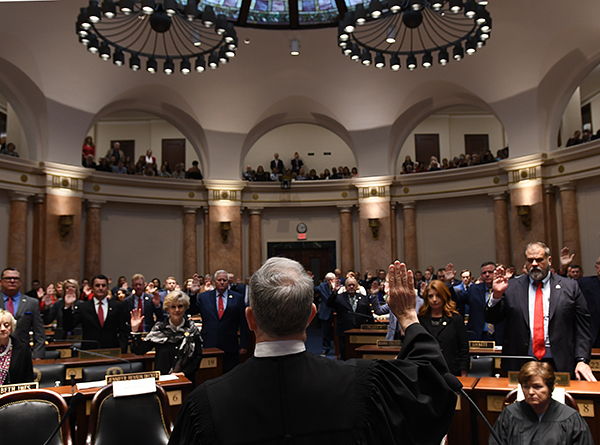
Lawmakers receive the oath of office on the
House floor during the first day of the 2023
Regular Session. A high-res version
of the photo can be found
here.
FRANKFORT — The
Kentucky General Assembly kicked off the 2023
Regular Session this week by welcoming dozens of
new lawmakers into the ranks and moderating the
tempo somewhat in a nod to the traditional
“short” sessions of the past.
But even with the new members and measured pace,
legislation on two key issues cleared important
hurdles over the first four days.
On Thursday, the House advanced House Bill 1,
which builds on a major overhaul to Kentucky’s
tax structure that began last year. The bill
would codify a drop in the state income tax rate
from 5% to 4.5% for 2023 and further reduce the
rate to 4% beginning next year.
Supporters say the overhaul will provide
financial relief to Kentuckians by gradually
eliminating state taxes on personal income while
simultaneously expanding the state’s overall tax
base. Critics, however, say it will undermine
state revenues without offering much benefit to
middle- and low-income families.
HB 1 now heads
to the Senate for consideration.
On Friday, the Senate passed Senate Concurrent
Resolution 31 to create an emergency work group
that will examine the state’s troubled juvenile
justice system.
The panel will review safety, staffing and
management of the system to determine if reforms
are needed and report their findings back the
General Assembly.
Friday’s proceedings concluded Part I of the
2023 session, one in which new members make up
nearly a quarter of the legislature. When the
chambers gaveled in on Tuesday, a total of 31
new lawmakers received the oath of office – 25
in the House and six in the Senate.
Along with the fresh faces came changes to
committees and even some to leadership,
including the minority floor leaders in both
chambers. Both chambers also decided to divide
up their respective committees on health,
welfare and family services into separate
committees this year that could better focus on
key issues.
The Senate also took time on Friday to say
goodbye to Sen. Ralph Alvarado, R-Winchester,
who has accepted an appointment as commissioner
for the Tennessee Department of Health.
Amid all the changes, one of the most noticeable
differences this week was an effort to return to
the original intent of the short, 30-day
legislative sessions.
Ever since an amendment to the state
constitution in 2000, the General Assembly has
met in short sessions during odd-numbered years.
The proceedings were intended to bridge the gap
between longer, 60-day sessions in even-numbered
years.
Early on, lawmakers tended to avoid major
legislation during short sessions, opting
instead to focus on smaller issues and
procedural matters. But short sessions have
grown more complex over time.
House Speaker David W. Osborne, R-Prospect, told
reporters on Tuesday that, after several years
of aggressive agendas, he expects lawmakers will
pump the breaks some this year.
“I think this is going to be a much more
traditional short session,” he said.
Part II of the session is set to convene on Feb.
7. Lawmakers have until Feb. 21 to introduce new
bills in the Senate and until Feb. 22 to
introduce new bills in the House. The chambers
are scheduled to adjourn sine die on March 30.
Kentuckians can track the action through the
Legislative Record
webpage,
which allows users to follow a bill’s
progression through the chambers.
Citizens can also share their views on issues
with lawmakers by calling the General Assembly’s
toll-free message line at 1-800-372-7181.
END
Jan. 5, 2023
House takes step to lower state income tax rate
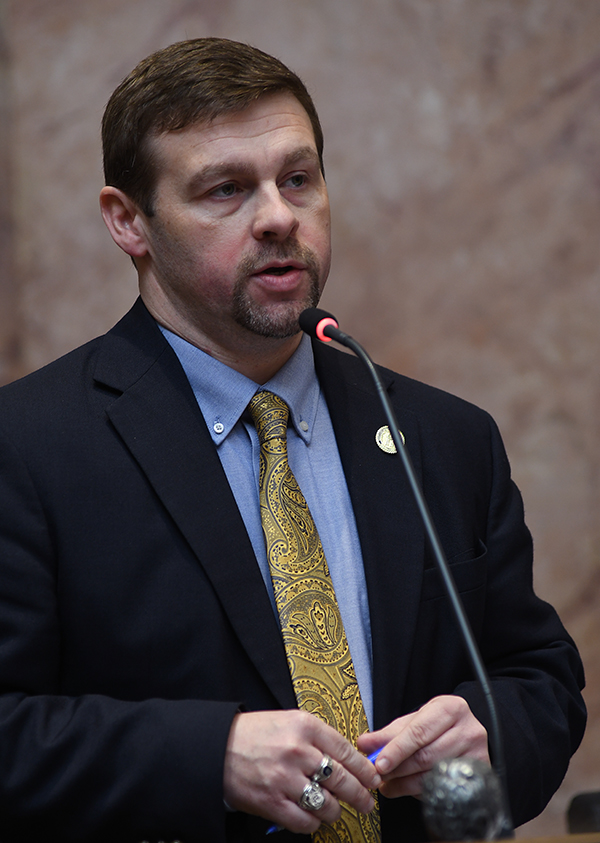
Rep. Brandon Reed, R-Hodgenvlle, speaks on the
House floor on Thursday on House Bill 1. A
high-res version of the photo can be found
here.
FRANKFORT— The
Kentucky House of Representatives made another
step toward eventually eliminating the state
income tax rate with the passage of House Bill 1
on Thursday.
The bill’s primary sponsor, Rep. Brandon Reed,
R-Hodgenville, said HB 1 is essentially a
continuation of House Bill 8 from the 2022
legislative session, which set that stage for a
major overhaul of Kentucky’s tax structure.
Reed said HB 1 will codify the state income tax
rate reduction to 4.5% from 5% for 2023 and
further reduce the state income tax rate to 4%
beginning Jan. 1, 2024.
Last year’s HB 8 established “triggers” that
will lower the state income tax rate by either a
half or full percentage point once state
revenues reach certain levels. Revenues met the
first trigger in 2022, which automatically
reduced the state income tax from 5% to 4.5% on
Jan. 1. Further income tax rate reductions
require legislative approval.
Reed said HB 1 puts the General Assembly,
“another step closer to putting more money back
into the pockets of hard working Kentuckians.”
“With HB 1, we are sending a statement to the
hardworking Kentuckians that Frankfort has
budgeted to our needs, not our wants; made
investments, paid down debt, and we have saved,”
Reed said. “We are reducing their tax burden, so
they can further invest, pay down debt and save
for their families.”
The House debated HB 1 for nearly an hour and a
half Thursday with Minority Floor Leader Derrick
Graham, D-Frankfort, being one of the members to
speak against the bill. Graham said the state’s
current surplus is the result of one-time
federal COVID-19 relief funds. He expressed
concerns that the state and its budget will
struggle in the future under the new tax plan.
“What we’re seeing is that we’re thinking about
now and not about tomorrow,” Graham said. “And
if we continue down this path, when all of the
federal dollars are gone, the Commonwealth of
Kentucky is going to have a difficult time
trying to fund pre-K and higher education, our
state government, our state employees (and) our
retirees.”
Rep. Josie Raymond, D-Louisville, agreed and
stated that the tax cut benefits the wealthy the
most and hardly makes an impact on middle- and
low- income Kentuckians, especially after HB 8
in 2022 raised taxes on certain services.
“Middle-income families like mine will get an
income tax reduction of about 300 bucks,” she
said. “Three hundred bucks is a wash for the
bank accounts of middle income and working class
families who are now paying more for Christmas
photos and little league than they’re getting
back under this bill.”
Majority Whip Jason Nemes, R-Louisville, was
among the House members to vote “yes” on HB 1.
He said with passage of the measure, it was “a
great day” and a “banner” day for Kentucky.
“This bill is about tomorrow because it will
hopefully provide the jolt to our state that we
need,” Nemes said. “States with a 0% income tax
have grown 56% faster since 2000.”
Speaker Pro Tempore David Meade, R-Stanford,
agreed that HB 1 is the right move for Kentucky.
He said since the first reduction bill in 2018,
which lowered the state income tax rate from 6%
to 5%, Kentucky has seen “significant revenue
gains.”
“Now it’s time for taxpayers to reap the
benefits,” Meade added.
The House approved HB 1 by a 79-19 vote. It will
now go before the Senate for consideration.
END
Jan. 4, 2023
New Senate Committee on Families and
Children holds inaugural meeting
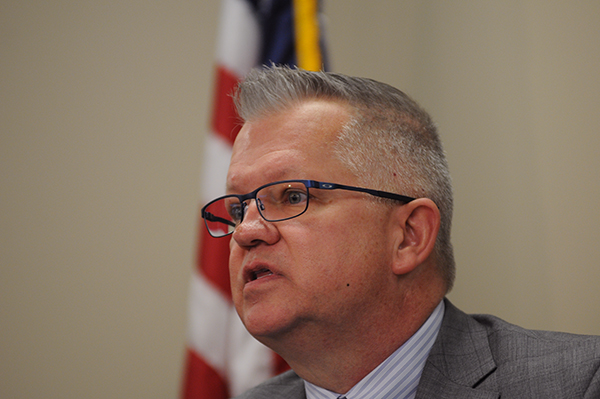
Sen. Danny Carroll, R-Benton, speaks during
the first meeting of the Senate Committee on
Families and Children. A high-res version
of the photo can be found
here.
FRANKFORT — The
new Senate Standing Committee on Families and
Children held its first meeting Wednesday,
discussing plans to take aim at important and
complicated issues in Kentucky.
Sen. Danny Carroll, R-Benton, chairs the
committee. He said its jurisdiction includes
family and children’s issues, child welfare,
adoptions, protective services, caregiver
support, family preservation programs, senior
citizen programs, sexual assault programs and
much more.
Carroll said he looks forward to pinpointing
important issues. One of the biggest priorities
will be child abuse and neglect, he said, noting
that Kentucky ranks among some of the worst
states in the nation in those areas.
“That’s completely unacceptable, and I’m hopeful
that within this committee we can focus on
specific issues and really make an impact,”
Carroll said.
Lawmakers established the new group on Tuesday –
the first day of the 2023 legislative session.
In previous years, the issues of health, welfare
and family services all fell under the
jurisdiction of one committee. However, the
Senate decided to divide the issues up between
two committees this year, and the House has
taken a similar approach.
On Wednesday, the Senate committee heard
testimony from Eric Friedlander, secretary of
the Kentucky Cabinet for Health and Family
Services. Friedlander praised the General
Assembly for the change and said some issues
were often overshadowed under the old structure
such as the mission of the state Department for
Community Based Services (DCBS).
“Medicaid hospital providers, nursing facilities
– that’s where a lot of the attention goes and
not enough attention then goes to the DCBS side,
the child protective service side, the adult
protective service side, which hardly anybody
ever talks about and is critically important,”
he said.
Sen. Robin L. Webb, D-Grayson, said she looks
forward to collaboration with Friedlander and
others.
“As a practitioner, I’m glad to see this change,
and I have had a lot of thoughts over the years
of the way things could be done better,” she
said. “And I am on the ground in the trenches
working with your field people and the
challenges that they face too.”
Carroll said he supports working with CHFS
officials as well.
“I think we’re on the same page in a lot of
areas,” he said. “What we deal with are not
political issues. These are dealing with our
families and with our kids, and I think it’s
crucial that the legislative and the executive
branch work together.”
Other committee members include Senate Majority
Caucus Chair Julie Raque Adams, R-Louisville,
vice chair; and members, Sen. Rick Girdler,
R-Somerset; Sen. Ralph Alvarado, R-Winchester;
Sen. Stephen Meredith, R-Leichfield; Sen. Denise
Harper Angel, D-Louisville; Sen. Amanda Mays
Bledsoe, R-Lexington; Sen. Lindsey Tichenor,
R-Smithfield; Sen. Whitney Westerfield,
R-Crofton; and Sen. Max Wise, R-Campbellsville.
END
Dec. 27,
2022
Stay connected
to the General Assembly during the 2023
legislative session
FRANKFORT — The
Kentucky General Assembly will kick off the 2023
legislative session on Jan. 3, and Kentuckians
have many ways to follow along with the action.
-- Kentuckians can use online resources to:
-- See the General Assembly’s daily schedule
-- Tune in to live coverage of legislative
meetings
-- Find information on their legislators
-- Contact lawmakers and offer feedback
-- Read bills and resolutions
-- Receive a notice when a bill advances
-- See how lawmakers voted on bills and
resolutions
-- View materials on committee topics and
testimony
-- Learn about the legislative process
All that and much more is available on the
General Assembly Home Page:
https://legislature.ky.gov/pages/index.aspx.
Following the General Assembly’s work often
begins with a daily look at the Legislative
Calendar:
https://apps.legislature.ky.gov/LegislativeCalendar.
The calendar shows which committees are meeting
and when the Senate and House will convene.
Livestreams of legislative action can be viewed
through feeds provided by Kentucky Educational
Television (KET) and the Legislative Research
Commission (LRC).
KET livestreams all chamber proceedings, while
committee meeting coverage is provided by both
KET and LRC. For links to the livestreams, go to
https://legislature.ky.gov/Public%20Services/PIO/Pages/Live-Streams.aspx.
You can find each lawmakers’ contact info,
biographical info, committee assignments and
sponsored legislation by clicking on the
“Legislators” tab near the top of the General
Assembly Home Page:
https://legislature.ky.gov/Pages/index.aspx.
You can also look up who represents your
district.
The online Legislative Record (https://legislature.ky.gov/Legislation/Pages/default.aspx)
has information on every piece of legislation
introduced in the Senate and House. You can read
summaries, the full text of bills, resolutions,
amendments and see exactly how far each piece of
legislation has advanced in the process. Bills
can be looked up according to bill number,
sponsor or topic. If a bill has been voted on in
a chamber, you can see how each lawmaker voted
by clicking “Vote History” on a bill’s summary
page.
Bill Watch, a bill tracking service provided
through a partnership of Kentucky.gov and LRC,
sends users email notifications each time the
bills they are interested in take a step
forward. To sign up for Bill Watch, go to
https://kentucky.gov/services/pages/billwatch.aspx.
Information about legislative committees is
available at
https://legislature.ky.gov/Committees/Pages/default.aspx.
To view materials such as info sheets, handouts
and PowerPoint presentations that are compiled
for lawmakers to review at committee meetings,
click on the “Meeting Materials” tab on the left
side of each committee’s page.
To share feedback on an issue with lawmakers,
call the General Assembly’s Message Line at
1-800-372-7181. Kentuckians with hearing loss
can use Kentucky Relay by dialing 7-1-1.
A Spanish language line for legislative
information will be available throughout the
General Assembly’s 2023 session by calling
1-866-840-6574.
To directly reach a lawmaker’s office, call
502-564-8100. An operator will transfer the call
to the office of the lawmaker you want to reach.
If you have a question about the lawmaking
process or legislative resources, the LRC Public
Information can be reached by calling
502-564-8100 ext. 59105.
END
Dec.
15, 2022
Budget forecasting group approves optimistic
revenue outlook
FRANKFORT — A
panel that provides forecasts on tax revenue and
economic conditions for state lawmakers reported
this week that general fund revenues exceeded
estimates by more than $945 million in fiscal
year 2022.
The 10-member Consensus Forecasting Group, which
operates independently of the Kentucky General
Assembly and includes economists and professors,
also adopted an optimistic forecast for fiscal
years 2023 and 2024.
Greg Harkenrider, deputy executive director of
the Office of State Budget Director, told the
group that year-to-date revenue growth through
November is stronger than projected at 6.4%.
The revisions approved Wednesday will now become
official revenue estimates for the state.
“We’re ahead of the game in this year in terms
of growth, and we’re also ahead in terms of the
absolute level that we’re jumping off,” he said.
“So, that’s one of the reasons that the state
budget director is requesting new estimates.”
In FY 22, revenue exceeded official estimates by
$622.8 million on individual income taxes,
$216.1 million on corporate income and limited
liability entity taxes, and $112.2 million on
sales and use taxes.
“On the individual, we grew 17.6%, which is
unheard of growth in the individual income tax,
I’ll just say,” Harkenrider said.
J. Michael Jones from the Office of State Budget
Director explained portions of the optimistic
scenario. Kentucky’s wages and salaries are
expected to grow in the forecast by 7% in FY 23
and 3.1% in FY 24.
The optimistic scenario also projects $15.2
billion in general fund revenue in the current
fiscal year – a 3.4% increase. The biggest
percentage gains are expected from coal
severance, lottery revenue and sales and use
taxes.
The same scenario forecasts nearly $15.5 billion
in general fund revenue in FY 2024, a 1.7%
increase. The biggest percentage gains that year
are expected from sales and use taxes and
property taxes.
END
Nov. 17,
2022
Legislators
continue to consider gray machines
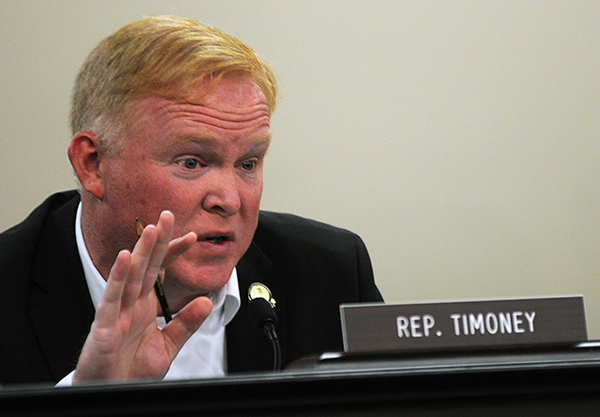
Rep. Killian Timoney, R-Lexington, speaks
during the Interim Joint Committee on Licensing,
Occupations and Administrative Regulations
meeting. A high-res version of the photo can be
found
here.
FRANKFORT — The
Interim Joint Committee on Licensing,
Occupations, and Administrative Regulations on
Thursday heard ardent comments and testimony
regarding gambling machines known as “gray
machines.”
This isn’t the first time lawmakers have heard
about the machines, as a measure to prohibit the
machines in Kentucky failed during the last
legislative session. Supporters of the machines
say they bring in much-needed income, while
opponents view them as illegal.
Frank Fina Sr., of Georgia-based Pace-O-Matic,
testified that the company has a unique business
model and operates legally. He explained several
components of legislation he and others are
pursuing.
“Last session, we received many, many questions
regarding our business and the legal skill game
industry,” he said. “This session, we’re working
with Senator Howell and other legislators to
introduce and hopefully pass legislation that
will further define, regulate and tax the legal
skill game industry here in Kentucky.”
Fina said the measure would lead to strict rules
on the skill game marketplace. It would
eliminate illegal skill game operators and
distributors, provide the state and the
localities with additional tax revenue and offer
sustainable income to small businesses, he said.
The measure would also designate the Kentucky
Department of Revenue as the regulator and the
Kentucky State Police as the enforcement arm. In
addition, it would levy a 6% tax on game revenue
and provide funding for both agencies, he said.
“We bear the costs of putting this business into
the state. We don’t ask for any assistance. And
it is a win-win opportunity for both operators,
locations and the state,” he said.
Wes Jackson, owner of The Cue Club in Lexington,
spoke in favor of the machines.
“One of the things that has greatly helped me
over the last year has been adding skill games
to my location,” he said. “These games have
become very popular with my customers, just like
our billiards, our darts, and our shuffleboard.
These machines are games of skill.”
Speaking against the machines was Malcolm
Cherry, commander of American Legion Post 23 in
Bowling Green. He spoke about the thousands of
dollars of taxes the organization has paid and
the numerous instances in which the group has
helped others.
“We run a real good organization. We do it
legally with the legal gaming machines that are
out there,” he said.
Senate Majority Floor Leader Damon Thayer,
R-Georgetown, said he would continue to support
Rep. Killian Timoney’s bill that would make them
illegal. He said three forms of legalized
wagering exist in Kentucky – pari-mutuel, the
lottery and charitable gaming.
“You talked about having a unique business
model. Yeah, it’s unique. It’s illegal. You
talked about being disruptive. Yeah, it’s
disruptive,” Thayer said.
Rep. Ruth Ann Palumbo, D-Lexington, said she has
been involved with many charitable fundraisers
throughout the years, and asked Fina if
Pace-O-Matic has approached charities such as
the Veterans of Foreign Wars (VFW) to host the
machines. She also asked if they told those
charities they might lose their tax status if
they install the machines.
Fina said the machines are already in use at “a
number” of VFWs and other fraternal clubs that
are charitable organizations.
Palumbo asked again about the tax status of the
organizations, that they could lose their
charitable licenses.
“I’m afraid, representative, I respectfully
disagree. I don’t see any avenue in which they
would lose their charitable status while
operating legal skill games,” he said.
Timoney, R-Lexington, said that more needs to be
done to establish the legality of the machines.
“There is something legal that has to occur
here. Until that, they are ‘gray.’ They are not
games of skill,” he said.
He also expressed concern about charitable
gaming.
“We have charitable gaming organizations that
are closing. They are losing their licenses
every day. I helped. I proposed legislation so
that charitable gaming could keep their doors
open, our charities, our VFWs, our bingo
parlors, our school booster clubs, everything
are closing. And they’re directly giving back to
charity.”
END
Nov. 16,
2022
Health
committee discusses pharmaceutical rebate reform
FRANKFORT —
Members of the Interim Joint Committee on
Health, Welfare, and Family Services on Tuesday
heard from advocates of reducing patient costs
through rebate reform.
Before patients can purchase medications,
insurers and pharmacy benefit managers (PBMs)
negotiate prices with pharmaceutical companies.
Those companies provide rebates to reduce the
total costs for many medications, according to
the Diabetes Patient Advocacy Coalition, which
is part of the Patient Pocket Protector
Coalition.
A representative of the Patient Pocket Protector
Coalition, George Huntley, told legislators at
Tuesday’s meeting that the savings are not
usually passed on to consumers.
“That same consumer has paid a premium to their
insurance carrier or their health plan for
access to that plan’s benefits, but they’re not
getting that plan benefit,” he said. “That
premium isn’t giving them a return on that
investment, if you will, with regard to the drug
benefit.”
PBMs are
licensed entities that provide services on
behalf of a health plan, state agency, insurer,
managed care organization or other third-party
payor, according to the Kentucky Department of
Insurance.
“PBMs were
created for medical billing of pharmacy
transactions,” Huntley said. “That was their
purpose when originally created. They don’t make
anything. They don’t touch anything. They report
only to their shareholders. They don’t have a
fiduciary responsibility for the health of the
patient at all.”
Rep. Steve Sheldon, R-Bowling Green, is a
pharmacist and owner of Sheldon’s Express
Pharmacy in Kentucky and Indiana. He sponsored a
PBM reform package that passed out of the House
this year, but stalled in the Senate.
Sheldon said PBMs used to simply form a
connection between the insurance companies and
the pharmacies. When they were first
established, it only cost 10 cents per
transaction, and even was reduced to 4 cents a
few years later. He said they have evolved into
multiple Fortune 500 companies.
He suggested going back to a fee transaction
pass through.
“If they want to charge 10 cents or a quarter,
just let us know what you want to charge per
transaction, and let’s get rid of the rebates
because we’re just never ever going to reel them
in. But this is a good start. I think you’ll see
some legislation next session that will have to
do with all the money going back to the premiums
except for a reasonable amount,” Sheldon said.
Sen. Ralph Alvarado, R-Winchester, co-chair of
the committee, said reform might not come
easily, but changes need to be made.
“I’ve already been told by some of our insurance
partners they’re going to take us to the mat on
this. They’re going to fight tooth and nail,” he
said. “So I’m anticipating a very nasty fight on
this. But I think the proof is already in the
pudding here in Kentucky on Medicaid. And it’s
already been shown that it’s going to work, and
it’s going to benefit patients.”
Sen. Stephen Meredith, R-Leitchfield, said he
has also been in support of reform. He added
that employers have been using scare tactics to
keep the General Assembly from passing effective
legislation.
“No one should make a fortune off the misfortune
of others, and that’s exactly what’s happening.
This is really falling on the most vulnerable.
Here’s a chance to right this wrong,” he said.
Huntley said those representing some health
plans say they’re using rebates to keep plan
premiums down for all members, but he doesn’t
know of anybody who has had their premiums go
down.
“But they will even suggest that it would be
unfair to do otherwise, to not share them across
all plan participants. So they’re keeping that
pool of money. Now our position, we respectfully
disagree with that statement,” he said.
END
Nov. 16,
2022
Commission
discusses need for state to study causes of gun
injuries, prevention
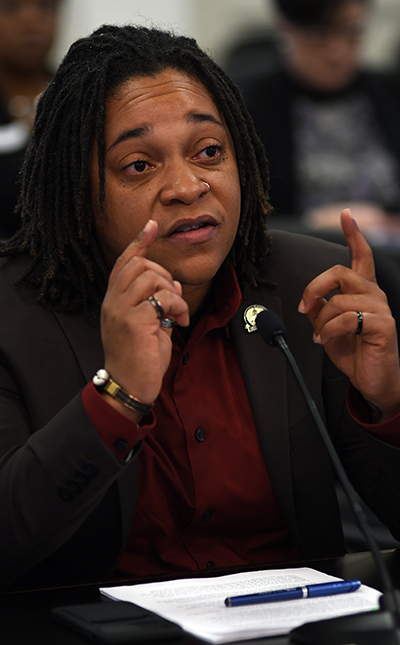
Rep. Keturah Herron, D-Louisville, discusses a
possible bill to establish an Office of Gun
Violence Prevention during the Commission on
Race and Access to Opportunity on Nov. 16.
A high-res version of the photo can be found
here.
FRANKFORT — One
issue lawmakers may consider tackling in the
2023 legislative session is the need for more
research on gun injuries and prevention.
Rep. Keturah Herron,
D-Louisville, spoke before the Commission on
Race and Access to Opportunity on Tuesday about
a bill she’s working on to establish an Office
of Gun Violence Prevention within the Kentucky
Department for Public Health.
“The office will also collect and disseminate
data and make recommendations related to gun
violence policy and community-based gun violence
intervention and prevention programs,” Herron
said.
The office would also be able to apply for
alternative funding, such as federal grants.
Herron said it would be similar to the Office of
Drug Control Policy.
Herron told the commission this bill is not
seeking to ban guns or place any new
restrictions on gun ownership.
“I do fully support the Second Amendment, and I
am a legal gun owner,” Herron said. As someone
who has lost people she loves to gun injuries,
Herron said this cause is important to her.
Sabrina Brown, the core director and an
investigator for the Kentucky Injury and
Prevention Research Center, said six out of 10
deaths in the U.S. in 2019 were firearm-related
suicides, and 109 people died a firearm-related
death every day in 2019.
Kentucky is one of the states with a high rate
of firearm-related fatalities, Brown added.
Monique Williams, an associate professor in the
School of Public Health and Information Sciences
at the University of Louisville, studies a
public health approach to gun violence.
“Public health approaches allows for us to treat
violence like the disease it is, and we see it
becoming an epidemic,” she said.
Sen. Karen Berg,
D-Louisville, said that as a doctor, this issue
is important to her and she supports the
legislation because, in order to address the
issue of gun violence, lawmakers need an idea of
what is causing it.
“Until we understand what’s bringing this
forward, what’s precipitating this, what can we
do to address it? We’re helpless,” Berg said.
“We don’t have a way of addressing this without
that data.”
Commission co-chairs Rep. Samara Heavrin,
R-Leitchfield, and Senate President Pro Tempore
David P. Givens, R-Greensburg, thanked Herron
and her guests for their presentation.
“You eloquently stated that this is complex,
multifaceted and it’s not going to have a single
answer that’s going to solve the problem,”
Givens said.
The Commission on Race and Access to Opportunity
is a 13-member statutory committee tasked with
conducting studies and research on issues where
disparities may exist in education equity, child
welfare, health, economic opportunity, juvenile
justice, criminal justice and other sectors that
are deemed relevant in improving services and
opportunities for minority communities. The
commission is comprised of legislative and
citizen members.
As of the time of publication on Nov. 16, Herron
had not officially submitted an interim working
draft related to gun injury or gun violence
prevention for the 2023 legislative session.
During the interim, the Kentucky General
Assembly cannot take any action on legislation.
The 2023 legislative session begins Jan. 3.
END
Nov. 2,
2022
Subcommittee
members receive an update on state police
retention, recruitment
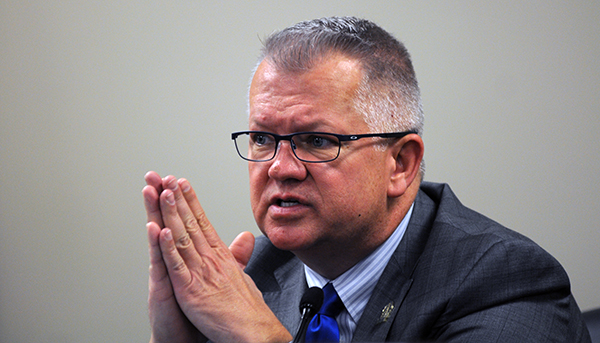
Sen. Danny Carroll, R-Benton, speaks about the
impact of raises on Kentucky State Police during
Wednesday’s Budget Review Subcommittee on
Justice and Judiciary meeting. A
high-res version of the photo can be found
here.
FRANKFORT —
Members of the Budget Review Subcommittee on
Justice and Judiciary heard a positive update
from the head of Kentucky State Police on
Wednesday regarding the impact of raises on the
agency’s recruitment and retention efforts.
KSP Commissioner Phillip “P.J.” Burnett Jr. said
morale is good among the troopers, and the push
to improve matters continues.
When Burnett last spoke to subcommittee members,
there were some 700 troopers – the lowest number
in more than 30 years. But KSP’s ranks have
since grown to 896. Burnett credited many of the
improvements to historic pay increases that
lawmakers approved during the 2022 legislative
session.
“Not only did we receive the $15,000 starting
pay, but we also increased on incremental ranks,
per rank for our supervisors,” he said. “Some of
those are our tenured, seasoned personnel.”
Burnett said the better salaries have been
life-changing for some personnel and their
families.
“On the retention, it was phenomenal, and I
can’t thank you enough for our agency to be able
to do that because the people that were eligible
to retire, that were looking to retire, are our
seasoned personnel,” he said.
The increases have also helped with recruitment.
In March, KSP graduated 71 troopers, which is
the most the agency has graduated since 2014.
The next class of 38 cadets is scheduled to
graduate on Nov. 18, and another class is set to
start next year on Feb. 26, Burnett told
lawmakers.
Rep. Joseph M. Fischer, R-Fort Thomas, and
co-chair of the committee, asked Burnett if the
pay raises are helping to make KSP more
competitive with other agencies.
“Your department was hemorrhaging,” Fischer
said.
Burnett answered that things overall and
retention are definitely better, but he could
cite instances when municipalities can be nimble
about pay, and it may be better than at KSP.
“Starting pay for a trooper is $55,000,” he
said. “What I can tell you is that Richmond
Police Department is now starting at $56,612,
and a lateral, they’re advertising for $60,834.
Pikeville gives some of their officers a $5 an
hour raise, which would be the equivalent to
about $10,000 over a year.”
Sen. Danny Carroll, R-Benton, asked Burnett
about retirement and pensions.
Burnett said most of the retired troopers who
came back to work are working directly with the
public. Some are put in specialized positions,
however.
“Again, those are some of our seasoned officers.
They’ve retired, and the ones that we bring
back, when they retire, they were really quality
employees,” he said. “Almost all the time, they
are assigned patrol duties.”
Sen. Robin L. Webb, D-Grayson, said KSP has been
operated well throughout the years.
“But I think overall, the Kentucky State Police
has been the one thing we can all count on. And
I appreciate the leadership through the years
and the consistency and the continuity, the
professionalism both on the ground and here in
Frankfort,” she said.
Rep. Jason Nemes, R-Louisville, said he’s
pleased with the report and its findings.
“It’s great that our morale is up. I’m talking
to a lot of troopers myself, some in my own
family. They’re telling me how they think things
are going much better. Some of them are staying
who were looking at retiring,” he said.
END
Nov. 1,
2022
Education
committee receives update on academic standards
for social studies
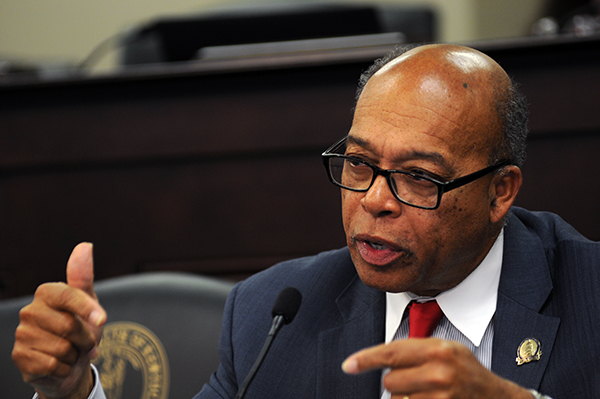
Senate Minority Caucus Chair Reginald Thomas,
D-Lexington, speaks about new academic standards
for social studies during a meeting of the
Interim Joint Committee on Education. A high-res
version of the photo can be found
here.
FRANKFORT — The
Interim Joint Committee on Education received an
update on Tuesday about the state’s plan to
implement new academic standards related to
social studies under Senate Bill 1.
SB 1, which received approval from the General
Assembly earlier this year, calls for the
Kentucky Department of Education (KDE) to
incorporate fundamental American documents and
speeches into middle and high school social
studies standards. State officials expect to
finalize the implementation by August.
The 24 fundamental documents and speeches named
in the legislation include, among others, The
Mayflower Compact, The Declaration of
Independence, The Gettysburg Address, the
Atlanta Exposition Address by Booker T.
Washington, A Time for Choosing by Ronald
Reagan, and The Monroe Document by James Monroe.
Micki Ray, chief academic officer at KDE, said
the standards were already scheduled for review
in 2025, but that SB 1 called for an accelerated
timeline.
“We moved very quickly with the passage of the
law to reconvene the social studies advisory
panel and review committee to come together to
discuss how they were going to incorporate the
required documents into the Kentucky academic
standards for social studies,” she said.
Ray added that the upcoming changes will not
impact the timeline for the full-scale review in
2025.
Signed into law last April, advocates for SB 1
say it ensures core concepts are taught in
social studies. But opponents say it limits
important teachings and stifles free speech in
the classroom.
State officials held a public comment period on
the standards in September, and another public
comment period is scheduled in January 2023.
Four hundred respondents participated during the
first comment period, representing 59% of all
Kentucky counties. They included teachers,
retired teachers, administrators,
parents/guardians, students and stakeholders
from higher education and business, according to
KDE.
Rep. James Tipton, R-Taylorsville, asked how
those who are not educators and more people in
general can become involved in the process.
“We appreciate the feedback because that makes
the process better and they, like us, want this
to be something that’s useful to the field and
also helpful to students as they go through that
K-12 progression for social studies,” Ray said.
Feedback from all types of people is welcome,
she said.
Senate Minority Caucus Chair Reginald Thomas,
D-Lexington, asked about specific information
teachers shared on the survey, including
possible comments related to critical race
theory.
Beth Ratway of the American Institutes for
Research said educators supported the
adjustments based on the statute and saw the
explicit connections to the documents.
“They really did not bring up the concepts of
CRT within their comments, but they did give
some really good suggestions to support the 2025
review, so we definitely captured those and have
those for our future work as well,” she said.
Sen. Adrienne Southworth, R-Lawrenceburg,
questioned if the standards will be taught
throughout multiple grades rather than just
during a single year.
“Are we really rotating around the cycles
correctly, or do we still have more or less
holes,” she asked.
Ray said that all of the pieces are included
over the scope of both middle school and high
school.
END
Oct. 26,
2022
Legislators
learn how funding supports cannabis research
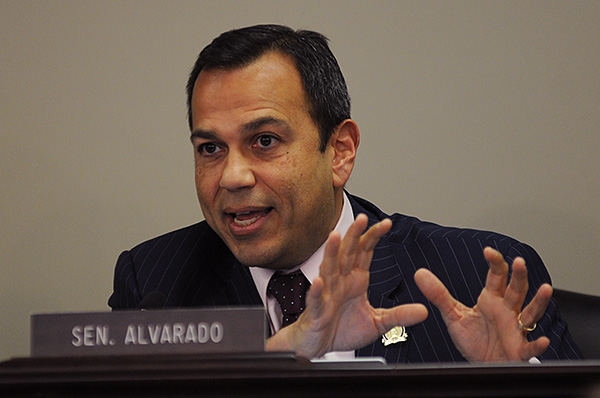
Sen. Ralph Alvarado, R-Winchester, speaks during
a meeting of the Interim Joint Committee on
Health, Welfare and Family Services. A high-res
version of the photo can be found
here.
FRANKFORT – House
Bill 604 established the Kentucky Center for
Cannabis Research at the University of Kentucky
earlier this year. Today, members of the Interim
Joint Committee on Health, Welfare, and Family
Services learned more about its mission.
Center Director Shanna Babalonis told the
committee that experts will use a $2 million
appropriation over the next two years to support
a multitude of projects.
That includes examining vaporized cannabis as a
treatment for opioid use disorder; researching
edible cannabis doses for cancer patients, and
examining cannabis involvement in opioid
overdose deaths, injuries and driving
fatalities.
The center will also conduct an analysis of
cannabidiol (CBD) products, pilot a growing
project with other UK personnel, study how
inhaled cannabis affects driving compared to
alcohol, and look at medical cannabis’ impact on
prescription opioid use.
“We are also planning a cancer trial with the
Markey Cancer Center to look at edible cannabis
doses for patients with cancer, and I would just
like to highlight that this is going to be one
of the first studies of its kind,” Babalonis
said. “You would think that cancer and cannabis
have been really well researched. Unfortunately,
that’s not the case.”
Babalonis said the center is benefiting from the
expertise of those who serve on an executive
committee and an advisory committee.
The executive committee is tasked with
establishing the research priorities and the
budget of the center, and the advisory committee
advises the executive committee and offers
feedback on the center’s progress and direction,
Babalonis said.
Rep. Lisa Willner, D-Louisville, said she
supports learning more about the center’s
research and asked about similar centers.
“I mainly just want to express my appreciation
and enthusiasm for the center and the project,”
she said. “And I just want to have clear in my
mind, is this the only center like this in the
country, and is Kentucky really leading the way
on this research?”
Babalonis said it’s one of several in the United
States, and California has a huge cannabis
research center due to the large amount of money
from medical marijuana sales in the state.
“I’d say there’s only a handful of other places
that are able to do this. But I would like to
highlight that Kentucky, UK, is one of the only
places in the world that can do an inpatient
trial, placebo-controlled cannabis trial on an
inpatient basis, meaning that we admit people to
the hospital and have them live there and can
control their drug intake,” she said.
Sen. Ralph Alvarado, R-Winchester, who is also
co-chair of the committee, said the center’s
work is positive.
“I think that there’s a lack of research on a
lot of this topic. And the fact that you stated
that we have a lack of that, I think it’s
important,” he said. “I want to let the members
of the press who are here, who always seem to
report that there’s all of these studies and all
of this proof, I don’t know that we have that
proof. So I’m encouraged to get the proof,
either show it yes or no.”
Rep. Kimberly Poore Moser, R-Taylor Mill, who is
co-chair of the committee and was the lead
sponsor of HB 604, said those at the center are
doing a great job, and it’s being noticed.
“Thank you for all your work. I think it’s
incredible that you have already secured a $2
million NIH grant, which was exactly what I
thought would happen,” she said. “You know you
create this focused center for research, and the
money will follow. And I think that’s probably
the first of many grants that we’ll see.”
END
Oct. 20,
2022
Lawmakers
share plan with legislative committee to
criminalize hazing
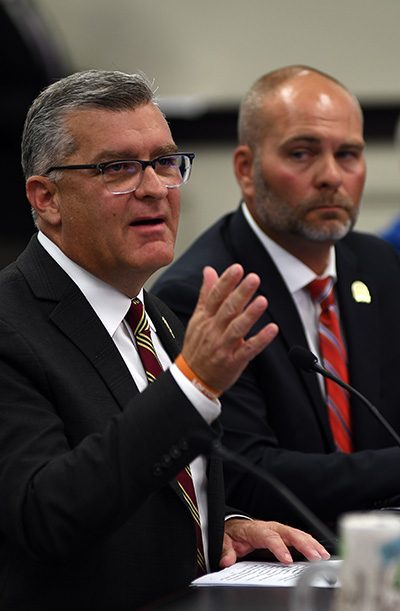
Sen. Robby Mills, R-Henderson, speaks about
possible anti-hazing legislation during a
meeting of the Interim Joint Committee on
Judiciary while Rep. Jonathan Dixon, R-Corydon
looks on. A high-res version of this photo
is available
here.
FRANKFORT— Two
Kentucky lawmakers plan to file legislation in
2023 to make hazing a crime in the Commonwealth.
Sen. Robby Mills, R-Henderson, and Rep. Jonathan
Dixon, R-Corydon, testified before the Interim
Joint Committee on Judiciary on Thursday
alongside the parents of 18-year-old Lofton
Hazelwood. Hazelwood, a University of Kentucky
student and Henderson native, died of alcohol
toxicity at a fraternity house last year. The
bill will be known as Lofton’s Law.
“We believe that intentional, wanton and
reckless participation in the act of hazing
needs to be stopped in Kentucky,” said Mills.
“And the only way for organizations and people
who operate these organizations to understand
the severity of hazing is to attach a crime to
this behavior in Kentucky.”
Mills and Dixon’s proposed anti-hazing
legislation defines hazing as an action which
endangers the mental or physical health of a
minor or student for the purpose of recruitment,
initiation into, affiliation with or enhancing
or maintaining membership or status within any
organization.
Activities that would be considered hazing under
this law include causing, coercing or forcing a
minor or student to violate federal or state
law; consume any food, liquid, alcoholic
beverage, drug, tobacco product or other
controlled substance; endure physical brutality,
endure sexual brutality and other activities
that endanger the person’s physical and mental
health.
Under this proposed legislation, a person would
be guilty of first-degree hazing, a class D
felony, if he or she intentionally or wantonly
participates in hazing that results in serious
physical injury or death. A person would be
guilty of second-degree hazing, a class A
misdemeanor, if he or she recklessly
participates in the act of hazing.
“We believe the activity of hazing is not
something we should turn a blind eye to because
it can lead death, injury and destruction of
Kentucky families and friends,” Mills said.
Lofton Hazelwood’s mother, Tracey Hazelwood,
shared her son’s story with the committee. She
said the hazing at the fraternity her son was
attempting to join began weeks before his death,
with members forcing her son to drink alcohol,
participate in vandalism, chew tobacco until he
vomited and more.
After an investigation, it was reported Lofton
died after consuming 18 pours of bourbon in a
plastic cup on Oct. 18, 2021. He was left alone
while extremely intoxicated, and by the time he
was discovered unresponsive, it was too late,
Tracey Hazelwood said.
“I beg that you please consider this bill,” she
said. “We need Lofton’s Law in place as soon as
possible. It’s not going to bring my son back,
but it might save somebody else’s son.”
Dixon said while he believes fraternities and
sororities are an important part of the college
experience, those who engage in hazing need more
accountability.
“I hope that by starting this conversation today
about the risks and the potential outcomes that
have come from hazing, we can potentially add a
stiffer penalty to those who engage in that
behavior and result in saving many, many lives,”
Dixon said.
Rep. Patrick Flannery, R-Olive Hill, suggested
the sponsors consider enhancing the first-degree
hazing penalty to a class C felony.
“Or just find ways to be more punitive to
discourage this type of criminal behavior, or
maybe even have some sort of aggravated
offensive if it involved some sort of fraternity
or sorority hazing practice,” he added.
Sen. Karen Berg, D-Louisville, asked if the
fraternity was disbanded and if there were any
legal actions taken against the organization.
Tracey Hazelwood said it was and that there is a
pending lawsuit.
Sen. Alice Forgy Kerr, R-Lexington, advocated
for an educational component to be added to the
bill. Mills liked the idea.
As of Oct. 20, Mills and Dixon have not
submitted an interim working draft related to
anti-hazing for the 2023 legislative session.
During the interim, the Kentucky General
Assembly cannot take any action on legislation.
The 2023 legislative session begins Jan. 3.
The next Interim Joint Committee on Judiciary
meeting is currently scheduled for Nov. 3 at 11
a.m. For more information, visit
legislature.ky.gov.
END
Oct. 19,
2022
Legislators
continue to explore tax structure
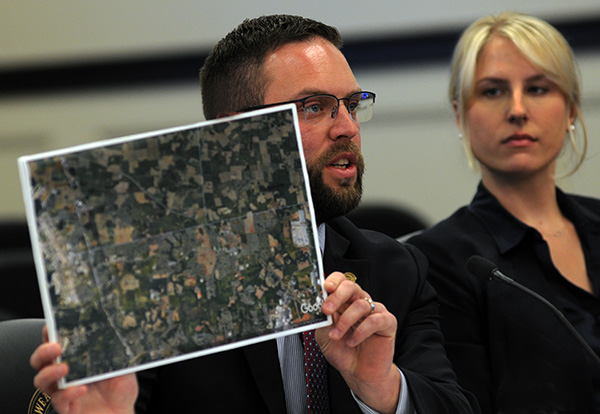
Rep. Michael Meredith, R-Oakland, (left)
displays a map of the Kentucky-Tennessee border
at Wednesday’s Interim Joint Committee on
Appropriations and Revenue meeting. Looking on
is Lena Muldoon, executive director of You
Decide, Kentucky! A high-res version of
this photo is available
here.
FRANKFORT —
Members of the Interim Joint Committee on
Appropriations and Revenue received testimony on
Wednesday regarding local taxation and how
Kentucky measures up with other entities.
Rep. Michael Meredith, R-Oakland, is one of
several legislators who serve on the committee.
He said he and other business advocates have
been researching local tax structures in other
states to see where Kentucky stands and how
taxation could be improved.
Andi Johnson,
chief policy officer and director of regional
engagement for Commerce Lexington Inc., said her
group advocates for tax diversification, adding
that new tax options could boost the area’s
ability not only to attract jobs, but also
people.
Much of the discussion stemmed from legislation
that stalled in the 2022 legislative session.
The measure – House Bill 475 – proposed a
constitutional amendment that would have set the
stage for new types of taxes at the local level.
One focus under consideration is transitioning
from income-based taxes to consumption taxes.
Meredith said a core group of stakeholders has
been working on the issue since 2018. He said
that baseline revenue needs to be protected and
that drafting effective legislation will take
time.
“We have to predict organic growth in the
revenue streams that we have. But, we have 415
cities across the Commonwealth of Kentucky and
120 counties,” he said. “And we’re going to have
to be very, very smart and be very, very
cautious about how we draft something, because
we want to make sure that whatever we pass when
we get to a statutory framework on this does not
create a Kansas situation for our local
governments.”
Sen. Christian McDaniel, R-Taylor Mill, is
co-chair of the committee. He agreed with
Meredith that the local taxation issue remains
important, and now is a good time to continue to
work on the matter.
“We’ve had this issue several times through the
years about local taxation and changes to it,
and I thought it would be good for all of us to
hear from the various interested parties while
we’re not necessarily in the hustle and bustle
of session,” he said.
However, forecasting might not be easy.
Meredith said the state Department of Revenue
has provided some data showing how a 1% sales
tax would look at the local level. But
“they can’t give us anywhere near real numbers
on what it would look like city by city, and the
county by county numbers are very, very
difficult because the way that retailers
report,” he said.
Rep. Josie Raymond, D-Louisville, said she would
support tax reform that would allow Louisville
to raise revenue to offer universal access to
“life-changing Pre-K.”
“To clarify, a city wouldn’t necessarily be
restricted in raising additional revenue, or
would they be because they would use the local
option flexibility to make up something they’re
lost from the state?” she asked.
Meredith said it does not mean the reduction
plan in House Bill 8 would have to be
implemented. House Bill 8 – passed during the
2022 Regular Session – will gradually reduce
state taxes on personal income over several
years once state revenue exceeds certain
thresholds. It simultaneously seeks to expand
and diversify the state’s overall tax base.
“I think it compliments House Bill 8. And what
you have seen with the reduction in 2018 and the
House Bill 8 reduction is that we do have an
economy that is growing significantly right now
in the Commonwealth, and we’re experiencing
great revenue growth because of that,” he said.
Meredith said entities would have to move to be
less reliant on occupational taxes.
“Again, as I said in my comments when we
started, we have to protect baseline revenue,
allow for organic growth and provide some
incentive for the movement,” he said.
Rep. Jason Nemes, R-Louisville, said he is also
a proponent of diversification.
“I’ve always supported this, and the reason I
supported it is because working property owners
are soaked in the local government taxation. And
it’s time that we had more diversity of
taxation,“ he said.
END
Oct. 18,
2022
Transportation
committee members learn about autonomous
vehicles
FRANKFORT —
Members of the Interim Joint Committee on
Transportation on Tuesday learned more about
autonomous vehicles during a meeting at the
Capitol Annex.
Arlyn Upshaw,
counsel for the Autonomous Vehicle Industry
Association and an attorney at Venable LLP,
answered legislators’ questions and shared
information about a business she said increases
supply chain efficiencies, decreases the cost of
goods, improves safety and boosts job growth.
She reported that, according to the U.S.
Department of Transportation, nearly 43,000
fatalities occurred on U.S. roads last year – an
11% increase from 2020 and a 16-year high.
“I think we have become accustomed to these
numbers,” Upshaw said. “In contrast, AVs do not
have a human in them and they do not drive
drunk. They don’t text while driving, and they
don’t fall asleep at the wheel. These are all
major contributors to crashes on our roads
today.”
Upshaw said autonomous vehicles are used for
many purposes. They include goods delivery,
passenger ride hailing services, last-mile
transportation services, shuttle services and
long-haul trucking.
Several states are able to test and deploy AVs,
some are able to test them, and some are
“silent” on their operation. Kentucky is among
the “silent” states, she said.
Sen. Johnnie Turner, R-Harlan, asked Upshaw
about the possible decrease in the cost of goods
transported via AVs.
“Is that based upon you’re just eliminating the
driver, since that’s all I see pretty much is
what’s going to happen you’re going to eliminate
a human being in that vehicle,” he said.
Upshaw said she thinks the particular study on
cost decreases was based on removing the driver
from autonomous trucking.
“So when we think about the movement of goods
across the country, it’s much more efficient to
not have a driver that has the human
limitations…” she said. “So, they would be much
faster, and it would help decrease the cost of
goods associated with increased efficiency and
speed and things like that.”
Turner also asked Upshaw if autonomous vehicles
have to go through weigh stations and be
checked.
“Yes, autonomous vehicles would be required to
do all of the same administrative things like
that that currently a vehicle would have to do,
and it would be taxed in the same way and
subject to all those same operational
requirements…,” she said.
The exceptions would be things that human
drivers would have to do, Upshaw said.
Senate Majority Whip Mike Wilson, R-Bowling
Green, asked Upshaw if a truck is loaded with
tens of thousands of products, would the system
adjust itself accordingly.
“They’re really designed to drive better than
really a human driver can. They’re developed
these AVs to undergo simulation and experiences
for over a dozen years, really that have
calculated what needs to happen in any given
scenario,” she said.
According to Upshaw, the federal government is
responsible for oversight and administration of
performance and safety standards for AVs, and
states are responsible for things such as
licensing, registration, insurance and traffic
enforcement.
During the interim, the Kentucky General
Assembly can’t take any action on legislation.
The 2023 Session begins Jan. 3.
Rep. Ken Upchurch, R-Monticello, and co-chair of
the committee, said the next meeting will be
Nov. 1 at 1 p.m. in the Capitol Annex.
END
Oct. 18,
2022
Education
committee hears ideas on legislation to reduce
vaping in schools
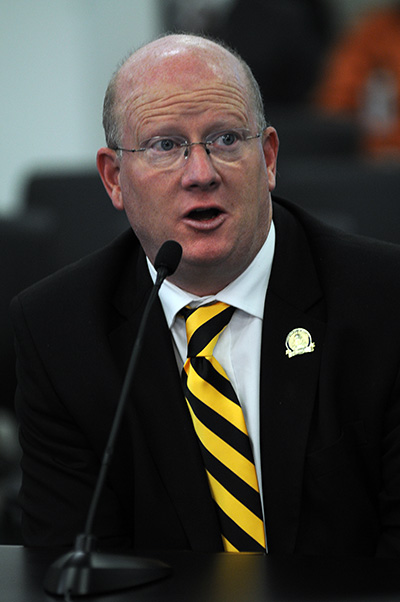
Rep. Mark Hart, R-Falmouth, speaks about
possible anti-vaping legislation during a
meeting of the Interim Joint Committee on
Education. A high-res version of this
photo is available
here.
FRANKFORT— Whether
you call them vapes, vape pens or electronic
cigarettes, the popular activity among teenagers
is drawing some criticism in Frankfort.
Rep. Mark Hart, R-Falmouth, was joined by
retired U.S. Marine Corps. veteran and current
Pendleton County High School instructor Brian
Melton at the Interim Joint Committee on
Education on Tuesday to discuss the dangers of
vaping and possible legislative solutions to the
problem.
“We’re in the process of drafting legislation,
which I hope to have ready and available to be
filed first of January,” Hart said.
According to Melton’s presentation, the USDA
reports that 2.6 million teens are using
e-cigarettes and 25% use them daily with the
majority of them vaping nicotine products.
Nicotine isn’t the only substance found in
vapes, Melton said. Teens are also drawn to
cannabis, THC containing and CBD, non-THC
containing vape pens. Heroin and fentanyl vape
pens also exist and could end up in the hands of
teens, Melton added.
Melton encouraged the committee to consider
changing state law to create harsher penalties
for vaping in schools and to close loopholes
regarding fentanyl-laced vaping products. He
also asked the committee to consider legislation
to provide more funding on anti-vaping education
for students and education on how teachers can
respond to a vaping-related medical emergency.
Current state law leaves it up to local school
districts to decide the punishment for vaping at
school.
“I think we would benefit from having something
from the state that says any vaping device would
have a harsher punishment or fine associated on
a school campus,” Melton said.
Rep. Lisa Willner, D-Louisville, asked if there
is any data that supports harsher punishments
leading to a reduction in vaping incidents in
schools.
Melton said he did not currently have that data
available.
Rep. Killian Timoney, R-Nicholasville, who is
also an educator, agreed vaping is a major issue
in schools that needs more attention, especially
when it comes to educating parents on the
dangers of vaping.
“I think that every dollar that we put into
looking at increasing consequences for these
offenses we also need to put an equal amount
into educating parents on what these are,” he
said. “… This technology is changing so fast. I
remember having conferences with parents and
they’re like, ‘Oh, it’s flavored vapor.’ No,
it’s not.”
Sen. Stephen Meredith, R-Leitchfield, suggested
asking students for their input on how to
address vaping in schools.
“It’s great that we can pass laws, but if it’s
our laws, it’s not going to have a whole lot of
ownership among young people,” he said. “Surely,
we’ve got some cadre of young people that
understand this is a serious issue, and I’d like
to give it back to them and say, ‘What are you
going to do about it?”
Hart agreed and said Meredith’s suggestion to
create a task force of the “best and brightest”
teens is an “excellent idea.”
As of Oct. 18, Hart has not submitted an interim
working draft related to vaping for the 2023
legislative session. During the interim, the
Kentucky General Assembly cannot take any action
on legislation. The 2023 legislative session
begins Jan. 3.
The next Interim Joint Committee on Education
meeting is currently scheduled for Nov. 1 at 11
a.m. For more information, visit
legislature.ky.gov.
END
Oct. 12,
2022
Child welfare
committee members hear concerns from Children’s
Alliance president
FRANKFORT —
Members of the Child Welfare Oversight and
Advisory Committee on Wednesday heard serious
concerns from a representative of the Children’s
Alliance about workforce shortages and youths
with severe behavior problems.
Based in Frankfort, the Children’s Alliance
advocates for improved care and treatment of
Kentucky’s children through a collaboration of
agencies that serve them. Some of the member
organizations are: Alliance Counseling
Associates in Glasgow, Kentucky Intensive Family
Services in Fort Thomas and Foothills Academy
Inc. in Albany.
The organization’s president, Michelle M.
Sanborn, told committee members that the
intensity of behavior issues of young people who
they serve has increased, but only those with
the most severe treatment needs are being served
in residential facilities today.
In some cases, Sanborn said, residential
agencies are referring foster youth of the
state’s Department of Community Based Services
for psychiatric hospitalization and are being
told their cases are too severe for the
psychiatric hospital. This means youths with
high acuity needs must be maintained at
residential facilities even when staff at
hospitals say they are too severe. Sanborn said
residential agencies must have the staff and
resources to keep the children safe.
According to Sanborn, some of the children who
need assistance are very aggressive and have
been cutting themselves.
“They are crying out for help, and they need
treatment,” she said.
Sanborn said another concern are the
“never-ending” audits from managed care
organizations, or MCOs.
“I got one from one MCO on Thursday and I got
that finished, and on Monday, got another one. I
just don’t have the staff to keep up,” she said.
Senate Majority Caucus Chair Julie Raque Adams,
R-Louisville, said Sanborn covered a great deal
of information in her presentation and she would
like to lessen agencies’ administrative burdens.
Adams is also co-chair of the committee.
“I agree with you on the MCO audits. But part of
the reason they do it is because they can,” she
said. Sen. Adams suggested that the committee
could send a letter to all of the MCOs and ask
them to justify their audits.
Sen. Karen Berg, D-Louisville, said the
situation with audits could possibly be
improved.
“Can we not simply require the MCOs to
consolidate their data? You know, to come
together and find out what information do we
really need to provide adequate services and to
make sure that the quality of services provided
is being adequate,” she said.
Sanborn told legislators there is also a
workforce crisis in residential care.
Before the pandemic, the average starting hourly
wage for residential direct care staff was only
around $11 per hour, with some agencies paying
as little as $8.50 per hour. Today it is about
$14 or $15 an hour, she said. Though hourly pay
has increased, there is still a shortage of help
available.
“Many residential facilities have had to stop
accepting additional foster children because
they cannot hire the staff to care for them,”
Sanborn said.
Also in her update, Sanborn said some things are
going very well, but she wanted legislators to
be aware of areas of concern. While her staff
are holding their own, she added “I want to make
sure that we’re not falling into those concerns
that other states have gotten into.”
One of the areas that has been a major focus of
the Children’s Alliance is family preservation.
“Our investments in family preservation
prevention services are actually showing a
decrease in the cost of our out-of-home care,”
she said. “You can see that it’s working. So
thank you for that investment, and know that
we’re going to continue to improve this and work
on this, but that’s an important and key place.”
The next committee meeting is Wednesday, Nov. 9
at 1 p.m.
END
Sept.
28,
2022
Legislators
discuss reforming rules for pharmacy benefit
managers
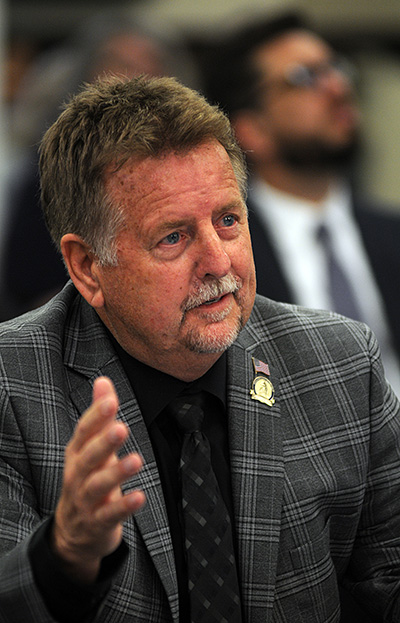
Rep. Steve Sheldon, R-Bowling Green, testifies
on pharmacy benefit managers during a meeting of
the Interim Joint Committee on Health, Welfare
and Family Services. A high-res version of
this photo is available
here.
FRANKFORT — The
Interim Joint Committee on Health, Welfare and
Family Services on Wednesday heard ardent
testimony from a state legislator and others
about pharmacy benefit managers reform.
Pharmacy benefit managers, or PBMs, are licensed
entities that provide services on behalf of a
health benefit plan, state agency, insurer,
managed care organization or other third-party
payor, according to the Kentucky Department of
Insurance. They are intermediaries between
pharmacies and insurance companies.
PBMs contract directly or indirectly with
pharmacies to provide prescription drugs to
people, administer a prescription drug benefit,
and process or pay pharmacy claims, among other
services, according to the department.
“I see every day the role PBMs play in the
various hats I wear in the cost of a
prescription drug,” said Rep. Steve Sheldon,
R-Bowling Green. “As a legislator, we recognized
the problems of PBMs within Medicaid managed
care. We had to address that a couple of years
ago.”
Sheldon, a pharmacist and owner of Sheldon’s
Express Pharmacy in Kentucky and Indiana,
sponsored a PBM reform package that passed out
of the House this year, but stalled in the
Senate. He hopes others will take up the effort
next year. He was joined by several other
legislators in support of the legislation on
Wednesday.
PBM reform has already led to Medicaid savings
to Kentucky taxpayers through Senate Bill 50. It
requires the Department for Medicaid Services to
contract with a single PBM to administer
pharmacy benefits, Sheldon said.
Sen. Ralph Alvarado, R-Winchester, and co-chair
of the committee, said the committee has heard
from state officials that the state is saving
money.
“We’ve had a lot of discussions from PBMs,” he
said. “We’ve had some testimony this year based
on the fact that we’ve signed to a single PBM
system within Medicaid and we’ve heard from the
cabinet, the savings that have come into
Medicaid as a result and really it appears to be
a rather large amount of money that we’ve going
to be saving with that. That prompts us to start
to looking at PBMs in general in the state of
Kentucky.”
Sheldon said in his presentation that PBMs
prohibit patient choice, create an
anti-competitive marketplace and increase costs
to patients.
He said comprehensive reform includes protecting
patients’ ability to choose their pharmacy,
establishing pharmacy network adequacy
requirements, and establishing fair and
transparent contracting requirements. It would
prohibit below-cost reimbursement, clawbacks,
and spread pricing. It would also require
manufacturer revenue received by the PBM to be
shared with the patient.
Sen. Karen Berg, D-Louisville, thanked Sheldon
for his work on PBM reform. She said she was
taught by her father to go to pharmacists with
questions because they do much more than simply
put medications in a bottle. They are experts,
she said.
“This is not only a patient care and delivery
service issue, this is a how do we utilize our
healthcare dollars efficiently and effectively
and take care of people,” she said.
Berg, who is a physician, said she has fought
with an online pharmacy that has incorrectly
filled prescriptions.
“We are putting people in danger when we take
pharmacists out of the local community as
trusted healthcare providers and expect people
to rely on whatever some company that doesn’t
know them and doesn’t care about them and that’s
making nothing but a profit on them to show up
in their mailbox,” she said.
Antonio Ciaccia, chief executive officer and
co-founder of 46brooklyn Research and president
and co-founder of 3 Axis Advisors, testified
remotely. He told legislators the path of
prescription drugs from the factory to the
patient is complicated.
Ciaccia said that PBMs claim that legislation
protecting patients, payers and pharmacies from
opaque business practices raises health
insurances costs. He said the facts don’t back
this up.
Testimony from some speakers on the agenda was
deferred to a later date, Alvarado said.
The next committee meeting is scheduled
Wednesday, Oct. 26 at 11 a.m.
END
Sept. 20,
2022
Education
committee discusses potential changes to KEES
money for homeschoolers
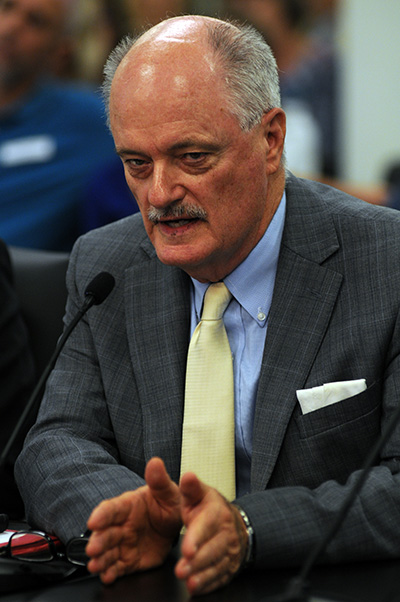
Sen. John Schickel, R-Union, advocates for
homeschoolers to have more access to KEES funds
during an Interim Joint Committee on Education
meeting on Sept. 20. A high-res version of this
photo is available
here.
FRANKFORT—
Kentucky’s homeschooling parents and students
are advocating alongside lawmakers for better
access to state sponsored college scholarships.
Sen. John Schickel,
R-Union, was joined by a homeschooling parent,
two homeschooled students and Mark
Messingschlager, director of financial aid at
Thomas More University, at the Interim Joint
Committee on Education on Tuesday.
Together, they
asked lawmakers to consider potential
legislation that would give Kentucky’s
homeschooled students more access to Kentucky
Educational Excellence Scholarship (KEES) funds.
Homeschooled students are not currently eligible
to earn KEES money through their GPA like
students who attend a certified public or
private school, despite most homeschooled
students being at the same level academically as
certified school students, Schickel said.
“All the data shows that children that are
homeschooled on average, and there's always
exceptions, but on average are some of the best
prepared students for college in the state,”
Schickel said.
Laura Edwards, a homeschooling parent, said
homeschooled students are only eligible for up
to $2,000 of KEES funds while certified students
can earn up to $10,000 in KEES funds. In her
presentation, Edwards shared with the committee
her thoughts on where the current law is not
fair to homeschooled students.
“Kentucky says that college readiness is earning
at 3.0 in high school or higher and an ACT of 18
or higher,” Edwards said. “Currently, our state
scholarship gives KEES awards to students that
have a 2.5 and higher for their GPA and a 15 or
higher on their ACT.
“So the concern here is that we're awarding
state scholarships for college to students who
are not college ready, whereas we have a
population of high school students that have
proven college readiness and cannot get the GPA
award.”
Edwards proposed
several methods to increase eligibility for
homeschooled students. One proposal includes
creating a formula using a student’s GPA from
dual credit college courses or standardized test
scores.
Messingschlager said homeschooled students
“routinely excel” in dual credit courses.
As for potential legislation, Schickel recently
filed Draft Bill Request 226 for the 2023
Regular Session related to KEES awards for high
school students who graduate from a nonpublic
secondary school not certified by the Kentucky
Board of Education. He said, however, he’s not
currently “tied to any bill.”
Rep. Tina Bojanowski, D-Louisville, asked about
the potential cost if homeschooled students were
eligible for more KEES funds.
Messingschlager said the potential cost has not
been calculated, but since statute dictates that
KEES is funded first through the Kentucky
Lottery, the scholarship would remain fully
funded.
Several lawmakers, including Sen. Adrienne
Southworth, R-Lawrenceburg, and Sen. Jimmy
Higdon, R-Lebanon, expressed support for a bill
to give homeschoolers more access to KEES funds
even as the details are still in the process of
being worked out.
“It’s time that we discussed this. It’s a very
worthy cause,” Higdon said.
Southworth said as a homeschooled student in
Kentucky, she had better options to attend
college out of state.
“But if this kind of stuff was around when I was
a homeschool senior, I sure would have even
taken a look at Kentucky schools. But at that
time, it wasn't even on the table for me. And so
I didn't even look at it. So I think it's gonna
be a really good opportunity for our students,”
she said.
During the interim, the Kentucky General
Assembly cannot take any action on legislation.
The 2023 legislative session begins Jan. 3.
The next Interim Joint Committee on Education
meeting is currently scheduled for Oct. 18 at 11
a.m. For more information, visit
legislature.ky.gov.
END
Sept. 1,
2022
Lawmakers hear
from advocates of bourbon barrel tax
FRANKFORT —
Legislators on the Bourbon Barrel Taxation Task
Force say they want to strike a balance between
the success of distillery companies and the
needs of Kentucky communities where they
operate.
The task force held its third meeting of the
year on Thursday, hearing from county officials
about the barrel tax’s impact on local coffers.
Lawmakers established the panel earlier this
year to study the tax structure on bourbon
barrel sales and propose ways to increase
revenue while also boosting jobs. Task force
members are expected to report their findings in
December, ahead of the 2023 legislative session.
One legislator, House Majority Whip Chad McCoy,
R-Bardstown, who is also co-chair of the task
force, said the state must look to the future to
remain successful in the industry. He said one
large distillery in Kentucky has already moved
to Texas, and he fears another could move as
well.
“I just, in my heart, believe that Kentucky can
be so amazing, but we have been so reactive in
our history rather than being proactive,” McCoy
said. “I just keep coming back to my little town
of Bardstown – Bourbon Capital of the World,
trademark. We will lose that Bourbon Trail if we
don’t continue to bring in those new folks who
are not in this room, who are not here, who are
not yet impacted by this.”
Sen. Christian McDaniel, R-Taylor Mill, said no
tax structure is perfect, but everyone must work
together for success.
“Any taxation structure, a county’s taxation
structure or corporate taxation structure or
whatever it is, is a structure for a reason,” he
said “And that reason is you’ve got to look at
it as a whole. If you pick out any given tax,
you can find your flaw in anything, very
simply.”
McDaniel said both distillery firms and
governmental entities are important, and he
encouraged both sides to look for solutions. He
also cautioned that the state general fund and
the budget reserve trust fund are not an answer
to disputes over the tax structure.
During Thursday’s meeting, lawmakers heard from
Jim Henderson, executive director of the
Kentucky Association of Counties, and Jerry
Summers, judge-executive of Bullitt County.
Summers told the panel that, since 2012,
counties have provided about $2.5 billion in
financial incentives to distilleries based on
the expectation of the future barrel tax
revenue. He also cited concerns about some costs
associated with infrastructure near distilleries
in Bullitt County.
“Last year alone, to repair the roads for the
construction for the distilleries in our
community, we spent close to $350,000 out of our
general fund,” Summers said.
Henderson said, though nothing is set in stone
yet, abolishment of the tax would be tough for
some counties. KACo estimates that the barrel
tax generated more than $10 million in revenue
for local taxing districts in 2021, not
including schools.
“There’s just no other way to say it, but that
it does put a hole in the budget of our
counties, our schools, our cities, our fire
departments, our sheriff’s offices, and we just
have to acknowledge that is a fact, unless
there’s something else,” he said.
Henderson argued that the simple solution is to
leave the tax as it is.
Last month, task force members heard from
representatives of the Kentucky Distillers’
Association who voiced concerns that Kentucky
needs to take steps to ensure the viability of
the bourbon industry.
They argued that the amount of barrel taxes paid
by the industry has increased from $10.7 million
in 2009 to $33 million today. That creates a
barrier for new distillers wanting to establish
their operations in Kentucky, they said, and
that other states are structuring taxes in a
more competitive way.
The next meeting of the task force is scheduled
for Sept. 23 at 10 a.m.
END
Aug.
26,
2022
This Week at
the State Capitol
.jpg)
Lawmakers in the House work on a $213 million
aid package for Eastern Kentucky. A high-res
version of this photo is available
here.
FRANKFORT – The
Kentucky General Assembly remained united on
Friday as lawmakers closed out this week’s
special session with a $213 million package for
flood recovery and a plan to help schools in
Eastern Kentucky.
The swift, three-day session – described as both
bipartisan and non-partisan by some – adjourned
after a solemn final day in which lawmakers
reflected on the devastating losses and pledged
continued support for communities across the
eastern portion of the state.
Record flooding in late July claimed the lives
of 39 Kentuckians throughout the region. It also
left behind untold damage to homes, buildings
and infrastructure in multiple counties that
remain under a federal disaster declaration.
Lawmakers said they have been working with the
governor’s office and local officials for weeks
to understand the scope of the disaster and
craft a recovery package that offers immediate
relief while also maximizing support from the
Federal Emergency Management Agency (FEMA).
The legislation signed into law on Friday
establishes the East Kentucky State Aid Funding
for Emergencies, known as the EKSAFE fund, to
assist counties named in the federal
declaration.
It will channel $115 million to the state
Division of Emergency Management, $40 million to
the operations and support services at the state
Department of Education, and $45 million to the
state Transportation Cabinet to repair roads and
bridges.
Those allocations rely on money set aside in
state reserves, and lawmakers said much of the
funding is likely to be reimbursed through FEMA.
The package also includes $12.6 million in
federal funds that were provided to Kentucky
through the American Rescue Plan Act of 2021.
Those dollars will support repairs to water and
sewer infrastructure.
Local governments, utility providers,
non-profits, state agencies and school districts
are all eligible to apply for aid through the
EKSAFE fund.
Friday’s legislation includes additional
provisions to assist schools. It provides
emergency leave for teachers along with more
flexibility in student attendance days and
remote instruction. The $40 million for the
education department may be used for necessary
wrap around services, such as after school
programs, mental health care and transportation.
Throughout the three days, lawmakers recounted
instances of courage and heroism that emerged
during the floods along with countless stories
of desperation and grief. They offered praise
for first responders and the Kentucky National
Guard, and several raised concerns about
displaced residents experiencing delays with
FEMA.
Many legislators were also quick to reiterate
that this week’s relief package is only a first
step in a long road to recovery and said they
expect additional legislation next year when
lawmakers meet in regular session.
The General Assembly is scheduled to convene for
the 2023 Regular Session on Jan 3. In the
meantime, Kentuckians can keep track of
legislative activities during the interim period
by visiting the Legislative Research
Commission’s
website.
Citizens can also share their views on issues
with lawmakers by calling the General Assembly’s
toll-free message line at 1-800-372-7181.
END
Aug.
26,
2022
Lawmakers
approve $213 million package to assist
communities following floods
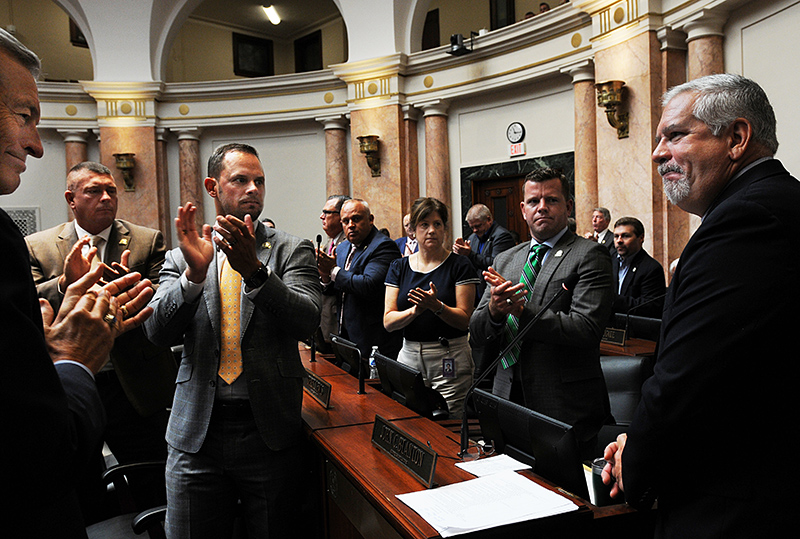
Rep. John Blanton, R-Salyersville, receives a
standing ovation on the House floor following
passage of the Eastern Kentucky relief package.
A high-res version of this photo is available
here.
FRANKFORT — The
Kentucky General Assembly wrapped up a major,
bipartisan push on Friday to send millions in
emergency aid to ravaged communities in Eastern
Kentucky, where dozens have died and thousands
remain homeless in the aftermath of record
flooding.
The House and Senate voted in unison to finalize
a $213 million relief package for flood-swamped
counties that fell under a federal disaster
declaration following several days of torrential
rainfall in July.
Friday’s legislation – House Bill 1 – culminated
a three-day special session that began on
Wednesday with a focus on providing funds for
recovery efforts. Several lawmakers referred to
the package as the first phase in a long
recovery process.
“What we have to do right now is we have to be
attending to immediate needs,” said the bill’s
primary sponsor, Rep. John Blanton,
R-Salyersville. “We’re not really ready to start
looking long term because we still got these
immediate things going on with people living in
tents. They’re living in shelters, and we got to
get a roof over these people’s heads before cold
weather gets here.”
HB 1 establishes the Eastern Kentucky State Aid
Funding for Emergencies – called EKSAFE. It
provides $115 million to the state Division of
Emergency Management for recovery efforts and
$45 million to the state Transportation Cabinet
to repair roads and bridges.
The state Department of Education will also
receive $40 million for building repairs and
necessary wrap around services, such as
after-school programs, mental health care and
transportation.
The bill also gives local school boards more
flexibility when it comes to construction bids
to help expedite the process. In addition, it
lets school districts waive up to 15
instructional days and use 20 remote instruction
days. It also gives teachers emergency leave
days if a teacher needs to miss school to assist
in recovery efforts, such as attending a meeting
with Federal Emergency Management Agency
officials.
Government entities or nonprofits that receive
money from the EKSAFE fund and subsequently
receive monies for the same damages from FEMA
will be required to refund the EKSAFE fund,
Blanton said.
Nearly $12.7 million in fiscal year 2022-2023
from the State Fiscal Recovery Fund of the
American Rescue Plan Act of 2021 is also
earmarked for EKSAFE. Funds will be used to
repair water and sewer infrastructure.
Lawmakers said the funding approved this week is
just the beginning, and Blanton stressed that
$75 million of the funds channeled toward
Emergency Management can be used for immediate
housing such as trailers.
Senate President Robert Stivers, R-Manchester,
and the lead sponsor for the relief package in
the Senate said on Thursday that some residents
are frustrated with the bureaucracy at FEMA.
“The federal government has not moved fast
enough,” he said.
The more people from the federal government who
arrive in the damaged areas, the better, Stivers
said.
“I think we’ve taken a step that we’ve had to
take in getting this through,” he said. “I think
the key and critical component now, from
first-hand experience, is for the federal
government to get out on the ground, reach out
to these people, get assessments and the dollars
that they are justly entitled and qualified for
out the door and into their hands.”
Stivers said the second phase is for legislators
to meet with those in the executive branch
during the 2023 Regular Session.
Throughout the week, several other legislators
recounted the things they saw in Eastern
Kentucky. One of them was Rep. Chris Fugate,
R-Chavies, who represents Breathitt, Owsley and
Perry counties. There are about 2,800 people
without housing in his district due to the
floods. He thanked everyone who has helped
people directly and those who donated supplies.
“We’ve got a lot of rebuilding to do,” Fugate
said. “Not just material things, but the lives
and the minds who lost their family members, who
now when it thunders or lightning flashes,
they’re scared to death.”
Sen. Brandon Smith, R-Hazard, said the General
Assembly missed the mark by not providing an
additional $50 million for housing that was
included in the amendment he sponsored. However,
he said he’s grateful for the support he has
received so far, and he’s aware of a long-term
plan to help.
“There are children on river banks and in
hollows,” he said. “There are 7,000 of them, if
you want to see the numbers, that are in some
sort of displaced shelter where the walls are
missing, there’s a tarp, and that’s on us to fix
it. There’s nobody else to blame. We are the
leaders, and we had a chance with my amendment
to put $50 million in there to get aid to them
immediately.”
On Friday afternoon the governor was joined by
Stivers and Speaker of the House David W.
Osborne, R-Prospect, in the Capitol Rotunda for
the signing of HB 1.
The House and Senate adjourned sine die, and
will not convene again until the regular session
begins Jan. 3, 2023 or until the governor calls
the General Assembly to an extraordinary
session.
END
Aug.
24,
2022
Lawmakers hear
pleas to require training for bar bouncers
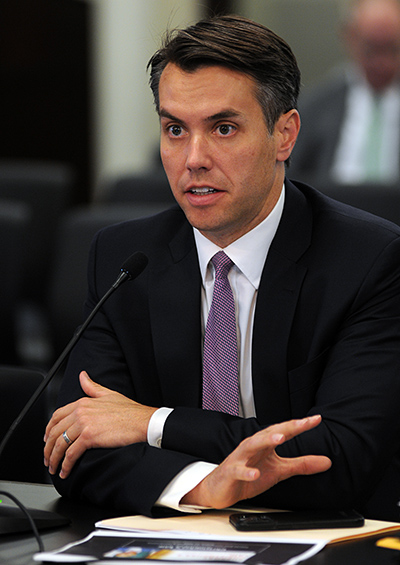
Senate Minority Floor Leader Morgan McGarvey,
D-Louisville, testifies on a proposal for
bouncer training standards at Wednesday's
Interim Joint Committee on Licensing,
Occupations, and Administrative Regulations. A
high-res version of this photo is available
here.
FRANKFORT —
Supporters of proposed legislation to establish
training standards for bouncers testified
Wednesday before the Interim Joint Committee on
Licensing, Occupations, and Administrative
Regulations.
The widower of Christopher McKinney, Nick Clark,
said regulations are needed to prevent deaths
like ones that happened in Georgia, Tennessee
and Pennsylvania, along with his spouse’s in
Louisville. McKinney died from blunt force
trauma to the head following an interaction with
a bouncer at a bar in 2020.
Christopher’s Law would require bouncers to
receive training developed by the Department of
Alcoholic Beverage Control on de-escalation
tactics, interpersonal communication, threat
mitigation and more. Advocacy has been a true
grassroots effort, Clark said.
“Just like our police force, military,
firefighters, lifeguards, teachers and basically
any other profession, has to have training,” he
said. “Bouncers who are hired to protect the
most vulnerable in an alcohol driven environment
do not have to have any training or special
skills. Most are hired by word of mouth,
physical stature and through social media.”
The hearing was not part of the special
legislative session that began on Wednesday to
address issues related to flooding in Eastern
Kentucky. Instead, it was part of the interim
period when lawmakers consider proposals for the
next regular session that starts in January.
Senate Minority Floor Leader Morgan McGarvey,
D-Louisville, and Rep. Lisa Willner,
D-Louisville, have both sponsored similar
legislation on training bouncers in the past.
McGarvey told the committee that Clark and
others have been strong advocates and have
helped craft the legislation over a couple of
years, taking suggestions from everyone from
retailers to the owners of bars and restaurants.
McGarvey asked committee members to think of all
the different professions that come in front of
the committee.
“There is far more regulation, licensing and
oversight of someone who is giving you a
pedicure, of someone who is cutting your hair,”
he said. “There is nothing related to bouncers.”
Sen. John Schickel, R-Union, and co-chair of the
committee, offered condolences.
“First of all, I just want to extend my sincere
sympathy on behalf of myself and this entire
committee for your loss,” he said. “I can only
imagine the pain you are going through. This is
very recently. I didn’t realize how recent it
is.”
Schickel said he used to be a part-time bouncer
when he was a police officer.
“And you’re right, they get thrown into
situations, very dicey situations, with little
or no training. You’re very right about that,”
he said.
Nick Clark’s father also testified during the
meeting. He called McKinney’s death senseless
and a preventable tragedy. He said it could
happen to anyone.
“Christopher was the kindest, most loving and
thoughtful human being you could ever meet, and
our family is heartbroken and miss him every
day,” Kenny Clark said.
Rep. Adam Koenig, R-Erlanger, and co-chair of
the committee, expressed sympathy to McKinney’s
relatives, and asked for confirmation that
organizations on a list given to committee
members approved of the proposed legislation and
changes made to it. They include the Kentucky
Restaurant Association, the ACLU of Kentucky and
other groups.
Nick Clark responded they have seen the new
language and are supportive of the bill.
For more information on the Kentucky General
Assembly and the legislative interim, visit
legislature.ky.gov.
END
Aug.
24,
2022
Kentucky
General Assembly unveils Eastern Kentucky flood
relief package
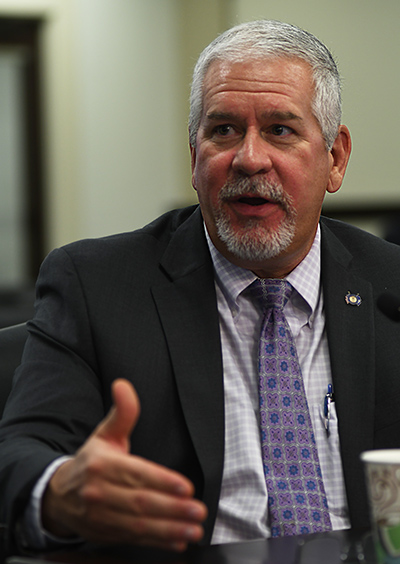
Rep. John Blanton, R-Salyersville, speaks on the
proposed Eastern Kentucky flood relief package
during a joint meeting of the House and Senate
Appropriations and Revenue Committees. A
high-res version of this photo is available
here.
FRANKFORT—
Kentucky lawmakers unveiled a nearly $212
million relief package on Wednesday to aid
communities in Eastern Kentucky still reeling
from the devastating floods that claimed dozens
of lives last month.
The House and Senate gaveled into the first day
of what is expected to be a three-day special
session focused on emergency funding and
recovery efforts in at least 11 counties
affected by the record flooding.
On July 28, 39 Kentuckians lost their lives
following several days and one long night of
heavy rainfall across the eastern portion of the
commonwealth.
The relief package, known as House Bill 1 and
Senate Bill 1, will appropriate $200 million
from the budget reserve trust fund and more than
$12 million from the American Rescue Plan Act
funds to establish the East Kentucky State Aid
Funding for Emergencies fund, known as the
EKSAFE fund.
The House and Senate Appropriations and Revenue
Committees held a joint meeting Wednesday
afternoon to discuss the relief package, which
is the result of weeks of nonpartisan work
between the legislative and executive branches.
HB 1 sponsor and Eastern Kentucky Rep. John
Blanton, R-Salyersville, told the committees
unless you’ve seen the devastation firsthand, it
is “worse than you imagined.”
“You may see the pictures, yeah, but you don’t
get the smells,” Blanton said. “You don’t get
the sounds. You don’t get any of those things.”
Both Blanton and SB 1 sponsor Senate President
Robert Stivers, R-Manchester, described the need
in Eastern Kentucky as substantial.
Stivers said it will take months to fully know
the extent of the flood’s damage.
“You go to Buckhorn School where they had six
feet of water in it, you don’t really know what
the extent of damage is and the damage that
isn’t really known yet,” Stivers said. “… There
is a potential it could be saved or it may have
to be totally torn down depending on mold,
contagion from things that were in the water,
structural damage underneath.”
The relief package is broken down as follows:
�
$115 million to the military affairs budget unit
in the Division of Emergency Management,
�
$40 million to the operations and support
services budget unit in the Department of
Education,
�
$45 million to the highways budget unit in the
Transportation Cabinet to repair roads and
bridges,
�
and $12 million in ARPA funds to repair water
and sewer infrastructure.
Blanton said city, county and urban governments;
consolidated local governments, unified local
governments, charter county governments,
nonprofit or public utility service providers,
state agencies and school districts are eligible
to use EKSAFE funds.
The fund will not cover any new construction
inside the 100-year floodplain, according to the
bill.
The bill will also give the school districts in
the impacted counties flexibility in student
attendance days and remote instruction and
emergency leave for teachers. The $40 million
allocated to the Department of Education in the
fund may be used for necessary wrap around
services, such as after school programs, mental
health care and transportation.
On the Senate floor, Majority Floor Leader Damon
Thayer, R-Georgetown, said this relief package
is “just the beginning.”
“We will be back here in January when we will
have an even better understanding of the length
and width of the damage done in our counties,”
Thayer said.
There is a bicameral desire to complete business
as quickly as possible, Thayer added, with the
hope to finish early Friday afternoon.
The House and Senate is scheduled to reconvene
for day 2 of the 2022 Special Session at 4 p.m.
on Thursday.
END
Aug.
23,
2022
Lawmakers
updated on National Guard flood response
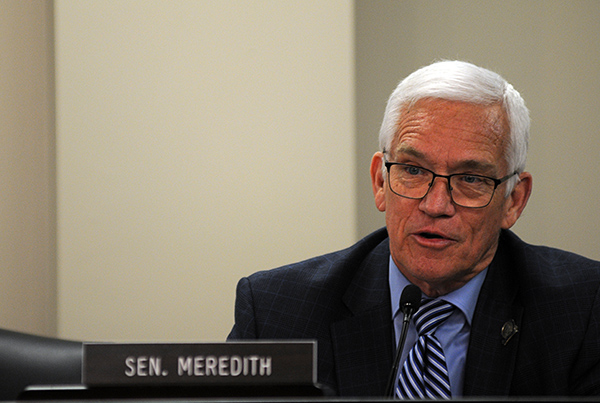
Sen. Stephen Meredith, R-Leitchfield, asks a
question about the Kentucky National Guard at
Tuesday's Interim Joint Committee on Veterans,
Military Affairs and Public Protection meeting.
A high-res version of this photo is available
here.
FRANKFORT —
Lawmakers received an update on Tuesday from the
state’s adjutant general on how the Kentucky
National Guard has responded to catastrophic
flooding this summer in the eastern part of the
commonwealth.
Brig. Gen. Haldane B. Lamberton, the state’s
53rd adjutant general, testified before the
Interim Joint Committee on Veterans, Military
Affairs, and Public Protection.
He said the Kentucky National Guard and those in
emergency management have teamed with local
officials, Kentucky State Police, the Civil Air
Patrol, aviation experts from Tennessee and West
Virginia, and others to assist people affected
by the flooding.
In the first few days of the disaster,
responders conducted 1,350 rescues or movements
of people from flooded areas, he said. “That’s a
huge number.”
Lamberton recounted how two flight medics
dropped down on a hoist while water was rising
at a house with people still inside. The medics
had to break through the roof to hoist them out.
The residents’ lives were at risk, but so were
the lives of the military personnel, Lamberton
said. For their selfless efforts, the two are
under consideration to receive the Distinguished
Flying Cross.
Sen. Jimmy Higdon, R-Lebanon, said he is
grateful for the work of those who serve in the
military.
“I speak for many when I say we’re proud of our
National Guard,” he said. “Thank you for all you
do.”
Thirty-seven guardsmen were affected by the
flooding themselves, yet they helped others,
Lamberton said.
The Guard now has personnel in three counties,
where they are distributing water and other
supplies. Also, liaison officers from the Guard
are linked up with local officials and emergency
management staff in the three counties to assist
those affected by flooding, he said.
“It gave them their own guardsmen, someone they
could reach out to,” Lamberton said.
Rep. Bill Wesley, R-Ravenna, said videos and
photos of the affected area can’t completely
convey the level of destruction caused by the
flooding. However, the teamwork has been
important.
“To see these people at work in Breathitt
County, where I’m at, is a mind blower,” he
said.
Sen. Stephen Meredith, R-Leitchfield, asked
Lamberton about the impact two natural disasters
– the recent flooding and tornadoes in Western
Kentucky last December – have had on recruiting
and retention efforts.
Lamberton said it has not been a strain on the
Kentucky National Guard for varying reasons.
In addition, the Emergency Management Assistance
Compact between agencies to coordinate relief
efforts has helped provide flexibility and
resources, he said. “We’ll go to their aid, and
they’ll come to our aid.”
COVID-19 changed the way the Kentucky National
Guard recruits, because the emphasis shifted
from high school students to those at colleges,
he said.
Lamberton added that many people in the United
States aren’t familiar with the military, but
watch military-related movies or hear stories
from veterans. He said service in the military
needs to be kept in the public’s eye.
“They really have no idea what military life is
like. And unless we can find a way to somehow
change that awareness or dynamic, I think there
will continue to be some recruiting issues,” he
said.
Meredith and Rep. Jim Gooch Jr., R-Providence,
asked questions about COVID-19 vaccinations.
Lamberton said the Guard has an 87% vaccination
rate, and military officials are working through
exemptions for medical or religious reasons.
“It’s a medical readiness issue,” he said,
adding that the Novavax vaccine might be a
choice for those who decline to receive other
vaccines on religious grounds.
The Guard is
expected to have the latest recruitment numbers
in October, Lamberton said.
END
Aug. 18,
2022
Judiciary
committee hears testimony on law to combat
organized retail crime
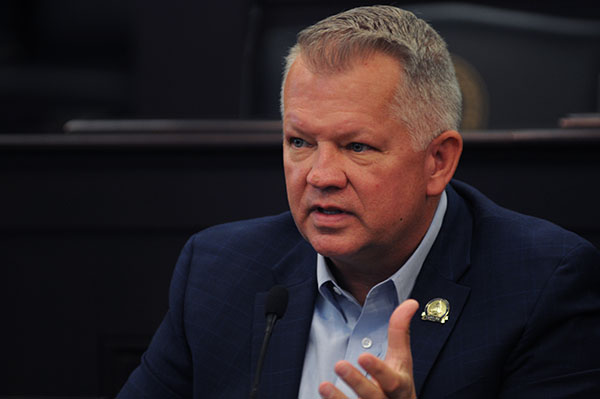
Sen. Danny Carroll, R-Benton, speaks on
organized retail crime during the Interim Joint
Committee on Judiciary meeting. A high-res
version of this photo is available
here.
FRANKFORT— The
Interim Joint Committee on Judiciary heard
testimony on Thursday about a potential law to
address the threat of organized retail crime.
Shannon Stiglitz, the
senior vice president of government affairs for
the Kentucky Retail Federation, was joined by
representatives from Walgreens and Kroger to
share the effect of organized retail crime in
Kentucky.
The FBI defines organized retail crime as
“professional burglars, boosters, cons, thieves,
fences and resellers conspiring to steal and
sell retail merchandise obtained from retail
establishments by theft or deception.” Much of
the stolen merchandise ends up on online
marketplaces.
“Each Kentuckian is paying about $164 more a
year on the products they buy because of
(organized retail crime),” Stiglitz said, adding
that retail theft is not a victimless crime.
Stiglitz emphasized that organized retail crime
refers to organized groups of people, not an
individual shoplifter who will steal only the
things they want or need. She also noted that
some of these groups are violent toward anyone
who interferes with them as they steal.
Stiglitz encouraged lawmakers to consider
enacting the Integrity, Notification and
Fairness in Online Retail Marketplaces for
Consumers, or the INFORM Act. It would require
online marketplaces to collect certain
information from high-volume, third-party
sellers to verify that the products are legal.
Eleven states already have the INFORM Act in
place.
Stiglitz said organized retail crime costs the
state and local governments in Kentucky about
$54 million annually.
After the presentation, lawmakers discussed
whether Kentucky’s current laws on theft are
strong enough.
“What you all are presenting to us, it’s not
going to get any better until we change our
philosophy,” Sen. Danny Carroll, R-Benton said.
“Until we go back to treating criminals as
criminals and holding them accountable for what
they do, it’s not going to get any better.”
Carroll said he believes the legislature is
going in the “wrong direction” when it comes to
criminal justice reform.
Stiglitz did mention laws Kentucky already has
to combat organized retail crime during her
presentation. KRS 506.120 makes organized retail
crime a class C felony. She said some
prosecutors and law enforcement officers are not
aware of this law and how to use it, so
education is an important factor in addressing
the issue.
Rep. Jason Nemes, R-Louisville, said he believes
Kentucky’s criminal penalties are sufficient and
that judges and prosecutors need to do their
part in enforcing the laws.
“Our laws on the conduct we’re talking about
today subject someone to prison for five to 10
years,” Nemes said. “That’s pretty doggone
serious. I don’t know how much more serious the
General Assembly needs to be.”
Rep. McKenzie Cantrell, D-Louisville, questioned
how the INFORM Act might affect small businesses
while recognizing the legislation would not
apply to individuals looking to sell a few items
of personal property.
“I think we all know a lot of those are
legitimate businesses that a lot of us like to
purchase from, and that would be unnecessarily
putting some more burdens on those small
businesses,” Cantrell said. “How can we balance
that a little bit?”
Stiglitz said most small businesses would
already have the information required in the
INFORM Act on hand if they have acquired a small
business license through the Secretary of
State’s office.
In closing, Stiglitz said she did not want her
presentation to appear as if the Kentucky Retail
Federation is looking for enhanced criminal
penalties.
“We want you to understand we want
accountability and transparency and consumer
protections, and that is what this is about,”
she added.
As of Aug. 18, the INFORM Act had not been
pre-filed as potential legislation for the 2023
legislative session. During the interim, the
Kentucky General Assembly cannot take any action
on legislation. The 2023 legislative session
will begin Jan. 3.
The next Interim Joint Committee on Judiciary
meeting is currently scheduled for Sept. 22 at
11 a.m. For more information, visit
legislature.ky.gov.
END
Aug. 17,
2022
Lawmakers
express concerns, support for those in flooded
areas
081622b.jpg)
Rep. Cherlynn Stevenson, D-Lexington, speaks on
the devastation following July’s flooding in
Eastern Kentucky during the Interim Joint
Committee on Transportation meeting. A high-res
version of this photo is available
here.
FRANKFORT —
Lawmakers from Eastern Kentucky and other areas
of the state expressed heartfelt concern Tuesday
for those adversely affected by July’s
torrential flooding.
State officials from the Kentucky Transportation
Cabinet testified before the Interim Joint
Committee on Transportation to provide an update
on the recovery efforts, and several legislators
took turns describing the extreme devastation.
Rep. Cherlynn Stevenson, D-Lexington, said she’s
from Knott County and has relatives who still
reside there.
“These photos cannot prepare you for what you
see. And when you drive up a holler and see
houses that are just gone. They’re just gone,”
she said. “It’s so hard, and it’s so hard not to
be there every day. It’s hard to be here and
still do what I need to do and not be there.
I’ve been there as much as I possibly could.”
The people in affected areas need help with
manual labor because some situations remain
dire, Stevenson added. “There are still people
sitting in houses caked in mud. There are people
living in tents and people need help.”
Sen. Johnnie Turner, R-Harlan, said he went
through a bad flood in 1957, but the recent
flooding was truly traumatic. He and people from
“everywhere” are working in the damaged areas.
“Three of the counties were my counties, and
I’ve been hands-on with helping deliver from the
helicopter to my truck – four days in a row
hauling gallons of water,” he said.
Turner reported that devastation is far and
wide.
“It’s just so terrible. Pictures are just a
minute part of what you see when you drive
there, and every house that I picked up
truckload after truckload have set everything
outside, and they have nothing. I mean they have
nothing,” he said.
Rep. Ashley Tackett Laferty, D-Martin, was among
several who said she’s grateful for assistance
in the recovery.
“As many of you know, I represent Eastern
Kentucky. I represent Floyd and Pike counties,
and I live in District 12. So I understand the
transportation department, how hard they’ve been
working. I don’t know where to begin in saying
thank you,” she said.
Travel trailers and lodging at state parks are
being used to house those affected by flooding,
and Tackett Laferty said it’s an immense
undertaking.
“Jenny Wiley State Park is housing, lodging, in
the hotel, 177 people in our community. I didn’t
even realize our resort park held that many
people,” she said.
Rep. Sal Santoro, R-Union, asked the
transportation cabinet officials about water and
electrical service.
Transportation Secretary Jim Gray said most
electricity has been restored, but water is
going to be a different story. The early
priority was getting roads passable so utility
personnel could get to areas to fix them. He
said water has been restored near plants, but
repair is more challenging in areas far from
plants.
Rep. Tom Smith, R-Corbin, asked if similar
rainfall happened in other parts of the state
would it be as cataclysmic.
Gray said he was not sure, but damage could
certainly happen in any part of the state.
“Damage to infrastructure is enormous,” he said.
Examining the damage and working on inventory is
still ongoing, Gray said, and officials are
seeking to determine the cost of rebuilding.
“You really can’t find the right adjectives to
describe it. I think it would have been
destructive anywhere, but I suspect it is even
at a higher level here. And it’s going to be a
time to get the rebuild done,” he said.
Committee Co-chair Jimmy Higdon, R-Lebanon, said
he saw many foundations that no longer have
houses on top.
“I will say this – seeing is believing. I’ve
seen floods before, but driving that day, it was
like a flood and a tornado combined,” he said.
Although a special legislative session has yet
to be officially announced, Higdon said one may
be on the way soon.
“Our hearts go out to the people of Eastern
Kentucky that are suffering, and we will have a
special session I understand here shortly. Maybe
we could be of additional help, and you’ll see
the commitment from the General Assembly to
help,” he said.
END
Aug. 12,
2022
Lawmakers
voice concerns about proposed changes to federal
nursing staff rules
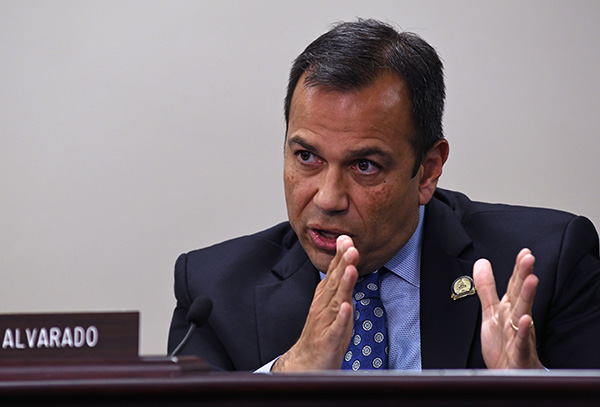
Sen. Ralph Alvarado, R-Winchester, speaks on
proposed federally mandated staffing ratios for
nursing facilities during a Medicaid Oversight
and Advisory Committee meeting. A high-res
version of this photo is available
here.
FRANKFORT —
Lawmakers expressed concern Thursday during a
meeting of the Medicaid Oversight and Advisory
Committee that proposed federal staffing
mandates for nursing facilities could lead to
severe challenges in Kentucky.
Those who operate nursing facilities told
legislators they have been dealing with staff
shortages exacerbated by COVID-19, and the
proposed changes will make matters even more
difficult for them.
“I am averaging $118,000 net loss each and every
month of this year. If we don’t get some help
within months, we’re going to go out of
business,” said David McKenzie, owner of The
Jordan Center in Louisa, which has suffered from
staffing challenges amid the pandemic.
Becky Johnson, president of the Kentucky
Association of Health Care Facilities and the
Kentucky Center for Assisted Living, said she
does not know where all the personnel will come
from to meet the proposed mandates for the
federal 2023 fiscal year.
According to her testimony, current federal
regulations require nursing homes to provide
licensed nursing services 24 hours a day, with a
registered nurse on staff for at least eight
consecutive hours a day, seven days a week.
Kentucky’s total nursing hours – which include
staffing by registered nurses, licensed
practical nurses and aides – is above the
national average with 3.78 staffing hours,
Johnson said. It would cost providers nearly
$10.1 billion annually to meet the minimum
staffing if the federal mandates require 4.1
hours per patient day, Johnson said.
She cited a study from the American Health Care
Association showing that nursing homes would
have to hire an additional 187,000 nurses and
nurse aides.
Karen Venis, chief executive officer of Sayre
Christian Village in Lexington, said the
proposed changes are worrisome.
“For us, the concern is where are the people
going to come from,” she said. “I think for our
team it’s just going to add another layer of
pressure that already exists. Next to a nuclear
power plant we’re one of the most heavily
regulated industries out there.”
Sen. Ralph Alvarado, R-Winchester, said if
facilities close, it would be catastrophic and
cause some people to seek care at hospitals. He
said medical providers who don’t spend any time
in nursing homes often have no idea that nursing
homes face much stricter requirements.
“I live it. I see it every day, and it’s coming
very, very soon, where you’re going to have
facilities that are major employers in our
communities and a lot of those folks will be
suddenly unemployed,” he said.
Finding qualified medical personnel to fill the
jobs can be very difficult, Alvarado added.
“These are individuals who choose where they
want to work, and if they don’t want to work in
that setting, we can’t force them to work in the
setting.”
Rep. Lisa Willner, D-Louisville, also expressed
concerns.
“It’s overwhelming and it’s daunting – the
challenges we’re facing, and I hear so often
about the health care force dwindling because
people are leaving,” she said.
Co-chair Sen. Stephen Meredith, R-Leitchfield,
said information about how inflation is
affecting nursing facilities would be helpful
along with the development of a five-year plan
to address staffing issues.
“Maybe as legislators and industry leaders, we
need to talk about what the ideal staffing ratio
is and develop like a five-year plan as to how
do we get there rather than just throw it out
there because all the issues you’ve identified
are certainly real and they’re challenges,” he
said.
Sen. Danny Carroll, R-Benton, said long-term
facilities are not the only groups facing higher
labor costs. He also suggested that the health
facilities association and the assisted living
center think about including child care
facilities as part of long-term facilities.
“I think it’s important to remember also the
effects that our long-term care facilities are
feeling and their reaction having to increase
pay. There’s a trickledown effect of that to
other types of providers. It’s running a day
program. You know we have had to increase our
pay for (certified nursing assistants)
tremendously,” he said.
END
July 26,
2022
Task force
hears testimony on child care issues, solutions
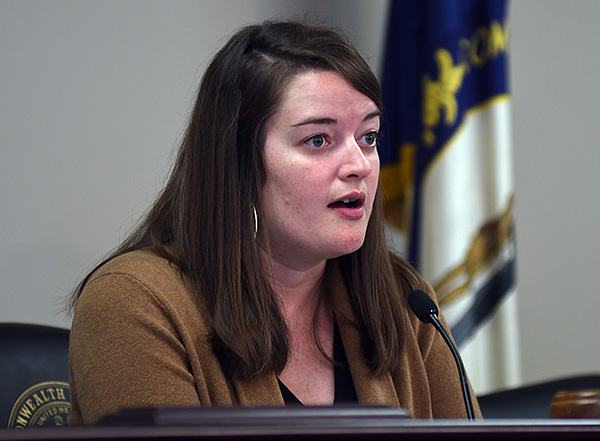
Rep. Samara Heavrin, R-Leitchfield, leads
Tuesday's Early Childhood Education Task Force
meeting. A high-res version of this photo is
available
here.
FRANKFORT— Child care
and work force participation were among many of
the issues the Kentucky General Assembly made
efforts to address during the last legislative
session, and that work continues during the
interim.
The Early Childhood Education Task Force heard
testimony from the Kentucky Chamber of Commerce,
the U.S. Chamber of Commerce Foundation, the
Kentucky Cabinet for Health and Family Services’
Department for Community Based Services (DCBS),
Toyota Motor Manufacturing Kentucky Inc. and the
Rockcastle Regional Hospital and Respiratory
Care Center on Tuesday.
DCBS representatives gave lawmakers an update on
the implementation of House Bill 499 from the
2022 legislative session. Task Force Co-Chair
Rep. Samara Heavrin, R-Leitchfield, was the
primary sponsor of the bill.
HB 499 creates a public and private partnership
pilot program that incentivizes employers to
contribute to the child care cost of its
employees. The program will officially begin
accepting applications on April 2, 2023.
Charles Aull, senior policy analyst with the
Kentucky Chamber of Commerce, shared statistics
that show 45,000 to 50,000 Kentuckians are not
able to work due to child care.
“If we were to take that 45,000 people and
remove those barriers for them and then bring
them into the workforce, that could increase our
labor force participation rate by more than a
full point,” Aull said. “To put that into
context, it is very, very difficult to move a
full point in your labor force participation, so
being able to do that would be extraordinary.”
According to Aull, there are approximately
180,000 jobs available in Kentucky and only
70,000 to 80,000 Kentuckians who are unemployed
and actively seeking work. In a 2021 report from
the Kentucky Chamber, child care was named one
of the top root causes of Kentucky’s workforce
crisis, with the cumulative economic impact in
Kentucky being between $2.12 billion and $3.23
billion.
In addition to ensuring the success of HB 499,
Aull suggested the Kentucky General Assembly
should consider stabilizing the child care
assistance program, studying local zoning
ordinances, funding the early childhood
development scholarship and more.
Task Force Co-chair Sen. Danny Carroll,
R-Benton, said he believes the Chamber’s
proposals are “excellent.”
Toyota Motor Manufacturing in Georgetown and
Rockcastle Regional Hospital and Respiratory
Care Center in Rockcastle County are among the
businesses in Kentucky already offering child
care at a discounted rate to its employees.
Rep. Josie Raymond, D-Louisville, asked Sandy
Nott, Toyota Kentucky’s vice president of
administration, if Toyota has to invest
additional money to cover the cost of its
childcare centers, and how Toyota measures its
return on investment.
Nott said Toyota does contribute to covering the
cost of its child care program.
“Just having that child care development center,
we believe, is an advantage for us when it comes
to hiring and retaining,” Nott added.
Carroll noted that cost is a major issue when it
comes to child care and not just for families.
“The losses … I think that is at the base of
this task force and it is at the base of the
structure issue that we have with child care in
the Commonwealth and everywhere. It’s just not
sustainable,” he said.
The Early Childhood Education Task Force is a
special committee of eight lawmakers who study
and review early childhood caregiving along with
educational structures and operations in
Kentucky. The next meeting is currently
scheduled for Aug. 24 at 1p.m.
For more information on the task force and the
interim calendar, visit legislature.ky.gov
END
July 21,
2022
Lawmakers hear
testimony from advocates, critics of kratom
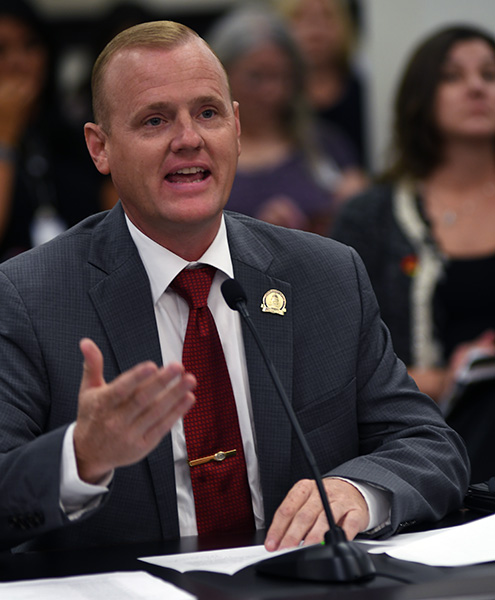
Rep. Josh Calloway, R-Irvington, speaks about
kratom at Wednesday’s Interim Joint Committee on
Health, Welfare, and Family Services. A high-res
version of this photo is available
here.
FRANKFORT — A
plant commonly known as kratom, which can lead
to stimulant or sedative effects, spurred
discussion among legislators Wednesday during a
meeting of the Interim Joint Committee on
Health, Welfare, and Family Services.
According to the National Institute on Drug
Abuse (NIDA), kratom and kratom-based products
are now legal and obtainable in the United
States, but international agencies are still
gathering information about them.
During the 2022 legislative session, Rep. Josh
Calloway, R-Irvington, sponsored House Bill 569,
which would have prohibited a kratom processor
or kratom retailer from dispensing, selling or
distributing any kratom extract or kratom
product to anyone under 21 years of age.
HB 569 did not pass this year, but Calloway told
committee members that kratom use in Kentucky
needs to be addressed due to safety concerns.
“I’m not saying that it doesn’t have good uses
for lots of things,” he said. “I’ve had
thousands of people that have literally reached
out to me over this particular issue when I
filed the ban. But the fact is right now we
can’t ban it because we don’t have the support
to do so, and we cannot sit here and do nothing
because it is so readily available and
unregulated. Kids can literally go buy this in
gas stations.”
Calloway said the U.S. Food and Drug
Administration needs to make important decisions
regarding kratom, but he wants the state to take
action as well.
Those both for and against the plant presented
information about its use and effects and took
questions from lawmakers.
Sen. Karen Berg, D-Louisville, asked about the
purity of kratom.
“How do we know that we’re getting a product
that is free of contaminations and not simply be
relatively certain of that,” she said.
Mac Haddow, Senior Fellow on Public Policy at
the American Kratom Association, said
manufacturers of kratom in unregulated settings
do not test for contaminants, but they would be
required to under proposed consumer protections
in the bill.
He said the purity level couldn’t be eliminated
to zero risk, but it would be safer if the
consumer protection act were in place and the
manufacturers were required to produce an
independent certificate of analysis documenting
compliance.
Haddow testified that the scientific evidence
does not justify scheduling the drug. He also
pointed to studies showing that kratom can serve
as a harm reduction tool to reduce the use of
opioids.
But Dr. Alan Shultz, Chief Executive Officer and
Owner of New Day Recovery Center in Lexington,
said he opposes the use of kratom because it can
lead to addiction and serve as a gateway drug.
“What I want to be crystal clear about is we’re
taking about an addictive drug. Period. End of
sentence,” he said. “Now we can call it a
natural substance. We can say that indigenous
people use it. True for cocaine as well,
tobacco, opium.”
Sen. Ralph Alvardo, R-Winchester, and Co-Chair
of the committee, noted that HB 569 included a
trigger clause that would honor a decision by
the FDA or the U.S. Drug Enforcement
Administration to make kratom a scheduled drug.
Rep. Kimberly Poore Moser, R-Taylor Mill, said
she would prefer for government agencies to take
the lead concerning regulation of kratom.
“I would like to add that science is critically
important for the researchers and for the FDA
and for NIDA to determine how to handle this,
not legislators. I think our job is to protect
consumers…,” she said.
It’s time for the agencies to move ahead, she
added.
“I don’t like legislators being put in the
position of determining whether or not something
is a medication or whether or not something
should be completely banned,’ Moser said. “I
think that this is an important issue as are
other drugs that have come before our committee
and our legislature, and I think the FDA and
NIDA need to take a stand on this.”
END
July 19,
2022
Legislative
committee hears testimony on election security

Rep. Jason Nemes, R-Louisville, comments on
election security at the Interim Joint Committee
on State Government meeting on Tuesday. A
high-res version of this photo is available
here.
FRANKFORT— The
Interim Joint Committee on State Government
spent Tuesday afternoon hearing testimony on
election security in the Commonwealth.
Assistant Secretary of State Jenni Scutchfield
and Karen Sellers, the executive director for
the State Board of Elections, testified
alongside representatives from voting system
companies Election Systems and Software (ES&S),
Harp Enterprises Inc. and Hart InterCivic Inc.
“Our elections are secure. There are things to
improve, but I believe in our elections,” Rep.
Jason Nemes, R-Louisville, said.
Scutchfield’s presentation focused on what
Kentucky does to ensure election integrity. In
order to vote in Kentucky, a voter must have a
valid photo ID, she said. For absentee voters,
their ballots undergo an enhanced signature
verification process, and voters can track their
absentee ballot online.
In addition, Kentucky has implemented a ban on
ballot harvesting, expanded its audit process,
increased video surveillance of voting machines
and cleaned-up its voter rolls.
Senate Majority Floor Leader Damon Thayer,
R-Georgetown, asked Scutchfield to go into more
detail about the voter roll clean-up process.
For the last couple of years, the Kentucky
Secretary of State’s office has been reaching
out to voters to update their voter
registration, Scutchfield said. The state has
also used death certificates to remove dead
voters and info from the Administrative Office
of the Courts to remove convicted felons.
Kentucky is also in the process of transitioning
back to paper ballots. Only 11 out of Kentucky’s
120 counties have not yet fully transitioned to
paper ballots, Sellers said. Every county is
expected to be using paper ballots by 2024,
Scutchfield added. These paper ballots are
counted by machines that are not connected to
the internet.
“I think it is very important to state over and
over again that the voting machines are not
connected to the internet,” Scutchfield said.
“They do not have modems within them. The
internet has nothing to do with voting and
Kentucky totals.”
Representatives from ES&S and Harp Enterprises
shared with lawmakers how their machines undergo
rigorous testing to ensure they’re working
properly. Sellers said that testing is open to
the public.
The voting machines also have a variety of
features to prevent tampering, the voting
systems representatives said.
Ross Roberson, vice president of sales for Harp
Enterprises Inc., said there is no way for its
machines to be connected to the internet. The
machines are also designed to detect anything
foreign that is hooked up to the machine.
“There’s hash files on the machine. It’s looking
for matching hash files, and if these do not
match, it will shut itself down,” Roberson said.
“It shuts itself down purposely to make sure
nothing has tampered with the equipment. No
malware or any of that can be placed on the
machine.”
Tucker Omel, ES&S senior sales engineer,
testified ES&S has similar safeguards on its
machines that cause them to automatically shut
down at any detection of tampering.
Sen. Adrienne Southworth, R-Lawrenceburg, shared
some of her thoughts on election security,
including the idea of returning to counting
paper ballots by hand.
During her presentation, Scrutchfield said
hand-counting ballots increases the risk of
fraud and causes significant delays in election
results, which is why the state constitution was
changed in the 1940s to allow ballots to be
counted by machine.
House Minority Caucus Chair Derrick Graham,
D-Frankfort, summed up his thoughts on Tuesday’s
presentations.
“What I have seen today is that our election
process, as I said earlier, are secure and
safe,” he said.
Thayer said he agrees with Graham. He also asked
and confirmed there is not any evidence any of
Kentucky’s machines have been tampered with.
“I feel pretty good about the state of our
elections here, and spreading disinformation
about the electoral process is not good for our
republic. It depresses voter turnout,” Thayer
said.
The next Interim Joint Committee on State
Government will take place at the Kentucky State
Fair in Louisville at 11 a.m. on Aug. 25.
For more information
on the Kentucky General Assembly, visit
legislature.ky.gov
END
July 15,
2022
State leaders
discuss school safety with legislative committee
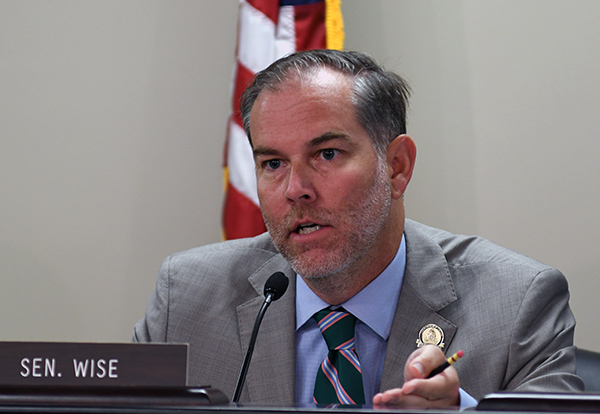
Committee co-chair Sen. Max Wise,
R-Campbellsville, asks a question on school
safety at the Interim Joint Committee on
Education meeting on Friday. A high-res
version of this photo is available
here.
FRANKFORT��— The
first day of school will be here soon, and
safety is on the minds of parents, teachers,
students and Kentucky lawmakers.
Jon Akers, the
director of the Kentucky Center for School
Safety, and Ben Wilcox, the state school
security marshal with the Kentucky Department of
Criminal Justice Training, spoke with lawmakers
about school safety at the Interim Joint
Committee on Education meeting on Friday.
In 2019, the legislature passed the School
Safety and Resiliency Act, or Senate Bill 1,
which transformed Kentucky’s approach to school
safety. It established new school safety
protocols and created the Kentucky Center for
School Safety along with the position of school
security marshal at the Kentucky Department of
Criminal Justice Training.
The Kentucky General Assembly also passed House
Bill 63 this year to require a school resource
officer (SRO) at each school by Aug. 1 and to
allow a school district to establish its own
police department.
Wilcox said schools are safer today than they
were three years ago.
“Our numbers are very, very good, and that will
be shown in our report when it comes out in
August,” he said.
The May 24 shooting at Robb Elementary School in
Uvalde, Texas, where 19 students and two
teachers were killed and 17 others were injured,
was on the minds of lawmakers as they asked
Akers and Wilcox questions.
“Is there anything that we’ve done, Senate Bill
1, the previous bills that we’ve worked on or
passed? Is there anything there that we have in
place that could have prevented what happened in
Uvalde?” committee co-chair Sen. Max Wise,
R-Campbellsville asked.
Wilcox said Kentucky already has a lot of safety
measures in place through SB 1 from 2019.
“The School Safety and Resiliency Act requires
exterior doors to be controlled access,” Wilcox
said. “That means getting rid of what we call
the ‘universal key.’ That’s that 5-pound rock
that sits next to the door that props it open as
teachers go out and in and making sure that
those locks are actually working.”
Schools also practice what Wilcox called
“layered security,” where interior doors at
schools remained locked. Schools also practice
lockdown drills.
“We’re at 99.7% compliance with closed, locked
doors during instructional time and exterior
doors as well,” he added.
As for SROs, Wilcox said those officers are
trained to immediately respond at the first
report or sound of gunfire, even if an SRO is
the only officer on the scene. For an officer to
become an SRO in Kentucky he or she must undergo
120 hours of specialized training, which
includes active shooter training.
Rep. Lisa Willner, D-Louisville, expressed some
concerns about SROs playing a role in discipline
at schools and how that might disproportionally
impact students of color.
Wilcox said state law does not allow SROs to be
involved with discipline.
Sen. Alice Forgy Kerr, R-Lexington, pointed out
that many of the people who become school
shooters are young adults who dropped out or
graduated the school they attack. She asked
Akers if there is anyone keeping track of people
who might be potential threats.
Akers said while many school shooters are young,
white males, there is not an easy way to
determine who might be a threat because
sometimes a shooter is someone others would not
think is capable of violence.
“That’s why we have the tip lines out there,”
Akers said. “Somebody might know that (a person
is a threat). We may not know that.”
Akers added that anytime law enforcement
receives a tip about potential violence, they’re
trained to investigate and take it seriously.
The next Interim Joint Committee on Education
meeting is currently scheduled 11 a.m. on Aug.
16.
For the full interim calendar and other
information on the Kentucky General Assembly,
visit legislature.ky.gov.
END
July 11,
2022
New state laws
take effect July 14
FRANKFORT – The
Kentucky General Assembly passed 234 bills
during this year’s legislative session, and most
will take effect on Thursday.
That means that fentanyl dealers and porch
pirates will face tougher penalties, the rules
for public assistance are changing, and local
school boards will be required to hold a public
comment period.
The Kentucky Constitution specifies that new
laws take effect 90 days after the adjournment
of the legislature unless they have special
effective dates, are general appropriation
measures, or include emergency clauses that make
them effective immediately upon becoming law.
Final adjournment of the 2022 session was on
April 14, making July 14 the effective date for
most bills.
Some of the laws taking effect include measures
on the following topics:
Anti-SLAPP bill:
House Bill 222 seeks to protect freedom of
speech. It will offer those who speak out
against a matter of public interest protection
from strategic lawsuits against public
participation, known as SLAPP lawsuits.
Charter schools:
House Bill 9 establishes a funding model for
charter schools, building on legislation from
2017 that first allowed charters in Kentucky. It
also authorizes two pilot charter school
projects in Louisville and Northern Kentucky and
changes the appeals process if education
officials deny an application for a new charter
school.
Child abuse:
House Bill 263, known as Kami’s Law, makes
criminal abuse against a victim under 12 years
of age a Class B felony.
Child fatalities:
Under Senate Bill 97, law enforcement are
required to request a blood, breath or urine
test from parents and caregivers suspected of
being under the influence at the time of a
suspicious child death. If consent is not given,
this bill gives law enforcement the power to
request a search warrant.
Crimes during
emergencies: Senate Bill 179
enhances penalties for crimes committed during a
natural or man-made disaster declaration. Crimes
include assault, burglary, criminal trespass,
criminal mischief, theft, receiving stolen
property and robbery.
Criminal justice
reform: Senate Bill 90 calls for
pilot programs in at least 10 Kentucky counties,
providing deferred prosecutions, diversion or
dismissal of charges for some low-level
offenders based on their participation in drug
treatment and vocational services.
Death penalty:
House Bill 269 adds serious mental illness to
the list of disabilities that disqualify
offenders from execution – if symptoms were
occurring at the time of the offense.
Due process:
House Bill 290 calls on state colleges and
universities to adopt a student code of conduct
for non-academic disciplinary procedures and
provide students with due process protections
that are similar to those in criminal and civil
courts.
Education:
Senate Bill 1 designates local superintendents
as the lead official for selecting the
appropriate educational curriculum and materials
for local schools. It also includes language
from the Teaching American Principles Act, which
will require instruction in social studies to
align with a list of core concepts and documents
that supporters say are central to American
civics.
Fentanyl:
Known as Dalton’s Law, House Bill 215 requires
those convicted of trafficking fentanyl,
carfentanil or fentanyl derivatives to serve at
least 85% of their criminal sentences, up from
the current 50%. It also makes importing those
drugs from another state or country a Class C
felony and deems offenders ineligible for a
pretrial diversion.
First responders:
Senate Bill 64 aims to protect the
confidentiality of first responders who
participate in peer support counseling programs.
Supporters say it will benefit thousands of
public safety workers who frequently experience
trauma on the job but could face repercussions
from frank discussions in counseling.
Imagination
Library: Senate Bill 164
establishes the Imagination Library of Kentucky
Program. Founded by country music legend Dolly
Parton, this international literacy program
provides free books monthly to children from
birth to age 5. The state will provide 50% of
the funds.
Incest:
Senate Bill 38 classifies incest as a violent
offense. It also ensures that individuals guilty
of incest complete at least 80% of their prison
sentence.
Pari-mutuel
wagering: House Bill 607 taxes
every pari-mutuel wager at a standard 1.5% rate,
including advance-deposit wagers and bets on
simulcasts. It also directs more money to the
general fund, makes the Kentucky Racing
Commission responsible for self-funding, creates
a self-exclusion list for problem gamblers and
eliminates the track admissions tax.
Peace officer
certifications: House Bill 206
prohibits anyone convicted of a misdemeanor
sexual offense from serving as a peace officer.
Porch pirates:
Senate Bill 23 cracks down on people who steal
packages off front porches, often referred to as
porch pirates. The bill makes it a Class D
felony to steal or destroy packages from common
carriers and delivery services such as Amazon or
FedEx.
Public assistance:
House Bill 7 revamps public assistance benefits
and seeks to combat fraud with new rules around
benefit eligibility. It also seeks to increase
accountability from the state Cabinet for Health
and Family Services and encourage healthy
choices for those receiving nutritional
assistance.
Religious services:
House Bill 43 calls for equal treatment of
houses of worship and religious organizations
during a state of emergency.
School board
meetings: House Bill 121
requires a public comment period of at least 15
minutes at local school board meetings, unless
no one is signed up to speak. It also requires
that any board rules and policies regarding
conduct apply during the comment period.
School breakfasts:
Senate Bill 151 calls on schools in the Federal
School Breakfast Program to offer students up to
15 minutes to eat breakfast during instructional
time.
School resource
officers: House Bill 63 calls on
local school districts to place a school
resource officer in each school by Aug. 1 if
they can afford the cost. It also allows local
school boards to establish a police department
for the district.
Serving alcohol:
House Bill 252 clears the way for 18-year-olds
to sell and serve alcoholic beverages.
Student mental
health: House Bill 44 allows
school boards to include provisions in their
student attendance policy for excused absences
due to a student’s mental or behavioral health
status.
Swatting:
House Bill 48 makes falsely reporting an
incident that results in an emergency response –
commonly called “swatting” – a Class D felony.
Telecommunicators:
House Bill 79 expands the Law Enforcement
Professional Development Wellness Program to
assist telecommunicators who are coping with
post-traumatic stress disorder or work-induced
stress. It will also increase training and
resources for telecommunicators related to
stress disorders.
Transgender
athletes: Senate Bill 83 will
prevent male-to-female transgender students from
participating in girls’ sports, starting in the
sixth grade and continuing through college.
Learn more about the Kentucky General Assembly
by visiting the legislature’s
webpage.
Kentuckians can
research bills and
resolutions
and
review statistics
from the 2022 session.
Citizens may also share their views by calling
the General Assembly’s toll-free message line at
1-800-372-7181.
END
July 7,
2022
Lawmakers
discuss charitable bail organizations,
legislation
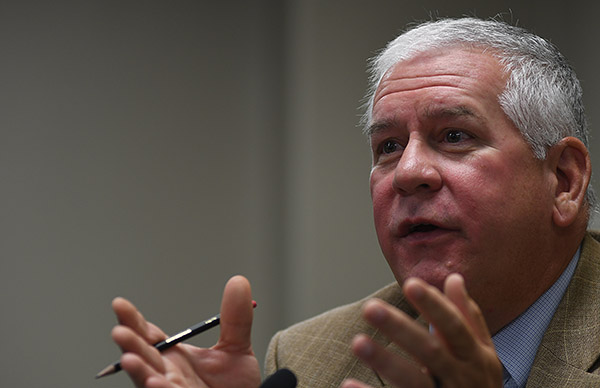
Rep. John Blanton, R-Salyersville, discusses
House Bill 313 from the 2022 legislative session
during a meeting of the Interim Joint Committee
on Judiciary on Thursday. A high-res
version of this photo is available
here.
FRANKFORT— A bill
related to charitable bail that did not receive
final passage during the 2022 legislative
session may be given new life in 2023.
The Interim Joint Committee on Judiciary
discussed the legislation on Thursday along with
the work of charitable bail organizations.
Earlier this year, Rep. John Blanton,
R-Salyersville, sponsored House Bill 313, which
would have prevented charitable bail
organizations from posting more than $5,000 in
bail for anyone charged with a crime. It also
would have limited the types of charges the
organizations can post bail for.
HB 313 advanced off the House floor in March by
a 76-19 vote, but it did not receive final
passage in the Senate. If Blanton wishes to try
to pass the bill again, he will have to re-file
it in 2023.
On Thursday, Carrie Cole and Shameka
Parrish-Wright, both with the national,
non-profit charitable bail organization The Bail
Project, testified before the committee on what
their organization does, how it is funded, why
they feel Kentuckians need access to their
services and more.
“We pay bail for low income individuals who are
legally presumed innocent and whom a judge has
deemed eligible for release from jail contingent
upon paying bail,” Cole said. “After release, we
connect our clients to voluntary social services
and community resources as needed.”
Although it is a national organization, Cole
said The Bail Project has opened an office in
Louisville and serves an additional 28 Kentucky
counties. Since 2018, the organization has
assisted nearly 4,000 Kentuckians, she said.
Blanton said he felt his work with Cole and
Parrish-Wright during the legislative session
was “amicable” and that the final version of HB
313 approved by the House “accomplished a little
bit” of what both he and The Bail Project
wanted. Blanton noted that The Bail Project
isn’t the only charitable bail group in
Kentucky, and that he and others have concerns
about people who commit violent crimes
reoffending while out on bail. He said the goal
of his bill was to try to protect victims and
prevent tragedies.
“Let’s be cautious,” Blanton said. “Let’s not go
down this road of getting under the guise of
feel good things that make us feel better about
ourselves and create a society where we create
more crimes, because when you have more crimes,
you have more victims.”
Committee co-chair Sen. Whitney Westerfield,
R-Crofton, questioned how the organization
chooses which people to post bail for.
Cole said when the organization receives a
referral, the bail amount, charge and flight
risk are among the factors considered before
making a decision.
“Our referrals generally focus on people who are
stuck in poverty and can’t get out (of jail),
and they’re usually lower-level offenses,”
Parrish-Wright added.
Rep. McKenzie Cantrell, D-Louisville, suggested
that if Blanton’s bill or something similar is
proposed again next session, it should focus on
the types of charges that charitable bail
organizations can post bail for, not the maximum
amount.
Rep. Jason Petrie, R-Elkton, said bail acts as a
way to ensure a defendant will show up to their
court dates. He suggested The Bail Project start
posting bail in their name instead of on a
client’s behalf.
Cole and Parrish-Wright said their clients are
motivated to show up to court because they know
that once their bail is returned to the
organization the money can be used to help
someone else.
The next Interim Joint Committee on Judiciary
meeting is currently scheduled for Aug. 18 at 11
a.m.
For a the full interim calendar, visit
http://legislature.ky.gov/Schedules-Calendars
END
July 6,
2022
Legislators
learn about plan to boost number of electric
vehicle charging stations
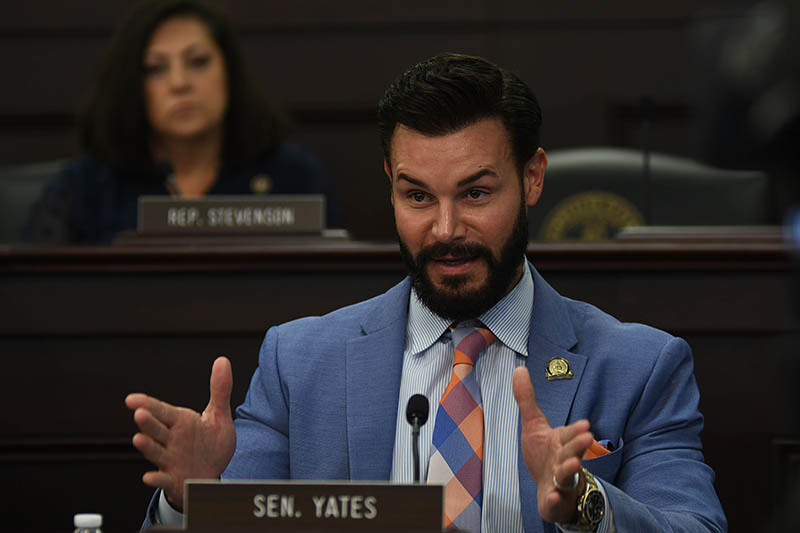
Sen. David Yates, D-Louisville, asks a question
regarding electric vehicles after state
officials presented Kentucky’s Electric Vehicle
Infrastructure Deployment Plan to committee
members. A high-res version of this photo
is available
here.
FRANKFORT –
Legislators on the Interim Joint Committee on
Transportation learned Tuesday about steps being
taken by state officials and others to make
operating electric vehicles more convenient in
Kentucky.
John Moore, Assistant State Highway Engineer for
Project Development and Cabinet Lead at the
Kentucky Transportation Cabinet, presented
Kentucky’s Electric Vehicle Infrastructure
Deployment Plan, which he described as
“initial.”
“I say initial because we anticipate this being
updated routinely over the five-year life of the
National Electric Vehicle Infrastructure
funding, or NEVI funding. Between updates we
will continue to receive input from all sectors,
and we will incorporate that into future
updates,” he said.
Legislators on the committee had several
questions and comments for Moore, who said the
goal of the funding program is to create a
convenient, reliable, affordable and equitable
national electric vehicle charging network.
The initial focus of the NEVI Formula Funding
Program is for charging stations on interstates
to support long distance travel. Kentucky is set
to receive $69.5 million over five years for the
project from the federal government. This is
expected to be matched with $17.4 million from
non-federal funds.
Moore said charging stations on highways should
work quickly, rather than take several hours to
charge vehicles. Under the funding program, the
charging stations must use “direct current fast
charging” technology and be less than 50 miles
apart. These charging stations can work in 30
minutes, providing power for 250 miles.
Rep. Ken Upchurch, R-Monticello, and co-chair of
the committee, asked Moore how electric vehicles
might affect the power grid.
Moore said state officials have had
conversations with electricity providers, and
they are not concerned with the current power
demand. He said a major impact on the power grid
would require the rapid adoption of electric
vehicles, which is not expected in Kentucky.
“It will be a slow adoption, and it will be a
slow impact is what we are hearing,” Moore said.
Sen. Jimmy Higdon, R-Lebanon, and co-chair of
the committee, asked Moore how officials will
determine who gets to operate the charging
stations.
“There are going to be winners and losers. I’m
sure there are going to be a lot of people
seeking to have one of those charging stations
in the beginning.”
Moore said the process is yet to be determined
but agreed that multiple vendors could be vying
for the stations at the same time. He explained
that private investment, in addition to the NEVI
funding, could help meet some of the demand.
“The demand we see on a lot of the interstates
within five to 10 years will require more than
what this program will roll out,” Moore said.
“There is an opportunity for the marketplace to
fill in where these funds do not touch.”
Sen. David Yates, D-Louisville, said expansion
of electric vehicle usage is exciting. He
acknowledged that Kentucky is “kind of late in
the game,” but said one of the benefits is that
Kentucky gets to learn from other states,
particularly when it comes to avoiding
monopolies.
“We know that in four to seven years – Kentucky
being a logistic hub – that we are going to need
to be on grid in order to not lose that economic
impact that is coming through,” he said.
Rep. Ashley Tackett Laferty, D-Martin and Sen.
Johnnie Turner, R-Harlan, both expressed a need
to include more routes in Eastern Kentucky in
the plans.
Rep. Samara Heavrin, R-Leichfield, asked about
federal and state matching funds. Moore said the
program is unique because private funds can be
used to match other funds.
Rep. Tom Smith, R-Corbin, said he is a supporter
of hybrid vehicles, and he added the
Transportation Cabinet should come up with
recommendations about how to tax electric
vehicles.
Sen. Karen Berg, D-Louisville, asked about
charging stations that are not as profitable as
others and if they would still be offered.
Moore said he wants deployment of the charging
stations to be successful, and Kentucky will
learn from other states.
The statewide plan must be approved by the Joint
Office of the U.S. Department of Transportation
and the U.S. Department of Energy to secure
funds for the NEVI Formula Funding Program,
Moore said.
The next committee meeting is Aug. 16 at 1 p.m.
END
June 9,
2022
Judiciary
committee discusses child support for children
of DUI victims
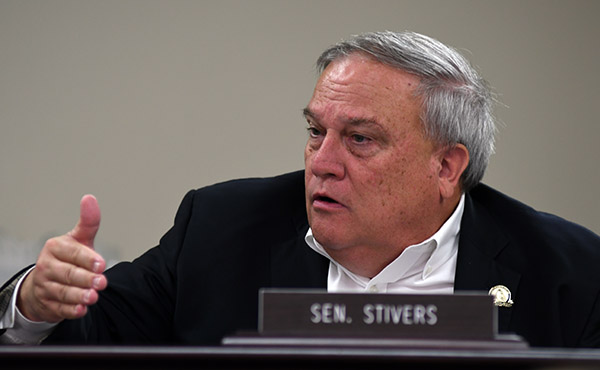
Senate President Robert Stivers, R-Manchester,
asks a Tennessee state representative a question
during Thursday's Interim Joint Committee on
Judiciary meeting. A high-res version of this
photo is available
here. A high-res version of Sen. Karen Berg,
D-Louisville, also asking a question is
available
here.
FRANKFORT— A
Tennessee state representative spoke with
Kentucky lawmakers on Thursday about a new
Tennessee law requiring people convicted of
vehicular homicide due to intoxication to pay
child support to each of the victim’s children.
Tennessee Rep. Mark Hall, R-Cleveland, testified
before the Interim Joint Committee on Judiciary
that Tennessee was the first state to pass this
type of law, and at least 14 other states have
proposed similar legislation.
Hall said he believes the bill, Tennessee House
Bill 1834, is a “common sense approach” to
addressing driving while intoxicated offenders.
“(The law) does two things. It protects our
greatest resource, which is our children, and
also holds the drunk drivers accountable,” Hall
said.
Senate President Robert Stivers, R-Manchester,
asked Hall if a wrongful death lawsuit would
offset some of the child support obligation or
not. Committee co-chair Rep. C. Ed Massey,
R-Hebron, questioned how the bill requires the
person to make the payments.
“The person may be incarcerated, etc., and may
not have any financials to (make payments). Some
could say it’s an empty shell, but is there like
a restitution order that would go with that?”
Massey asked.
Hall had a similar answer to both questions.
Tennessee’s law is open-ended, which gives the
district attorneys and judges discretion to
decide whether or not a child support order
would be appropriate on a case-by-case basis, he
said.
Payments, however, would not begin until one
year after incarceration. Hall said there will
be a formula in place much like the one used in
divorce proceedings to determine payment
amounts.
Sen. Karen Berg, D-Louisville, asked if a person
who can’t afford to pay the child support would
be charged with another crime.
“My concern is that we’re basically jailing
people who have less money and not jailing
people who can afford this verdict,” Berg said.
Massey said under Kentucky law, if the amount
owed reached $5,000 and was a contemptible
arrearage then the person could be put in jail.
Since the Kentucky General Assembly adjourned on
April 14, legislators cannot file or take action
on any new bills until the 2023 legislative
session begins on Jan. 3. Massey said Thursday’s
discussion with Hall was for the committee to
find out more about Tennessee’s law as lawmakers
consider whether or not they want to pursue
similar legislation next year.
The next Interim Joint Committee on Judiciary is
currently scheduled for July 7 at 11 a.m.
For a the full interim calendar, visit
http://legislature.ky.gov/Schedules-Calendars
END
June 7,
2022
Education
committee shares teacher recruitment and
retention ideas, concerns
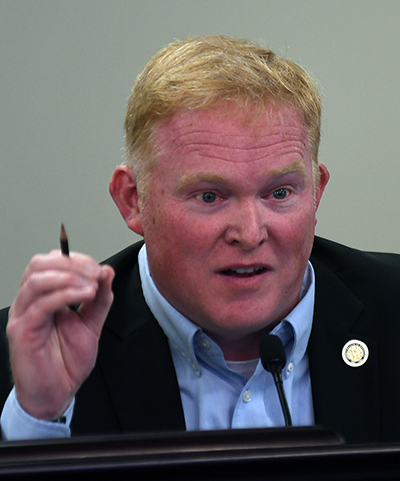
Rep. Killian Timoney, R-Lexington, shares his
concerns on the possible teacher shortage during
Tuesday's Interim Joint Committee on Education
meeting. A high-res version of this photo
is available
here.
FRANKFORT— A teacher shortage crisis
could be on the horizon, and the Kentucky
General Assembly is already looking at ways to
confront the issue.
Kentucky Department of Education Commissioner
Jason Glass testified before the Interim Joint
Committee on Education on Tuesday to discuss
ways Kentucky can improve teacher recruitment
and retention efforts.
Glass said about 72% of teachers in Kentucky –
about 42,000 – are at-risk of leaving the
profession. Groups that are considered “at-risk”
include teachers who are eligible to retire,
teachers who retired and came back to the
classroom, and teachers with less than five
years of experience.
Rep. Killian Timoney, R-Lexington, said the
teacher shortage is a national trend Kentucky
needs to “get out in front of.” One of his
suggestions included recruiting unemployed,
qualified teachers from other states.
“If we’re going to move Kentucky forward, we
definitely need to be aggressive about pursuing
those teachers,” Timoney added.
Glass’s presentation to the committee included a
list of ideas to improve teacher recruitment and
retention in the Commonwealth. Addressing the
compensation crisis, increasing the desirability
of teaching, paying student teachers, creating
new scholarships and offering grants were on the
list.
Timoney, who is an educator, said student
teaching was a difficult time for him since it
was unpaid and student teachers are often not
allowed to work other jobs.
“There’s a fiscal demand there that we need to
address, so I support that idea,” Timoney said.
During the discussion, Sen. Danny Carroll,
R-Benton, posed a different question. He asked
Glass what the legislature can do to improve its
relationship and perception among Kentucky
teachers.
“I think there is often a perception within the
teaching profession that the legislature doesn’t
care and that couldn’t be further from the
truth,” Carroll said.
To keep fostering a positive relationship with
teachers, Glass suggested the legislature
continue to fund and increase money for
education. Glass also mentioned some teachers
feel like they’re being targeted or blamed for
some of society’s problems.
“The legislature really has to consider our
teachers in Kentucky and our teachers that are
in your communities. What is the language that
we’re using around them and is this going to
make them feel supported, valued, where we can
keep attracting people into teaching and keep
those great teachers in our communities?” Glass
said.
One obstacle facing teachers is the Praxis
teacher certification exam. Glass said the
Praxis is expensive to take and can be difficult
to pass.
Rep. Kim Banta, R-Ft. Mitchell, questioned the
relevancy of the Praxis and whether or not
Kentucky can pursue other avenues to measure
qualifications without sacrificing quality.
Glass said there are an “abundance” of opinions
on the Praxis and different ideas on
alternatives.
In closing, committee co-chair Rep. Regina Huff,
R-Williamsburg, asked her fellow lawmakers to be
mindful when considering ways to make the
teacher profession more accessible.
“Although I know we’re trying to meet the needs,
I just want to make sure that we keep the
quality and the standards that are expected for
the teachers,” she said.
The next Interim Joint Committee on Education
meeting is currently scheduled for July 15 at 10
a.m.
For a the full interim calendar, visit
http://legislature.ky.gov/Schedules-Calendars
END
June 2,
2022
Legislative
committee hears update on infant formula
shortage
COVINGTON— State
public health leaders testified before the
Interim Joint Committee for Health, Welfare and
Family Services in Covington Thursday on how
they’re helping Kentucky families locate infant
formula.
In February, Abbott Nutrition, an infant formula
manufacturer, issued a recall of some of its
powdered formula products following reports that
four infants were hospitalized and two died due
to a bacterial infection, according to the U.S.
Food and Drug Administration.
This recall has led to a dangerous nationwide
infant formula shortage. Kentucky lawmakers are
monitoring the shortage closely as supplies
continue to dwindle across the Commonwealth.
Committee co-chair Rep. Kimberly Poore Moser,
R-Taylor Mill, said she has reached out to the
Kentucky Attorney General’s Office about price
gouging concerns. She also contacted the state
Agriculture Commissioner, who has offered to
call for donations through his Kentucky Hunger
Initiative, she said.
“I would encourage you, the Cabinet (for Health
and Family Services), to work with the AG
department to see maybe how we can filter some
of those donations out to our families,” Moser
said.
On the retail front, Shannon Stiglitz, senior
vice president for government affairs for the
Kentucky Retail Federation, said retailers have
worked to minimize theft and panic buying by
securing infant formula on the shelves and
placing limits on how much powdered formula can
be purchased at one time.
The federal government is working to fix the
supply chain issue by shipping in formula from
other countries, but getting those products on
the shelves is going to take some time as the
products are inspected.
On the state level, Eric Friedlander, secretary
for the Kentucky Cabinet for Health and Family
Services, said the state is looking at taking
back formula and redistributing.
Friedlander said he encourages families to check
out online resources to locate formula such as
the U.S. Department of Health and Human Services
website at
hhs.gov/formula.
Doctors’ offices may also have infant formula
samples to give to families.
For families who qualify for the Special
Supplemental Nutrition Program for Women,
Infants and Children (WIC), the infant formula
shortage has been particularly difficult due to
the program’s strict guidelines, one presenter
reported.
Sara Jo Best, public health director for Lincoln
Trail District Health Department, said there are
nearly 108,000 WIC participants in Kentucky.
Prior to the recall, Kentucky’s WIC participants
could only purchase Abbott Nutrition formula due
to a contract the state has with the company.
Struggles in supply however, were being seen as
early as November, she added.
“The Kentucky Department for Public Health began
to create temporary choices for larger powdered
cans of formula and expanded formula packed
choices to assist families affected by both the
shortage and the recall,” Best said.
“Flexibility within the program continued to
expand as the problem worsened.”
In addition to expanding options, health
departments across the Commonwealth also worked
to alert all families to the recall and to warn
them about the dangers of making formula at
home, giving infants cow’s milk or other milk
substitute products, and purchasing formula
online.
Rep. Danny Bentley, R-Russell, asked Friedlander
if infant formula being sold on the black market
is a concern. Friedlander said CHFS has been
alerted to some infant formula scams.
Sen. Danny Carroll, R-Benton, said he has
concerns about prescription formula supplies.
Friedlander responded that the cabinet is
working hard to try to meet the needs of those
families.
“We have this specialized formula we think we
have been able to prioritize,” Friedlander said.
“We have worked some with health departments.
We’ve worked some with pharmacies, and so we
feel like we’ve been able to get by on that. But
it is a concern.”
Committee co-chair Sen. Ralph Alvarado,
R-Winchester, who is a physician, encouraged new
mothers and soon-to-be mothers to breastfeed.
“You can provide your child with the nutrition
that it needs, probably the best nutrition that
your baby can have, so I would encourage moms to
think about that,” he said.
The next Interim Joint Committee on Health,
Welfare and Family Services meeting is currently
scheduled for 1 p.m. on July 20 in Frankfort.
For a the full interim calendar, visit
http://legislature.ky.gov/Schedules-Calendars
END
April
15,
2022
This Week at
the State Capitol
FRANKFORT – It
wasn’t until 1992 that a constitutional
amendment removed the lieutenant governor as
head of the Kentucky Senate and made the General
Assembly a fully independent branch of state
government.
Since then, few legislative sessions have
demonstrated that independence more than the one
that concluded this week in Frankfort.
Lawmakers closed out the year by overriding more
than two dozen gubernatorial vetoes during a
final sprint toward sine die on Wednesday and
Thursday. That capped off an intensive 60 days
of work that began in January and resulted in
new laws on nearly every prominent issue facing
the commonwealth.
Education, abortion, redistricting, drugs,
gambling, elections, cannabis research and
athletics were just a few of the topics that
earned a tap from the gavel this year.
Lawmakers revamped the state income tax and
passed major overhauls to unemployment benefits
and public assistance. They channeled millions
in disaster relief to Western Kentucky. They
debated nearly all facets of Kentucky’s response
to COVID-19 and ultimately voted to end the
state’s emergency declaration in March.
Sports fans may remember the 2022 session for
the “NIL” bill, a measure that sets the stage
for college athletes to generate income off
their name, image and likeness.
But Capitol observers will remember it as the
year that the House unveiled a landmark biennial
budget plan weeks earlier than any session in
memory – one of the clearest signs of
legislative independence this session.
When counting up the general fund, capital costs
and operating expenses, the two-year spending
plan totaled an historic $114 billion.
Like all sessions, debates were common – debates
on funding, on social issues, on public health
and religion and the government’s role in it
all. But bipartisanship also found a foothold in
many important areas, especially on issues like
tornado recovery and the war in Ukraine.
When the gavel fell for a final time on Thursday
night, legislators had sent around 230 bills to
the governor’s desk this year, and here’s a
partial list of some of the most discussed
legislation.
Abortion:
House Bill 3 bans abortions in Kentucky at 15
weeks of gestation and requires minors to obtain
consent from their parents before undergoing the
procedure. The omnibus bill also bans online
sales of abortion-inducing drugs and regulates
the disposal of fetal remains.
Anti-SLAPP bill:
House Bill 222 seeks to protect freedom of
speech. It would offer those who speak out
against a matter of public interest protection
from strategic lawsuits against public
participation, known as SLAPP lawsuits.
Budget:
House Bill 1, the new executive branch budget,
increases to the state’s per pupil funding
formula for schools and includes funding for
state employee raises and full-day kindergarten.
It will also make major investments in public
pensions, state parks, clean drinking water and
the state fairgrounds.
Cannabis research:
House Bill 604 establishes the Kentucky Center
for Cannabis Research at the University of
Kentucky. It also defines the mission and
responsibilities for the center and appropriates
funding.
Charter schools:
House Bill 9 establishes a funding model for
charter schools, building on legislation from
2017 that first allowed charters in Kentucky. It
also authorizes two pilot charter school
projects in Louisville and Northern Kentucky and
changes the appeals process if education
officials deny an application for a new charter
school.
Child abuse:
House Bill 263, known as Kami’s Law, makes
criminal abuse against a victim under 12 years
of age a Class B felony.
Child fatalities:
Under Senate Bill 97, law enforcement will be
required to request a blood, breath or urine
test from parents and caregivers suspected of
being under the influence at the time of a
suspicious child death. If consent is not given,
this bill gives law enforcement the power to
request a search warrant.
College athletes:
Senate Bill 6 provides a framework in state law
for college athletes to generate personal income
off their name, image and likeness, known as
NIL.
Constables:
House Bill 239 will require newly elected
constables to undergo professional law
enforcement training before performing certain
peace officer duties.
Coroner training:
Senate Bill 66, also known as Nathan’s Law,
requires coroners to attend eight hours of
training on the grieving process and procedures
for death notifications. It also establishes
certain procedures that coroners must follow in
providing death notifications.
COVID-19:
Senate Joint Resolution 150 effectively ended
the COVID-19 declaration of emergency in
Kentucky last month.
Crimes during
emergencies: Senate Bill 179
enhances penalties for crimes committed during a
natural or man-made disaster declaration. Crimes
include assault, burglary, criminal trespass,
criminal mischief, theft, receiving stolen
property and robbery.
Criminal justice
reform: Senate Bill 90 would
establish pilot programs in at least 10 Kentucky
counties, providing deferred prosecutions,
diversion or dismissal of charges for some
low-level offenders based on their participation
in drug treatment and vocational services.
Death penalty:
House Bill 269 adds serious mental illness to
the list of disabilities that disqualify
offenders from execution – if symptoms were
occurring at the time of the offense.
Due process:
House Bill 290 calls on state colleges and
universities to adopt a student code of conduct
for non-academic disciplinary procedures and
provide students with due process protections
that are similar to those in criminal and civil
courts.
Education:
Senate Bill 1 calls for local superintendents –
rather than school councils – to determine
educational curriculum. It also includes
language from the Teaching American Principles
Act, which would require instruction in social
studies to align with a list of core concepts
and documents that supporters say are central to
American civics.
Election security:
Senate Bill 216 seeks to enhance election
security through multiple changes in law,
including a provision to prevent voting machines
from being connected to the internet. It will
also increase post-election audits for
irregularities.
Essential
caregivers: Senate Bill 100
specifies that family members, guardians,
friends, pastors, clergy and other individuals
qualify as essential caregivers. That helps
ensure they can visit residents of long term
care, assisted living and mental health
facilities.
Felon student aid:
Senate Bill 163 would lift restrictions that
prevent some felons from accessing state aid for
college, including funds from the Kentucky
Educational Excellence Scholarship, known as
KEES.
Fentanyl:
Known as Dalton’s Law, House Bill 215 requires
those convicted of trafficking fentanyl,
carfentanil or fentanyl derivatives to serve at
least 85% of their criminal sentences, up from
the current 50%. It also makes importing those
drugs from another state or country a Class C
felony and deems offenders ineligible for a
pretrial diversion.
First responders:
Senate Bill 64 aims to protect the
confidentiality of first responders who
participate in peer support counseling programs.
Supporters say it will benefit thousands of
public safety workers who frequently experience
trauma on the job but could face repercussions
from frank discussions in counseling.
Imagination
Library: Senate Bill 164
establishes the Imagination Library of Kentucky
Program. Founded by country music legend Dolly
Parton, this international literacy program
provides free books monthly to children from
birth to age 5. The state will provide 50% of
the funds.
Incest:
Senate Bill 38 classifies incest as a violent
offense. It also ensures that individuals guilty
of incest complete at least 80% of their prison
sentence.
KSU board:
Senate Bill 265 directed the governor to name
replacements for the Kentucky State University
Board of Regents earlier this month.
Library boards:
Senate Bill 167 seeks to increase local
oversight of library boards and gives more
authority to county judge-executives on
appointing board members in certain districts.
Nursing shortages:
Senate Bill 10 makes it easier for nurses from
outside Kentucky to practice here, helping
address major workforce shortages in the
profession. It will also remove predetermined
numbers for admission to nursing programs.
Pari-mutuel
wagering: House Bill 607 will
tax every pari-mutuel wager at a standard 1.5%
rate, including advance-deposit wagers and bets
on simulcasts. It also directs more money to the
general fund, makes the Kentucky Racing
Commission responsible for self-funding, creates
a self-exclusion list for problem gamblers and
eliminates the track admissions tax.
Peace officer
certifications: House Bill 206
would prohibit anyone convicted of a misdemeanor
sexual offense from serving as a peace officer.
Porch pirates:
Senate Bill 23 cracks down on people who steal
packages off front porches, often referred to as
porch pirates. The bill makes it a Class D
felony to steal or destroy packages from common
carriers and delivery services such as Amazon or
FedEx.
Public assistance:
House Bill 7 aims to revamp public assistance
benefits and combat fraud with new rules around
benefit eligibility. It also seeks to increase
accountability from the state Cabinet for Health
and Family Services and encourage healthy
choices for those receiving nutritional
assistance.
Read to Succeed
Act: Senate Bill 9 calls for
evidence-based learning techniques and intensive
interventions to improve early literacy outcomes
and help struggling students in kindergarten
through the third grade.
Redistricting:
Lawmakers passed a series of bills in the first
week of the session to redraw the boundaries for
Kentucky’s congressional, Supreme Court and
state legislative districts. The General
Assembly must periodically realign the districts
to reflect population changes in the U.S.
Census.
Religious services:
House Bill 43 calls for equal treatment of
houses of worship and religious organizations
during a state of emergency.
Remote instruction:
Senate Bill 25 allows school superintendents to
allocate up to 10 remote instruction days this
academic year to specific classrooms, grades or
schools.
School resource
officers: House Bill 63 calls on
local school districts to place a school
resource officer in each school by Aug. 1 if
they can afford the cost. It also allows local
school boards to establish a police department
for the district.
School board
meetings: House Bill 121
requires a public comment period of at least 15
minutes at local school board meetings, unless
no one is signed up to speak. It also requires
that any board rules and policies regarding
conduct apply during the comment period.
School breakfasts:
Senate Bill 151 calls on schools in the Federal
School Breakfast Program to offer students up to
15 minutes to eat breakfast during instructional
time.
Serving alcohol:
House Bill 252 would clear the way for
18-year-olds to sell and serve alcoholic
beverages.
State police
raises: House Bill 259 codifies
the salary increases allocated to Kentucky State
Police in the executive branch budget. The bill
ensures a $15,000 pay increase for troopers
ranked below sergeant.
Student mental
health: House Bill 44 would
allow school boards to include provisions in its
student attendance policy for excused absences
due to a student’s mental or behavioral health
status.
Swatting:
House Bill 48 makes falsely reporting an
incident that results in an emergency response –
commonly called “swatting” – a Class D felony.
Tax reform:
House Bill 8 seeks to gradually reduce and
eliminate state taxes on personal income over
several years while simultaneously expanding and
diversifying the state’s overall tax base. Once
state revenue exceeds certain thresholds, the
measure will trigger reductions in the income
tax rate of half a percentage point, starting
with an initial drop in 2023.
Tornado relief:
House Bill 5 sends $200 million in aid to
communities affected by the December tornados in
Western Kentucky. These funds can be used by
local governments, nonprofits, school districts
and public utilities to pay for construction
projects, repairs and more.
Transgender
athletes: Senate Bill 83 will
prevent male-to-female transgender students from
participating in girls’ sports, starting in the
sixth grade and continuing through college.
Unemployment:
House Bill 4 changes the length of unemployment
insurance benefits and the job search
requirements for recipients. The length of
benefits will now be based on the state’s
average unemployment rate, and recipients will
be required to engage in at least five
verifiable work search activities a week.
Vehicle taxes:
House Bill 6 calls on property valuation
administrators to tax vehicle owners in 2022 the
same as they did 2021. Beginning next year, the
bill would also require them to use the average
trade-in value rather than the “rough” trade-in
value or “clean” trade-in value when assessing
taxes.
The next regular session of the General Assembly
won’t convene until January 2023, but lawmakers
will kick off the interim period in June.
Kentuckians can still research bills on the
Legislative Record
webpage
and share their views by calling the General
Assembly’s toll-free message line at
1-800-372-7181.
Also, legislators are weighing in on the
session, offering their final grades for the
year. Check out their remarks on the
LRC Capitol
Connection
YouTube channel.
END
April
13,
2022
Senate
approves bill to prohibit gray machines in
Kentucky
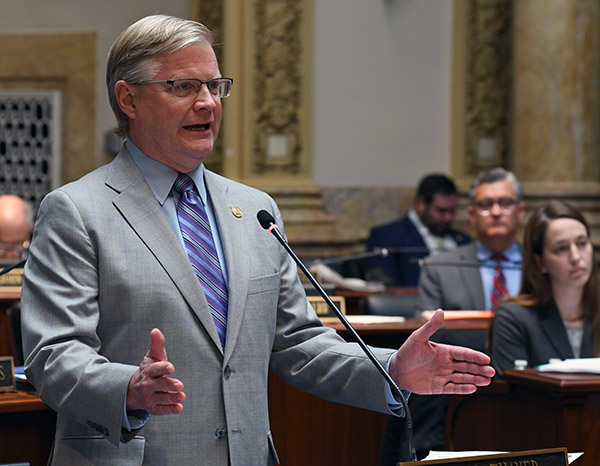
Senate Majority Floor Leader Damon Thayer,
R-Georgetown, speaks on House Bill 608, which
would prohibit “gray machines” in Kentucky.
A high-res version of this photo is available
here.
FRANKFORT —
Legislation advanced out of the Senate on
Wednesday to prohibit certain gambling machines,
often known as “gray machines,” from operating
in Kentucky.
The measure, House Bill 608, cleared the Senate
with a 24-13 vote after lawmakers approved an
amendment to the bill on the chamber floor. It
now returns to the House, where lawmakers could
vote to concur with the changes Thursday – the
last day of the 2022 legislative session.
Senate Majority Floor Leader Damon Thayer,
R-Georgetown, said the legislation would
explicitly ban gray machines that have become
prevalent across the state. He said they fall
outside the three forms of gambling that are
currently legal, which include pari-mutuel
wagering, charitable gaming and the lottery.
“They are illegal and operating outside the
law,” Thayer said.
But the bill, sponsored by Rep. Killian Timoney,
R-Lexington, generated some debate before the
vote.
Supporters of HB 608 said gray machines are
operating without regulation and creating
competition with charitable gaming. Critics of
the bill said the machines provide much-needed
income for mom-and-pop stores.
Sen. Paul Hornback, R-Shelbyville, said some
operators of locally owned stores depend on the
extra money to help keep their doors open. Those
who have the machines want them to be taxed and
regulated, he said.
“In rural Kentucky, it makes a huge difference,”
Hornback said.
Sen. Philip Wheeler, R-Pikeville, agreed that
while he is not personally a fan of using the
machines, the income they generate is helping
business owners. Wheeler said the machines could
be “brought into the fold” in time, and he urged
lawmakers to step back and consider the issue
more.
“To ban them outright is overkill,” he said.
Senate Majority Whip Mike Wilson, R-Bowling
Green, called the gaming machines unregulated
and untaxed. He said he first learned about them
from local service organizations for veterans
that depend on revenue from charitable gaming
machines.
“A vote against this is a vote against our
veterans,” he said.
Wilson added that the action is not
unprecedented. He pointed to simulated slot
machines on computers that were once common in
Kentucky but have since been outlawed.
The amendment to the bill was sponsored by Sen.
Whitney Westerfield, R-Crofton. He cited
concerns that language in the bill could have
expanded the definition of gambling and said his
amendment would address the issue.
END
April
13,
2022
General
Assembly overrides gubernatorial vetoes
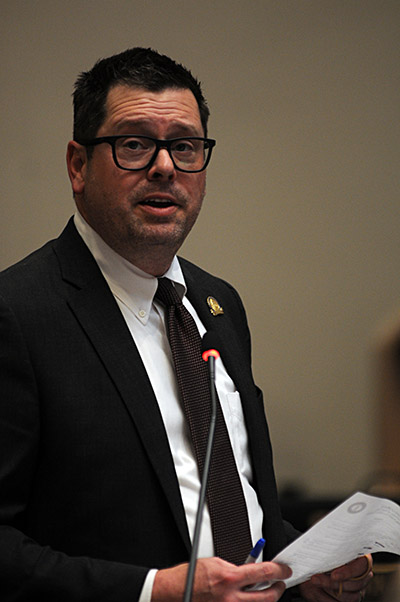
House Majority Floor Leader Steven Rudy,
R-Paducah, makes a motion to override a
gubernatorial veto to a bill on the House floor.
A high-res version of this photo is available
here.
FRANKFORT— The
Kentucky General Assembly spent the second to
last day of the 2022 legislative session
overriding gubernatorial vetoes related to the
state budget, taxes, education and more.
Lawmakers voted to override 17 of Gov. Andy
Beshear’s vetoes on the executive branch budget
for the next biennium outlined in House Bill 1.
The five areas of the budget that lawmakers
allowed vetoes to stand included 13 line items.
In his veto message, Beshear wrote some of those
line items contained technical errors.
Some highlights of HB 1 that were not vetoed
include:
–
8% raises for state workers on July 1,
2022, and additional raises based on a pay study
for the following fiscal year
–
$250 million in federal American Rescue
Plan Act funds for clean drinking water
–
Hundreds of millions of dollars to fully
fund state pensions
–
Funds to provide social workers with a
$2,400 pay increase in addition to the
across-the-board raises
–
Funds to increase the SEEK formula from
the current $4,000 per student to $4,100 per
student in the first fiscal year and to $4,200
in the second year
–
Funds to cover the full cost of all-day
kindergarten at every public school district in
the Commonwealth
–
Funds to cover 70% of transportation
costs for public schools
–
$25 million in grants for county clerks
for elections and deed recording online
–
$150 million in fiscal year 2023-24 for a
major overhaul of the state parks system
The legislation was originally approved by a
31-0 vote in the Senate and a 93-3 vote in the
House on March 30.
Other veto overrides:
Senate Bill 1 – The measure calls for local
superintendents – rather than school councils –
to determine educational curriculum. The
Teaching American Principles Act, which would
require instruction in social studies to align
with a list of core concepts and documents that
supporters say are central to American civics,
is also included in the bill.
House Bill 3 – This bill would require minors to
have parental consent before undergoing an
abortion procedure. It would also ban the online
sale of abortion medication and limit abortion
to 15 weeks of pregnancy.
House Bill 7 – This legislation aims to revamp
public assistance benefits and combat fraud. HB
7 would create new rules around the presumptive
eligibility for benefit recipients and seek more
accountability from the state Cabinet for Health
and Family Services. It would also establish
penalties for fraudulent sales of benefit cards.
Another provision seeks to encourage
participants in the Supplemental Nutrition
Assistance Program – known as SNAP – to make
good nutritional choices.
House Bill 8 – This is a tax modernization bill
that aims to reduce the state income tax rate
and diversify the state tax base. Using a
special formula, the state will look at the
budget reserve trust fund and compare it to the
general fund to make sure the state can afford
to reduce the state income tax by .5%. If
certain conditions are met, the income tax
reduction will take place in the second January
after that fiscal year.
In order to reduce the income tax rate, the
state plans to expand the sales tax base.
Another provision of HB 8 imposes a 6% use tax
on nonessential services such as, nonessential
cosmetic surgery, body modifications,
photography, research polling, bodyguard
services, marketing and more. Another section of
the bill imposes a tax on ridesharing services,
such as Uber and Lyft, and electric vehicles.
Electric vehicle owners will pay an annual $120
ownership fee. Owners of hybrid vehicles and
electric motorcycles will be a $60 annual fee.
House Bill 9 – Following legislation from 2017,
HB 9 codifies the funding mechanism for charter
schools, authorizes two pilot charter school
projects in Northern Kentucky and the West End
of Louisville, and makes changes to the appeal
process if a charter school application is
denied by a local school board.
Senate Bill 83 – Senate Bill 83 would prevent
male-to-female transgender students from
participating in girls’ sports, starting in the
sixth grade.
House Bills 241 – The Transportation Cabinet
budget contained in HB 241 appropriates nearly
$3 billion toward road projects across the
Commonwealth for the next two fiscal years.
House Bill 243 – This bill is the biennium
spending plan for the legislative branch.
All of these bills go into effect 90 days after
the end of the 2022 legislative session, unless
the bill has an emergency clause or a provision
that sets a different effective date.
The Kentucky General Assembly will convene for
its final day of the 2022 legislative session at
10 a.m. on Thursday.
END
April
1,
2022
This Week at
the State Capitol
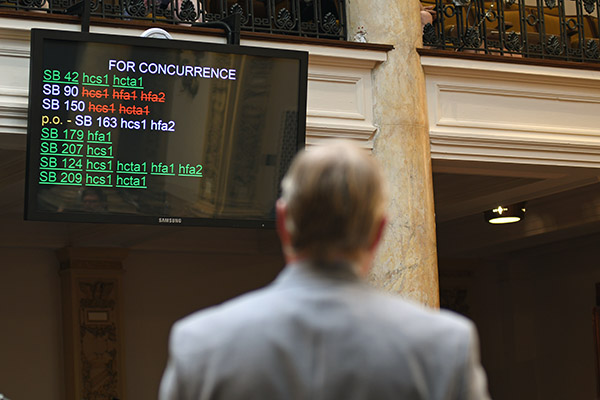
Legislators consider bills for concurrence in
the Senate. A high-res version of this photo is
available
here.
FRANKFORT – The
Kentucky General Assembly gaveled out for a
10-day veto recess after passing a landmark
state budget and a volley of other prominent
bills this week on tax reform, charter schools,
abortion, gambling, elections and changes to
public assistance.
In all, lawmakers delivered 140 bills to the
governor’s desk over a two-day marathon of
voting and debate on the chamber floors. The
action wrapped up close to midnight on
Wednesday.
The governor now has until the end of the day on
April 11 to sign the bills, let them become law
without his signature or issue vetoes. Lawmakers
will have an opportunity to override any vetoes
when the General Assembly reconvenes on April
13-14 for the final two days of the session.
Here are some of the bills that received final
passage before both chambers adjourned:
Budget:
House Bill 1 would provide an historic two-year
spending plan for the state executive branch
with funding for employee raises, full-day
kindergarten and increases to the state’s per
pupil funding formula. It would also provide
major investments in public pensions, state
parks, clean drinking water projects and the
state fairgrounds.
Abortion:
House Bill 3 would ban abortions in Kentucky at
15 weeks of gestation and require minors to
obtain consent from their parents before
undergoing the procedure. The omnibus bill would
also ban online sales of abortion-inducing drugs
and regulate the disposal of fetal remains.
Tax reform:
House Bill 8 seeks to gradually reduce and
eliminate state taxes on personal income over
several years while simultaneously expanding and
diversifying the state’s overall tax base. Once
state revenue exceeds certain thresholds, the
measure would trigger reductions in the income
tax rate of half a percentage point, starting
with an initial drop in 2023.
Charter schools:
House Bill 9 would establish a funding model for
charter schools, building on legislation from
2017 that first allowed charters in Kentucky. It
would also authorize two pilot charter school
projects in Louisville and Northern Kentucky and
change the appeals process if education
officials deny an application for a new charter
school.
Pari-mutuel
wagering: House Bill 607 would
tax every pari-mutuel wager at a standard 1.5%
rate, including advance-deposit wagers and bets
on simulcasts. It would also direct more money
to the general fund, eliminate breakage, make
the Kentucky Racing Commission responsible for
self-funding, create a self-exclusion list for
problem gamblers and eliminate the track
admissions tax.
Public assistance:
House Bill 7 aims to revamp public assistance
benefits and combat fraud with new rules around
benefit eligibility. It also seeks to increase
accountability from the state Cabinet for Health
and Family Services and encourage healthy
choices for those receiving nutritional
assistance.
School resource
officers: House Bill 63 calls on
local school districts to place a school
resource officer in each school by Aug. 1 if
they can afford the cost. It would also allow
local school boards to establish a police
department for the district.
Nursing shortages:
Senate Bill 10 would make it easier for nurses
from outside Kentucky to practice here, helping
address major workforce shortages in the
profession. It would also remove predetermined
numbers for admission to nursing programs.
Porch pirates:
Senate Bill 23 would crack down on people who
steal packages off front porches, often referred
to as porch pirates. The bill would make it a
Class D felony to steal or destroy packages from
common carriers and delivery services such as
Amazon or FedEx.
Fentanyl:
Known as Dalton’s Law, House Bill 215 would
require those convicted of trafficking fentanyl,
carfentanil or fentanyl derivatives to serve at
least 85% of their criminal sentences, up from
the current 50%. It would also make importing
those drugs from another state or country a
Class C felony and make offenders ineligible for
a pretrial diversion.
School board
meetings: House Bill 121 would
require a public comment period of at least 15
minutes at local school board meetings, unless
no one is signed up to speak. It would also
require that any board rules and policies
regarding conduct apply during the comment
period.
Coroner training:
Senate Bill 6, also known as Nathan’s Law, would
require coroners to attend eight hours of
training on the grieving process and procedures
for death notifications. It would also establish
certain procedures that coroners must follow in
providing death notifications.
Crimes during
emergencies: Senate Bill 179
would enhance penalties for crimes committed
during a declared emergency related to a natural
or man-made disaster. It would apply to assault,
burglary, criminal trespass, criminal mischief,
theft, receiving stolen property and robbery.
Election security:
Senate Bill 216 seeks to enhance election
security through multiple changes in law
including a provision to prevent voting machines
from being connected to the internet, among
other provisions.
Swatting:
House Bill 48 would make falsely reporting an
incident that results in an emergency response –
commonly called “swatting” – a Class D felony.
Due process:
House Bill 290 calls on state colleges and
universities to adopt a student code of conduct
for non-academic disciplinary procedures and
provide students with due process protections
that are similar to those in criminal and civil
courts.
Kentuckians can track the action through the Legislative
Record webpage,
which allows users to follow a bill’s
progression through the chambers.
Citizens can also share their views on issues
with lawmakers by calling the General Assembly’s
toll-free message line at 1-800-372-7181.
END
March 30,
2022
Bill to
overhaul public assistance clears final hurdle
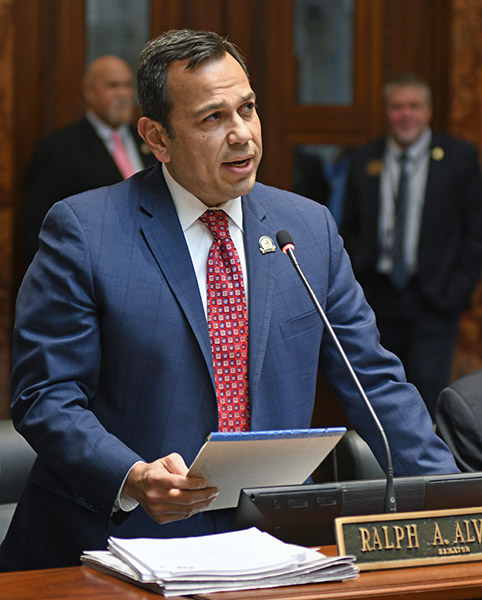
Sen. Ralph Alvarado, R-Winchester, speaking on
House Bill 7, which would revamp public
assistance benefits. A high-res version of this
photo is available
here.
FRANKFORT — A bill
that aims to revamp public assistance benefits
and combat fraud is headed to the governor’s
desk after it received final approval from the
Kentucky General Assembly on Wednesday.
House Bill 7 would create new rules around the
presumptive eligibility for benefit recipients
and seek more accountability from the state
Cabinet for Health and Family Services. It would
also establish penalties for fraudulent sales of
benefit cards.
Another provision seeks to encourage
participants in the Supplemental Nutrition
Assistance Program – known as SNAP – to make
good nutritional choices, supporters say.
“It tries to make sure that public assistance
benefits go to the people that actually really
need it,” said Sen. Ralph Alvarado,
R-Winchester. “It tries to increase
accountability, decrease fraud in the system and
protect funds for those who need it the most.”
Alvarado presented the legislation on the Senate
floor. However, House Speaker Pro Tempore David
Meade, R-Stanford, is the bill’s primary
sponsor.
“We actually do have a major problem in this
state, and that is what we are going to try to
start taking care of,” Meade told members in the
House.
The measure includes a waiver that can be used
at the state health cabinet to expand SNAP for
the elderly and the disabled. HB 7 also calls
for creation of community engagement programs at
the cabinet by April 2023.
Other provisions would set rules around
self-attestation and determination of Medicaid
eligibility and verification. The bill would
also establish the Benefits Cliff Task Force and
require the cabinet to develop an online
benefits cliff calculator.
“That’s been something that’s been talked about
quite a bit through many of our interim
meetings. You know that a lot of folks have a
hard time transitioning off of public assistance
into the private employment, and as a result
this is going to hopefully help them as we
develop a task force to deal with that issue,”
Alvarado said.
The legislation would also require the cabinet
to contract with a third party to review
presumptive eligibility and compliance, and it
would prohibit the cabinet from seeking new
waivers or renewing waivers without
authorization from the General Assembly with a
few exceptions, he said.
HB 7 has undergone changes since the bill was
first filed earlier this session.
Senate Minority Floor Leader Morgan McGarvey,
D-Louisville, said changes have improved it, but
the bill still has shortcomings.
“I think the overall bill is still lacking. I
think it is still punishing people, potentially
punishing people just for being poor,” he said.
McGarvey said no one likes fraud, but he pointed
to estimates showing that instances of fraud in
the nutrition program are around 0.002% of
cases. He added that, on a per capita basis,
Kentucky has the highest rate of investigating
and charging intentional program violations of
any state in the southeast.
“We are going to spend more money than we are
going to save by taking food off of people’s
plates. That’s not what we should do,” he said.
House Minority Whip Angie Hatton, D-Whitesburg,
also told representatives there are many
lawmakers who are relieved to see recent changes
that make the bill more agreeable. However, she
said she still doesn’t support many of the
measures.
“I think it’s just a matter of what keeps you up
at night,” she said. “For me, it doesn’t keep me
up at night worrying that there is a tiny
percentage of people who might get benefits and
didn’t deserve them. What keeps me up at night
is worrying that there might be people hungry
who couldn’t jump through hoops and get
benefits.”
Meade told members in the House that the
University of Kentucky’s Gatton College of
Business and Economics has done several studies
on the issue.
He said the college’s latest statistics show
that improper enrollments in Medicaid cost the
federal government $186 million a year in
Kentucky and that Kentucky ranks third in the
nation for the biggest increase in improper
Medicaid enrollments since the passage of the
Affordable Care Act.
“It is not simply just a small percentage of
folks who have been improperly enrolled,” he
said.
The House voted 70-22 on final passage after the
Senate approved HB 7 with a 24-12 vote. It now
goes to the governor, who can sign it, allow it
to become law without his signature or issue a
veto.
END
March 30,
2022
General
Assembly sends historic state budget to
governor's desk
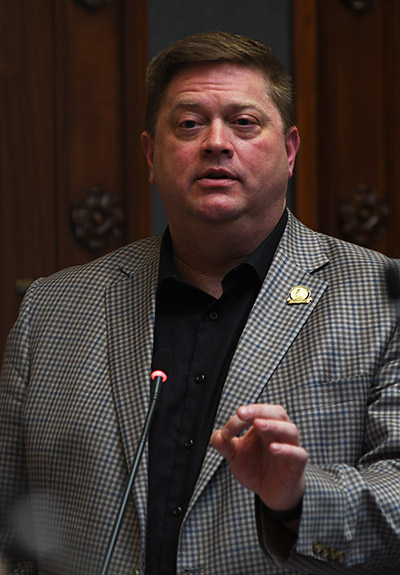
Rep. Jason Petrie, R-Elkton, speaks on House
Bill 1, the proposed executive branch budget, on
the House floor. A high-res version of
this photo is available
here.
FRANKFORT— After
countless months of planning and negotiations,
the state budget for the next biennium is
finished.
House Bill 1, the executive branch budget,
received final passage by the Kentucky General
Assembly on Wednesday, hours before the
beginning of the veto recess period.
Chair of the Senate Appropriations and Revenue
Committee Christian McDaniel, R-Ryland Heights,
said the biggest items in the budget reflect a
conscious decision to address operational
deficits in the state’s workforce.
Some of the highlights McDaniel and House
Appropriations and Revenue Committee Chair Jason
Petrie, R-Elkton, mentioned include:
—8%
raises for state workers on July 1, 2022, and
additional raises based on a pay study for the
following fiscal year
—$250
million in federal American Rescue Plan Act
funds for clean drinking water
—Hundreds
of millions of dollars to fully fund state
pensions
—Funds
to provide social workers with a $2,400 pay
increase in addition to the across-the-board
raises
—Funds
to increase the SEEK formula from the current
$4,000 per student to $4,100 per student in the
first fiscal year and to $4,200 in the second
year
—$23
million to assist Kentucky State University with
ongoing financial challenges along with a second
appropriation of $15 million
—Funds
to cover the full cost of all-day kindergarten
at every public school district in the
Commonwealth
—Funds
to cover 70% of transportation costs for public
schools
—$25
million in grants for county clerks for
elections and deed recording online
—$150
million in fiscal year 2023-24 for a major
overhaul of the state parks system
—Enough
funds to cover 40 days of operations in the
event of an emergency
On the House floor,
Petrie said the budget makes “historic”
investments in K-12 education, and higher
education.
“It puts us at a little over 52% of our entire
general fund budget being allocated in
education,” Petrie said.
In the Senate, McDaniel said Kentucky must
remain competitive with other states and invest
in people’s ability to succeed.
“Budgets are about discipline and restraint; and
they get to the fact that in government, we
cannot be here to guarantee anyone’s success,
but rather set the environment for people to
succeed to the maximum of their God-given
potential,” he said.
Senate Majority Floor Leader Damon Thayer,
R-Georgetown, said the bill underscores
differences in the chamber. He praised the plan
as a “conservative budget” that reflects tough
decisions and sets aside money for the budget
reserve trust fund.
“Just because we have a surplus doesn’t mean
when have to spend it all,” Thayer said. “We
have to remember where this money comes from. It
comes from the taxpayers. It comes from the hard
working people of Kentucky who every week have
money taken out of their paycheck.”
While many members of the House and Senate said
they liked HB 1, a few expressed disappointment
in some of the educational funding choices.
Rep. Rachel Roberts, D-Newport, said her
district in Northern Kentucky is losing teachers
to Cincinnati. She said she’s afraid the SEEK
increases and other education appropriations may
not be enough for school districts to give
competitive raises.
In the Senate, Minority Floor Leader Morgan
McGarvey, D-Louisville, praised many of the
expenditures, but he criticized the budget for
not funding universal pre-kindergarten. He said
when adjusted for inflation, spending on
education remains below levels prior to the 2008
recession, and called the budget a “missed
opportunity” overall.
“This is our opportunity to make investments in
the state that will reverberate 25 years from
now,” he said. “This budget is the opportunity
for people to look back 25 years from now and
say, ‘that’s when they got this done. That’s
when we got Kentucky moving in the right
direction.’”
Back in the House, Speaker Pro Tempore David
Meade, R-Stanford, said HB 1 is an “excellent
budget.”
“I think this is the best one I have ever seen
in my 10 years,” he said, calling special
attention to “record” funding in education,
pensions, and economic projects and more.
Although Rep. Patti Minter, D-Bowling Green,
said she has concerns about the transportation
funding for school districts, she was “happy to
see creative use of ARPA funds.”
“It’s the best budget
that I’ve ever had the privilege to vote on, and
I hope that we will be able to work with this
moving forward into the next biennium,” Minter
said.
The House approved the executive branch budget
by a 93-3 vote while the Senate approved the
budget unanimously in a 35-0 vote.
Both chambers also approved House Bill 243, the
legislative branch budget, and House Bill 244,
the judicial branch budget on Wednesday.
All three bills will now be sent to the governor
for his signature or veto.
END
March 29,
2022
Senate
approves “Dalton’s Law” to combat fentanyl
traffickers
FRANKFORT — Named
after Dalton Bishop who passed away from
ingesting fentanyl, House Bill 215 received
final approval Tuesday on the Senate floor.
The bill would increase from 50% to 85% the
minimum time served before those guilty of
trafficking can be eligible for probation, shock
probation, conditional discharge or parole. It
would also make them ineligible for a pretrial
diversion, Sen. Jason Howell, R-Murray, said.
“House Bill 215 deals with enhancing sentencing
for those that are trafficking in fentanyl. For
those of us that are involved in this area,
fentanyl has become a new, big thing that we’re
having to deal with from a drug standpoint,”
Howell said.
Rep. Chris Fugate, R-Chavies, is the bill’s
primary sponsor. However, Howell presented the
measure on the Senate floor, where it was
approved for final passage with a 30-3 vote.
Senate Majority Whip Mike Wilson, R-Bowling
Green, said his community has not been spared
from deaths stemming from fentanyl.
“This bill came about, I think, as a result of a
lot of the deaths that have happened in regards
to fentanyl laced drugs,” he said. “And when it
happens in your community, that’s when it starts
to hit home. We’ve had one family we know have
two sons. They no longer have any sons. They’ve
lost both of them. Overdose.”
Not only did Wilson recall that family, but also
the family of Bishop, who died after taking just
one pill.
“If anybody knows anything about the drug and
how dangerous it is, it’s a killer” he said,
referring to Dalton Bishop.
Sen. Robin L. Webb, D-Grayson, said legislators
appear to be piecemealing the criminal justice
system even further and moving toward mandatory
minimums like “the archaic federal system.” She
also expressed concern about costs associated
with the legislation.
“But this has a significant fiscal impact and it
enhances aggravated trafficking to include
heroin. So it’s going to come at a cost, and I
have not had the opportunity to digest whether
or not the budget will accommodate this, but we
probably need to give corrections a little more
money,” Webb said.
Sen. Danny Carroll, R-Benton, said fentanyl and
its derivatives are scourges.
“When you look at the society today and you look
at the drugs that are being trafficked, there is
no other deadlier drug at this point than
fentanyl, carfentanil and the derivatives,” he
said.
Carroll said it’s not just users at risk, but
also first responders who attend to overdoses
and end up in the hospital themselves. Carroll
stressed that he has no sympathy for traffickers
of deadly drugs.
“They are trafficking death, and as we are being
more accommodating on the lower end for users. I
think we need to be every bit harsher on the
higher end of those who are trafficking and
making money off of killing our citizens,” he
said.
END
March 29,
2022
Senate
advances bill to codify funding for charter
schools
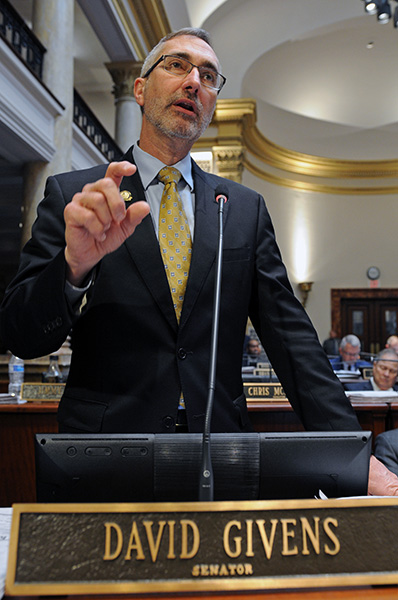
Senate President Pro Tem David P. Givens,
R-Greensburg, speaks on House Bill 9, which
would codify funding for charter schools.
A high-res version of this photo is available
here.
FRANKFORT —
Legislation to establish charter schools in
Kentucky became law in 2017, but the Senate gave
final passage Tuesday to a bill that would
codify a funding model for such schools moving
forward.
House Bill 9 would also authorize two pilot
charter school projects in Louisville and
Northern Kentucky and change the appeals process
if education officials deny an application for a
new charter school.
The measure received final passage with a 22-14
vote and now heads to the governor’s desk. It
cleared the House floor last week.
House Majority Whip Chad McCoy, R-Bardstown, is
the bill’s primary sponsor. However, Senate
President Pro Tem David P. Givens, R-Greensburg,
presented the measure on the Senate floor.
“What we have before us here in House Bill 9 is
an opportunity for us to excel in those places
where the students deserve to be in robust
programs of excellence,” he said.
Givens emphasized the issue of charter schools
is not new to the state. He said the matter was
under discussion when he arrived as a newly
elected legislator in 2009 and that HB 9 builds
on the original measure that passed in 2017.
“This is not something that has been rushed,” he
said. “That’s 13 years’ worth of conversation
here in Kentucky.”
If an application for a new charter school is
denied, HB 9 allows the applicant to ask why and
receive technical assistance from the Kentucky
Department of Education to improve it. The
department is required to provide the
assistance.
Another provision allows school districts with
less than 7,500 students a way to “veto” a
charter school appeal.
Givens said that a small number of students
moving out of a small district can have a
significant economic impact on a school
district. That’s why “there are protections
written in the bill for the smallest of
districts,” he said.
Lawmakers debated the bill for more than an hour
on the Senate floor.
Supporters said the bill will help spur
long-needed innovation to the education system
while helping close outcome gaps among students.
They argued that Kentucky has fallen behind
other states in providing the option.
Critics, however, said charters will channel
funds away from public schools and into private
hands. They also argued that charter schools
have a mixed record elsewhere and raised
concerns that charters will be exempt from
important standards like qualifications for
administrators.
Senate Minority Caucus Chair Reginald Thomas,
D-Lexington, voted against the measures and said
it will allow private entities to buy textbooks,
desks and buildings – all with public funds.
“From Pikeville to Paducah, our school leaders
are opposed to this bill,” he said. “This is a
money grab, so I say follow the money and watch
your public dollars go to private hands. And the
person who will really pay the price for this
will be your child.”
Sen. Robin L. Webb, D-Grayson, also voted
against the legislation. She said those
affiliated with charter schools might see school
funding as a lucrative opportunity.
“They’ve made no secret about it. They’ve said
they wanted it. And who are these people,” she
asked. “Well, it’s rich donors and billionaires
and foundations. What’s the goal here? Well, to
get some of the money and also set curriculum,
bring people in to teach so they can set the
agenda that goes with their agenda.”
Several others, like Senate Majority Whip Mike
Wilson, R-Bowling Green, spoke in favor of HB 9.
“As I have said when I carried this bill three
different times, it’s a pilot project,” Wilson
said. “It’s a tool in the toolbox of education.
It’s not looking to take over all of education.
It’s just looking to be a tool to be used where
needed,” he said.
Sen. Donald Douglas, R-Nicholasville, said he
would hate to wake up every morning thinking
that the only reason people do things in
Kentucky is for profit.
“The word ‘change’
scares the dickens out of a lot of people
because it may force them to think a little
differently when they get up in the morning or
go to bed at night,” he said. “We have
educational woes because of people who hate that
word ‘change.’”
END
March 29,
2022
Bill
increasing criminal penalties for crimes during
natural, man-made disasters advances
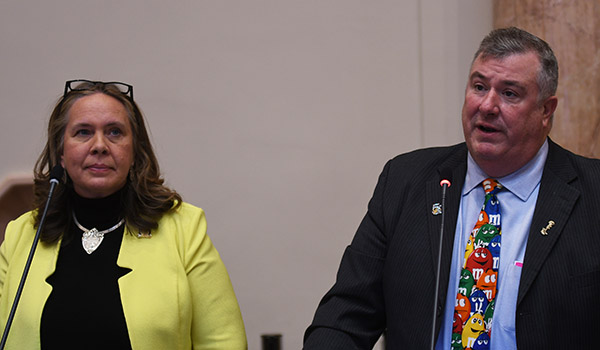
House Majority Caucus Chair Suzanne Miles,
R-Owensboro, presents Senate Bill 179 alongside
Rep. C. Ed Massey, R-Hebron, on the House floor.
A high-res version of this photo is available
here.
FRANKFORT— Thieves
looking to steal property in an area impacted by
a natural or man-made disaster will face harsher
penalties under Senate Bill 179.
The Kentucky House of Representatives approved
the measure Tuesday. House Majority Caucus Chair
Suzanne Miles, R-Owensboro, presented SB 179 on
the House floor on behalf of the bill’s sponsor,
Sen. Danny Carroll, R-Benton.
During a declaration of emergency due to a
natural or man-made disaster, those guilty of
assault, burglary, criminal trespass, criminal
mischief, theft, receiving stolen property and
robbery, will face harsher penalties under SB
179.
Miles said the legislation is for those “people
preying upon people at their worst time.”
For example, first-degree burglary would become
a Class A felony, second-degree burglary would
become a Class B felony, and third-degree
burglary would become a Class C felony during a
declaration.
Rep. C. Ed Massey, R-Hebron, successfully
amended SB 179 on the House floor to define
impact areas. Massey said the amendment is
necessary because a natural or man-made disaster
often does not impact the entire state.
Rep. Keturah Herron, D-Louisville, also
attempted to amend SB 179 on the House floor,
but the amendment failed by a 29-58 roll call
vote. Herron wanted to amend the bill to allow a
sentencing judge or jury to decline to impose
the enhanced penalties.
“This safety net ensures that juries and judges
in disaster areas can determine who truly
deserves the enhanced penalties based on the
facts established at trial,” Herron said.
The House approved an amended version of SB 179
by an 84-10 vote. The Senate approved the
original version of SB 179 by 34-1 vote on March
8.
The Senate will have to
vote to concur on the changes made to the bill
by the House before it can be sent to the
governor’s desk for his signature or veto.
END
March 25,
2022
This Week at
the State Capitol
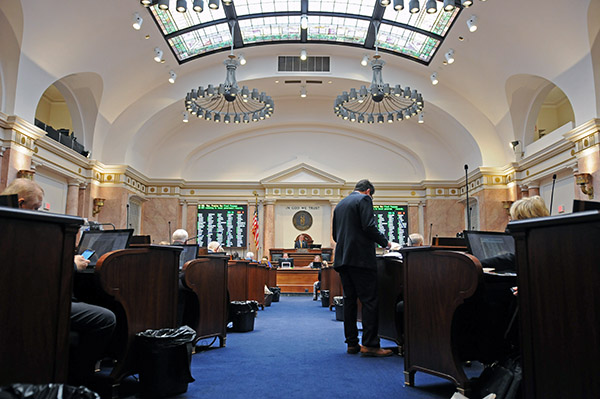
Work gets underway in the House of
Representatives. A high-res version of this
photo is available
here.
FRANKFORT — The
Kentucky General Assembly spent the last full
week of the 2022 legislative session considering
a torrent of bills on elections, abortion,
religion and gambling. But no issue appeared to
capture more of the spotlight than public
schools.
Lawmakers sent two major bills on education to
the governor’s desk this week, including one on
early childhood literacy and a separate,
much-debated package on academic standards.
Another measure on transgender athletes also
received final passage, while a bill on charter
schools cleared the House floor and several
others related to education continued to move
forward.
Only four days remain in this year’s regular
session, and lawmakers are working to finalize
bills before breaking next week for a 10-day
veto recess. That gives the General Assembly
time to override any vetoes from the governor
before adjourning for the year.
Bipartisanship ran high on Tuesday when
legislation on early childhood literacy – Senate
Bill 9 – received a final nod in the Senate.
Known as the Read to Succeed Act, the bill calls
for evidence-based learning techniques and
intensive interventions to improve literacy
outcomes and help struggling students in
kindergarten through the third grade. It won
final passage with unanimous support.
However, lawmakers faced steep divides
throughout the week on Senate Bill 1.
The measure calls for local superintendents –
rather than school councils – to determine
educational curriculum. It was amended in the
House to also include language from the Teaching
American Principles Act, which would require
instruction in social studies to align with a
list of core concepts and documents that
supporters say are central to American civics.
SB 1 cleared the House floor on Tuesday and
secured final passage in the Senate on Thursday,
but not before sparking lengthy debates in both
chambers.
The vote on Senate Bill 83 was likewise split.
The legislation would prevent male-to-female
transgender students from participating in
girls’ sports, starting in the sixth grade and
running through college. It received final
passage in the Senate on Thursday following
similar debate.
Legislation related to charter schools – House
Bill 9 – also moved off the House floor on
Thursday with a divided vote. That bill would
change the appeals process if a charter school
application is denied by a local school board.
It would also codify the funding mechanism for
charters and authorize two pilot charter school
projects.
At the beginning of the week, both the House and
Senate voted to override gubernatorial vetoes on
two measures.
The first, Senate Joint Resolution 150,
officially ends the COVID-19 state of emergency
in Kentucky. The other, House Bill 4, changes
the benefits and the job search requirements for
unemployment.
Meanwhile, many other bills continued to advance
through the process this week. That includes
legislation related to:
Serving alcohol:
House Bill 252 would clear the way for
18-year-olds to sell and serve alcoholic
beverages. It received final passage in the
Senate on Monday and has been delivered to the
governor.
Pari-mutuel
wagering: House Bill 607 seeks
to tax every pari-mutuel wager – including
advance-deposit wagers and bets on simulcasts –
at a standard 1.5%. It cleared the House floor
on Monday.
Gray machines:
House Bill 608 would prohibit certain gambling
machines, often called “gray” machines, in
Kentucky. It advanced out of Senate Licensing
and Occupations Committee on Tuesday.
Religious services:
House Bill 43 calls for equal treatment of
religious organizations during a state of
emergency. The legislation was sent to the
governor after receiving final passage in the
Senate on Wednesday.
Parental rights:
Senate Bill 40 calls on Kentucky courts to apply
a strict scrutiny standard when considering the
interests of parents in the care, custody and
control of their children. It cleared the Senate
floor on Wednesday.
Abortion:
House Bill 3 would require physicians to seek
permission from a minor’s parent or legal
guardian before allowing the minor to undergo a
chemical or surgical abortion. It passed out of
the Senate Health and Welfare Committee on
Wednesday.
Porch pirates:
Senate Bill 23 would make it a class D felony to
steal or destroy packages from common carriers
and delivery services – similar to the penalty
for stealing U.S. mail. The House Judiciary
Committee advanced the bill out of committee on
Wednesday.
Moment of silence:
House Bill 102 would require public schools to
implement a moment of silence or reflection at
the start of each school day. It cleared the
House floor on Wednesday.
School breakfasts:
Senate Bill 151 calls on schools in the Federal
School Breakfast Program to offer students up to
15 minutes to eat breakfast during instructional
time. It received final passage in the House on
Thursday.
Elections:
Senate Bill 216 seeks to strengthen election
security through multiple changes to state law.
That includes preventing voting machines from
being connected to the internet and eliminating
credit and debit cards as a form of
identification. It cleared the House floor on
Thursday with changes.
Constables:
House Bill 239 would require newly elected
constables to undergo professional law
enforcement training before performing certain
peace officer duties. It won final passage in
the Senate on Friday.
Death penalty:
House Bill 269 would add serious mental illness
to the list of disabilities that disqualify
offenders from execution if symptoms were
occurring at the time of the offense. The Senate
gave the bill final passage on Friday.
The General Assembly is scheduled to gavel back
into session on Tuesday and Wednesday next week
before breaking for the veto recess.
Kentuckians can track the action through the Legislative
Record webpage,
which allows users to follow a bill’s
progression through the chambers.
Citizens can also share their views on issues
with lawmakers by calling the General Assembly’s
toll-free message line at 1-800-372-7181.
END
March 24,
2022
House
committee approves unemployment for domestic
violence victims bill
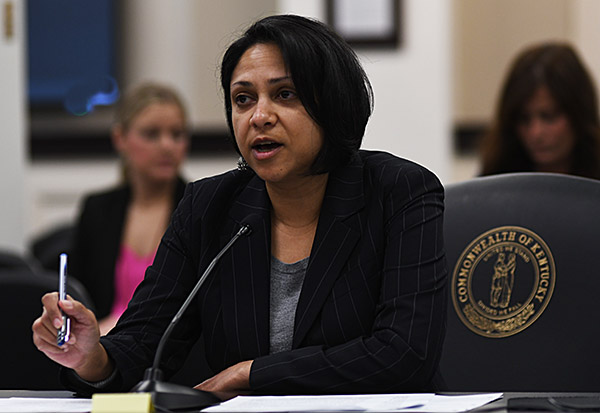
Rep. Nima Kulkarni, D-Louisville, testifies on
House Bill 83 in the House Economic Development
and Workforce Investment Committee. A high-res
version of this photo is available
here.
FRANKFORT— A
bipartisan initiative to extend unemployment
benefits to domestic violence victims is on the
move in the Kentucky House of Representatives.
The House Economic Development and Workforce
Investment Committee approved House Bill 83 on
Thursday. Rep. Nima Kulkarni, D-Louisville, said
she and Rep. Samara Heavrin, R-Leitchfield, have
worked with stakeholders on the legislation for
a couple of years.
“What this bill does is allow victims of
domestic, dating, sexual and stalking violence
who leave work, are unable to work, or separated
from employment due to circumstances directly
relating to that violence, to be eligible for
unemployment benefits….” Kulkarni said.
HB 83 would apply in cases where the victim
fears violence at or on route to the workplace,
Kulkarni added. A victim would also be eligible
if he or she wishes to relocate to another area
to avoid future violence or protect the safety
and health of themselves, their family or
co-workers.
Kulkarni cited several studies that show
domestic violence is linked to unemployment,
with 83% of domestic violence survivors
reporting their ability to work was negatively
impacted by an abusive partner. Kulkarni said
this legislation is necessary because Kentucky
has a rate of intimate partner violence higher
than the national average.
“Intimate partner violence impacts 1 in 4 women
and 1 in 9 men in their lifetime. In Kentucky,
that number is higher,” Kulkarni said. “One in 3
women and 1 in 8 men experienced partner abuse.
Nearly 1 in 2 women in Kentucky and 1 in 5 men
have reported sexual violence at some point in
their lives.”
HB 83 would require claimants to provide
documentation to prove eligibility, Kulkarni
added. The documentation could be police
records, court records, sworn statements or
other documentation of violence provided by the
victim, shelter workers, members of the clergy,
medical professionals or other professionals
from whom the victim has sought assistance.
“This evidence would be kept confidential under
this legislation,” Kulkarni said.
The bill would also direct the Education and
Workforce Development Cabinet secretary to
develop a confidential verification process
designed to detect fraudulent claims and train
employees.
Under HB 83, benefits would be paid from a
pooled account and not from the employer’s
reserve account.
“In addition, nothing in this bill will impact
an employer’s experience rating for purposes of
calculating the employer’s unemployment
insurance tax rate,” Kulkarni added.
The measure would also direct the cabinet to
train employees to process the claims and
provide a report by Sept. 30 each year to the
Legislative Research Commission detailing the
number of claims filed.
During discussion, Rep. Kim Banta, R-Ft.
Mitchell, and Rep. Matt Lockett,
R-Nicholasville, both told Kulkarni they like
the bill. Lockett asked Kulkarni about the
pooled account that would be used.
“The pooled account is something that employers
contribute to, and it reduces essentially the
burden for each individual employer from paying
out for unemployment benefits,” Kulkarni
clarified. “And so this is not going to be
charged to an employer’s reserve account, which
would be individual to an employer.”
Rep. Lynn Bechler, R-Marion, said he also likes
the idea of the bill, but he has concerns about
the fear aspect in the legislation.
“It seems to me that we may be going a bit too
far,” he said.
Kulkarni said the fear of violence language in
the bill means it has to be something that is
currently happening and can be proved with
documentation and “not the fear of future
violence or abuse.”
In explaining their “no” votes, Rep. Josh
Calloway, R-Irvington, and Rep. Scott Sharp,
R-Ashland, said they have concerns about the
potential of fraud. Calloway said he would like
to talk with Kulkarni and Heavrin more about his
concerns.
HB 83 now goes to the full House for
consideration.
END
March 23,
2022
Senate
approves bill that would strengthen parents’
rights
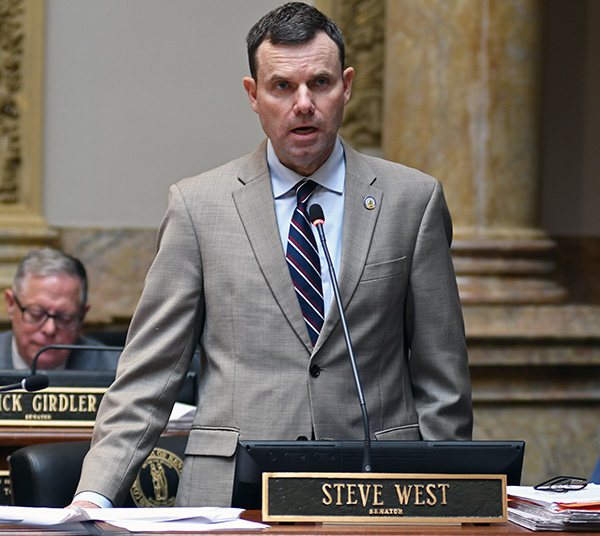
Sen. Stephen West, R-Paris, speaks on Senate
Bill 40, which seeks to strengthen parents’
rights. A high-res version of this photo is
available
here.
FRANKFORT — A bill
designed to reinforce parents’ rights received
approval Wednesday from the Senate.
The bill’s sponsor, Sen. Stephen West, R-Paris,
said Senate Bill 40 states that Kentucky courts
must apply a strict scrutiny standard when
considering the interests of parents in the
care, custody and control of their children.
“The purpose of this bill is to protect the
fundamental rights of Kentucky parents to direct
the upbringing, education and care of their
children as guaranteed under Fifth, Ninth and
Fourteenth Amendments of the U.S. Constitution,”
he said.
The care, custody and control of parents’
children is perhaps the oldest of the
fundamental liberty interests recognized by the
courts, West said.
“In fact, this right of parents to direct
upbringing, education and care of their children
predates the court itself. It is a right that
was already understood and acknowledged long
before the United States came to be as a
country” he said.
West said these rights were recognized in
English common law and by the commonwealth’s
forefathers. He added that the bill does not
affect existing state statutes, which have been
under this standard for many years.
“This bill simply protects an idea and a
standard that has been in operation since the
founding of this state and even before that in
order for the state to enact laws affecting our
fundamental right to parent our children,” he
said.
An amendment was added to legislation on the
Senate floor Wednesday to except instances of
child abuse and neglect. It passed 23-14 and now
heads to the House.
Senate Minority Floor Leader Morgan McGarvey,
D-Louisville, was one of the lawmakers who voted
in opposition. He said his most important job is
being a parent, but the bill is a solution in
search of a problem.
McGarvey also expressed concern for children who
are being raised by those who are not their
biological parents. He pointed to a section of
the bill that would define parents as the
biological or adoptive mother or father of a
child.
“Again, I’m thrilled that I get to be a parent
to my kids,” he said. “That is not the reality
for every child in Kentucky. In fact, there are
67,000 children in Kentucky who reside in
households where the primary caregiver is not
that definition of parent. There are 9,000
additional children in Kentucky who are in the
foster care system.”
McGarvey said lawmakers should be talking about
what they can do for children, not what can be
done to them.
“What rights do parents not have in Kentucky
right now? I ask as one of them. I don’t feel
any threat to help raise my children in the way
I see best fit. But this bill could create a
problem for kids who do not have their
biological parent as their primary caregiver,”
he said.
West said the legislation will not negatively
impact the right to “step into the shoes” of
parents for children who have had issues,
whether it’s foster care or another arrangement.
Sen. Johnnie Turner, R-Harlan, said he was going
to vote for the measure.
“This bill kind of raises that standard that
should have been placed the whole time. We
should protect parents’ rights,” he said.
“Nothing disrespectful of aunts, uncles,
grandpas, brothers and sisters that help take
care of them when needed. But this bill raises
the bar to where you as a parent now have
rights.”
END
March 23,
2022
House bill to
protect genetic data advances in committee
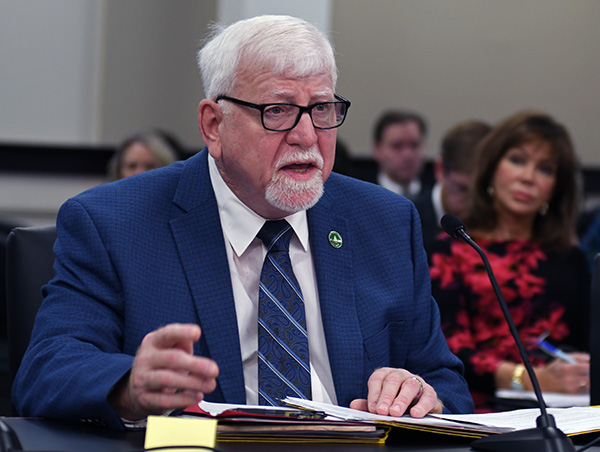
Rep. Danny Bentley, R-Russell, testifies on
House Bill 502, which would help ensure data
gathered by direct-to-consumer genetic testing
services remains private. A high-res version of
this photo is available
here.
FRANKFORT — The
Senate Health and Welfare Committee took steps
Wednesday to help ensure data gathered by
direct-to-consumer genetic testing services
remains private.
Sponsored by Rep. Danny Bentley, R-Russell,
House Bill 502 would put consumers in control of
their genetic data from start to finish when
they use genetic testing services.
Bentley said the state legislation is needed to
strengthen the federal regulations and rules
laboratories follow, and it is meant to protect
Kentuckians by putting up “guardrails.” The
measure is known as the Genetic Information
Privacy Act.
“DNA theft can result in exposure of medical
information such as AD (Alzheimer’s disease) or
predisposition to cancer,” he said, adding that
it can also reveal information about your family
relations. “We need to protect that for all
Kentuckians.”
The measure defines a biological sample as items
such as tissue, blood, urine or saliva known to
contain DNA.
The legislation calls for consumers to have a
process to access their genetic data, delete
their account and genetic data, and request and
obtain the destruction of their biological
samples.
It would also restrict how law enforcement
personnel use DNA records that are voluntarily
submitted to eliminate suspects.
Ritchie Engelhardt, Head of Government Affairs
at Ancestry, said the bill has had broad
stakeholder and bipartisan support in the states
where similar legislation has already passed.
“That includes Arizona, California, Utah and
Wyoming,” he said.
Similar legislation was taken up at The Council
of State Governments’ meeting last fall, and the
organization opted to include it in its state
bill book on model legislation.
Sen. Ralph Alvarado, R-Winchester, said he is in
favor of the bill because it’s good legislation
and it’s important to protect the state’s
citizens.
The measure was approved with a 10-0 vote. It
will now go to the full Senate for
consideration.
END
March 22,
2022
Charter
schools bill advances off House floor
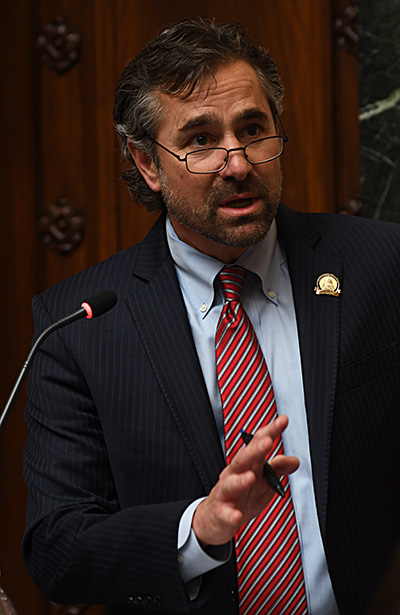
House Majority Whip Chad McCoy, R-Bardstown,
presents charter school bill, House Bill 9, on
the House floor. A high-res version of this
photo is available
here.
FRANKFORT— It’s
now the Kentucky Senate’s turn to consider a
House bill on charter schools after the measure
advanced off the House floor on Tuesday.
House Bill 9 would make changes to the appeal
process if a charter school application is
denied by a local school board. It would also
codify the funding mechanism for charter schools
and authorize two pilot charter school projects.
House Majority Whip Chad McCoy, R-Bardstown, is
the primary sponsor of the bill. He said HB 9
builds on charter school legislation from the
2017 legislative session.
Under current law, local school boards hold the
power to authorize a charter school, and charter
schools may appeal that decision to the Kentucky
Department of Education (KDE). McCoy said HB 9
does not change that. Instead, the bill requires
the department to explain its decision.
“(The bill) says that the KDE has to tell you
why they’re denying you or approving you and say
why this is or is not something good for the
local community,” McCoy said. “In addition,
we’ve changed and asked the KDE to offer
technical assistance to an applicant.”
According to McCoy, another provision of HB 9
would give school districts with less than 7,500
students a way to “veto” a charter school
appeal.
“If you are a school district with less than
7,500 kids, part of the application process
requires that you submit a memorandum of
understanding with your application from the
local school district. If you can’t get that,
then your application is deemed incomplete, thus
you don’t have an appeal,” McCoy said.
Under HB 9, two charter school pilot projects
would be authorized to open by 2023 in the West
End of Louisville and in Northern Kentucky.
McCoy said the hope is the pilot projects will
reveal to the legislature what changes need to
be made, if any, to how charter schools operate
in the Commonwealth.
Rep. Tina Bojanowski, D-Louisville, who is a
public school educator, spoke in opposition to
HB 9 on the House floor. She also proposed five
floor amendments to make various changes to the
measure. All five of the amendments failed to
gain enough votes to be eligible for
consideration.
In a House floor speech, Bojanowski criticized
the charter school industry and said she
believes “using public dollars to fund charter
schools in Kentucky is unconstitutional.”
“The driving force here is not innovation. It is
profits, and selling our children’s education
for a profit is wrong,” she said.
Rep. Timmy Truett, R-McKee, who is a public
school principal, said while school choice
sounds “great,” he has also concerns.
“I’m all for parents having a choice, but I’m
not for giving certain schools unfair
advantages,” Truett said. “In my opinion, House
Bill 9 is a vote against public education, and I
encourage you to think about that before you
make that vote.”
In a nearly two and a half hour debate, many
legislators spoke against HB 9 on the House
floor, including Rep. Cherlynn Stevenson,
D-Lexington. In her speech, she cited data that
showed out of 116 charter schools in Tennessee,
only five have a success rate of more than 20%.
McCoy said he does not think the claim that
charter schools have a high failure rate “holds
water.” He cited data that shows the charter
school failure rate at 2.8%. He also said he
does not believe local school boards would allow
a charter school to come in to a community and
do the “horrible things” some lawmakers
expressed concerns about.
“Look, I’ll be the first to tell you that there
are bad charter schools out there, and I think
everybody would agree with me that there are bad
public schools out there too,” McCoy said.
“That’s not an indictment on the whole process
one way or another. This is about parents.
Parents need choice, and this bill gives choice
in our public school system.”
Rep. Kevin D. Bratcher, R-Louisville, joined
several voices speaking in favor of HB 9 on the
House floor. He said parents want a choice when
it comes to their child’s education, and he
believes the legislature should “give them a
little bit of choice.”
Rep. Scott Sharp, R-Ashland, agreed HB 9 is a
bill about giving parents a choice.
“I’ve got to do what I think is best for the
parents of my district to give them an option of
something different, to give them more options
than what they have,” he said.
The House approved HB 9 by a 51-46 vote. It will
now go before the Senate for consideration.
END
March 22,
2022
House
committee approves Teaching American Principles
Act
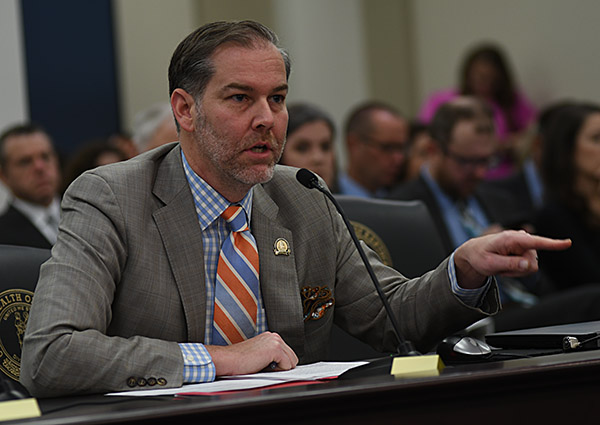
Sen. Max Wise, R-Campbellsville, testifies on
Senate Bill 138 during the House Education
Committee on Tuesday. A high-res version of this
photo is available
here.
FRANKFORT— A
Senate bill seeking to improve civics education
in public schools is one step closer to becoming
law.
The House Education Committee approved Senate
Bill 138, or the Teaching American Principles
Act, on Tuesday.
“The purpose of this bill is to preserve the
alignment of middle and high school standards
with American principles of equality, freedom
and personal agency,” said Sen. Max Wise,
R-Campbellsville, the bill’s primary sponsor.
Under SB 138, public schools would have to
provide instruction in social studies that
aligns with a list of concepts such as “all
individuals are created equal” and “Americans
are entitled to equal protection under the law,”
among several others.
It also requires instruction to be “within the
range of knowledge, understanding, age, and
maturity of the students receiving the
instruction.”
Another provision of SB 138 would provide a list
of documents for the Kentucky Department of
Education to incorporate into grade-level
appropriate academic standards for middle and
high school social studies classes.
Those documents include, “The Mayflower
Compact,” the U.S. Constitution, the U.S.
Supreme Court opinion in Plessy v. Ferguson, the
“Declaration of Rights of the Women of the
United States,” Dr. Martin Luther King Jr.’s “I
Have a Dream” speech, “A Time for Choosing” by
Ronald Reagan and more.
Wise said SB 138 is necessary because less than
25% of U.S. students graduating high school can
pass a U.S. civics or citizenship examination.
“We are facing a civics crisis in not just the
Commonwealth of Kentucky, but the United
States,” Wise added. “I do not blame the
teachers for that, but I look at things that get
cut many times from our standards and it is
civics education.”
Kate Miller with the American Civil Liberties
Union of Kentucky was one of many to testify
against SB 138 during the committee meeting. She
was joined by students who also spoke against
the bill.
“Senate Bill 138 first serves as a way to censor
speech,” Miller said. “It is a government
censorship bill. There’s a long history of these
types of bills, and we should remember that
First Amendment rights do not stop for teachers
or students at the schoolhouse gate.”
During Wise’s testimony, he said the intention
of SB 138 is not to dictate what can and cannot
be said in the classroom.
“There is nothing in the bill that tells an
educator what you can or cannot teach. It does
not discipline teachers,” Wise said. “It does
not tell a student what you can and cannot say.
It simply looks at the foundations of our
country and allows educators to go back and use
those documents.”
During discussion of the bill, Rep. Attica
Scott, D- Louisville, said she has an issue with
the bill’s “erasure of women” in the core
documents list. She also questioned language in
the bill regarding the teaching of slavery, the
Civil War and racial segregation and
discrimination. In explaining her “no” vote,
Scott expressed concerns about censorship.
“I just can’t vote for something that takes away
the voice of so many people that I represent
back home in District 41,” she said.
Rep. Myron Dossett, R-Pembroke, spoke in favor
of SB 138 while explaining his “yes” vote. He
mentioned his granddaughter and conversations
they have about American History.
“Things that I have taught her about the
Constitution and the Declaration of
Independence, things that I have brought into
her mind on this to let her know that equality
does exist in this nation,” Dossett said. “Maybe
in some instances we could do better, but that
we have learned from our past and that she has a
chance of a very good life.”
SB 138 will now go before the full House for
consideration.
END
March 22,
2022
Senate
advances bill to allow 18-year-olds to sell,
serve alcohol
FRANKFORT —
Kentucky is on its way to joining many states
where 18-year-olds can sell and serve alcoholic
beverages.
Currently, Kentucky sets the minimum age to sell
and serve alcohol at 20, but House Bill 252
would lower the threshold. The Senate on Monday
gave final passage to the bill with a 23-10
vote. It now heads to the governor’s desk.
Supporters said the legislation would not only
help the beleaguered restaurant industry, but
also young people who seek employment.
“So when you go into a restaurant today there
are empty tables, and it’s not because of COVID
or six feet of distancing requirements,” said
Senate Majority Caucus Chair Julie Raque Adams,
R-Louisville. “It’s because restaurants do not
have enough staff. House Bill 252 is an attempt
to correct that part of our workforce shortage.”
The legislation is sponsored by Rep. Killian
Timoney, R-Lexington. However, Adams presented
the bill on the Senate floor.
By allowing restaurants to hire 18-year-olds,
restaurants gain a larger employment pool and
opportunities expand for young job seekers, she
said.
“In comparing Kentucky’s laws to surrounding
states, all of them allow a person to be
employed before the age of 20, and today this
leads many of our young Kentuckians to work
across the borders. So, the challenges caused by
COVID still reverberate throughout the
restaurant industry including workforce
shortages,” she said.
The bill would also offer “immediate and
significant” relief to distribution companies,
according to Adams.
Sen. Wil Schroder, R-Wilder, voted for the bill
and said he is in agreement about young job
seekers who look for opportunities in
surrounding states.
“We’ve seen when people have the ability to
choose – that are under 21 – whether to take a
job in the restaurant industry in Ohio or in
Kentucky,” he said. “This plays a factor because
this plays a factor in their tips. So this will
play a factor in workforce retention for some of
our restaurants in Northern Kentucky.”
Sen. Brandon Smith, R-Hazard, said he would
normally vote against this type of legislation.
But if it becomes problematic, the law could be
changed next year, he said.
“I hate to think I
would do something to knock one of these young
people out of getting a job that they
desperately need only because of something like
this,” he said. “It doesn’t create an
opportunity for them to drink any more than they
have on their own.”
END
March 21,
2022
Pari-mutuel
wagering modernization bill clears House floor
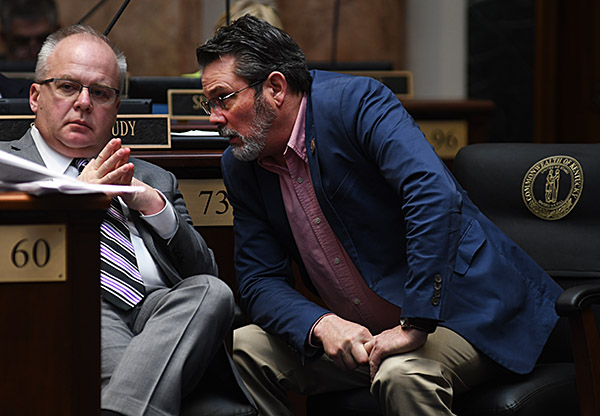
Rep. Adam Koenig, R-Erlanger, left, confers with
Rep. Ken Upchurch, R-Monticello, on House Bill
607 on the House floor. A high-res version of
this photo is available
here.
FRANKFORT— The
Kentucky House of Representatives approved a
bill Monday that seeks to tax every pari-mutuel
wager at 1.5%.
Rep. Adam Koenig, R-Erlanger, is the primary
sponsor of House Bill 607. He said the bill will
modernize the pari-mutuel wagering industry.
“We’re going to make Kentucky the most desirable
place if you want to wager on horses in North
America,” Koenig said. “That’s going to create
more revenue. That’s going to create more
opportunities for our tracks and provide a lot
of success.”
HB 607 follows reforms to pari-mutuel wagering
in the 2021 Regular Session. It is also the
product of the Pari-Mutuel Wagering Taxation
Task Force. Koenig said the task force met five
times during the 2021 interim.
Currently, advance-deposit wagering is taxed at
.5%, and bets on simulcasts are taxed at 3%,
Koenig said. HB 607 would tax every pari-mutuel
wager at 1.5%, the same rate for races happening
at a track.
“I’m sure all of those tax rates made sense at
one point, but we don’t think they make sense
anymore,” Koenig said.
HB 607 also directs more money to the general
fund, eliminates breakage, makes the Kentucky
Racing Commission responsible for self-funding,
creates a self-exclusion list for problem
gamblers, eliminates the track admissions tax
and more.
Koenig said pari-mutuel wagering brings in
millions of revenue to the state already, and if
passed, the changes proposed in HB 607 are
expected to bring in more.
“In 2016, the general fund saw $4 million from
(historical horse racing) machines. In 2021, it
saw $41 million, so it went up 10 times in a
span of four years,” Koenig said. “And this
year, we’re estimating it to be $62 million,
which will be a 50% increase. So those increases
are happening whether we pass this bill or not.”
During discussion of the bill, several lawmakers
said they would like to see a higher tax rate on
pari-mutuel wagering.
Rep. Josh Calloway, R-Irvington, proposed a
floor amendment to raise the tax to 6%.
“I believe that gambling is an irresponsible way
to raise revenue,” Calloway said. “…. And so my
thought process is that if we are going to do
this, and we continue to move forward with it,
that we should benefit as much as possible from
this and try to get as much for the state as we
can.”
Speaking against the amendment, Koenig said it
would “put an end to the historical horse racing
machine (HHR) system in Kentucky.” Calloway’s
floor amendment failed by a 32-39 vote.
Rep. Nima Kulkarni, D-Louisville, also urged the
House to consider a higher tax rate on
pari-mutuel wagering.
“I will be voting no on this bill because we as
a body should be looking at ways to fairly tax
HHR revenues instead of continuing to subsidize
and bailout corporations with record breaking,
soaring profits,” she said.
Rep. Matthew Koch, R-Paris, who was a member of
the Pari-Mutuel Wagering Taxation Task Force,
spoke in favor of HB 607.
“I think the task force did exactly what it set
out to do,” he said.
In explaining his “yes” vote, Rep. Jim
DuPlessis, R-Elizabethtown, said although he
would like to see a higher tax rate on
pari-mutuel wagering, he likes that the bill in
its current form will still generate more
revenue for the state.
The House approved HB 607 by an 81-14 vote. It
will now go before the Senate for consideration.
END
March 18,
2022
House votes to
take a gamble on sports betting
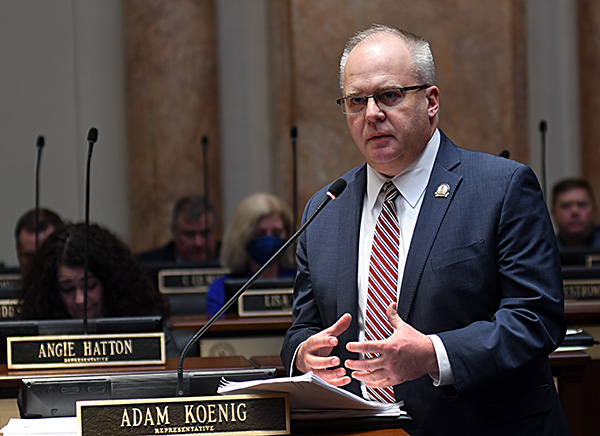
Rep. Adam Koenig, R-Erlanger, presents House
Bill 606 on the House floor on Friday. A
high-res version of this photo is available
here.
FRANKFORT— A bill
many Kentuckians have spent years asking for
advanced off the House floor on Friday.
House Bill 606 would legalize in-person and
online sports betting in Kentucky.
“House Bill 606 brings activities that go on in
every corner of this state out of the darkness
and into the light,” said primary bill sponsor
Rep. Adam Koenig, R-Erlanger. “It legalizes
sports wagering and regulates it. It regulates
the daily fantasy sports, which goes on openly
on U.S. companies today, and it legalizes and
regulates online poker.”
Koenig said sports betting is legal in most of
the states surrounding Kentucky. He also cited a
statistic from American Gaming Association that
estimates $2 billion is illegally wagered on
sports in Kentucky each year.
The bipartisan bill would tax sports betting by
implementing a 9.75% tax on the adjusted gross
revenue for in-person sports betting and a
14.25% tax on the adjusted gross revenue for
online sports betting. The money would go toward
the state’s pension fund.
Koenig said the state estimates that legalizing
sports betting in Kentucky would bring in $22.5
million in revenue for the state.
“Given how many states have exceeded their
projections, I think $22.5 million is probably a
minimum,” Koenig added.
Rep. Josh Calloway, R-Irvington, called a floor
amendment to set a $1,000 limit on how much a
bettor can lose in a 24-hour period online.
“For instance, if you are a bartender and you
see someone that is (drunk), you would stop and
not serve them anymore, and I believe that we
could put these same types of limits on this if
this is going to move forward,” he said.
Koenig said he “trusts adults to make adult
decisions,” and he could not support the
amendment because it would be easy to avoid the
limit by going to another state. Koenig also
mentioned he knows of people in Kentucky who
already make their livelihood on sports betting.
Calloway’s amendment failed by a voice vote.
While voting on HB 606, several lawmakers
explained their “no” votes.
Rep. Daniel Elliott, R-Danville, said while he
is a “big believer in personal responsibility,”
he would not be voting in favor of HB 606.
“I think the appropriate way to deal with this
issue and all issues of gaming in Kentucky and
gambling is through a constitutional amendment.
That I would support,” Elliott said.
Rep. David Hale, R-Wellington, said he was
voting “no” on the bill because he does not like
that the purpose of the bill is to generate
revenue and that it would hurt vulnerable
people.
Rep. Rachel Roberts, D-Newport, voted “yes” on
HB 606. She said she was proud to co-sponsor the
measure.
“I, like many others have said, received so many
messages from constituents in District 67 who
overwhelmingly want this,” Roberts added.
Rep. Cherlynn Stevenson, D-Lexington, also voted
in favor of HB 606. She said the bill is
“without a shadow of a doubt” the issue she has
received the most phone calls and emails about
in her four years in the House with 99% of those
messages being in favor of sports betting in
Kentucky.
HB 606 cleared the House by a 58-30 vote. It
will now go before the Senate for consideration.
END
March 18,
2022
This Week at
the State Capitol
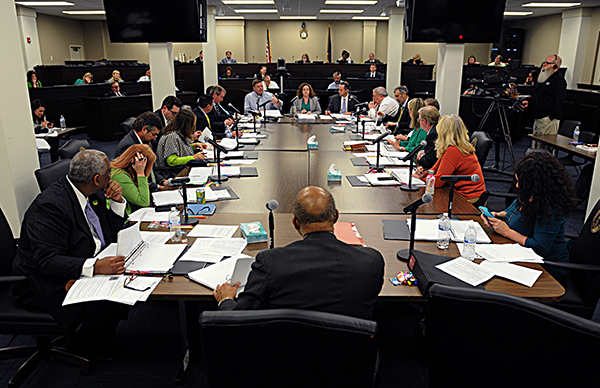
Lawmakers from the House and Senate met in
conference committee Thursday night to negotiate
the state’s next two-year budget. A high-res
version of this photo is available
here.
FRANKFORT — The
final days of the 2022 legislative session are
well in sight, and lawmakers are redoubling
efforts to count votes and move bills, including
some high-profile measures this week on gambling
and medical cannabis.
The Kentucky General Assembly has nine days left
in the 60-day session, and many of the most
watched bills from this year are hanging in the
balance, including the state’s historic
executive branch budget, which is poised to top
$100 billion.
Lawmakers met in conference committee on
Wednesday and Thursday night to begin
negotiating a budget deal between the House and
Senate, and talks are expected to continue next
week.
The late meetings foreshadow even longer hours
ahead as legislators debate, amend and otherwise
prepare dozens of additional bills for final
passage.
This week started with a jolt as the House
advanced 22 bills during a marathon floor
session on Monday. Measures related to juvenile
justice, unemployment insurance, and penalties
for trafficking fentanyl, among many others, all
cleared the floor.
The Senate also kicked off the week by giving
final passage to House Bill 263 – known as
Kami’s Law – which would increase the penalties
for abusing children under 12 years of age.
Much of the attention shifted toward medical
cannabis and gambling as the week continued.
The House advanced a massive package out of
committee on Wednesday that included four
separate measures on gambling. Two of those
bills, which would legalize most forms of sports
betting and ban electronic “gray” machines,
advanced off the House floor Friday.
The medicinal cannabis bill – House Bill 136 –
also cleared the House floor on Thursday after a
long and impassioned debate.
It would legalize some forms of cannabis as a
treatment option for people with cancer, chronic
pain, epilepsy, multiple sclerosis, chronic
nausea and post-traumatic stress disorder.
The legislation also calls on officials to track
cannabis prescriptions through the Kentucky All
Schedule Prescription Electronic Reporting
(KASPER) system.
In addition to those measures, many other bills
were moving through the process this week. That
includes legislation related to:
Fentanyl:
House Bill 215, called “Dalton’s Law,” would
make importing fentanyl, carfentanil or fentanyl
derivatives a Class C felony. Offenders would be
required to serve at least 85% of their sentence
and would not be eligible for pretrial diversion
under the bill. It cleared the House floor on
Monday.
Felon student aid:
Senate Bill 163 would allow some inmates and
felons to access state aid for college,
including funds from the Kentucky Educational
Excellence Scholarship, known as KEES. The bill
passed off the Senate floor Wednesday.
Refugee relief
funds: Senate Bill 195 would
earmark $50 million to assist refugees from
Ukraine and other countries. That includes
grants to help families relocate. The Senate
Appropriations and Revenue Committee approved
the bill on Wednesday.
Abortion:
With some exceptions, Senate Bill 321 would
prohibit abortions at 15 weeks of gestation and
redefine the term “pain-capable unborn child” in
state law. It moved off the Senate floor on
Wednesday.
KSU Board:
Senate Bill 265 would direct the governor to
name replacements for the Kentucky State
University Board of Regents by April 4. The bill
received final passage on Thursday and was sent
to the governor.
School boards:
House Bill 121 calls on school boards to provide
a public comment period of at least 15 minutes
during each regular meeting. It would also
require rules around civility to remain in
effect during comment periods. The bill cleared
the Senate floor on Thursday.
Child abuse:
House Bill 270 seeks to combat child abuse by
teaching young students in Kentucky schools to
speak up when they are victimized. The Senate
Education Committee advanced the measure
Thursday.
Religious freedom:
House Bill 43 would prevent houses of worship
and other religious organizations from being
singled out for closure during a state of
emergency. The bill passed the Senate State and
Local Government Committee on Thursday.
Transgender
athletes: Senate Bill 83 would
prevent male-to-female transgender students from
participating in girls’ sports, starting in the
sixth grade. It moved off the House floor on
Thursday.
Public assistance:
House Bill 7 calls for a major overhaul of
Kentucky’s public assistance programs with a
focus on work requirements and battling fraud.
It passed off the House floor on Thursday.
The General Assembly will return Monday for day
52 of the session, and Kentuckians can track the
action through the
Legislative Record
webpage,
which allows users to follow a bill’s
progression through the chambers.
Citizens can also share their views on issues
with lawmakers by calling the General Assembly’s
toll-free message line at 1-800-372-7181.
END
March 17,
2022
Senate
advances bill to require comment period at
school board meetings
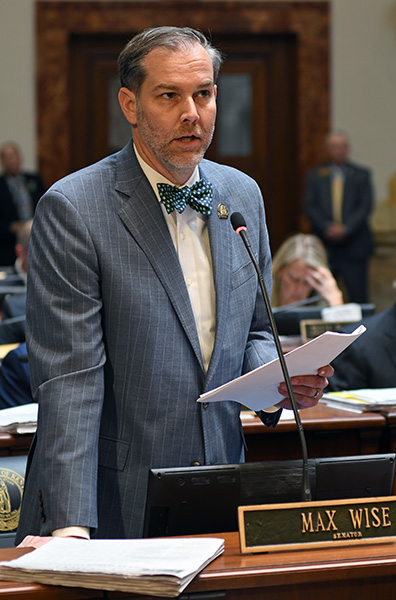
Sen. Max Wise, R-Campbellsville, speaks on House
Bill 121, which would require at least 15
minutes for public comment at school board
meetings. A high-res version of this photo is
available
here.
FRANKFORT —A bill
that would require civility and public comment
periods during school board meetings advanced
Thursday on the Senate floor.
House Bill 121 calls on school boards to provide
a public comment period of at least 15 minutes,
or until comment ends, at each regular meeting.
The comment period could be passed over if no
one has made a request to speak.
Sen. Max Wise, R-Campbellsville, presented the
bill on the Senate floor and told lawmakers that
parents were sometimes shut out of school board
meetings in Kentucky and many other states.
“I think it would be an understatement to say
that for the past two years, there’s probably
not been more attendance, passion, debate, …
dialogue that’s been expressed in local school
board meetings in a long, long time.”
HB 121 is
sponsored by Rep. Regina Huff, R-Williamsburg;
Rep. Thomas Huff, R-Shepherdsville; and Rep.
Brandon Reed, R-Hodgenville. It received
approval in the Senate with a 25-10 vote after
lawmakers adopted two amendments. The bill will
now return to the House.
One amendment was sponsored by Sen. Gerald A.
Neal, D-Louisville. It would require that any
board rules and policies related to conduct
during meetings remain in effect during the
public comment period.
“That’s to make sure that we maintain the
civility and the order that obviously anyone
conducting a hearing of any kind, a board
meeting of any kind, must maintain,” he said.
The second amendment – sponsored by Sen.
Adrienne Southworth, R-Lawrenceburg – clarified
that the public comment period could last longer
than 15 minutes if needed.
Senate Minority Floor Leader Morgan McGarvey,
D-Louisville, stood in opposition to HB 121
after noting that he too is a parent.
“I believe in having parents’ voices involved in
education,” he said. “Let’s make no mistake
about what we are doing here today though. We
are telling locally elected officials how to run
their meetings.”
Wise concluded by thanking parents and school
officials, who he said never expected to be
dealing with the issues that have come their
way.
“In the times of strife, in the times of
compassion and passion, we appreciate the work
that each one of our local officials have
displayed,” he said.
END
March 17,
2022
Bill
legalizing medicinal cannabis clears House floor
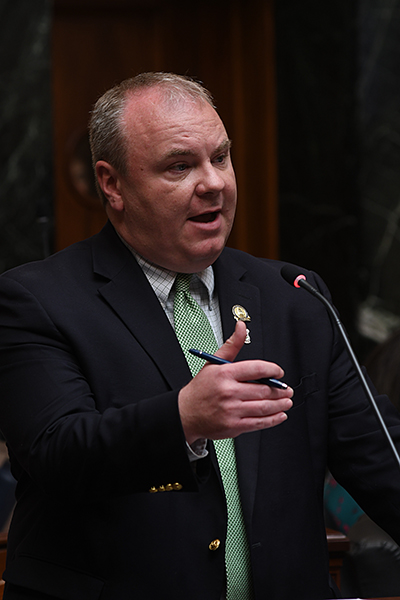
Rep. Jason Nemes, R-Louisville, presents House
Bill 136, a bill to legalize medicinal cannabis
on the House floor. A high-res version of the
photo can be found
here.
FRANKFORT— Doctors
may soon be permitted to prescribe medicinal
cannabis to Kentuckians with certain medical
conditions.
House Bill 136 would legalize medicinal cannabis
as a treatment option for people with cancer,
chronic pain, epilepsy, multiple sclerosis,
chronic nausea, cyclical vomiting, and
post-traumatic stress disorder.
The bill’s primary sponsor, Rep. Jason Nemes,
R-Louisville, has carried similar legislation in
the House before, but the measures failed to
receive approval from both chambers. Nemes said
he’s worked with many people over the years to
make changes to the legislation that more
lawmakers could support.
“When I took this bill and grabbed it by the
horns and made it tighter, I worked with a lot
of you, a lot of senators and made it to where
this is truly a bill for people who are just
trying to be and just trying to be better,”
Nemes told lawmakers on the House floor.
Nemes added he does not support recreational
marijuana and was originally against medicinal
marijuana, but had a change of heart after
hearing about the benefits of medicinal
cannabis.
HB 136 would not allow people to grow their own
marijuana or smoke cannabis, aside from vaping.
Nemes said only Kentuckians 21 and older would
be permitted to vape medicinal cannabis.
Another provision of the bill would create four
different licenses to prevent just one person or
company from being able to grow, process,
dispense and test medicinal cannabis for safety.
Prescriptions would also be tracked through the
Kentucky All Schedule Prescription Electronic
Reporting (KASPER) system.
On the House floor, Nemes successfully amended
the bill to require legislative approval for
conditions to be added or removed from the
approved list.
Rep. Rachel
Roberts, D-Newport, also successfully amended
the bill to add post-traumatic stress disorder
to the list of approved conditions. She said out
of the 37 other states that have legalized
medicinal cannabis, all of them allow it as a
treatment for PTSD. A clinical diagnosis would
be required for a patient to be eligible for a
medicinal cannabis prescription.
Rep. Al Gentry, D-Louisville, spoke on the House
floor in favor of HB 136 by sharing how
medicinal cannabis has helped people he knows.
“I know real people that have had their lives
turned around by these products, and a lot of
them are living in the closet or living in
secrecy because they feel like they’re a
criminal,” Gentry said.
Rep. Chris Fugate, R-Chavies, said he
understands and has compassion for people who
are in pain, but he has legal concerns about the
bill.
“The fact of the matter is marijuana, whether
medical or recreational, is still illegal in the
federal government,” Fugate said, adding doctors
and pharmacists risk losing their United States
Drug Enforcement Administration (DEA) license by
prescribing medicinal cannabis. Fugate also
expressed concerns about addiction.
Nemes said while marijuana is illegal under
federal law, the federal government has said it
would not prosecute against cannabis use for
medicinal purposes in states where it is legal.
Rep. Matt Lockett, R-Nicholasville, also
expressed concerns about HB 136. He believes
medicinal cannabis needs more research.
“I do believe that it can be a great tool in our
tool belt in the medical community. However, I
do believe that it deserves a lot more time,”
Lockett said.
In explaining her “yes” vote, Rep. Norma
Kirk-McCormick, R-Inez, said she has also seen
how medicinal cannabis helps people with chronic
medical conditions.
Rep. Patti Minter, D-Bowling Green, also voted
in favor of HB 136 with her constituents in
mind.
“I’ve cast many votes in support of medicinal
marijuana before because the people of District
20 asked me to do it — people from every walk of
life,” Minter said.
The House approved HB 136 by a 59-34 vote. It
will now go before the Senate for consideration.
END
March 17,
2022
Students to
learn about child abuse and prevention under
bill
FRANKFORT — Erin
Merryn has put the stories of how she suffered
sexual abuse as a child in the public eye in a
far-reaching way by sharing them with
legislators across the country.
On Thursday, she addressed the Senate Education
Committee virtually from Illinois. That lead to
the committee’s approval of a measure – House
Bill 270 – that would incorporate instruction on
child abuse awareness and prevention in Kentucky
schools.
“I went off to kindergarten and met my best
friend, and it was in kindergarten that I had my
first overnight in her house, and she had an
uncle that lived in the home,” Merryn said. “And
in the middle of the night, I woke up to him
coming in the room and sexually abusing me, and
he told me to keep it a secret.”
Merryn said one of the most compelling reasons
for legislation on abuse and prevention is
victims are often told to remain silent about
it. The legislation would lead to teaching
students to speak up if they are being abused.
“Unfortunately, most parents only talk to their
kids about stranger danger. Ninety percent of
the time children are not being sexually abused,
physically abused by the stranger, but by
someone they know and trust,” she said.
The bill’s primary sponsor, Rep. Nancy Tate,
R-Brandenburg, said there are 37 states that
have already adopted similar legislation. The
bill is also sponsored by Rep. Ruth Ann Palumbo,
D-Lexington, and Rep. Melinda Gibbons Prunty,
R-Belton.
Tate said it’s not the first time the bill,
named “Erin’s Law,” has been discussed in
committee.
“But I think it’s very timely for this bill
especially considering in March of this year the
U.S. Department of Health and Human Services
stated that for the third year in a row Kentucky
leads the nation in child abuse cases,” she
said.
Tate said there has been much conversation about
social workers and how there are not enough of
them in Kentucky.
“And so I think that it’s really important, and
the social workers do a lot of work and we
cannot live without them, but this is a bill and
a situation and another tactic. It’s not a
silver bullet, but it’s certainly something else
to add to our toolkit that will help with the
situation,” she said.
Merryn told the committee she was also abused
and threatened by an older teenage cousin who
told her to keep the abuse a secret. But she
wrote about it in a diary.
“This was like the brother I never had growing
up who lived down the street from me,” she said.
After years had passed, Merryn began writing
legislators to advocate that personal body
safety be taught to school children.
Lawmakers approved changes to the original bill
in committee. Sen. Max Wise, R-Campbellsville,
said the new language dovetails off earlier
legislation.
“The original House bill version requires the
Kentucky Department of Education to maintain an
improved list and for a superintendent to adopt
a curriculum that includes instruction for
age-appropriate, evidence-based strategies for
child physical, sexual, emotional abuse and
neglect,” he said. “The committee sub basically
accomplishes the original intent of the bill
within the existing trauma-informed processes
that we established in the 2019 Senate Bill 1
that was under the School Safety Resiliency
Act.”
Sen. Adrienne Southworth, R-Lawrenceburg, said
she appreciated Merryn for sharing her stories
with committee members, but she has concerns
about some of the language in the bill.
“In many cases, this is a socioeconomic issue,”
she said. “It can be a poverty issue. What is
neglect awareness? I’m more poor than you are,
and therefore my parents have neglected me and
that just starts into a whole other problem. So,
I’m very concerned about how we do this, and I
like the sub because it definitely tightens it
down. It gets way closer, but I don’t think it’s
all the way there.”
The measure passed with a 7-0 vote. Two
committee members passed on a vote.
END
March 17,
2022
Legislation
calls for equal treatment of religious
organizations in emergencies
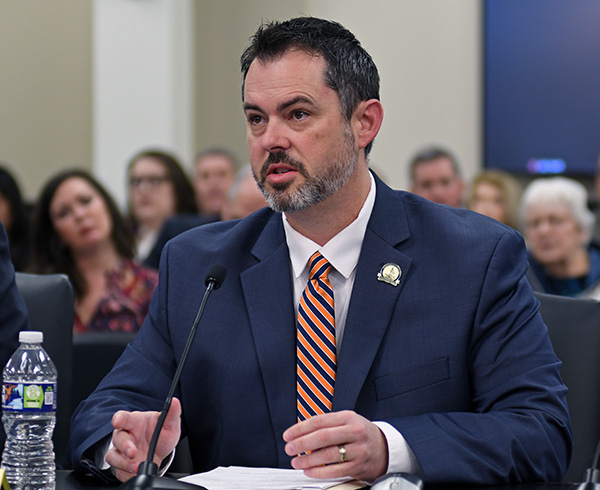
Rep. Shane Baker, R-Somerset, testifies on House
Bill 43, a measure to prevent houses of worship
from being singled out during a state of
emergency. A high-res version of the photo can
be found
here.
FRANKFORT — A
measure that would prevent houses of worship
from being singled out for closure during a
state of emergency received approval Thursday
from the Senate State and Local Government
Committee.
The bill’s sponsor, Rep. Shane Baker,
R-Somerset, told committee members that the bill
is in response to the shutdown of churches and
other religious organizations in 2020.
“The bill does a couple of simple things,” he
said. “No. 1, it says that churches and
religious organizations should be treated in the
same manner as other essential organizations
during times of emergency.”
The bill would also prevent the state from
taking adverse action against a religious
organization simply for being religious.
Additionally, it would codify recent Supreme
Court decisions, which make clear that free
exercise rights are fundamental, and that
governments can’t treat religious organizations
more adversely than other groups, Baker said.
The bill also allows religious organizations to
bring a lawsuit if they have been discriminated
against, he said.
David Walls, executive director of The Family
Foundation, offered supportive comments on the
bill.
“It’s vitally important that we ensure that
churches and other religious organizations
receive at least equal treatment during an
emergency, and that the state is not allowed to
discriminate against them on the basis of them
being a religious organization,” he said.
Sen. Christian McDaniel, R-Taylor Mill, voted
for the measure, but expressed concerns about
unintended consequences.
“You’re opening up for interpretation with this
what is actually constituted as religious
expression and a right of action against the
state that currently exists, and I think that we
may be opening ourselves up to some unintended
consequences that have not been thought through
very well with this,” he said.
The measure was approved with a 10-1 vote. It
now heads to the Senate floor for consideration.
END
March 16,
2022
Senate bill
would allow some felons to access state aid for
college
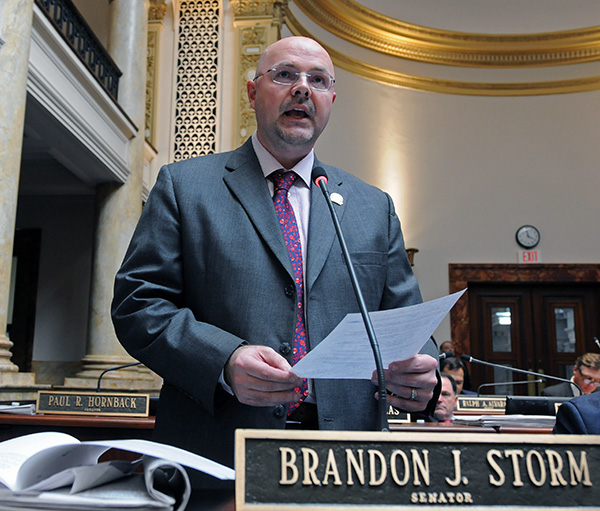
Sen. Brandon J. Storm, R-London, speaks on
Senate Bill 163, which would increase access to
scholarships for some felons. A high-res
version of the photo can be found
here.
FRANKFORT —
Legislation that would clear the way for some
felons and inmates to receive state financial
aid for college advanced out of the Senate on
Wednesday – an effort to improve job
opportunities and reduce recidivism among those
with a criminal record.
Senate Bill 163 would remove language in state
law has long prevented certain inmates and
convicted felons from obtaining aid through the
Kentucky Educational Excellence Scholarship,
known as KEES.
It would also allow inmates to receive funds
through College Access Program Grant, the
Kentucky Tuition Grant and the Work Ready
Kentucky Scholarship Program. Another section of
the bill would permit students to use
scholarship funds for tuition at qualified
proprietary schools.
The bill’s sponsor, Sen. Brandon J. Storm,
R-London, said all of provisions center around
increasing access to education for Kentuckians.
“Statistics indicate that education reduces
recidivism,” he said. “Statistics also indicate
that jobs reduce recidivism. By deleting the
requirement that an eligible high school student
and eligible postsecondary student not be a
convicted felon, these individuals will no
longer be prohibited from obtaining financial
aid.”
The measure advanced off the Senate floor with a
33-4 vote. However, it was amended before
passage to narrow the list of offenders who
would be eligible for aid. The amendment
disqualifies violent offenders, some drug
traffickers and those who have committed
offenses against minors.
Sen. Danny Carroll, R-Benton, who sponsored the
amendment, said SB 163 still provides latitude
for minor offenses. But, he added, the list of
disqualified offenses would include crimes like
human trafficking and sexual abuse along with
rape and murder.
“I think the bill is very fair and very
considerate,” he said. “I think there are just
some lines that we don’t cross with taxpayer
dollars.”
Wednesday’s amendment brought a mix of reactions
on the floor.
Sen. John Schickel, R-Union, voted for the
legislation and thanked Storm for his work. But
he said he would not have supported the measure
without the amendment to disqualify certain
offenders. He raised concerns over homeschoolers
who would not be eligible for the same funds.
“These are folks whose SAT scores are some of
the highest in the state, who have parents who
have shouldered the burden of their child’s
education without any help from the state
whatsoever,” he said. “And here they see that
possibly a violent criminal or someone
trafficking in lots of drugs might have KEES
assistance when they don’t have KEES
assistance.”
Sen. David Yates, D-Louisville, also voted “yes”
for the final bill, but said the changes make it
too difficult for some people to improve their
lives. He argued that it’s cheaper to have
people back in the workforce rather than back in
prison.
“The amendment on its face seems reasonable,” he
said. “Unfortunately, the problem we have over
and over again is that we have recidivism.”
Senate Minority Caucus Chair Reginald Thomas,
D-Lexington, said Senate Bill 163 in its most
pristine form was an excellent bill. However,
the bill’s original intent was sorely
compromised. He voted against the measure.
“All of us in here believe in second chances,
and that’s where Senate Bill 163 was born,” he
said. “However, this Senate floor amendment
essentially guts the bill.”
Senate Majority Floor Leader Damon Thayer,
R-Georgetown, also voted in opposition. He said
he is concerned about diluting the funds for
hardworking students who currently qualify for
KEES. He said he expects the bill to undergo
more changes in the House.
As passed on Wednesday, the provisions related
to proprietary schools stipulate that eligible
programs have to be one of Kentucky’s top five,
high demand work sectors as determined by the
Kentucky Workforce Investment Board.
Another section of SB 163 extends KEES financial
aid opportunities to a narrow group of students
whose parents or guardians were transferred out
of Kentucky due to ongoing military service.
The bill now heads to the House.
END
March 16,
2022
House
committee advances bill to ban gray machines
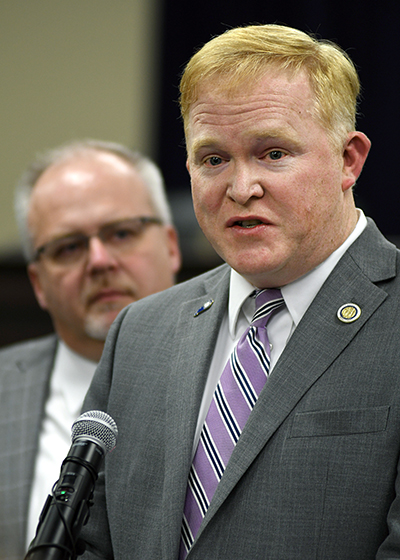
This file photo from Feb. 28 shows Rep. Killian
Timoney, R-Lexington, speaking at a gaming in
Kentucky press conference on House Bill 608.
A high-res version of the photo can be found
here.
FRANKFORT— As the
Kentucky House of Representatives considers
legislation to legalize sports betting, a
different type of gaming industry may soon be
prohibited in the Commonwealth.
Rep. Killian Timoney, R-Lexington, who serves as
the primary sponsor of House Bill 608, says the
bill would amend statute to prohibit gambling
machines that are not associated with the
Kentucky Lottery, charitable gaming or
historical horse racing. He presented the bill
to the House Licensing, Occupations and
Administrative Regulations Committee on Tuesday.
Timoney said HB 608 would prohibit “gray
machines,” or skill game machines, from
operating in Kentucky. Currently, gray machines
are not regulated by statute, and some lawmakers
and legal experts question their legality.
“We’re asking (for this bill) especially for the
families who don’t want gaming machines
environments that are not age controlled, or
even want them at all,” Timoney said. “This bill
was not an easy bill to bring forward…. However
we must stick to our principles.”
HB 608 would also require Kentucky State Police
to establish a taskforce dedicated to the
removal of gambling devices not authorized by
law as well as instruct the Justice and Public
Safety Cabinet to establish administrative
regulations and reporting requirements.
Timoney was joined by Mary Harville, CEO of the
Kentucky Lottery Corp., and Madge Vail, vice
president of compliance and regulatory affairs
for Lancaster Bingo Company, in testifying in
favor of HB 608 and against gray machines.
Harville said the Kentucky Lottery funds college
scholarships, and those funds are already in
jeopardy due to the rise of skill games in
counties across the Commonwealth. Skill games
machines are typically located at gas stations
and conveniences stores, which are popular
Kentucky Lottery retail locations.
“Gray machines target those very same locations,
and that is why unregulated gaming machines are
a massive body blow to the Kentucky Lottery,”
Harville said. “… At the end of quarter two, we
looked at our statewide lottery sales. Stores
with gray machines are lagging behind the
others, about 5.5%.”
Harville testified the lottery is expected to
lose $60 million annually if the General
Assembly does not take action on gray machines.
Vail also reported the charitable gaming
industry is set to lose millions of dollars,
which would hurt charitable causes like veterans
clubs, humane societies, churches and volunteer
fire departments.
Lobbyists and other representatives of the skill
games industry testified the machines are legal
and self-regulated.
Rep. Kim Banta, R-Ft. Mitchell, made a motion to
consider a committee substitute to amend the
bill to include regulations for gray machines
instead of banning them all together.
Bob Heleringer, a former state representative
who is now a lobbyist for skill games company
Prominent Technologies LLC, testified in favor
of the committee substitute. He said HB 608 in
its current form has “constitutional issues” and
is “not pro-business.”
“(The committee substitute) does not run out a
legitimate business in the state that has come
in here and has invested in businesses all over
this state,” Heleringer said, adding that
amending the bill would establish a tax that
will benefit the state and a fund for first
responders.
Banta’s committee substitute on the bill failed
by a voice vote.
Rep. Al Gentry, D-Louisville, said while he
supports gaming in Kentucky and supports
legalizing and regulating gray machines, he
believes more work needs to be done before that
can happen.
“I don’t really support 608, and with this
committee sub now it’s put me in a really tough
situation,” Gentry said. “I don’t have the
information in front of me to make a logical
decision.”
Gentry ultimately voted “no” on the bill and
expressed regret that he could not support the
committee substitute.
Majority Whip Chad McCoy, R-Bardstown, voted
“yes” on HB 608, and said “I think the folks
that testified have raised a lot of things that
we need to look into.”
HB 608 cleared the House Licensing, Occupations
and Administrative Regulations Committee on an
11-3 vote with four passes. It will now go
before the full House for consideration.
END
March 15,
2022
Senate
committee approves measure that seeks research
on nuclear energy
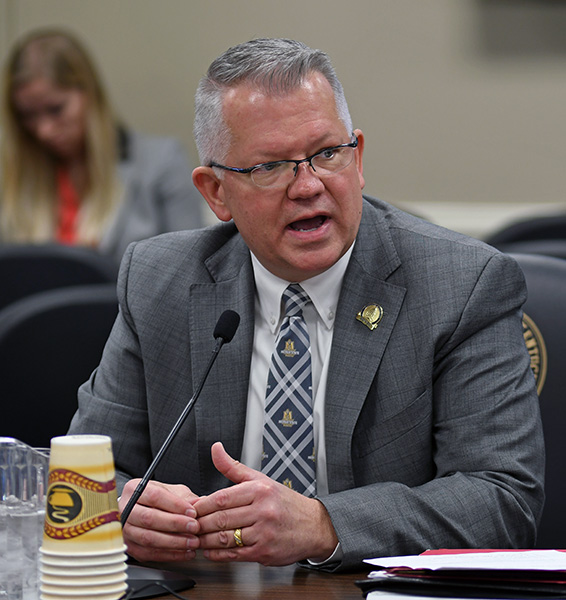
Sen. Danny Carroll, R-Benton, testifies on
Senate Concurrent Resolution 171, which seeks
research on nuclear energy in Kentucky. A
high-res version of the photo can be found
here.
FRANKFORT — A few
years ago, a moratorium on nuclear energy was
lifted in Kentucky.
To further investigate the possibility of it
coming to the commonwealth, Senate Concurrent
Resolution 171 received approval Tuesday from
the Senate Economic Development, Tourism and
Labor Committee with an 8-0 vote.
Sponsored by Sen. Danny Carroll, R-Benton, the
legislation would request the Legislative
Research Commission examine funding sources and
research institutions capable of conducting a
feasibility study of advanced nuclear energy
technology for electric power generation in
Kentucky.
Now is the time for further inquiry to take
place, he said.
“We have always been able to provide low cost
energy due to coal, and unfortunately as we move
away from coal, we’re going to fall behind if we
don’t look towards the future,” Carroll said.
“We’ll be bringing folks in to educate the
legislature during the interim on the next gen
reactors and hopefully get some folks more
comfortable with nuclear energy.”
Carroll said he and others have been in contact
with the Idaho National Laboratory and have been
looking for a funding source for the feasibility
study for nuclear energy in the state.
“You all know years back we lifted the nuclear
moratorium in Kentucky. However, since that time
there really hasn’t been a lot of discussion on
nuclear energy due to the lower cost of natural
gas primarily and electricity in general,” he
said.
Carroll noted that he serves on a National
Conference of State Legislatures working group
that is focused on nuclear energy, and the
technology has advanced a great deal.
The Tennessee Valley Authority is working toward
small modular reactors, with one in Oak Ridge,
Tennessee. Additionally, TerraPower in Wyoming
is preparing to build a sodium reactor. It’s one
of the next generation reactors that is much
safer to use, Carroll said.
Legislators are also now considering solar
energy legislation, but solar power alone would
not be sufficient to meet the state’s needs,
Carroll said.
If the legislation is signed into law, a
committee or subcommittee at LRC would explore
funding sources for a feasibility study and work
to identify a consultant, university or similar
group that could perform the study.
Sen. Wil Schroder, R-Wilder, thanked Carroll for
his diligence regarding possible nuclear power
in the state. With low energy costs and natural
gas, there’s a tendency to be complacent instead
of looking forward and trying to prevent things
before problems arise, he said.
“I think energy really becomes an important
issue for our security of our nation and the
energy independence and just for our consumers
and constituents keeping those costs down,” he
said.
Sen. David Yates, D-Louisville, said that
educating people about nuclear power is
important.
“But as we move to more electrical vehicles and
we have to expand the grid here locally, these
are things that we have to be considering, so I
appreciate your leadership,” he said.
END
March 14,
2022
House bill
would impose harsher punishment for abusing
young children
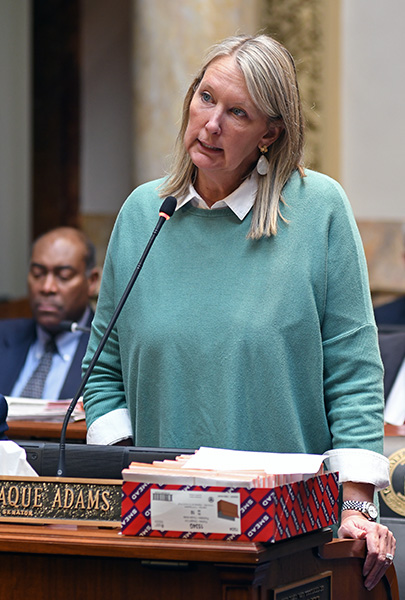
Senate Majority Caucus Chair Julie Raque Adams,
R-Louisville, speaks on House Bill 263, which
would impose harsher penalties for child abuse.
A high-res version of the photo can be found
here.
FRANKFORT —
Legislation that would impose harsher penalties
for those convicted of criminal abuse to young
children received approval Monday from the full
Senate.
Senate Majority Caucus Chair Julie Raque Adams,
R-Louisville, said House Bill 263 is a straight
forward measure that raises the penalty of
first-degree criminal abuse from a Class C
felony to a Class B felony if the victim is
under 12 years of age.
She said the Senate has spent a tremendous
amount of time this legislative session focusing
on child abuse and changing the trajectory of
Kentucky.
“House Bill 263 perfectly segues Senate
intentions to protect the children of Kentucky.
In some cases under current law, the defendant
is released while the victim still has a
lifetime of suffering,” Adams said.
The bill’s primary sponsors are Speaker of the
House David W. Osborne, R-Prospect, and Rep. C.
Ed Massey, R-Hebron. Adams presented the bill on
the Senate floor.
HB 263 is named “Kami’s law,” and during a
Senate Judiciary Committee meeting last week,
seventh grader Kiera Dunk spoke on behalf of the
bill’s namesake.
“Kami was a
beautiful 9-month-old baby when her life was
changed forever because the man responsible for
her safety shook her so violently that she was
clinically dead for 23 minutes,” she said. “Kami
survived, but due to trauma, only half of her
brain remains. Since that day she has been
confined to a wheelchair, nonverbal, requires a
feeding tube, daily seizures and has to take 12
pills a day and may never be able to use the
bathroom on her own.”
Kiera said the person responsible for injuring
her did not serve enough time in jail.
“Last year, Kami had to have her fake skull
replaced, got sick and almost died again, while
the person responsible roams free with no legal
or financial ramification,” she said.
Sen. Robin L. Webb, D-Grayson, voted against the
measure during the floor vote Monday. She said
legislators have continued to take a piecemeal
approach to the penal code.
“In my opinion, we need comprehensive overhaul,
and we need to look at the statutes that
dovetail with each other and as well as the
sentencing, which we’re all over the board on
from year to year and issue to issue whether or
not we’re going to lessen them or strengthen
them,” she said.
The bill received approval from the Senate with
a 31-4 vote. It now heads to the governor’s
desk.
END
March 14,
2022
House approves
legislation cracking down on fentanyl
trafficking
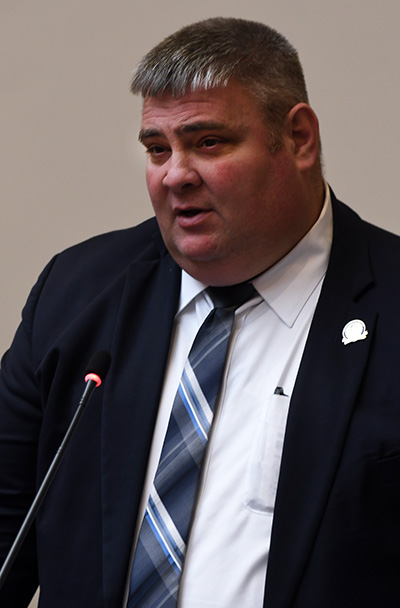
Rep. Chris Fugate, R-Chavies, presents House
Bill 215 on the House floor. A high-res version
of the photo can be found
here.
FRANKFORT— The
Kentucky House of Representatives passed a bill
Monday that many legislators hope will save
lives.
House Bill 215, or Dalton’s Law, would make
importing fentanyl, carfentanil or fentanyl
derivatives from another state or country a
Class C felony. Those convicted of importing
fentanyl would be required to serve at least 85%
of their sentence and would not be eligible for
pretrial diversion under this bill.
HB 215 would also block those guilty of
aggravated trafficking of fentanyl, carfentanil
or fentanyl derivatives from pretrial diversion
and require them to serve at least 85% of their
sentence. Aggravated trafficking is defined in
the bill as someone who traffics 28 grams or
more of fentanyl or 10 grams or more of
carfentanil or fentanyl derivatives.
The bill’s primary sponsor, Rep. Chris Fugate,
R-Chavies, said drug overdose deaths in the
Commonwealth rose 56% last year, and the
majority of those deaths were due to fentanyl.
“This drug is not just destroying lives and
families,” Fugate said. “It’s taking lives and
its killing people all over the state of
Kentucky and really across the United States.”
Fugate and Rep. Steve Riley, R-Glasgow, said the
intention of HB 215 is to target fentanyl
traffickers, not users. By targeting traffickers
who are lacing other drugs like marijuana and
heroin with fentanyl, hopefully lives will be
saved.
Riley shared the story of 22-year-old Dalton
Bishop of Glasgow on the House floor. Bishop,
who suffered from substance use disorder, died
of an overdose in 2020 after he used drugs he
did not realize were laced with fentanyl. HB 215
is named Dalton’s Law in his honor.
“I know the sponsor of this bill has put in here
that there will be rehab for abusers, but there
will be punishment for traffickers,” Riley said.
“Unfortunately, Dalton will not have a chance to
go through rehab.”
Several lawmakers
expressed concerns that the bill will
inadvertently target those with substance use
disorder who sell drugs in order to support
their habit. House Minority Floor Leader Joni L.
Jenkins, D-Shively, said she’s learned from
those recovering from substance use disorder
that investing in treatment is the better
option.
“What I have learned is that increased penalties
and incarceration don’t move the needle,”
Jenkins said. “They’re very expensive for us as
a state, and we are incarcerating people for
many, many years without getting the bang for
our buck. What we know works is treatment.”
Rep. Mary Lou Marzian, D-Louisville, agreed with
Jenkins and said she was voting “no” on HB 215.
Marzian called for the legislature to invest in
good jobs, good schools, universal pre-k and
other things that she believes would help
prevent people from doing drugs in the first
place.
“Locking people up is not the answer,” Marzian
said.
Rep. Jason Petrie, R-Elkton, spoke in support of
HB 215. He said the General Assembly has made “a
great effort” to make treatment a priority over
the last several years, but this bill focuses on
the traffickers.
“These are people that put money above the
welfare of everybody else that they deal with,”
Petrie said. “That is a scourge on the
Commonwealth of Kentucky. I can’t think of much
worse to be honest with you.”
House Minority Whip Angie Hatton, D-Whitesburg,
also spoke in favor of HB 215. She said she
believes the bill narrowly targets drug dealers
and will bring the state a step closer to
getting fentanyl off the streets.
The House approved HB 215 by an 82-12 vote. It
will now go before the Senate for consideration.
“I believe in treatment. I believe in rehab, but
I have no sympathy for people that bring poison
to the streets and hollers of Kentucky,” Fugate
said. “No sympathy— and they need to go to
prison for a long time.”
END
March 11,
2022
This Week at
the State Capitol

A high-res version of this photo is available
here.
FRANKFORT — One of
the most important bills of 2022 – the state’s
biennial budget – was on the move this week, and
lawmakers have 12 days to hammer out a
compromise if they want to pass a spending plan
before breaking for the veto recess.
The latest version of the budget bill advanced
off the Senate floor on Wednesday after clearing
a committee vote earlier in the day. Thanks to
historic levels of revenue, House Bill 1 would
allocate more than $105 billion toward operating
and capital costs in the executive branch over
the next two fiscal years.
The House passed its version of the bill in
January, and while the two chambers share many
goals in areas like education, public safety,
tourism and infrastructure, key differences
remain.
If the House does not concur with the Senate
changes, lawmakers will need to meet in
conference committee to negotiate a final
accord. However, Friday was day 46 of the 60-day
legislative session, and deadlines are drawing
closer.
Both chambers are scheduled to gavel out on
March 30 for the start of the 10-day veto
recess, and lawmakers are looking to pass a
final budget before then. That will give them
plenty of time to override any gubernatorial
vetoes when they reconvene on April 13 and 14
for the final days of the session.
While the budget attracted much of the focus
this week, lawmakers were working into the night
on several other key issues, and dozens of bills
continued to advance. Those include bills
related to abortion, college athletes,
vaccinations, religious objections and firearms,
among others.
Here are some of the measures moving forward
this week:
KSU board: Senate
Bill 265 calls on the governor to replace
members of the Kentucky State University Board
of Regents. The bill cleared the Senate floor on
Tuesday, and appointees will be subject to
Senate confirmation.
Masks in schools:
House Bill 51 would allow parents to opt their
children out of COVID-19 mask and testing
requirements at public schools. It would also
prohibit public colleges and universities from
implementing COVID-19 mask or testing
requirements. The bill advanced off the House
floor on Tuesday.
College athletes:
Senate Bill 6 would provide a framework in state
law for college athletes to generate personal
income off their name, image and likeness, known
as NIL. The bill was signed into law on
Wednesday.
COVID-19: Senate
Joint Resolution 150 would immediately end the
COVID-19 declaration of emergency in Kentucky.
The measure received approval from the Senate
last month and cleared the House floor on
Thursday. It now heads to the governor’s desk.
Workplace immunizations:
Senate Bill 93 would grant religious exceptions
against immunizations if a workplace requires
employees to be immunized against disease. It
would also allow exemptions based on the written
opinion of a health care provider. The bill
cleared the Senate Judiciary Committee on
Thursday.
Immunization status:
House Bill 28 would prevent local governments
and public universities from requiring employees
or students from disclosing their COVID-19
immunization status. It would also prevent
COVID-19 vaccine passports and allow parents of
public school children to opt their children out
of COVID-19 vaccine requirements. It received
approval on the House floor Thursday.
Abortion: With some
exceptions, Senate Bill 321 would prohibit
abortions at 15 weeks of gestation. It would
also redefine the term “pain-capable unborn
child” in state law. The bill cleared the Senate
Judiciary Committee on Thursday.
Child abuse: House
Bill 263, known as Kami’s Law, would make
criminal abuse against a victim under 12 years
of age a Class B felony. HB 263 received
approval Thursday from the Senate Judiciary
Committee.
Incest: Senate Bill
38 classifies incest as a violent offense. It
also ensures that individuals guilty of incest
complete at least 80% of their prison sentence.
The bill was signed into law on Thursday.
Firearms: House
Bill 29 would prohibit public agencies, local
governments and law enforcement agencies from
enforcing a federal firearms ban. The measure
was approved on the House floor Thursday.
Lawmakers are scheduled to return for day 47 on
Monday, and Kentuckians have many ways to keep
in touch with the action.
The Legislative Record webpage allows users to
review and track a bill’s progression through
the chambers.
Citizens can also
share their views on issues with lawmakers by
calling the General Assembly’s toll-free message
line at 1-800-372-7181.
END
March 10,
2022
Senate bill
would establish a behavioral health pilot
program for some offenders
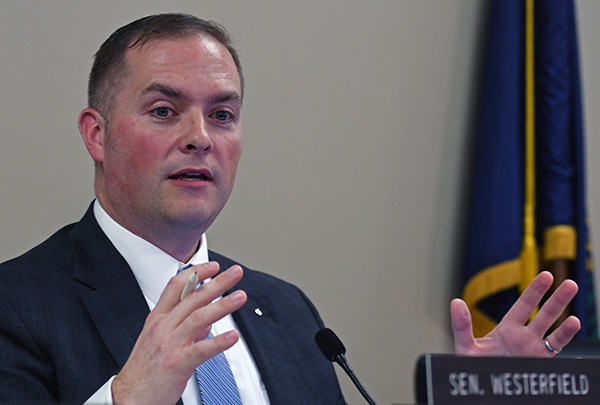
Sen. Whitney Westerfield, R-Crofton, testifies
on Senate Bill 90. The bill would establish a
behavioral health pilot program for some
offenders. A high-res version of the photo can
be found
here.
FRANKFORT— The
Senate Judiciary Committee took steps Thursday
toward establishing a behavioral health pilot
program that would help some low-level offenders
access services, find jobs and avoid
incarceration.
Sen. Whitney Westerfield, R-Crofton, said the
components of Senate Bill 90 have been in the
works for a few years, and such measures have
been considered by many associated with mental
health and justice issues.
“It really focuses on a couple of different
things – getting folks plugged in to behavioral
health care, whether that’s substance use
disorder treatment or behavioral health, …
getting them employed, trained and placed if at
all possible,” he said. “The biggest thing you
can do to prevent people from coming back to
jail is making sure they’ve got a job.”
The bill cleared the committee on a 9-0 vote. It
calls on the Supreme Court to choose at least
ten counties to participate in the pilot
program, which would offer the possibility of
deferred prosecution for offenders.
To qualify, offenders cannot be charged with
anything more than a Class D felony. Those with
violent offenses or sex offenses, among others,
would not be eligible.
SB 90 is a collaboration of people who work in
many disciplines, Westerfield told the
committee. Instead of looking at some problems
facing offenders as a single issue, it could be
done more comprehensively, he said.
“From the far left to the far right, from the
prosecution to the defense to the courts,
everyone agreed that this population of people
could benefit from behavior health
interventions,” Westerfield said. “Not just
substance use disorders, but also psychological
or psychiatric disorders and in many cases,
multiples of both of those things combined in
the same person.”
Westerfield said the bill does not go as far as
is possible, especially regarding
transportation, but housing is included in the
bill. Also, the program would provide vocational
assessments with the goal of placing the
offender in training or even a job.
Sen. Gerald A. Neal, D-Louisville, said he
stands behind the idea of the program, calling
it right headed and rational.
“These same individuals
have to go back at some point, in most instances
to the community,” he said. “And the fact of the
matter is, if you don’t have this intervention,
then pretty much you are recycling potentially
the same thing. That’s where you get the
recidivism and all that.”
END
March 10,
2022
Resolution
ending COVID-19 state of emergency heads for
governor's desk
.jpg)
Rep. Thomas Huff, R-Shepherdsville, presenting
Senate Joint Resolution 150 on the House floor.
A high-res version of the photo can be found
here.
FRANKFORT— Two
years after the first confirmed case of COVID-19
in Kentucky, the COVID-19 state of emergency may
soon be coming to an end.
The Kentucky House of
Representatives adopted Senate Joint Resolution
150 on Thursday by a 75-20 vote. The Kentucky
Senate adopted the measure on Feb. 24 by a 28-8
vote.
If signed into law by Gov. Andy Beshear, the
resolution would immediately end Kentucky’s
COVID-19 state of emergency. If he vetoes the
measure, the Kentucky General Assembly could
still vote to override his decision.
The primary sponsor, Sen. Donald Douglas,
R-Nicholasville, filed the resolution on Feb. 18
with the intention of it taking effect on March
7.
Rep. Thomas Huff, R-Shepherdsville, presented
SJR 150 on the House floor on behalf of Douglas.
Huff said the resolution is “long overdue.”
“The question we really need to ask ourselves
is, are we really in a state of emergency?” Huff
said. “Are the hospitals overflowing? Are the
deaths skyrocketing? Are the numbers climbing?
That is the question we need to ask, not whether
we can squeak by another month on free federal
money.”
SJR 150 would also require the governor to ask
for the General Assembly’s approval before
declaring another COVID-19 emergency.
During debate, a couple of lawmakers expressed
concerns about the impact the resolution might
have on federal funding and the Supplemental
Nutrition Assistance Program known as SNAP.
Rep. Cherlynn Stevenson, D-Lexington, said the
federal COVID-19-related funds are helping
hospitals retain staff and helping keep local
economies afloat.
“We have a shortage of nurses, and a lot of the
federal dollars that have come in are helping
with the fact that we have travel nurses that
claim a lot of dollars per hour to be here,”
Stevenson said. “… The SNAP benefits that are
coming as a result of this emergency, it was
about $52 million a month.
“I do also have to think about the fact that
those dollars have come in to our economy, and
we have many local grocery stores and farmers
that all of a sudden $52 million a month being
gone from a system that allows people to
purchase food from our grocers and our farmers
is really going to be sorely missed.”
Rep. Kimberly Poore Moser, R-Taylor Mill, and
Rep. Norma Kirk-McCormick, R-Inez, said the
research they’ve done on the SNAP program shows
that ending the state of emergency will not take
away benefits from those who truly need it and
qualify for the program, with or without the
state of emergency.
In explaining her no vote, Minority Floor Leader
Joni L. Jenkins, D-Shively, said since many
Kentuckians are still struggling to return to
work due to lack of childcare options.
“If (the state of emergency) would give us
another month or two to get (childcare) back and
going, I think it is worth it to receive those
federal dollars from California and New York to
keep our economy going,” Jenkins said.
Rep. Savannah Maddox, R-Dry Ridge, said she
agrees that ending the COVID-19 state of
emergency is overdue.
“(The economic shutdown) has led to rapid
inflation and all kinds of socio-economic issues
that we are going to be contending with for
years, so I’m glad that we are ending the state
of emergency,” Maddox said. “It’s no secret that
I wish that we would have ended it much sooner.”
SJR 150 will now head to the governor’s desk for
his signature or veto.
END
March 10,
2022
Legislation
addressing nursing shortage advances from House
committee
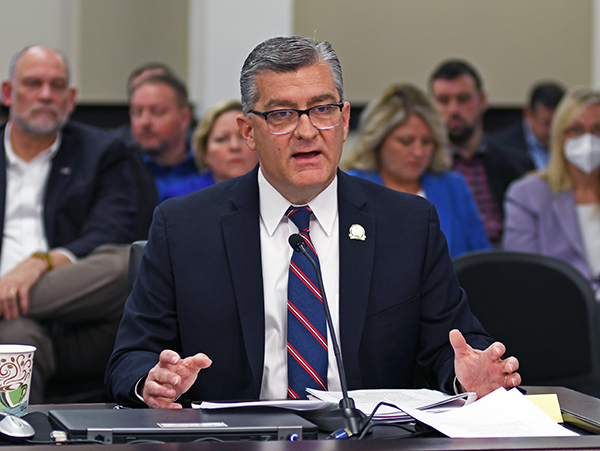
This file photo shows Sen. Robby Mills,
R-Henderson, testifying in a legislative
committee on Feb. 23. A high-res version
of the photo can be found
here.
FRANKFORT— It may
soon be easier for qualified nurses from other
states and countries to practice nursing in
Kentucky.
The House Health and Family Services Committee
unanimously approved Senate Bill 10 on Thursday.
“Senate Bill 10 improves the process for out of
state and foreign trained nurses to practice in
Kentucky without compromising our standard of
care,” said Sen. Robby Mills, R-Henderson, the
bill’s primary sponsor.
The measure would set up a process for the
Kentucky Board of Nursing to issue a temporary
work permit to nurses who are currently a
licensed registered nurse in good standing in
another state or territory where the applicant
has worked.
Mills said he believes SB 10 “addresses
statutory issues that could be holding back
nurse availability in Kentucky.” Mills said the
state could be short 10,000 to 16,000 practicing
nurses in the coming years if things do not
change.
Nurses from other countries who have passed the
National Council Licensure Examination (NCLEX)
and have received a satisfactory credentials
report from the Commission on Graduates of
Foreign Nursing Schools International Inc. may
immediately receive a nursing license under SB
10.
The bill also lifts enrollment limits for
nursing schools that have a three-year average
NCLEX passage rate of 80% or higher.
Another provision makes changes to the Kentucky
Board of Nursing by limiting board members to
three consecutive terms and requiring state
Senate confirmation of appointments. The board
would also be required to have more practicing
nurses and have at least two members from each
Congressional district.
“I believe these are very practical updates to
Kentucky’s nursing oversight process,” Mills
said. “And I believe we will see these changes
produce positive results in the very near future
and help fill this huge nursing gap that we all
know that we have in the Commonwealth.”
Rep. Lisa Willner, D-Louisville, said she loves
“almost everything” in SB 10, but has concerns
about the Senate confirmation requirement.
“As a psychologist, I know none of the mental
health licensing boards have this requirement
and it worries me,” Willner said. “There are
political appointments to these boards, but
having another layer of politics involved in
getting people on these boards really concerns
me, a lot.”
Responding to Willner, Mills said the changes
made to the Kentucky Board of Nursing in SB 10
are to ensure the voices of practicing nurses
are elevated.
“That’s probably one of the reasons we decided
to put the confirmation on there is to assure
that the balance in the board remains working
nurses-focused and (so) it doesn’t get top heavy
again with nurse educators and things of that
nature,” Mills said.
Committee Chair Kimberly Poore Moser, R-Taylor
Mill, thanked Mills for SB 10.
“I just want to personally thank you for, like
you said, very practical legislation in
addressing our immediate crisis with the
healthcare worker and certainly nursing
shortage,” Moser said.
SB 10 will now go before the full House for
consideration. The Kentucky Senate unanimously
approved the legislation on March 1.
END
March 9,
2022
Senate
approves proposed biennial budget
030922b.jpg)
Sen. Christian McDaniel, R-Taylor Mill, presents
House Bill 1, the state’s two-year budget plan,
on the Senate floor. A high-res version of
the photo can be found
here.
FRANKFORT— The
state’s two-year budget plan is another step
closer to passage after the Senate voted
Wednesday to approve the amended bill and send
it back to the House.
The proposed $105 billion proposal includes
funds for state employee raises, school needs, a
training range for police, more lung cancer
screening, major renovations to the state
Capitol, improvements to state parks and many
other efforts.
This is the first time since 2018 that the
Kentucky General Assembly is working to pass a
biennium budget. Economic uncertainty due to the
COVID-19 pandemic led the legislature to pass
two single-year budgets in 2020 and 2021.
Sen. Christian McDaniel, R-Taylor Mill,
presented the bill on the Senate floor after it
cleared the Senate Appropriations and Revenue
Committee earlier in the day. He said when he
joined the legislature in 2013, the state was
facing a major financial crisis.
“Pensions had not been fully funded in over a
decade, and the state was borrowing money like a
drunken sailor at a Friday night poker game,” he
said.
McDaniel later compared that to this year’s
budget proposal, which includes more than $1.7
billion in the budget reserve trust fund and
more than $1.2 billion in unspent money. He said
that under the watchful eye of the Senate, the
state has finally turned a financial corner.
“We’ve gone from zero savings, a pension system
in the midst of crisis and regular cuts to
nearly every facet of government, to a place
where now we regularly invest in pediatric
cancer, research at our systems of higher
education, employee raises, infrastructure and
many other items at record levels,” he said.
The budget measure cleared the Senate with 30-6
vote and now heads back to the House. If
lawmakers in the House do not concur with the
Senate’s changes, the two chambers would next
appoint a conference committee to iron out
differences.
McDaniel said the budget prioritizes helping
people deal with inflation. It includes money
for one-time tax rebates for Kentuckians and the
first raises for most state employees in 15
years.
The raises amount to about $4,500 per employee
in the first year with additional raises in the
second year based on recommendations from the
state personnel cabinet.
“We have lost and continue to lose some of the
best and brightest talent in the commonwealth,”
McDaniel said. “Therefore, the No. 1 priority in
this budget is improving the work environment
for the commonwealth’s state employees.”
For the Kentucky State Police, the plan includes
$15,000 per year set aside for each trooper
pending a pay scale bill, which is currently in
committee, McDaniel said.
He also pointed to school funding in the
proposal. Over the past two years, the Kentucky
Department of Education and the schools have
received about $1.9 billion in American Rescue
Plan Act money and Coronavirus Aid, Relief, and
Economic Security Act money, McDaniel said.
“But we felt it was still important to push
additional funds through the SEEK formula. So in
year one, we increased it to $4,100 and in year
two, we increased it to $4,200,” he said.
McDaniel listed several other items in the
proposed budget, including:
-- A $4,800 raise for social workers in the
first year and an additional 10% raise in year
two
-- A roughly 30% raise for state medical
examiners along with 22 new positions in the
office
-- Base funding
for public universities and $97 million each
year for the performance-based funding model for
higher education
-- A $4 per day per diem increase for local
jails
-- Full funding for a firing range at the
Department of Criminal Justice Training. The
budget would also set the stage for a new
training academy in Madisonville with
appropriations in the second year.
-- An increase in
law enforcement training stipends to $4,300 per
year
-- An allocation of $500,000 to audit the
state’s workforce initiatives
-- $5 million for child advocacy centers, $3.5
million for domestic violence centers, $1.5
million for rape crisis centers, and $1 million
for substance abuse program review
-- $215 million in one-time funding to shore up
the Kentucky State Police Retirement System
-- $250 million in year two for upgrades to the
state parks system
-- $250 million in year two to renovate the
state Capitol, which faces challenges with
leaking, peeling paint, an old HVAC system and
other problems
-- $200 million for renovation of the state
fairgrounds
-- $25 million for county clerks for an online
deed system and voting machines
-- A $75 million grant pool for nonprofits
-- A $200 million transportation project fund as
requested by the governor
-- 200 new guard positions for the
commonwealth’s prisons
Senate Minority Floor Leader Morgan McGarvey,
D-Louisville, said he appreciated the time and
effort that went into the proposed budget.
However, he said much work remains to be done.
“This is not the final budget we are working on
– it’s the first step,” he said. “But as we talk
about process, I do want to talk about some of
what happened with this budget. The reality is
that we were not given a printed copy of the
budget until this morning during committee at 9
a.m. Here we are on the floor this afternoon
voting the document out the same day.”
McGarvey said
lawmakers in his caucus see things they like,
but also have a number of questions and
concerns. He said funding for the state’s SEEK
formula appears to be reduced and money for
full-day kindergarten was removed from the House
plan.
“We hope to continue to have input because for
all of Kentucky, for all of the people
represented, for all of the areas represented in
this commonwealth, it’s important that their
input is heard in this budget, and we hope that
it will be as it continues to go forward in a
more transparent process,” he said.
END
March 9,
2022
House
committee considers alternative teacher
certification bill
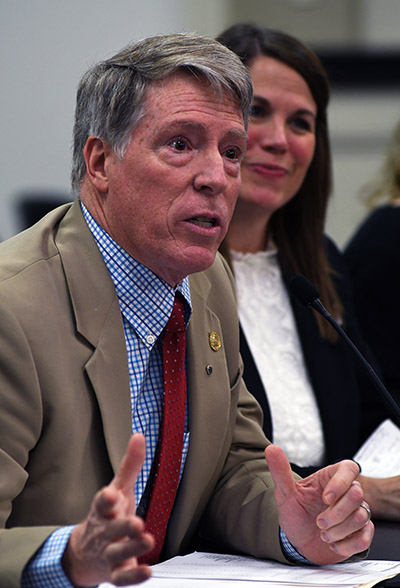
Rep. Walker Thomas, R-Hopkinsville, testifies on
House Bill 277 in the House Education Committee
on Wednesday. A high-res version of the
photo can be found
here.
FRANKFORT— Aspiring
teachers in Kentucky would have a new option to
gain certification through a residency program
under House Bill 277.
The House Education Committee unanimously
approved HB 277 on Wednesday. The bill’s primary
sponsor, Rep. Walker Thomas, R-Hopkinsville,
said the goal of the bill is to recruit and
retain more teachers in Kentucky through a “grow
your own” approach.
“We all know that we have a shortage,” Thomas
said. “There are quite a few districts that are
operating on emergency certifications right
now.”
Thomas was joined by Beverly Fort, the teacher
recruiter for Christian County Public Schools,
in testifying in favor of HB 277. Fort said she
believes the legislation will help address the
teacher shortage.
“Creating a ‘grow your own’ teacher residency
program will allow a teacher pipeline to produce
new teachers,” Fort said. “This new option is
still going to be rigorous. It is still going to
require passing of the Praxis, a partnership
with an accredited university, all while these
candidates are working alongside a master
teacher to gain valuable and extensive training
and opportunities to teach.”
The proposed residency program would take three
years to complete and result in the participant
receiving a bachelor’s degree and initial
certification.
The current version of HB 277 only allows
certain districts to participate in the program.
The first requirement is that 65% of the
district’s population must qualify for free or
reduced-price lunch. The second requirement is
that only 5% of a district’s teachers can hold
an emergency certification or provisional
certification.
Rep. Tina Bojanowski, D-Louisville, and Rep.
Melinda Gibbons Prunty, R-Belton, asked Thomas
if changes could be made to open up the
residency program to more counties. Thomas said
he would be willing to work on a floor amendment
to address those concerns.
Rep. Charles Miller, D-Louisville, a retired
high school principal, said Kentucky needs this
bill.
“I think where you really learn about teaching
is once you get there and start doing,” Miller
said.
In explaining his “yes” vote, retired teacher
and Committee Vice-Chair Steve Riley, R-Glasgow,
said the teacher shortage crisis in Kentucky is
“unimaginable.” He suggested a taskforce or
working group to look at the issue.
“We’ve got to come up with whatever means
necessary to get more good, quality people in
our profession, and we’ve got to look at a lot
of different options to do that,” Riley said.
HB 277 will now go before the full House for
consideration.
END
March 8,
2022
House approves
bill to make masks optional in public schools

Rep. Lynn Bechler, R-Marion, presents House Bill
51 on the House floor on Tuesday. A
high-res version of the photo can be found
here.
FRANKFORT— Parents
may soon be making the decision on whether or
not their child wears a mask at school.
House Bill 51 would allow parents of students in
public K-12 schools to opt out of any
COVID-19-related facial covering guidance issued
by local school boards. An amended version of
the measure advanced off the House floor on
Tuesday by a 56-35 vote.
The bill’s primary sponsor, Rep. Lynn Bechler,
R-Marion, said HB 51 does not seek to ban masks
in school completely.
“This legislation doesn’t outlaw mask wearing;
it simply makes mask wearing optional from
preschool through college,” Bechler said.
The bill would allow parents to opt their child
out of submitting to any type of medical
procedure related to COVID-19, including testing
or vaccination, and wearing any type of medical
device in response to COVID-19. Parents would
not be required to submit any certification or
documentation to secure an exemption.
Another provision of the bill would prohibit
public colleges and universities from requiring
facial coverings or medical devices in response
to COVID-19. COVID-19 testing and vaccine
requirements would also be prohibited. The bill
would make exceptions for those on campuses
providing medical or dental services or
conducting clinical research.
Bill co-sponsor Rep. Josh Calloway, R-Irvington,
worked with Bechler on amending the final House
version of HB 51.
“Amendment 11 basically says this: That no one
can put a medical device on my child or no one
can do a medical procedure on my child without
me, as the parent, authorizing it,” Calloway
said. The amendment was adopted.
During discussion of the bill, several lawmakers
expressed concerns about HB 51 impeding on local
control.
House Minority Whip Angie Hatton, D-Whitesburg,
said she voted in favor of legislation from the
2021 Special Session that ended the statewide
mask mandate and gave that power to the local
school boards because it was what was best for
her district. Hatton said her beliefs have not
changed.
“I’m not second guessing my locally elected
school boards on this decision,” Hatton said.
“It’s inconsistent and not something that I
could stand here and live with having voted
‘yes’ in September to give this decision making
to the local school boards…”
Rep. Jim DuPlessis, R-Elizabethtown, said he
also has local control concerns when it comes to
HB 51.
DuPlessis said the legislation is something he
could vote either way on, but he has concerns
that schools would be forced to shut down if
there is another COVID-19 outbreak.
“If we choose to take away a local school
board’s ability to mandate an N-95 mask, which
we admit works, they could shut the school down
for a couple of weeks, or three weeks or four
weeks,” DuPlessis said. “… We’re going to do
something that could cause an unforeseen
circumstance down the road if another variant
comes up.”
Rep. Jason Nemes, R-Louisville, said he believes
HB 51 actually ensures local control.
“What we’re doing here today is removing
governmental control over that decision and
putting it again to the most local level, which
is parents,” Nemes said.
Some House members pointed out that most schools
across the Commonwealth have recently lifted
their mask mandates due to declining COVID-19
case numbers. Bechler said, “I believe most
parents would make the intelligent decision for
the health of their children,” if the
Commonwealth faces another spike in cases.
In explaining her “yes” vote on HB 51, Rep.
Felicia Rabourn, R-Turners Station, said she
hopes the parents, teachers and students in her
district who support the bill feel heard.
“It sends a message that I hear them loud and
clear, and I support the parents’ decision to
make the best decision for their child based on
their individual needs,” Rabourn said.
HB 51 will now go before the Senate for
consideration.
END
March 7,
2022
Senate bill
seeks replacement of KSU board members
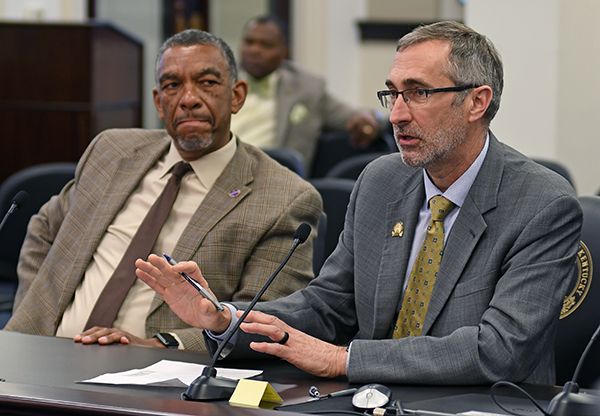
Senate President Pro Tem David P. Givens,
R-Greensburg, testifies on Senate Bill 265 as
Aaron Thompson, President of the Kentucky
Council on Postsecondary Education looks on.
A high-res version of the photo can be found
here.
FRANKFORT—
Legislation that calls on Gov. Andy Beshear to
replace the members of the Kentucky State
University Board of Regents received approval
Monday from the Senate Education Committee.
Committee members voted 13-0 for Senate Bill
265, which declares that the current board of
regents is no longer functioning according to
its statutory mandate. It would require the
governor to name eight nominees for the board by
April 1.
All appointees are subject to confirmation by
the Senate, and lawmakers are seeking to
complete the confirmation process before the
legislature adjourns for the year on April 14.
The bill’s primary sponsor, Senate President Pro
Tem David P. Givens, R-Greensburg, said he is
willing to do whatever he can to support KSU,
but that failure to make improvements after a
period of time would result in closure.
“Failure to move by this General Assembly on
this matter constitutes closure of KSU,” Givens
said “So we have a choice to either move – and
move this institution forward – or do nothing
and this institution closes. And I’m not going
to be willing for us to do nothing.”
He explained that significant change is needed
at the university, including cultural change,
financial investment and reorganization of the
institution. With a combination of those
efforts, he predicted that KSU would shine.
“I think it will be the beacon on the hill that
it can be for all of us in that postsecondary
landscape,” he said. “My prognostication, if I’m
looking forward, is we are going to be bragging
and talking about KSU in three to four years.”
Founded in 1886, KSU serves as the only public,
historically Black university in Kentucky.
However, it has faced severe financial
challenges, and in July, Beshear directed the
Kentucky Council on Postsecondary Education
(CPE) to complete a financial review.
If passed into law, SB 265 would call on the
Postsecondary Education Nominating Committee to
submit 16 nominations to the governor by March
26. Of those, the governor would then select
eight names to forward to the Senate for
confirmation. Current board members may be
considered.
Monday’s committee hearing spurred nearly an
hour of discussion about KSU’s role and the
decisions that contributed to its financial
condition.
Sen. Gerald A. Neal, D-Louisville, argued that
the university has produced many successful
graduates and distinguished programs over the
years despite deficient funding from the state.
“I want you to understand, great people have
been the result of the investment of those who
are committed to this institution. Great
people,” he said. “I know the history of this
institution. I know the failures of the General
Assembly.”
Neal added that "year after year, decade after
decade, since slavery and its institutional
beginning, this General Assembly institutionally
has not stepped up to the plate. And I can give
you rhyme and verse.”
Senate Minority Caucus Chair Reginald Thomas,
D-Lexington, was also critical of past funding
for KSU, but said closure is not an option.
“Kentucky State University must succeed,” he
said. “It must succeed, and I think given the
right amount of resources and the dedication of
this legislature, it can do that. It can
thrive.”
Another bill related to KSU, House Bill 250,
would provide $23 million to KSU to help the
university meet its financial obligations for
this fiscal year. The measure would also direct
the CPE to create and oversee a management
improvement plan and a loan repayment plan for
KSU.
Givens said he expects lawmakers to take that
bill up in the next 10 days. However, he
explained that realigning the board is necessary
to give lawmakers confidence that the
appropriation makes sense, and he predicted some
hard work ahead in fostering institutional
change.
“(SB 265) is the first step, it’s not the last
step,” he said. “We’ll be back to revisit this
institution again with further legislation this
session, and I look forward to working with you
so we can all get it right.”
END
March 7,
2022
General
Assembly sends name, image, likeness bill to
governor's desk
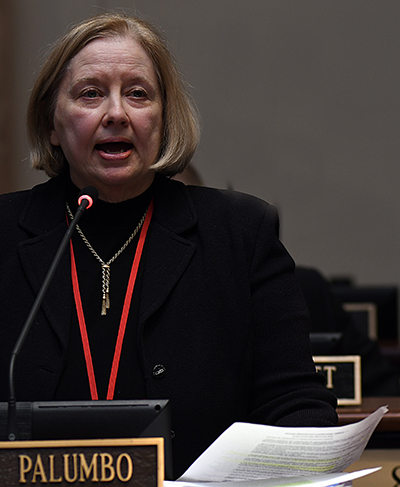
Rep. Ruth Ann Palumbo, D-Lexington, presents
Senate Bill 6 on the House floor. A high-res
version of the photo can be found
here.
FRANKFORT— A bill
that would permanently allow Kentucky’s
collegiate athletes to profit off their name,
image and likeness (NIL) is one step closer to
becoming law.
The Kentucky House of Representatives approved
Senate Bill 6 by an 89-2 vote on Monday. The
Senate unanimously approved the bipartisan
measure on Feb. 10.
SB 6 codifies NIL agreement rights and provides
a framework for students and colleges and
universities.
Rep. Ruth Ann Palumbo, D-Lexington, presented SB
6 on the House floor Monday on behalf of the
bill’s primary cosponsors, Sen. Max Wise,
R-Campbellsville, and Senate Minority Floor
Leader Morgan McGarvey, D-Louisville.
Palumbo said the bill is necessary because
neither Congress nor the NCAA have taken action
on NIL since last summer’s U.S. Supreme Court
ruling on the issue.
Following the ruling, Gov. Andy Beshear signed
an executive order in July to allow NIL
agreements for Kentucky’s student athletes.
Since then, lawmakers have met with
universities, coaches, athletes and other
stakeholders for their input on SB 6.
“(Senate Bill 6) provides protections for
student athletes seeking compensation through
name, image and likeness agreements,” Palumbo
said. “It provides similar protections for
institutions. It establishes a process for
institutions to review name, image and likeness
agreements for student athletes.”
The bill would also require institutions to
provide financial literacy, life skills, social
media and brand management education to
students.
Another provision of SB 6 prohibits students
from entering NIL agreements related to sports
betting, controlled substances, adult
entertainment, banned substances or products or
services that would be illegal for the student
athlete to possess or receive, Palumbo said.
“As Coach Calipari says, ‘Senate Bill 6 is a
model piece of legislation,’” Palumbo said.
During the March 1 House Education Committee
meeting, one former University of Louisville
athlete shared her story of having to donate the
$3,000 she made modeling to charity after the
NCAA decided the job violated the organization’s
NIL policy, despite the job not mentioning her
name, school or the sport she played.
The NCAA also ruled the athlete ineligible to
compete for a semester and required her to
complete many hours of community service.
Palumbo shared this student’s story on the House
floor.
“Ladies and gentlemen, I ask you was this fair?
No, it was not,” Palumbo said.
Rep. Adam Bowling, R-Middlesboro, said SB 6 is a
“good bill” and he is proud to support the
legislation.
“Senate Bill 6 protects both student athletes
and our universities and sets our student
athletes up for success,” Bowling added.
SB 6 will now be sent to the governor’s desk for
his signature or veto. Due to an emergency
clause in the bill, it would immediately become
law upon his signature.
END
March 4,
2022
This Week at
the State Capitol

A photo from the state Capitol this week is
available
here. It shows a stack of newly filed bills
in the House.
FRANKFORT— The
House has a new member, bills on taxes and
unemployment are advancing and the Kentucky
General Assembly hit some major milestones this
week as deadlines expired to file new
legislation.
Friday marked day 41 of this year’s 60-day
session, and it capped off an active week that
involved an oath on the House floor and a new
addition to the ranks.
Rep. Keturah Herron, a Democrat from Louisville,
was sworn in on Monday after winning a special
election last month to represent District 42.
The seat was left vacant after longtime Rep.
Reginald Meeks retired in December.
The ninth week of the session also brought a
more complete view of the issues that lawmakers
plan to tackle in 2022. That’s because Tuesday
was the last day for new bills in the House and
Thursday was the last day in the Senate.
Overall, legislators have filed 898 bills and
resolutions in the House this year and 555 in
the Senate. Lawmakers can still change bills as
they move through committees and onto the
chamber floors. However, 11 have already become
law, and a few more are getting close.
That includes House Bill 6, which cleared the
Senate on Wednesday and now heads to the
governor’s desk. It seeks to provide relief on
vehicle taxes in the face of soaring valuations.
The widely supported measure calls on property
value administrators to use the average trade-in
value for vehicles when assessing taxes rather
than the higher – or “clean” – trade-in value.
It would also freeze valuations at the levels
from January 2021 for assessing taxes on
vehicles in 2022 and 2023.
Another measure that has now passed both
chambers is House Bill 4, a much-debated bill
that would change the length of unemployment
benefits and job search requirements for
recipients.
The legislation, which passed off the Senate
floor on Thursday, effectively changes the
maximum duration of benefits from a flat 26
weeks to between 12 and 29 weeks based on
economic conditions and a claimant’s personal
decision to seek job training.
It would also require claimants to engage in at
least five work search activities each week in
order to remain eligible.
The bill has spurred heavy debate in both
chambers. Supporters say it’s needed to combat
workforce shortages and help small business
remain open. But critics argue that the measure
will strip working Kentuckians of crucial
support during times of economic hardship.
If the House concurs with changes to the bill in
the Senate, HB 4 will next head to the governor.
Lawmakers continued to advance dozens of other
measures this week, including legislation
related to:
Tax rebates:
Senate Bill 194 would give a one-time tax rebate
of up to $500 to single taxpayers and up to
$1,000 to joint filers, not to exceed the amount
of taxes they paid last year. It was approved by
the full Senate on Monday.
Juneteenth:
House Bill 133 would add Juneteenth to the list
of federal holidays recognized by the state. It
commemorates the emancipation of the last group
of enslaved Black Americans and won approval on
the House floor Monday.
Constables:
House Bill 239 would require newly elected
constables to undergo the same training as
police officers and sheriff’s deputies before
performing certain duties. The House advanced
the measure on Monday.
Charitable bail:
House Bill 313 would prevent charitable bail
organizations from posting more than $5,000 in
bail for anyone charged with a crime. It would
also limit the types of offenders who can
receive bail support from such organizations. HB
313 cleared the House floor on Tuesday.
Nurse shortages:
Senate Bill 10 seeks to boost the number of
critically needed nurses in Kentucky by
improving the process for out-of-state nurses to
practice here. It also seeks to improve student
access to nursing programs. The measure received
approval Tuesday on the Senate floor.
Animal shelters:
Senate Bill 125 would require animal hoarders to
pay shelters for the care of any seized animals,
helping to eliminate sudden and extreme costs to
shelters. It received approval Tuesday from the
Senate Agriculture Committee.
Gubernatorial
pardons: Senate Bill 149
proposes changes to two sections of the state
constitution, which would prohibit the
governor’s ability to grant pardons or reduce
sentences around election time. The legislation
received approval on the Senate floor Thursday.
Abortion:
House Bill 3 requires physicians to seek
permission from a minor’s parent or legal
guardian before a chemical or surgical abortion.
The bill would also ban the online sale of
chemical abortion drugs and require more
recordkeeping. It passed on the House floor
Thursday.
Election security:
Senate Bill 216 seeks to strengthen the security
of elections in Kentucky through about a half
dozen changes to state law. That includes
backing up voting machines with ballots and
preventing them from being connected to the
internet. The Senate State and Local Government
Committee approved the bill on Thursday.
Tax reform:
House Bill 8 seeks to expand the state tax base
and incrementally lower the state’s 5% income
tax over a number of years until it is
eliminated. Most of the reductions can only take
effect if the state meets revenue targets from
expanding the base. It passed off the House
floor on Friday.
The General Assembly will gavel back in on
Monday for the 42nd day of the session.
Kentuckians have many ways to keep in touch with
the legislative process, including the
Legislative Record webpage, which allows users
to review and track a bill’s progression through
the chambers.
Citizens can also share their views on issues
with lawmakers by calling the General Assembly’s
toll-free message line at 1-800-372-7181.
END
March 4,
2022
House approves
bill on income tax rate reform
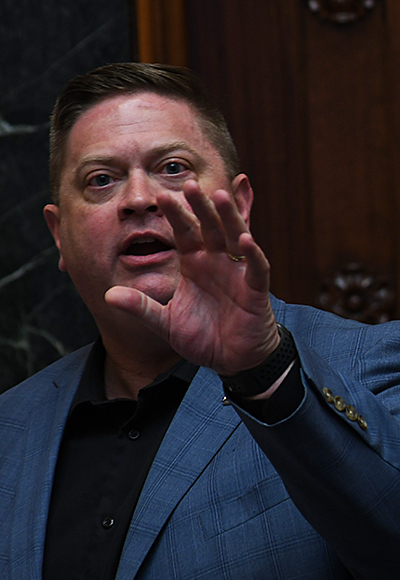
Rep. Jason Petrie, R-Elkton, presents House Bill
8 on the House floor. A high resolution
photo is available
here.
FRANKFORT— A plan
to make key changes to Kentucky’s tax structure
advanced off the House floor on Friday.
House Bill 8 would reduce the personal income
tax rate from 5% to 4% beginning in 2023. And as
long as the state meets certain revenue
thresholds, the income tax rate would continue
to decrease by .5% or 1% each year until the
personal income tax rate hits zero.
After debating HB 8 for nearly three hours, the
measure cleared the House by a 67-23 vote.
The bill’s primary sponsor, Rep. Jason Petrie,
R-Elkton, said the journey to tax modernization
has been years in the making. One of the first
steps taken by the General Assembly came in the
reduction of the personal income tax rate from
6% to 5% in 2018.
“Tax modernization— those changes, those revenue
measures that we are considering— in large part
are for economic growth—writ large— for the
entire Commonwealth,” Petrie said. “You look at
that stagnation over time, and there’s a deeper
seated issue: Our population.”
Data shows Kentucky has struggled to have
significant economic and population growth and
has fallen behind many other states. Tax
modernization is one of the key steps Kentucky
needs to see growth in those areas, Petrie said.
The plan to eventually eliminate the state
income tax will take years. At the end of each
fiscal year, Petrie said the Department of
Revenue will look at whether actual state
revenues, not an estimated amount, meet one of
the “trigger” requirements to lower the state
income tax rate by either a half or full
percent.
Under HB 8, in order for the income tax rate to
decrease by a half percent, the general fund
must see a $1 billion increase in revenue.
For example, if the state general fund hits
$14.5 billion at the end of the 2023 fiscal
year, the income tax rate would be lowered to
3.5% on Jan. 1, 2024. If revenues reach $15.5
billion, the income tax rate would instead be
lowered to 3%, but no more than that.
“It cannot be more than 1% in a given cycle,”
Petrie said. “We don’t wanna get too far out
over our skis… no more than one point at a time
so we can all adjust over time, including our
budgets and everybody else.”
The way the bill is written means that once the
income tax rate goes down, it cannot be
triggered to go back up, Petrie added.
In order to reduce the income tax rate, the
state plans to expand the sales tax base.
Another provision of HB 8 imposes a 6% use tax
on nonessential services such as, nonessential
cosmetic surgery, body modifications,
photography, research polling, bodyguard
services, marketing and more. Another section of
the bill imposes a tax on ridesharing services,
such as Uber and Lyft, and electric vehicles.
Electric vehicle owners would have to pay three
cents per kilowatt hour excise tax at vehicle
charging stations. The tax would go into effect
on Jan. 1, 2023, if HB 8 becomes law.
In debating HB 8, many House members expressed
concerns on how the bill might impact low income
workers and families and small business owners.
“I don’t think the math adds up, and I also
think that this is regressive,” Rep. Rachel
Roberts, D-Newport, said. “I think it hurts poor
people in our state. I think it favors wealthy
people in our state. And I think it will be yet
another nail in the coffin of our hopes to
expand small business here.”
Rep. Al Gentry, D-Louisville, agreed with
Roberts. In addition to worrying about lower
income workers, Gentry spoke on other states
that do not have an income tax, like Tennessee
and Nevada, who make up for it by having a
robust tourism industry.
“These are high tourist states where the
tourism— the people who are coming in from out
of state—pay a pretty good chunk of the sales
tax,” Gentry said. “That’s why it makes sense
there.”
While explaining his “yes” vote, Rep. Shane
Baker, R-Somerset, said that Kentucky does have
the tourism industry that other states have.
“Yellowstone (National Park) brings in about
$650 million a year. The Kentucky Oaks and the
Kentucky Derby (bring in) $350 million in two
days. In 2015, the Kentucky State Parks had the
economic impact of $890 million,” Baker said,
adding there are many things Kentucky has to
offer, and there are many reasons why he’s proud
to vote in favor of HB 8.
Rep. James Tipton, R-Taylorsville, also spoke
and voted in favor of HB 8. He said he believes
the legislation will play an essential role in
improving Kentucky for everyone.
“Is House Bill 8 the only thing that’s going to
make that happen? No, it takes a comprehensive
plan. But it is a foundational component on what
we need to do to move Kentucky forward for our
families,” Tipton said.
HB 8 now goes before the Senate for its
consideration.
END
March 3,
2022
House bill on
unemployment insurance clears the Senate
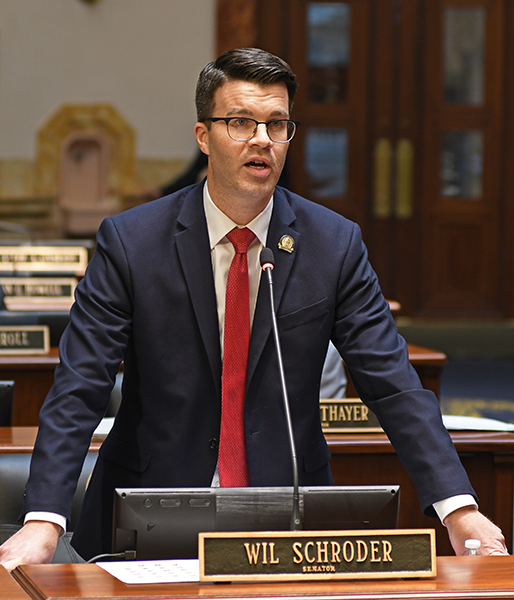
Sen. Wil Schroder, R-Wilder, testifies on House
Bill 4, which would change the length of
unemployment insurance benefits and job search
requirements for recipients. A high resolution
photo can be found
here.
FRANKFORT—
Legislation that would change the length of
unemployment insurance benefits and job search
requirements for recipients received approval
from the Senate on Thursday.
House Bill 4 effectively changes the maximum
duration of benefits from a flat 26 weeks to
between 12 and 29 weeks based on economic
conditions and a claimant’s personal decision on
whether or not to seek job training. It would
take effect at the beginning of next year.
“House Bill 4 significantly strengthens
Kentucky’s work search standards, which will
help guide unemployed workers to find
reemployment more quickly by equipping them with
appropriate standards and practices for finding
a new job,” said Sen. Wil Schroder, R-Wilder.
Schroder presented the legislation on the Senate
floor, where it passed with a 22-13 vote. Rep.
Russell Webber, R-Shepherdsville, is the primary
sponsor of the measure.
Known as the Unemployment Insurance
Sustainability Act of 2022, HB 4 seeks to make a
number of changes to Kentucky’s unemployment
program. Lawmakers had filed three floor
amendments to the bill, but all were withdrawn
on Thursday before an hour of ardent debate on
the measure.
Supporters said the bill is needed to help
businesses stay open and address critical
workforce shortages across the state. However,
critics argued the legislation would harm
working families who are already facing
financial hardship.
Schroder said federal law requires benefit
claimants to be available for work and actively
search for work as conditions of receiving
benefits.
“States have flexibility to set standards for
what it means to search for work,” he said.
“Kentucky has historically set minimal search
standards, only requiring claimants to list one
job contact per week.”
Under the bill, claimants would need to engage
in a minimum of five verifiable work search
activities each week in order to remain eligible
for benefits. At least three of the work search
activities must consist of submitting an
application or interviewing for a job.
Additional activities can include search support
such as job shadowing or attending networking
events.
Between 2009 and 2019, Kentucky claimants spent
an average of 19 weeks receiving benefits – the
longest benefit duration in the nation. As of
June 2021 only 53.8% of Kentucky’s adults were
actively employed – the fifth lowest employment
population ratio in the entire country, he said.
Schroder added that HB 4 supports laid-off
workers who choose to upskill by offering them
five weeks of unemployment benefits if they
enroll in qualified job training or
certification program.
Senate Minority Caucus Chair Reginald Thomas,
D-Lexington, said he does not support the bill
and could not stand behind the decreased length
of benefits.
“It slashes unemployment benefits,” he said. “It
basically guts the unemployment security system
and says to workers: “No, if you’re out of work
through no fault of your own, we’re just going
to forget about you.”
Some of the biggest critics were from Eastern
Kentucky.
Sen. Robin L. Webb, D-Grayson, said that, as a
former coal miner, she recalled times when
good-paying jobs were plentiful in the area.
“It’s an insult, it’s a slap in the face to
people who risk their lives to keep energy
going,” she said. “You closed the coal-fired
plant. We’ve done away with a lot of the jobs,
moved them all to the Golden Triangle and other
populated places. There’s no equity in that, and
there’s no equity in this.”
Sen. Phillip Wheeler, D-Pikeville, also said he
could not support the measure after seeing
economic devastation in Eastern Kentucky for the
past two decades. He spoke through tears as he
lauded those who worked in coal mines, many of
whom want to keep working.
“For nearly three decades, coal severance monies
poured out of the mountains to our general fund,
building roads, schools and improvements
throughout our commonwealth,” he said. “We
Eastern Kentuckians have always been willing to
stand up and do our part, and we remain ready to
do so today.”
Senate President Pro Tem David P. Givens,
R-Greensburg, said he empathizes with his
colleagues and the challenges some people face
in their districts. But he also cited concerns
for small businesses that contribute to the
unemployment insurance fund.
“It’s there to be used as a safety net in time
of challenge and transition,” he said.
It’s there in ways to make employees be able to
sustain a livelihood in times that otherwise it
would be hard. But it’s not a safety net for
these small businesses. When they fail or close,
there’s no UI fund for them to knock the door on
and draw money from. When the business fails, it
fails.”
The bill now heads back to the House for
concurrence.
END
March 3,
2022
Legislation on
election security clears Senate Committee
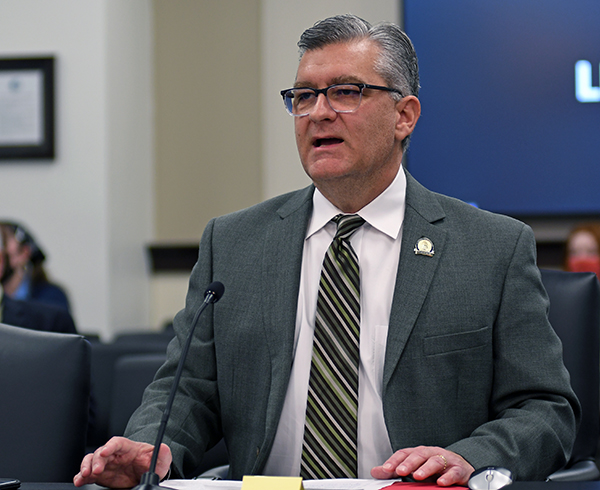
Sen. Robby Mills, R-Henderson, testifies on
Senate Bill 216, which seeks to strengthen
election security. A high resolution photo
is available
here.
FRANKFORT—The
Senate State and Local Government Committee
approved legislation Thursday that aims to
strengthen the security of elections in Kentucky
through about a half dozen changes to state law.
Among several provisions, Senate Bill 216 would
require all voting machines to be backed up by
paper ballots by 2024 and prevent the use of
credit and debit cards as an alternate form of
ID to vote. It would also prohibit voting
equipment from connecting to any external device
or network, including the internet.
The bill’s primary sponsor, Sen. Robby Mills,
R-Henderson, said the network provision has
appeared in several election bills over the past
few years.
“It’s never made it across the finish line,” he
said. “I think it’s very important as far as
confidence goes, and there’s a lot of, still a
lot of, people out there that are concerned
about that particular issue.”
On the ID provision, he said that, according to
the secretary of state’s office, credit or debit
cards were used as a form of ID 167 times out of
nearly 3 million voters in 2020.
“So, a very small use, alternate form of ID that
I think needs to be removed from our ID list,”
Mills said.
Another provision would require voting equipment
and ballot boxes to remain secured, locked and
under video surveillance for 30 days after an
election.
SB 216 would also place the secretary of state
as chair of the state board of elections and
change a filing requirement for candidates to
one annual report for years when they’re not on
the ballot.
Senate Majority Floor Leader Damon Thayer,
R-Georgetown, said that for about the past three
decades, office holders filed an annual report
in years without elections. However, the
Kentucky Registry of Election Finance changed
the requirement to quarterly reports in the past
year, he said.
“This amendment takes it back to the way it’s
been for 25 or 30 years and will quite clearly
state the legislative intent,” Thayer said. “The
normal reporting process will be in place during
years in which a candidate is on the ballot and
up for reelection.”
The bill was approved with a 7-1 vote. It will
next go to the full Senate for consideration.
END
March 2,
2022
Senate
approves House bill on vehicle tax relief
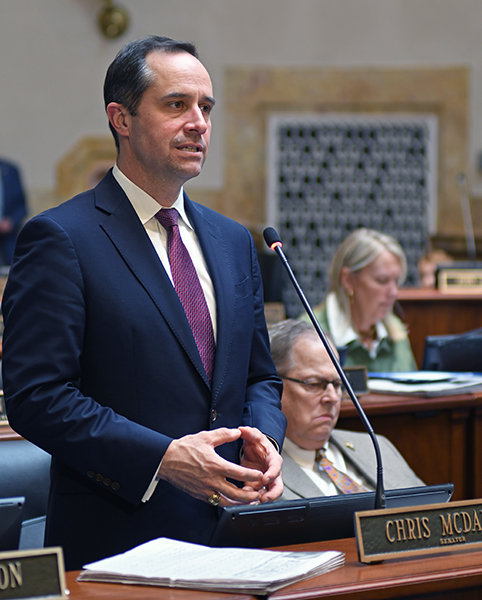
Sen. Christian McDaniel, R-Taylor Mill,
testifies on House Bill 6, which would provide
tax relief on vehicles. A high resolution photo
is available
here.
FRANKFORT—
Legislation that would freeze property taxes on
vehicles for the next two years is close to
becoming law after it passed off the Senate
floor Wednesday with unanimous approval.
House Bill 6 calls for officials to use
valuations from January 2021 for assessing taxes
on vehicles in 2022 and 2023. It also requires
taxes to be assessed based on a vehicle’s median
value rather than lower or high values going
forward.
Sen. Christian McDaniel, R-Taylor Mill, spoke on
behalf of the bill Wednesday, saying the changes
will ensure that vehicles are valued
appropriately in the current environment.
In part, the legislation mirrors language from a
resolution that the Senate passed last month to
freeze assessments. Sen. Donald Douglas,
R-Nicholasville, had sponsored that measure.
“As most of us will recall, after the
administration’s finance cabinet sent a letter
to property valuation administrators instructing
them as to how to proceed with used car
valuations this year, we began to receive a
deluge of calls from angered used car owners who
saw their property taxes increase dramatically
due to the current fluke in availability of used
vehicles,” McDaniel said.
McDaniel said Douglas’s resolution provided an
appropriate response to the issue, and the
governor has since acted to freeze assessments.
But HB 6 will codify the intent of the
legislature, he said.
Rep. Sal Santoro, R-Union, is the primary
sponsor of HB 6, which advanced off the Senate
floor with a 34-0 vote and now heads back to the
House for concurrence. If the House agrees with
the final version of the bill, it will advance
to the governor.
The legislation states that taxpayers who have
already paid their property tax bill for this
year will automatically receive a refund, if
owed, within 90 days from the effective date of
the bill. It also seeks to improve appeals to
property valuation administrators regarding
errors in valuations.
“It is a good measure for the taxpayers of the
commonwealth,” McDaniel said.
END
March 2,
2022
Imagination
Library bill advances in Senate committee
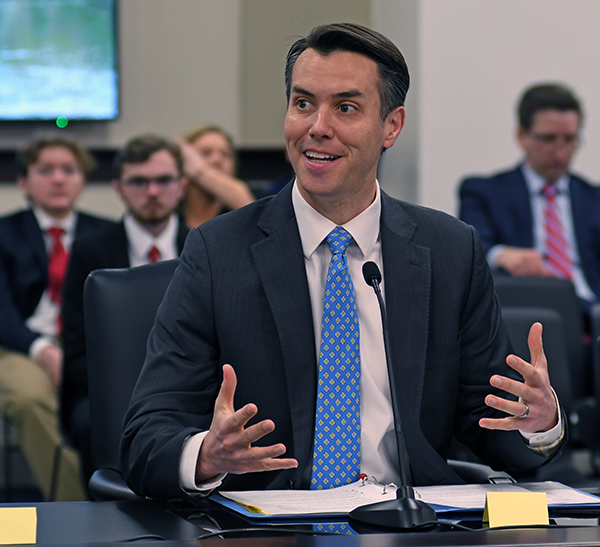
Senate Minority Floor Leader Morgan McGarvey,
D-Louisville, testifies on Senate Bill 164,
which would establish the Imagination Library of
Kentucky Program. A high resolution photo is
available
here.
FRANKFORT— It has
been said that reading is to the mind what
exercise is to the body. If this is true, the
minds of Kentucky’s youngest children will soon
be stretched even more.
On Wednesday, the Senate Appropriations and
Revenue Committee voted 8-0 for Senate Bill 164,
which would establish the Imagination Library of
Kentucky Program along with a trust fund to help
support it.
The program would oversee efforts to expand
Dolly Parton’s Imagination Library in Kentucky –
a book-gifting program for infants and young
children. Parton, a widely recognized icon in
the entertainment industry, established the
reading initiative in 1995 because her father
could not read and write.
SB 164 is sponsored by Senate Minority Floor
Leader Morgan McGarvey, D-Louisville. Senate
President Robert Stivers, R-Manchester and Sen.
Denise Harper Angel, D-Louisville, are signed as
co-sponsors.
McGarvey told committee members that the General
Assembly appropriated money for the first time
last year to help the Imagination Library grow
in Kentucky.
“This is a phenomenal program that gives books
to every child in a community ages zero to
five,” he said.
McGarvey said the initiative, which is curated
through experts, has been positive elsewhere. He
pointed to research showing that having 25 books
in a home is equivalent to about two additional
years of schooling for a child.
McGarvey said the bill would also address
administrative measures to help the program
expand, adding that funds are available in the
House budget proposal for the next biennium. He
said there are 90 programs covering 76 Kentucky
counties, but the goal is to reach all 120.
“This simply sets up the Dolly Parton program in
statute, and this committee sub places it with
the Department for Libraries and Archives, which
is where sort of the educational professionals
and the lawmakers have agreed is the best place
to house it,” McGarvey said.
The bill states that state funds would be used
to provide one age-appropriate book to each
registered child through the library. Books
would be sent monthly to each child’s home at no
cost to families.
The state program would contribute the 50% of
the matching funds required of local programs
that participate.
Sen. Stephen Meredith, R-Leitchfield, thanked
McGarvey for sponsoring the bill and said he is
excited to see kids get engaged in reading.
However, he also asked McGarvey to consider
adding language that would ensure the subjects
of the books are age appropriate.
McGarvey said he would be fine with adding the
change, and he is confident the books’ subjects
are appropriate. He also said the initiative is
not brand-new in Kentucky, but was organized
through private organizations and the state is
mirroring what has worked well in other states.
“(SB 164) sets the guardrails up so that they
have a better idea of how it functions, where it
is housed and how we can make sure it continues
to grow,” he said.
END
March 1,
2022
House approves
bill to regulate charitable bail organizations
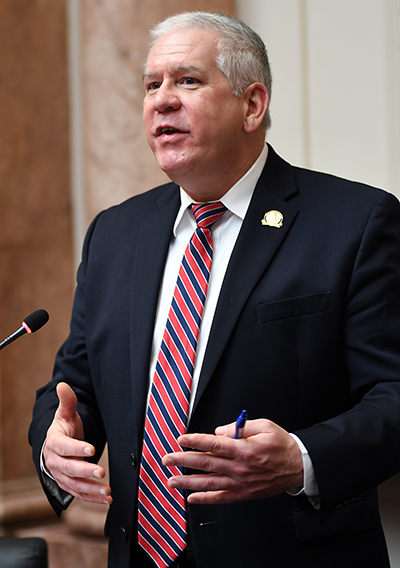
Rep. John Blanton, R-Salyersville, presents
House Bill 313 on the House floor on Tuesday.
A high resolution photo is available
here.
FRANKFORT— The
Kentucky House of Representatives approved a
bill Tuesday that would issue new guidelines for
charitable bail organizations.
House Bill 313 would prevent charitable bail
organizations from posting more than $5,000 in
bail for anyone charged with a crime, and it
would limit the types of charges the
organizations can post bail for.
Primary sponsor Rep. John Blanton,
R-Salyersville, said the bill was inspired by
several incidences in the Commonwealth.
Individuals were held under a high bond due to
the seriousness of their charges, he said, but
bailed out by a charitable bail organization and
then committed another crime. In some of these
cases, an innocent person died.
“Unfortunately, some people have been bonded out
that should have remained incarcerated,” Blanton
said. “And we’ve had citizens, young citizens,
teenagers, lose their lives by the individuals
that were bonded out.”
Under HB 313, individuals charged with a crime
related to domestic or dating violence and
individuals held under a civil court order would
not be eligible to be bailed out by charitable
bail organizations.
Blanton said the $5,000 limit is not an
“arbitrary” number and the majority of
individuals charitable bail organizations bail
out are being held at a $5,000 bond or less.
“We want to make sure that people who are in on
petty crimes, who are poor, don’t have access—
we don’t want to keep them housed-up.” Blanton
said. “We want them to get back out. Maybe some
of them have jobs… But we also want to keep in
mind public protection and the safety of the
people in the Commonwealth.”
Judges often set a high bond for individuals who
are charged with serious crimes, are a danger to
the public or a flight risk, Blanton added.
Individuals who are ineligible to be bailed out
by charitable bail organizations are still
permitted to post their own bonds or to have a
family member or friend bail them out.
Another provision of HB 313 would require
charitable bail organizations to keep track of
expenditures, who the organization is bailing
out of jail and their charges. This information
would be required to be posted publicly and
submitted annually to the Interim Joint
Committee on Judiciary.
If the organization posts bail for an individual
who commits another offense, HB 313 would also
require the bail to be forfeited to the victim
of the new crime.
Originally, HB 313 required charitable bail
organizations to publish a public list of its
donors, but a floor amendment from the bill’s
primary cosponsor, Rep. Jason Nemes,
R-Louisville, changed that. Nemes said there
were concerns over First Amendment rights.
“I want to say the reason we want the
information and why we’re going to get the
information about some of the donors is because
we know that there are taxpayer dollars that are
funding The Bail Project,” Nemes said.
A few lawmakers spoke on the House floor in
opposition to HB 313, including Rep. Pamela
Stevenson, D-Louisville. She said the way the
legal system works is in need of reform and that
placing limits on charitable bail organizations
hurts low income people.
“Don’t fix a broken legal system on the backs of
poor people,” Stevenson said. “It’s consistent
that what must happen is that we must fix the
system. If we need a constitutional amendment so
that we can have a bail not be set, then let’s
do that.”
Blanton said he and Nemes planned to file a bill
on Tuesday that would propose a constitutional
amendment to address that issue.
In voting yes on HB 313, Rep. Patti Minter,
D-Bowling Green, and Rep. Angie Hatton,
D-Whitesburg, said Nemes’ floor amendment
changed their minds on voting against the bill.
Minter also advocated for a constitutional
amendment.
Hatton said voting “yes” on the measure was a
“tough decision.”
“We’re probably going to be glad that we passed
this bill,” Hatton said. “Again, it was a tough
decision, but in the modified form I think that
it is going to end up being a good thing for our
state.”
HB 313 was approved by a 76-19 vote. It will now
go before the Senate for consideration.
END
March 1,
2022
Bill would
make animal owners pay for care in hoarding
cases
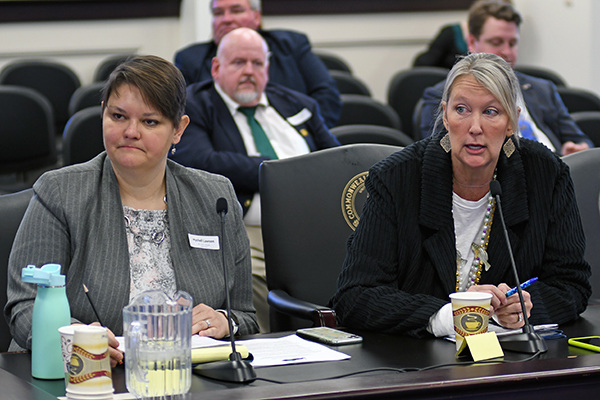
Senate Majority Caucus Chair Julie Raque Adams,
(right), testifies on Senate Bill 125, which
would make animal hoarders pay for animal care
costs when they are seized. With Adams is
Mychell Lawson, president of Kentucky Animal
Action Inc., who also spoke on the bill.
A high resolution photo is available
here.
FRANKFORT—A bill
aimed at making animal hoarders pay shelters for
the care of their seized animals received
approval Tuesday from the Senate Agriculture
Committee.
Senate Bill 125’s sponsor, Senate Majority
Caucus Chair Julie Raque Adams, R-Louisville,
told committee members the proposal has existed
for a couple of years, but has been sidelined by
COVID-19. She said it’s an issue that now must
be addressed—how to save animal shelters from
absorbing the sometimes extreme costs of caring
for animals.
“It is really unfair for shelters and counties
to have to pay for the often debilitating costs
of caring for seized animals when it is the
owner who is legally responsible for the
animals,” she said. “So I think counties will
embrace this because it’s a real cost-saving
measure for them.”
Testifying with Adams was Mychell Lawson,
president of Kentucky Animal Action Inc. She
said the proposed legislation is necessary to
curb spiraling costs.
“Agencies are often forced to care for animals
for months and even years,” she said. “Cases
lasting years is actually pretty common, which
can result in hundreds of thousands of dollars.”
Lawson offered examples of shelters facing heavy
costs when large numbers of animals have been
seized, including a situation in Elliott County
that involved 109 animals and $75,000 of
expenses. That cost has probably doubled by now,
she said.
The bill also includes a mechanism for owners
who cannot or will not pay the cost of care to
immediately surrender the animal. That would
eliminate the potential for gigantic costs to
shelters.
Some lawmakers raised questions about how it
would apply to livestock.
Lawson said the bill includes all animals, but
is aimed at domestic animal hording. It’s not
intended to change what animals control agencies
are already pursuing, she said.
Sen. Robin L. Webb, D-Grayson said she has
concerns regarding the bill’s possible effect on
legitimate purebred breeders and other issues,
including private property rights and due
process.
“I have a lot of concerns about this bill and
how they apply across the nation in other
jurisdictions” she said.
Senate President Pro Tem David P. Givens,
R-Greensburg, also said he has concerns about
the bill’s language because it’s too broad. He
noted that farmers across the state derive their
livelihood from animals and use practices in
animal husbandry that are known to be healthy
and beneficial.
“I’m not going to go into details of some of
them,” he said. “But to someone on the outside
seeing it for the first time or experiencing it,
it may well strike them as cruelty.”
Adams said she is open to working with others to
amend the legislation.
“There are practices that are accepted in the
agriculture community, and that is certainly the
intent of this bill,” she said.
The measure passed out of committee with a 9-1
vote.
END
Feb. 28,
2022
Tax rebate
bill receives full Senate approval
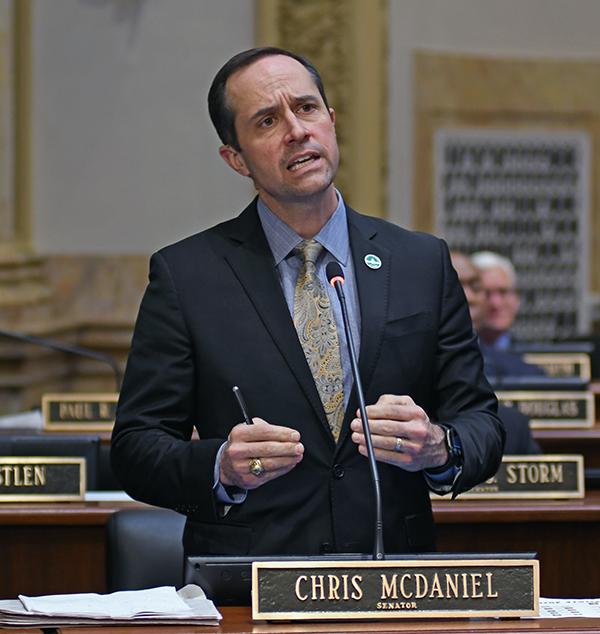
Sen. Christian McDaniel, R-Taylor Mill,
testifies on Senate Bill 194, which would create
a tax rebate of up to $500 for individuals and
up to $1,000 per household. A high resolution
photo is available
here.
FRANKFORT—Some
Kentuckians are closer to having more money in
their pockets after the Kentucky Senate voted
Monday to advance a bill that would provide
state tax refunds.
Senate Bill 194 would give a one-time tax rebate
of up to $500 to single taxpayers and up to
$1,000 to joint filers, not to exceed the amount
of taxes they paid last year. The money is
available through billions in budget surplus
funds in the current fiscal year.
The bill’s sponsor, Sen. Christian McDaniel,
R-Taylor Mill, said that taxpayers are facing
around $267 in additional expenses each month
from the highest level of inflation in 40 years
and that the rebate will help working
Kentuckians cope with the costs.
“If you went grocery shopping this weekend, if
you paid a utility bill, if you did any of the
basics of life, you’re seeing inflation probably
unlike most of us have ever seen in our adult
lives,” he said.
McDaniel said all of the surplus money in the
state’s budget was generated by working
Kentuckians, and that lawmakers must consider
who is best to decide how the money is spent.
“I would argue this vote is a vote of faith in
the citizens of this commonwealth,” he said.
“It’s a vote of the taxpayers who send us here.
It is a vote for the most pressing issue
confronting the average Kentuckian.”
The bill was approved 28-7 after nearly an hour
of debate on the Senate floor.
Supporters largely argued that taxpayers need
and deserve a refund during times of excess
funding and that giving money back to
Kentuckians would not hamper other projects in
the budget – such as paying down pension debt.
Senate President Robert Stivers, R-Manchester,
said there is enough money in state coffers to
cover the legislation with plenty to spare for
other objectives.
“I disagree with my colleagues who say rebate,”
he said. “It’s refunding. It’s giving your money
back to the people who paid it. And once we do
this, we’ll still be sitting on $5 billion over
the next 12 months to spend – $5 billion.”
Opponents, however, said such large spending
decisions should be made in context of the
state’s next biennial spending plan. They also
criticized the bill for not providing rebates to
Kentuckians who pay relatively little or no
taxes like retirees or the working poor.
Senate Minority Floor Leader Morgan McGarvey,
D-Louisville, said he’s not convinced offering
the rebates as proposed would be the best thing
to do and that the Senate first needs to hear
details on the proposed budget that lawmakers
are set to vote on later this session.
“We all want to help the people of Kentucky,” he
said. “We know there are people in Kentucky
hurting right now. The question is: What’s the
best way to do it?”
He also said money should be returned to more
types of taxpayers.
“I heard someone say that this is simply
returning the money to the people who paid it. I
think we need to put one more word in that. It’s
returning money to some of the people who paid
it. The reality is even those people who don’t
pay income tax are paying state taxes that come
into our general fund,” McGarvey said.
The amended bill now heads to the House for
consideration.
END
Feb. 28,
2022
Constable
reform bill advances off House floor
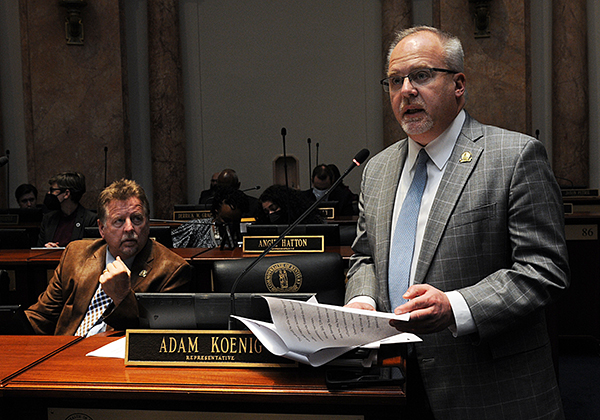
Rep. Adam Koenig, R-Erlanger, testifies on House
Bill 239 on the House floor. A high resolution
photo is available
here.
FRANKFORT— Newly
elected constables in Kentucky could soon be
required to be certified as a peace officer in
order to have the same powers as a peace
officer.
The Kentucky House of
Representatives approved House Bill 239 by a
59-38 vote on Monday. The bill would require
newly elected constables to undergo the same
training as police officers and sheriff’s
deputies before performing certain duties.
Primary sponsor Rep. Adam Koenig, R-Erlanger,
said the goal of the bipartisan measure is to
make communities safer.
“Of course not all constables are bad, but
unfortunately there’s been too many headlines to
ignore the fact that constables without proper
law enforcement training can be a serious
problem,” Koenig said.
Currently, constables can make arrests or
conduct a traffic stops even if they are not
certified peace officers. HB 239 would change
that for constables elected after Jan. 1, 2023.
“Some people may not realize it, but constables
can do all of those things even though they’ve
never received one hour of law enforcement
training,” Koenig said. “These elected office
holders often carry a gun and a badge and
exercise the same power as a state trooper, a
sheriff’s deputy or a city police officer.”
Under HB 239, newly elected constables would
have to complete the same 20-week training
course from the Department of Justice that
covers patrol procedures, defensive tactics,
criminal law, tactical response, traffic
investigations and more in order to exercise the
same powers as a peace officer, Koenig said.
This type of training is required for anyone
becoming a police officer or sheriff’s deputy in
Kentucky.
Koenig said the bill would not stop the newly
elected constables from serving their
communities by directing traffic, serving
subpoenas, assisting with child support actions,
providing funeral escorts and more.
HB 239 would
also allow constables to apply to any Kentucky
Law Enforcement Council certified basic training
course, and the bill would require the Kentucky
Department of Criminal Justice Training to
accept at least one qualified constable in each
training class.
Rep. Bill Wesley, R-Ravenna, said he has
concerns about how HB 239 will impact rural
communities. In Eastern Kentucky, constables are
a valuable resource to small police departments
and sheriff’s offices and to Kentucky State
Police, he said.
“I have some counties in my district that cannot
afford another officer,” Wesley said. “… This is
going to do away with constables altogether. We
cannot afford our officers, especially in
Eastern Kentucky, to be done away with.”
When voting “no” on HB 239, Rep. Angie Hatton,
D-Whitesburg, said she agreed with Wesley and
the other House members who are against the
measure.
“It is an urban vs. rural issue,” Hatton said.
“It is something that’s difficult to explain,
but in our communities our constables are very
important to us…. We count on them, and when
they tell me this is not what they need, I can’t
support it.”
In closing, Koenig said that the General
Assembly has approved legislation in previous
years to take care of “bad actors” in police
departments and sheriff’s offices, and there is
currently no method of decertifying constables
in Kentucky. He also said the bill has the
support of several law enforcement groups across
the state, the Kentucky League of Cities and the
Kentucky Association of Counties.
Primary co-sponsor House Minority Floor Leader
Joni L. Jenkins, D-Shively, also spoke on the
House floor in favor of HB 239.
“With the passage of this bill, our citizens can
know when they see someone who is a constable
who has peace officer duties they know they can
trust they are safe with that person,” Jenkins
said.
HB 239 will
now go before the Senate for consideration.
END
Feb. 25,
2022
This Week at
the State Capitol
FRANKFORT— Another
week is over in the 2022 legislative session,
and the action continues to escalate as
lawmakers advance more measures through the
chambers and make a final push to file bills
before deadlines.
It was a stark contrast from the early days of
the session when the focus turned almost
entirely toward one issue — redistricting. By
the eighth week, lawmakers were taking aim at
everything from educational standards and
religious freedom to nursing shortages, police
certifications and Juneteenth.
But of all the issues moving through the
legislature during the compressed, four-day
week, taxes seemed grab the most attention.
The Senate captured headlines on Thursday when
majority members unveiled a tax rebate plan
designed to help Kentuckians cope with economic
inflation. The measure — Senate Bill 194 —would
provide individual taxpayers with a one-time
rebate of up to $500 this year, with a maximum
of $1,000 per household.
The bill sailed through the Appropriations and
Revenue Committee after supporters said the
money is available through this year’s $1.9
billion in budget surplus. It now heads to the
Senate floor.
Discussions on taxes shifted up another gear on
Friday when a major proposal on tax reform was
announced in the House.
House Bill 8 seeks to incrementally lower the
state’s 5% income tax over a number of years
until it is eliminated. However, before most of
the reductions can take effect, the state must
meet revenue targets based on expansion of the
tax base.
That announcement followed House action on a
separate tax measure earlier in the week.
On Wednesday, House Bill 475 passed a vote on
the floor. It proposes a constitutional
amendment that could set the stage for new types
of taxes at the local level. But even if the
measure clears the Senate, Kentucky voters would
still need to approve the amendment in a
referendum before it could take effect.
Other issues before the General Assembly this
week included:
Peace officer
certifications: House Bill 206, a
bipartisan measure that would prohibit anyone
convicted of a misdemeanor sexual offense from
serving as a peace officer, won unanimous
support on the House floor Tuesday.
Nurse shortages:
Senate Bill 10 seeks to boost the number of
critically needed nurses in Kentucky by
improving the process for out-of-state and
foreign-trained nurses to practice here. It
would also improve student access to nursing
programs and update the Kentucky Board of
Nursing membership requirements to give nurses
more of a voice. It received approval Wednesday
from the Senate Health and Welfare Committee.
Industrial incentives:
Senate Bill 48, which would recover $15 million
in incentive funds from a stalled industrial
project in eastern Kentucky, received approval
Wednesday from the full Senate. It seeks to
recoup taxpayer money designed to help Braidy
Industries, now known as Unity Aluminum,
establish an aluminum mill in Greenup County.
Law enforcement shortages:
House Bill 414 aims to give local law
enforcement agencies more flexibility to recruit
and retain officers by removing the age ceiling
for applicants. It would also allow agencies to
operate under an 80-hour, 14-day work period
instead of a 40-hour, seven-day period. The
measure advanced off the House floor on
Wednesday.
Juneteenth: House
Bill 133, which cleared the House State
Government Committee on Thursday, would add
Juneteenth to the list of federal holidays
recognized by the state. It commemorates the
emancipation of the last group of enslaved Black
Americans.
Educational standards:
Senate Bill 138 calls for public schools to
teach a series of core principles and historical
documents that supporters say are essential to
American civics. The bill cleared the full
Senate on Thursday following heavy debate.
Religious services:
House Bill 43 would prevent a governmental
entity from prohibiting religious services
during an emergency to a greater extent than
imposed on other organizations or businesses
that provide essential services. It passed the
House State Government Committee on Thursday.
Lawmakers will return on Monday for the 37th day
of the session and face deadlines next week to
file bills in both the House and Senate.
Kentuckians have many ways to keep in touch with
the legislative process, including the
Legislative Record webpage, which allows users
to review and track a bill’s progression through
the chambers.
Citizens can also share their views on issues
with lawmakers by calling the General Assembly’s
toll-free message line at 1-800-372-7181.
END
Feb.
24,
2022
Senate
resolution would end COVID-19 emergency
declaration in Kentucky
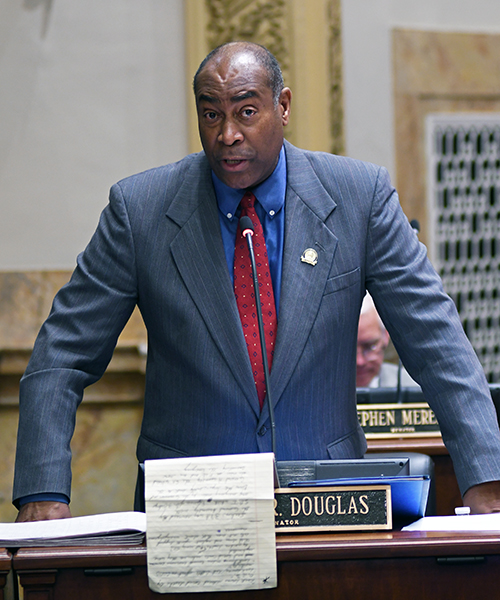
Sen. Donald Douglas, R-Nicholasville, testifies
on Senate Joint Resolution 150, which would end
the COVID-19 emergency declaration in Kentucky.
A high resolution photo is available
here.
FRANKFORT— A
resolution that would end the COVID-19
declaration of emergency in Kentucky next month
received approval Thursday on the Senate floor.
Senate Joint Resolution 150, which passed 28-8,
would terminate Kentucky’s declaration on March
7. The measure’s primary sponsor, Sen. Donald
Douglas, R-Nicholasville, told lawmakers it’s
time to move past the emergency.
“When the virus was first announced, there is no
doubt that there were a lot of unknowns,” he
said. “The medical community, the scientific
community and yes, I dare say even the political
representatives were caught off guard.”
However, Douglas said, instead of proceeding
down a purely medical path, politics assumed a
major role in decision-making. Some treatments
for COVID-19 were ignored or dismissed, while
people lost their jobs and schools were shut
down, he said.
“The emergency seemed to be more about emotion
and feeling and a lot less about objectivity and
facts,” Douglas said.
He added that SJR 150 provides the governor and
his executive agencies time to determine if any
administrative regulations related to the
pandemic need to be filed or changed. He called
the measure a thoughtful approach that doesn’t
aim to interfere with any federal funding.
However, critics argued that Kentucky’s
emergency declaration does not include any
statewide restrictions, and they cited concerns
about unintended consequences, such as the
potential loss of federal nutrition assistance.
Sen. Karen Berg, D-Louisville, said she voted
against the measure because it’s too soon. She
noted that Kentucky is still experiencing a
12.3% positivity rate and that 60% of residents
have received a single vaccine so far.
“That’s the highest number we have,” she said.
“So, we haven’t done the work that other states
have done to get to this point. I think my
colleagues know that I felt like that was a
responsibility we took on and a responsibility
that we did not meet.”
Sen. David Yates, D-Louisville, also said he
couldn’t stand behind the measure.
“Why are we doing this,” he asked. “It doesn’t
change anything. I understand – I want it to be
over. The resolution, I actually cannot wait
until I can join in support of it, but what is
the rush? I vote no.”
END
Feb. 24,
2022
House
committee approves religious freedom bill
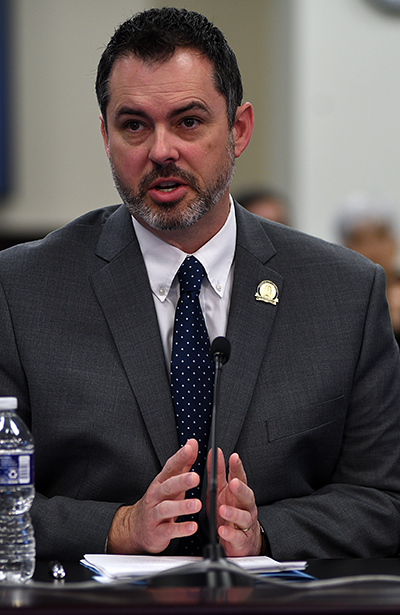
Rep. Shane Baker, R-Somerset, testifies on House
Bill 43 in the House State Government Committee.
A high resolution photo is available
here.
FRANKFORT— The
House State Government Committee approved a bill
Thursday that seeks to protect houses of worship
and religious organizations from discrimination.
House Bill 43 would prohibit a governmental
entity from prohibiting religious services
during an emergency to a greater extent than
imposed on other organizations or businesses
that provide essential services.
Primary sponsor Rep. Shane Baker, R-Somerset,
said the restrictions in place at the beginning
of the COVID-19 pandemic inspired the
legislation.
“Basically in 2020, in the early days of the
pandemic, we faced some unprecedented
situations, and during that time churches were
shut down,” Baker said. “A lot of confusion and
frustration took place during that time.”
At the outset of the virus, businesses, such as
grocery stores, hardware stores and gas
stations, were allowed to remain open to the
public. Others, like restaurants, event venues
and churches, were not deemed essential and had
to close in an effort to reduce the spread of
the virus.
Baker said the goal of HB 43 is to make sure
churches and other houses of worship are treated
the same as other essential businesses if the
Commonwealth were to face another crisis that
warrants the shutdown of nonessential
businesses.
HB 43 would also allow a religious organization
to take action against a local or state
emergency order if it feels the order is
discriminatory. This includes seeking an
injunction or compensatory damages for pecuniary
and non-pecuniary losses.
Baker was joined by David Walls, executive
director of the Family Foundation, and Greg
Chafuen, legal counsel for Alliance of Defending
Freedom, in testifying in favor of HB 43.
In voting no on HB 43, Rep. Kelly Flood,
D-Lexington, said, “I’m not endorsing a bill
that says it’s OK to break civic rules in
emergencies.”
Rep. Patti Minter, D-Bowling Green, also voted
no, citing separation of powers concerns, and
that she believes the General Assembly already
addressed this issue last year when it made
changes to state statute.
During discussion of the bill, Rep. James
Tipton, R-Taylorsville, asked Baker if it would
prohibit any religious organization from
choosing to shut down or follow other guidelines
during an emergency. Baker said no.
Tipton, who said he is a Christian, added he’s
seen more people suffering from mental health
issues and more people struggling spiritually
since the beginning of the pandemic.
“There is nothing that we, as a government body,
should ever do to prevent someone from
exercising their god given rights, as you said,
protected by the constitution, to worship their
god in a way they choose,” Tipton said.
HB 43 will now go before the full House for
consideration.
END
Feb. 23,
2022
Senate
committee approves measure to boost nursing
ranks in Kentucky

Sen. Robby Mills, R-Henderson, testifies on
Senate Bill 10, which aims to increase the
number of nurses in Kentucky. A high resolution
photo is available
here.
FRANKFORT— A bill
that stands to boost the number of critically
needed nurses in Kentucky received approval
Wednesday from the Senate Health and Welfare
Committee.
Sen. Robby Mills, R-Henderson, the bill’s
primary sponsor, said the measure would improve
the process for out-of-state and foreign-trained
nurses to practice in Kentucky without
compromising standards of patient care. It would
also improve student access to nursing programs
and update the Kentucky Board of Nursing
membership requirements to give nurses more of a
voice, he said.
Senate Bill 10 is a culmination of quite a bit
of work over the interim and into the session,
Mills told the committee. It was approved with a
10-0 vote.
Senate President Robert Stivers, R-Manchester,
is also sponsoring the bill. He said the nursing
shortage has been an ongoing issue dating back
to around 2013 and that some estimates show the
gap could be as high as 10,000 to 14,000 nurses.
Stivers said it has become more exacerbated and
apparent during the last couple of years with
COVID-19. When elective procedures were halted
during the pandemic, some nurses were laid off.
Some of them went to other states to work or
became travel nurses, he said.
“It just created a bigger and bigger problem,”
Stivers said. “But this is not just related to
hospitals, it’s related to long-term health care
facilities and anybody else who relies on
nursing.”
Instead of using predetermined numbers for
admission to nursing programs or a temporary
executive order, Stivers said the nursing
shortage problem should be handled differently.
However, it’s important to have criteria so the
public would know that when nurses graduate and
start to work in hospitals, they’re qualified to
do so, he added.
“The other thing we looked at is how we treat
nurses who come from other jurisdictions to make
sure we create the opportunity – that it is as
quick and seamless as possible,” he said.
Those working on the bill have consulted with
various schools and institutions, the hospital
association and nursing board staff, according
to Wednesday’s testimony.
Nancy Galvagni, president of the Kentucky
Hospital Association, spoke on behalf of the
bill.
She said many nurses have left their jobs at
hospitals and other facilities to become travel
nurses. Paying for travel nurses can be
extremely expensive for medical facilities
because they can command pay at a national rate,
rather than cheaper rates paid in some areas.
Delanor Manson, Chief Executive Officer of the
Kentucky Nurses Association and other nursing
groups, said she represents thousands of nurses
in her role. She suggested retention bonuses for
nurses who stay in their communities to work
instead of becoming travel nurses. She also said
her organization is prepared to offer
assistance.
Manson cited a five-point plan from the
association that includes $100 million in
proposals to address the issue. She said SB 10
is a good start but should go further.
Committee member Sen. Denise Harper Angel,
D-Louisville, also suggested retention funds
would help retain nurses and called the bill an
excellent start.
“I’d like to thank the sponsors for bringing
this legislation to address this critical need.
I particularly appreciate the fact, that of this
committee sub, that you worked with various
entities to improve the bill,” she said.
END
Feb. 23,
2022
Bill seeking
to address law enforcement staffing concerns
advances
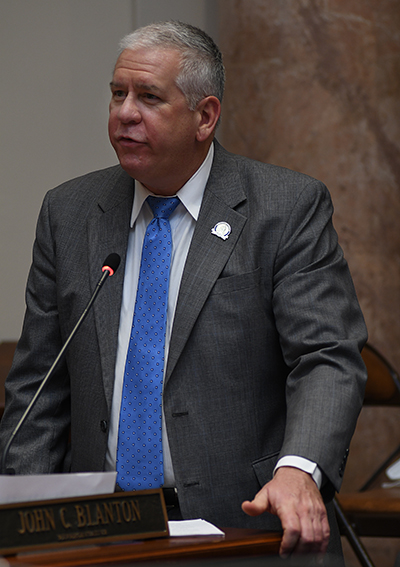
Rep. John Blanton, R-Salyersville, presents
House Bill 414 on the House floor on Wednesday.
A high resolution photo is available
here.
FRANKFORT— One
lawmaker hopes his bill will address some of the
staffing issues facing local law enforcement
agencies across the Commonwealth.
The Kentucky House of Representatives approved
House Bill 414 by an 85-12 vote on Wednesday.
Primary sponsor Rep. John Blanton,
R-Salyersville, said the bill will give local
law enforcement agencies more flexibility to
address the needs of employees and the
communities they serve.
“House Bill 414 addresses these issues by
amending various statutes relating to public
safety to ensure our cities recruit and retain
the best people,” Blanton said.
When it comes to staffing concerns, HB 414 would
remove the age ceiling for applicants. Under
current statute, applicants must be between 18
and 45 years old.
“Last summer, Louisville Metro Police reported
more than 240 job openings. Lexington needed to
hire more than 100 people,” Blanton said.
The bill would also allow local law enforcement
agencies to operate under an 80-hour, 14-day
work period instead of a 40-hour, seven-day work
period.
“This change gives cities and our police
departments options as they address the unique
aspects of their communities,” Blanton added.
Another provision of the bill makes an effort to
strengthen the reputation of police and fire
departments by amending the disciplinary process
to allow more time for complaints against law
enforcement officers to be filed, Blanton said.
Under this provision, the window for a complaint
to be filed would be extended from three days to
10 days. The bill would then give the mayor,
city manager or legislative body 10 days instead
of five days to file charges if there is
probable cause.
Two lawmakers, Rep. Buddy Wheatley, D-Covington,
and Rep. Jeffery Donohue, D-Fairdale, expressed
concerns about the 80-hour, 14-day work week
provision.
Blanton confirmed the bill does not set a limit
on how many hours in a day an officer can work.
In response, Wheatley referred to studies that
show requiring an officer to work more than 10
hours a day is not healthy or safe.
“It’s actually going to cause some people to
leave the service if they are forced to work
more than 10 hours,” Wheatley added.
Blanton, a retired Kentucky State Police
officer, said the goal of the change is to give
departments more flexibility if an incident
occurs that requires a long investigation.
“I bring you this bill because I know it will
benefit our public safety personnel, our local
governments and the citizens many have sworn to
protect and serve,” Blanton said.
HB 414 will now go before the Senate for
consideration.
END
Feb. 22,
2022
House approves
bipartisan peace officer certification reform
bill
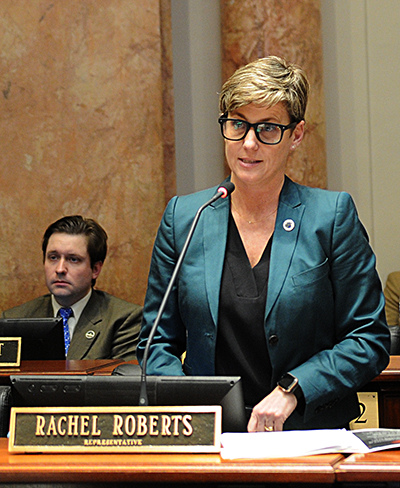
Rep. Rachel Roberts, D-Newport, presents House
Bill 206 on the House floor on Tuesday. A high
resolution photo is available
here.
FRANKFORT— A bill
moving through the Kentucky General Assembly
would prohibit anyone convicted of a misdemeanor
sexual offense from becoming or remaining a
peace officer.
The Kentucky House of Representatives
unanimously approved House Bill 206 on Tuesday.
Kentucky law currently prohibits anyone
convicted of a felony from becoming or remaining
a peace officer. HB 206 would add misdemeanor
sexual offenses to the list. The bill would also
automatically revoke the certification of a
peace officer if he or she is convicted of a
misdemeanor sexual offense.
Primary sponsor Rep. Rachel Roberts, D-Newport,
said the measure is an extension of Senate Bills
80 and 52 from the 2021 legislative session.
Both bills sought to reform what constitutes law
enforcement misconduct in an effort to weed out
“bad actors.”
“House Bill 206 helps us ensure that we recruit
the very best and that Kentucky’s peace officers
serve with honor when charged with the public’s
safety and trust,” Roberts said.
Primary cosponsor Rep. Jennifer Decker, R-Waddy,
said she was shocked when she learned from a law
enforcement officer in her district that
individuals convicted of a misdemeanor sex
offense, even a misdemeanor sex offense against
a child, are not prohibited from serving as
peace officers in Kentucky.
Decker said she was in “disbelief” at learning
her constituent knew about a case in Kentucky.
The officer had been originally charged with
felony child rape but pleaded guilty and had
their charges reduced to a misdemeanor. That
allowed them to continue working as a peace
officer under current statute.
HB 206 cleared the House by a 96-0 vote. It will
now go before the Senate for consideration.
END
Feb. 18,
2022
This Week at
the State Capitol
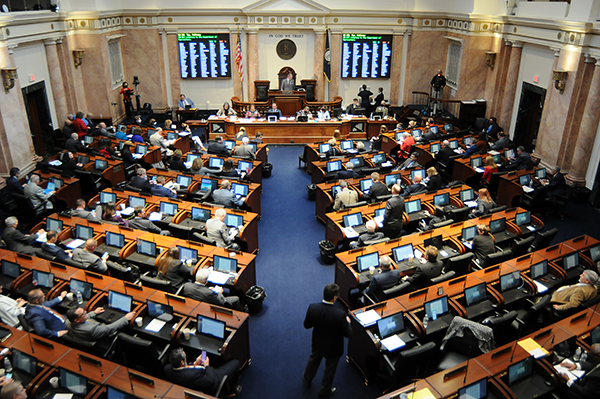
Legislators work on the House floor. A high
resolution photo is available
here.
FRANKFORT – The
Kentucky General Assembly has passed the halfway
mark in the 2022 legislative session, and while
a handful of measures are now law, many of the
most high-profile bills continue to work through
the process.
Lawmakers hit day 30 of the 60-day session on
Wednesday, and more than 900 bills and
resolutions have been introduced in the House
and Senate so far. Of those, more than 200 have
passed at least one chamber of the legislature.
However, deadlines are looming, and Tuesday is
the last day to request new bills from drafters.
Legislators have until March 1 to file
legislation in the House and until March 3 in
the Senate, offering little more than week to
wrap up any proposals for this year’s session.
Much of the work this week focused on issues
affecting schools, including student safety,
academic standards, masking and athletics.
Among the bills gaining steam was Senate Bill
138, which calls for public schools to teach a
series of core concepts and historical documents
that supporters say are central to understanding
American principles and government.
Proponents said the bill is needed to address
gaps in civics education and underscore the
importance of key people and events in American
history. Critics, however, said the measure
could stifle much-needed discussions on social
topics like race and gender.
SB 138 cleared the Senate Education Committee on
Thursday and now heads to the full Senate.
Two other measures related to school athletics
and transgender students— House Bill 23 and
Senate Bill 83—were also generating debate this
week as they moved forward in their respective
chambers.
In essence, both measures would prevent
male-to-female transgender students from
participating in girls sports. HB 23 received
approval in the House Education Committee on
Tuesday, while SB 83 advanced off the Senate
floor on Wednesday.
Supporters say the changes are necessary to
provide a fair and level playing field in girls
athletics. But opponents contend that the bills
are unnecessary and would prevent transgender
girls from reaping the social and health
benefits of sports.
Other issues that lawmakers sought to address
this week included:
School masks: House
Bill 51, which would make facial coverings
optional in Kentucky schools, received approval
in the House Education Committee on Tuesday.
School resource officers:
House Bill 63 would require school districts
that can afford a school resource officer at
each school to have them in place by Aug. 1. If
funds or personnel are not available, the bill
directs the school district to work with the
state Center for School Safety to address those
issues. HB 63 received approval on the House
floor Tuesday.
Child abuse: House
Bill 263, known as Kami’s Law, would increase
the penalty for first-degree criminal abuse to a
Class B felony if the victim is under 12 years
old. It cleared the House floor with a unanimous
vote Tuesday.
COVID-19 immunity:
In the event of any state vaccination mandates,
Senate Joint Resolution 80 would recognize
natural immunity against COVID-19 as equivalent
to being vaccinated. The measured received
approval on the Senate floor Tuesday.
Gubernatorial pardons:
Senate Bill 149 proposes changes to two sections
of the state constitution that would prohibit
the governor’s ability to grant pardons or
reduce sentences around election time. It
received approval Wednesday in the Senate State
and Local Government Committee.
School police:
Senate Bill 120 would authorize local boards of
education to establish a police department for
local school districts. It advanced out of the
Senate Education Committee on Thursday.
School bus cameras:
House Bill 221 would allow school districts to
install stop-arm cameras on school buses. The
cameras would help police track down traffic
offenders who drive past buses while children
are boarding or exiting. It passed off the House
floor on Thursday.
Statute of limitations:
Senate Bill 153 would remove the statute of
limitations for civil actions arising from
childhood sexual assault or abuse. The bill
cleared the Senate Judiciary Committee on
Thursday.
Kentucky State University:
House Bill 250 would allow the state to loan $23
million to Kentucky State University to help the
struggling university meet its financial
obligations for this fiscal year. HB 250 directs
the Council on Postsecondary Education to create
and oversee a management improvement plan and a
loan repayment plan for KSU. The bill passed off
the House floor on Thursday.
Lawmakers are scheduled to break for Presidents’
Day on Monday but will gavel back in on Tuesday
for the 33rd day of the session.
Kentuckians have many ways to keep in touch with
the legislative process, including the
Legislative Record webpage, which allows users
to review and track a bill’s progression through
the chambers.
Citizens can also share their views on issues
with lawmakers by calling the General Assembly’s
toll-free message line at 1-800-372-7181.
END
Feb. 18,
2022
Bipartisan
anti-SLAPP bill unanimously advances off House
floor
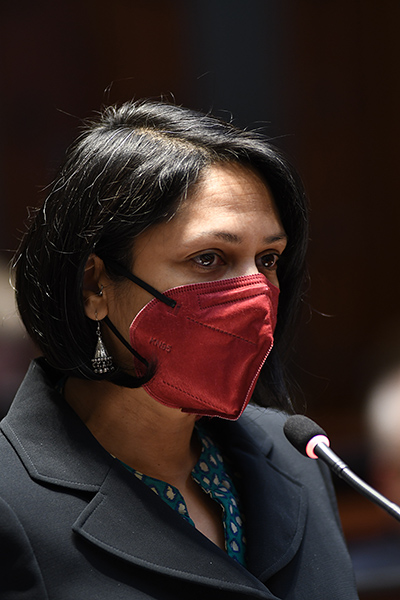
Rep. Nima Kulkarni, D-Louisville, presents House
Bill 222, or the Uniform Public Expression
Protection Act, on the House floor on Friday.
A high resolution photo is available
here.
FRANKFORT— The
Kentucky House of Representatives approved a
bipartisan measure to protect freedom of speech
on Friday.
House Bill 222, or
the Uniform Public Expression Protection Act,
would offer those who speak out against a matter
of public interest protection from strategic
lawsuits against public participation or SLAPP.
The primary co-sponsors of HB 222 are Rep. Nima
Kulkarni, D-Louisville, and Rep. Jason Nemes,
R-Louisville. Kulkarni has been working on the
bill since 2019.
Kulkarni said HB 222 specifically “creates a
procedure, a special motion to dismiss, by which
a judge may dismiss certain civil lawsuits that
are used to intimidate, censor or silence those
who speak out on a matter of public interest or
concern by burdening them with the cost of a
legal defense against what is ultimately a
meritless lawsuit.”
According to Kulkarni, the bill has received
widespread support from numerous organizations
including the American Civil Liberties Union,
Americans for Prosperity, the Bluegrass
Institute, the Kentucky Open Government
Coalition, the Kentucky Press Association, the
Pegasus Institute, the Public Participation
Project, and the Uniform Law Commission.
Nemes said HB 222 will protect regular people
from anyone in power, regardless of their
political affiliation, who seeks to silence
them.
“(Strategic lawsuits against public
participation) are not in the best interest of
our citizens, so we want to make sure you can’t
abuse the process,” Nemes said.
The bill would not prevent a person or entity
from filing a bona fide libel or slander
lawsuit, and the standard to prove a lawsuit is
a strategic lawsuit against public participation
is high, Nemes added.
The House approved HB 222 by an 82-0 vote. It
will now go before the Senate for consideration.
END
Feb.
17,
2022
Senate bill
would create standards for teaching key civics
topics
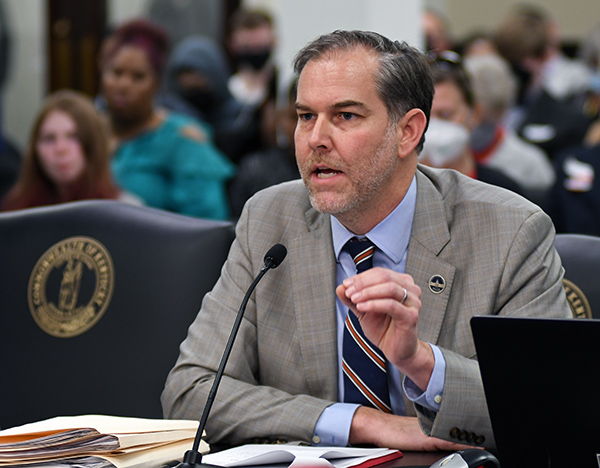
Sen. Max Wise, R-Campbellsville, testifies on
Senate Bill 138, which would create educational
standards on civics topics for middle and high
school students. A high resolution photo
is available
here.
FRANKFORT—
Legislation that calls on public schools to
teach certain concepts and historical documents
– ones that supporters say are central to
American principles – cleared the Senate
Education Committee on Thursday.
Senate Bill 138 says schools must provide
instruction in social studies that aligns with a
list of concepts such as “all individuals are
created equal” and “Americans are entitled to
equal protection under the law,” among several
others.
It also calls for topics on public policy or
social affairs to be taught with consideration
of the students’ age and for educators to
incorporate two dozen core documents from
American history into lessons.
The bill’s primary sponsor and chair of the
committee, Sen. Max Wise, R-Campbellsville, said
the purpose of the legislation is to preserve
alignment of middle and high school standards
with American principles of equality and
freedom.
“Amid national and state-wide tensions that seem
to be further dividing us, I’ve drafted a bill
with the intent to unify, Wise said.
“Our entire country is facing a lack of
knowledge when it comes to civics education.
This is at no fault to our educators, but rather
a reflection on a growing concern that Americans
are falling behind in understanding the
importance of civics and government education,”
he continued.
Wise testified that, according to the National
Assessment of Educational Progress, less than a
quarter of American 12th graders are proficient
in civics, and only 12% are proficient in U.S.
history.
“Although the new K-12 social studies standards
have been upgraded to quality performance-based
terminology, both educators and parents have
complained that the standards seem to lack
specific reference to key people, key events,
key struggles and key challenges and also
ongoing successes that have forged American
democratic principles of equality, freedom and
individual rights,” Wise said.
Some of the documents and speeches that would be
incorporated into middle and high school social
studies include The Mayflower Compact, The
Declaration of Independence, The U.S.
Constitution, The 1796 Farewell Address by
George Washington, The Gettysburg Address by
Abraham Lincoln, Of Booker T. Washington and
Others by W.E.B. Du Bois, and Letter from
Birmingham Jail by Martin Luther King, Jr.,
among others.
The bill was approved in committee after a
series of changes to the original wording. Wise
said the revisions clarified his intent and
reflected input from various stakeholders.
Several people, both for and against the
legislation, took turns testifying before
committee members. They included parents,
students, a man whose family was directly
affected by the Holocaust, educators and a
representative from the League of Women Voters
of Kentucky.
Senate Minority Caucus Chair Reginald Thomas,
D-Lexington, complimented Wise for considering
input, but said he is not in favor of the bill.
“I don’t know why we create this boogeyman of
critical race theory, and now we’re buying into
that here in Kentucky because we don’t teach
critical race theory here in our K-12 schools,”
he said. “And I don’t know why we have to color
the boogeyman of critical race theory Black. I
am really troubled by that because that just
feeds into racism that exists all across this
country.”
Thomas said the teaching of history should be
open for discussion, and he fears not talking
about it could make matters worse. Even some of
the United States’ most terrible times in
history should be freely broached, he said.
“We’ve got to talk about slavery and the
oppression that occurred. We’ve got to talk
about the Trail of Tears and the horrors that
Native Americans faced. We’ve got to talk about
the Holocaust in hopes that we never see that
again. I mean, those are things that happened in
our past,” he said.
END
Feb. 17,
2022
Tax-related
constitutional amendment proposal clears House
committee
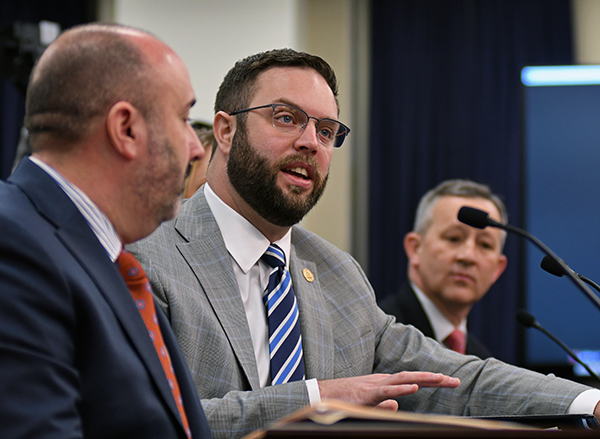
Rep. Michael Meredith, R-Oakland, sits between
J.D. Chaney, executive director and CEO for the
Kentucky League of Cities, and Jim Henderson,
executive director and CEO of the Kentucky
Association of Counties, as he testifies on
House Bill 475 during the House Elections,
Constitutional Amendments and Intergovernmental
Affairs Committee on Thursday. A high resolution
photo is available
here.
FRANKFORT—
Kentucky voters may soon decide whether or not
the Kentucky General Assembly can allow local
governments to charge new types of taxes.
House Bill 475 cleared the House Elections,
Constitutional Amendments and Intergovernmental
Affairs Committee on Thursday. Rep. Michael
Meredith, R-Oakland, is the primary sponsor of
the bipartisan measure.
Currently, Section 181 of the Kentucky
Constitution limits the types of taxes local
governments can charge. Meredith said most
cities, counties and municipalities survive on
occupational tax and property tax revenue.
“If we want to remove the over reliance on
occupational tax or income-based taxes at the
local level, this is a move we must make,”
Meredith said. “If we want to provide more
flexibility to our local governments in setting
the course for their future, this is a change we
must make.”
For example, changing the constitution would
give the General Assembly the power to approve
legislation that would allow local governments
to implement a 1% local sales tax.
In referencing calls for comprehensive tax
reform, Meredith said HB 475 is an essential
piece to accomplishing that goal.
“There’s no way to truly do comprehensive tax
reform if we don’t address the local side as we
address the state side,” Meredith said.
Meredith was joined by J.D. Chaney, executive
director and CEO for the Kentucky League of
Cities; Shelby Somervell, vice president of
government affairs and communications for
Greater Louisville Inc.; Andi Johnson, chief
policy officer and director of regional
engagement for Commerce Lexington; and Jim
Henderson, executive director and CEO of the
Kentucky Association of Counties, in testifying
in favor of HB 475. They believe this measure
will lead to much needed population and industry
growth and will make Kentucky more competitive
with its neighbors.
If HB 475 receives approval from the House and
the Senate, Kentucky voters will decide on the
proposed change to the constitution during the
November 2022 general election.
If voters approve, that’s where Meredith hopes
House Bill 476, a separate bill that was
approved by the House Local Government Committee
on Wednesday, would kick in. HB 476 is not a
proposed constitutional amendment.
Meredith said HB 476 “keeps the status quo and
ensures that every county, city or other local
government can continue charging any of the
taxes or fees that they’re authorized to do in
statute currently, but they couldn’t expand to
anything new,” until the General Assembly
authorizes them to do so.
House Minority Floor Leader Joni L. Jenkins,
D-Shively, asked the panel if there are any
guardrails in place to make sure the gap between
“poor” counties and “rich” counties doesn’t
increase.
Henderson said the changes proposed in HB 475
could benefit every county in the state in a
significant way since counties that already do
not generate much occupational tax revenue, if
any, could benefit from a local sales tax.
Shannon Stiglitz, senior vice president of
government affairs for the Kentucky Retail
Federation, shared with the committee the
organization’s concerns with the possibility of
a local sales tax and how that might impact
businesses and consumers.
In voting “yes” on HB 475 in committee, Rep.
Jason Nemes, R-Louisville, said he shares a lot
of the Kentucky Retail Federation’s concerns,
but he believes the bill has the potential to
alleviate property tax burdens on local families
by giving cities and counties more options. He
also believes this change will lead to growth.
“Our tax policy in Kentucky needs to be toward
growth,” Nemes said. “We are a poor state. We
are poor counties and poor cities. We can’t pay
for our roads. We can’t pay for our schools the
way we want to. We can’t pay for the healthcare
we want to unless we have growth.”
HB 475 and HB 476 will now go before the full
House for consideration.
END
Feb. 16,
2022
Proposed
constitutional amendments would limit pardons
and commutations
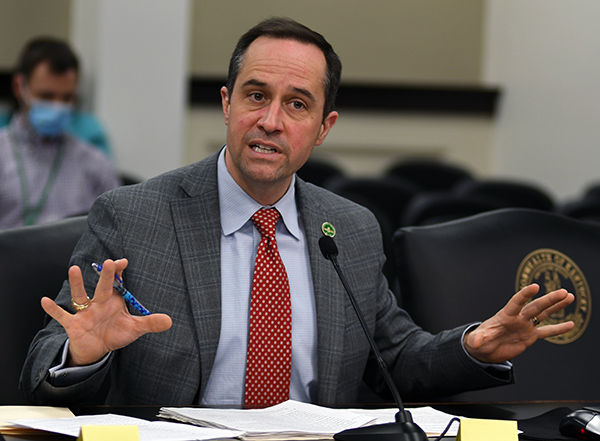
Sen. Christian McDaniel, R-Taylor Mill,
testifies on Senate Bill 149, which proposes
constitutional amendments that would limit the
governor’s ability to grant pardons or commute
sentences at specific times. A high
resolution photo is available
here.
FRANKFORT—Legislation proposing constitutional
amendments that would limit the governor’s
ability to grant pardons or reduce criminal
sentences received approval in committee
Wednesday.
Amendments to the Kentucky constitution must be
placed on the ballot and win approval from
voters before taking effect. If adopted by the
General Assembly, Senate Bill 149 would ask
voters:
“Are you in favor of limiting a Governor’s
ability to grant pardons or commute sentences by
prohibiting him or her from granting pardons or
commuting sentences during the time period
beginning thirty days prior to the general
election at which the Governor is elected, and
ending the fifth Tuesday succeeding the election
by amending the Constitution of Kentucky as
stated below?”
The measure advanced out of the Senate State and
Local Government Committee with an 8-2 vote
after its sponsor, Sen. Christian McDaniel,
R-Taylor Mill, testified on the bill.
“I can tell you today that the people of the
commonwealth find the judicial process, with all
of the participants and safeguards I previously
described, to be superior to the pardoning
powers of one individual,” he said.
McDaniel shared media headlines from a series of
high-profile gubernatorial pardons that took
effect in 2019, including for offenders
convicted of rape and murder. He said the bill
would allow pardons to continue, but it
specifies the times when they would not be
permitted.
“There are many who believe the power to pardon
should remain intact. This is why this amendment
does not do away with the power to pardon. It
simply restricts that power during the 30 days
prior to an election and then between a
gubernatorial election and a swearing-in,” he
said. “That way, if a governor believes in a
pardon strongly enough, he or she can stand in
front of the voters or have their party stand in
front of the voters to decide their opinion of
those actions.”
He said the legislation would also prevent any
more “hiding in the darkness.”
“There will be no more allowing the rich and the
powerful to influence the scales of justice
without the recourse of the voters of the
citizens of the commonwealth,” McDaniel said.
Sen. Denise Harper Angel, D-Louisville, voted
against the bill, describing it as unnecessary.
She said that just because some unconscionable
pardons occurred in the past, it doesn’t mean
the current governor or future governors would
do the same.
Sen. Adrienne Southworth, R-Lawrenceburg, also
voted no on the bill, calling it “a knee jerk
reaction” to decisions made in 2019. She said
she would prefer a different approach that
achieves the same goal without limiting the
governor’s constitutional authority.
“I feel that we need to have a more
comprehensive approach to this if we’re going to
actually address the real issues,” she said.
Sen. Phillip Wheeler, R-Pikeville, said pardons
have put some dangerous people back on the
streets and caused many victims to have to
relive the crimes all over again.
“It is a substantial thing to change the
constitution. That’s not something I do lightly,
and I don’t think that Senator McDaniel does
either. But what we did see the last time was
unconscionable for many reasons,” he said.
The most basic form of local government in
Kentucky must not be rejected – the justice
system, Wheeler said.
“We were not set up as a kingdom where one
person can wholesale reject these principles
and, you know, I’m not going to say there’s not
a time when a pardon is not necessary, but in
this particular case, we need to preserve our
heritage and our traditional English common law
and jural rights, and I think this bill goes a
long way towards preserving those important
rights in the commonwealth,” he said.
END
Feb. 15,
2022
House approves
school resource officer bill
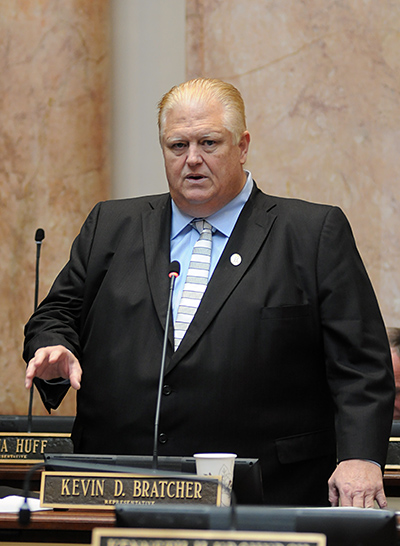
Rep. Kevin D. Bratcher, R-Louisville, presents
House Bill 63 on the House floor on Tuesday. A
high resolution photo is available
here.
FRANKFORT— The
Kentucky House of Representatives approved a
bill Tuesday that seeks to put a school resource
officer (SRO) at every school in the
Commonwealth.
House Bill 63 is a follow up to Senate Bill 1,
or the School Safety and Resiliency Act, from
the 2019 Regular Session. SB 1 required school
districts to assign at least one SRO to each
school in a district as funds and qualified
personnel become available.
Primary sponsor Rep. Kevin D. Bratcher,
R-Louisville, says HB 63 would require schools
who can place a SRO at each school to do so by
Aug. 1. If sufficient funds and qualified
personnel are not available, HB 63 directs the
school district to work with the state school
security marshal at the state Center for School
Safety to address those issues.
“A byproduct of House Bill 63 is that the Safety
Center can keep good statistics on the reasons
why schools cannot achieve the intent of an SRO
on every campus,” Bratcher said.
HB 63 would not provide funding for SROs.
Bratcher said having the statistics on why
school districts are struggling to fund and find
SROs would be the first step in considering
possible future legislation that would
appropriate state funds for SROs.
“We got to know ‘why’ before we fund something,”
Bratcher said. “… House Bill 63 is not an
unfunded mandate. It is just a great new step to
achieve what the original Senate Bill 1 wanted
all the time, and that is safety in our
schools.”
Rep. Jeffery Donohue, D-Fairdale, attempted to
pass a floor amendment to fully fund SROs for
each public school in Kentucky. The amendment
failed.
In speaking against Donohue’s floor amendment,
Bratcher reiterated more research needs to be
done before the General Assembly decides to
fully fund SROs in schools.
Lawmakers debated for an hour on HB 63. Several
lawmakers spoke against the measure, citing
statistics, personal negative experiences with
SROs, and opinions from constituents who are
against SROs in schools.
In explaining her “no” vote on HB 63, Rep.
Attica Scott, D-Louisville, shared she’s heard
from student constituents who have had negative
interactions with SROs. Scott believes the
General Assembly should focus on other ways to
improve school safety.
“We must work to ensure we have stronger
anti-bullying policies, suicide prevention
measures and common sense gun safety measures,
which we, as a body, have failed to address time
and time again,” Scott said. “We should be
prioritizing mental health resources, such as
trained professionals in our schools, not armed
guards.”
Several lawmakers also rose to speak in favor of
HB 63. Many of those in favor of the measure
shared stories of a time a SRO prevented a
violent act at a public school in their
district.
Rep. Samara Heavrin, R-Leitchfield, shared her
positive experiences with SROs at the schools
she attended as a child.
“Truly, I felt safer knowing that an SRO was
there,” Heavrin said. “And not only did they
protect students, but they were also part of our
community. They made relationships and helped
with community relationships.”
HB 63 cleared the House floor by a 78-17 vote.
It will now head to the Senate for
consideration.
END
Feb.
15,
2022
Lawmakers
discuss consumer data protection
FRANKFORT—Legislation that would shore up
consumer data privacy is taking shape in
Kentucky.
On Tuesday, Sen. Whitney Westerfield, R-Crofton,
told members of the Senate Economic Development,
Tourism and Labor Committee that the
commonwealth sorely needs safeguarding measures
for consumers’ digital data.
He is proposing Senate Bill 15, legislation that
would provide basic privacy rights in Kentucky
law and give consumers more control of their
personal data and information. The measure would
also offer more transparency on what data is
collected and shared.
“We’ve got a consumer protection statute or
framework in statute, but it doesn’t carry or
cover the digital space at all,” he said. “And
it doesn’t do anything to provide all of us as
Kentuckians, as people that live and breathe and
work, and operate and do business and live here,
a way to have any control of our data in the
digital space.”
Westerfield worked on a similar measure last
year. Committee members heard testimony on the
legislation Tuesday, but did not take a vote.
Other states, such as Virginia, Vermont,
Connecticut, Illinois, California and Colorado
are among the states where the issue of consumer
data privacy has been addressed at varying
levels, Westerfield said.
He shared real-life examples of how tracking
software on a Kentucky newspaper’s homepage has
been used in the past. He said such software
could gather data on a user’s internet searches
and purchases, where people go to lunch, and
even where a person’s eyes focus on a website.
“That sort of stuff goes on and consumers don’t
know,” Westerfield said.
Offering testimony virtually was Andy Kingman,
General Counsel of the State Privacy and
Security Coalition. In Feb. 2020, some members
of the SPSC included Amazon, Apple, Dropbox,
Google, Pinterest, Verizon, Visa and Walmart,
according to a letter posted online to state
officials in Pennsylvania from the organization.
“Our general viewpoint here is that workable
privacy framework, it’s important to provide
robust and useful protection for consumers,”
Kingman said. “We don’t want consumers to be
overwhelmed. We don’t want them to be frustrated
or to have their intentions frustrated. And we
do feel right now that as drafted, SB 15 is
going to result in those burdens to Kentucky
consumers.”
Kingman said the impacts would make Kentucky
less competitive for small businesses. He added
that the Virginia model is a good one for states
to use, and the coalition supports it.
Sen. Adrienne Southworth, R-Lawrenceburg,
questioned Westerfield about how fees and
compliance costs could affect small businesses
with a website. She asked who would have to pay
the costs.
“It would be the company that’s gathering that
customer data and monetizing it in some way,”
Westerfield replied.
Westerfield said he thinks it’s becoming more
common for small business owners to pay
attention to data that’s gathered about
customers.
“I think in fairness to Mr. Kingman’s remarks, I
think it’s an increasing impact because smaller
businesses are realizing the potential of
collecting that data, to build and learn more
about their customers to grow and add more
customers to it,” he said. “So I think he’s
right that that is something becoming more
attractive to smaller businesses, if not on
their own, then through third parties that want
to sell them those services like you just talked
about.”
Westerfield said he is working on changes to the
bill for this session.
END
Feb. 15,
2022
School bus
stop-arm camera bill clears House committee
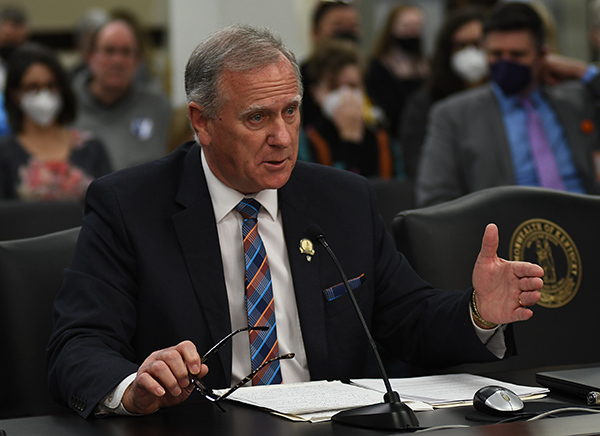
Rep. David Hale, R-Wellington, testifies before
the House Education Committee on Tuesday on
House Bill 221. A high resolution photo is
available
here.
FRANKFORT— A bill
seeking to deter drivers from not stopping while
children are boarding and departing school buses
advanced out of the House Education Committee on
Tuesday.
Under House Bill 221, school districts would be
allowed to install stop-arm cameras on school
buses, and local law enforcement would be
allowed to issue civil penalties for violators.
Similar legislation has been proposed for three
years, and this is second year that Rep. David
Hale, R-Wellington, has sponsored the bill.
“This bill, again, is about safety about some of
the most vulnerable people in our society, and
that is our children that are riding our school
buses to and from school every day,” Hale said.
“It is estimated that there are literally
thousands of violations that happen across the
country and also right here in the state of
Kentucky.”
Hale told the committee that an incident
recently happened outside his home. A neighbor
was departing a school bus when a driver ignored
the bus’s stop arm and flashing lights. The
neighbor’s mother ran out into the street to try
to protect the child. Thankfully, no one was
harmed, Hale said.
“I have no sympathy, and I mean that from the
bottom of my heart, no sympathy for anyone that
would illegally pass a stopped school bus that
is allowing our children to exit that bus or
either to get on,” Hale said.
HB 221 is not a mandate for school districts,
Hale said. The cameras would take a photo of the
violator’s license plate. Hale said he hopes the
civil penalties in the bill will change the
behavior of drivers who pass stopped school
buses.
Under HB 221, violators would be issued a $300
fine on the first offense and a $500 for a
second or subsequent offence within a three-year
period.
During discussion, Rep. Jennifer Decker,
R-Waddy, asked Hale if stop-arm cameras contain
any facial recognition software. Hale said no.
“I want to make sure everyone here understands I
know there’s privacy issues that some people
have... that is not my intent at all,” Hale
said. “This is to protect those children.”
HB 221 will now go before the full House for
consideration.
END
Feb.
11,
2022
This Week at
the State Capitol
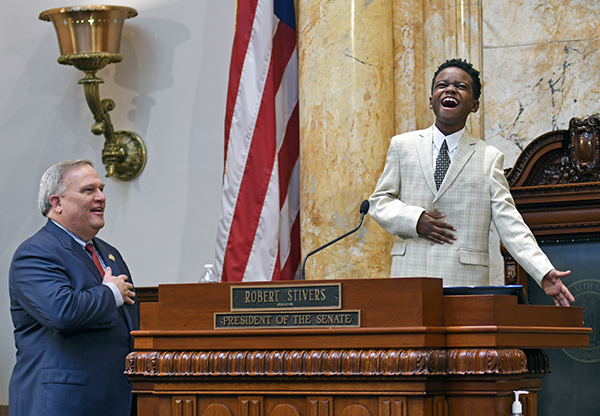
Senate President Robert Stivers, R-Manchester,
listens to 9-year-old D’Corey Johnson sing the
national anthem on the Senate floor. A high
resolution photo is available
here.
FRANKFORT – The
sounds of a legislative session have a flair all
their own – the roll call vote, the crack of the
gavel, the chatter on the chamber floor. During
the sixth week of the 2022 legislative session,
it was the voice of a Louisville fourth grader
that brought all ears to attention.
Nine-year-old D’Corey Johnson kicked off the
annual Black History Celebration on Tuesday with
a rendition of “Lift Every Voice and Sing” that
climbed all 212 feet of the Capitol dome. When
he belted out the national anthem for the
Senate, the normally reserved chamber couldn’t
help but hoot in applause.
The performance was a perfect fit for a busy
week in the General Assembly, which included a
visit from Kentucky Men’s Basketball Coach John
Calipari, a spirited debate on unemployment
benefits, and action on a host of other measures
related education, children, health and taxes.
Education was a key theme at Tuesday’s Black
History Celebration, where legislators
highlighted the importance of historically Black
colleges and universities — particularly
Kentucky State University. The event culminated
with the 2022 Legacy Award, which posthumously
honored state Rep. Darryl Owens.
On Wednesday, the focus turned to Calipari and
University of Kentucky Athletics Director Mitch
Barnhart, who testified in the Senate Education
Committee on behalf of Senate Bill 6.
The bipartisan legislation would provide a
framework in state law for college athletes to
generate personal income off their name, image
and likeness, known as NIL. Calipari and
Barnhart told lawmakers that the proposal would
create both parameters and opportunities while
also protecting the interests of athletes.
SB 6 cleared the full Senate on Thursday and now
heads to the House, where lawmakers spent much
of Thursday afternoon in deliberations on
unemployment.
House Bill 4 seeks to change the duration of
unemployment insurance based on the average rate
of unemployment across the Commonwealth. The
bill would also require participants to engage
in at least five verifiable work search
activities each week to obtain benefits.
Proponents said the measure is sorely needed to
address workforce shortages and attract more
jobs to the state. Critics, however, argued that
the legislation would disproportionately impact
rural areas of Kentucky where unemployment is
highest.
The bill passed off the floor after several
hours of debate and now heads to the Senate.
Lawmakers maintained a quick pace throughout the
week, both in committee and on the House and
Senate floors. The General Assembly advanced
measures related to:
The Read to
Succeed Act — House Bill 226
seeks to invest in improving early literacy
education through evidence based learning
techniques and intensive interventions that can
help struggling students catch up. It won
approval in the House on Monday and serves as a
companion bill to a measure in the Senate.
Child abuse
— Senate Bill 97, which aims to strengthen
investigations of suspicious child deaths and
serious injuries, received approval in the
Senate on Monday. Among many goals, it would
require police to request a blood, breath or
urine test from the child’s custodian if that
person is suspected of being under the influence
at the time of the child’s death.
Another measure, House Bill 263, would increase
the penalty for first-degree criminal abuse to a
Class B felony if the victim is under 12 years
old. It cleared the House Judiciary Committee
on Wednesday with unanimous support.
Vehicle taxes
— House Bill 6 would require
property valuation administrators to tax vehicle
owners in 2022 the same as they did 2021.
Beginning next year, the bill would also require
them to use the average trade-in value rather
than the “rough” trade-in value or “clean”
trade-in value when assessing taxes. HB 6
cleared the House with a unanimous vote on
Wednesday.
First responders
— Senate Bill 101 would prohibit first
responders from taking photos of people who have
died at the scene of an accident or crime unless
the photos are for official purposes. Any
unauthorized photos could result in a Class A
misdemeanor, with fines ranging between $500 to
$2,500. The Senate approved the bill Wednesday.
COVID-19
— Senate Joint Resolution 80 would recognize
natural immunity against COVID-19 as equivalent
to being vaccinated — if the state were to
implement vaccine mandates. Individuals who are
unvaccinated would need to demonstrate the
presence of COVID-19 antibodies through a
serology test. The measure cleared the Senate
Health and Welfare Committee on Wednesday.
School sports
— Senate Bill 83, known as the “Save Women’s
Sports Act,” calls for administrative
regulations that would prohibit biologically
male students from participating in athletic
activities designated for girls. It moved out of
the Senate Education Committee on Thursday.
The halfway point of the 2022 session is drawing
near, and the House and Senate are scheduled to
reconvene on Monday for day 28 of the 60-day
session.
Kentuckians have many ways to keep in touch with
the legislative process. That includes the
Legislative Record webpage, which allows users
to review and track a bill’s progression through
the chambers.
Citizens can also share their views on issues
with lawmakers by calling the General Assembly’s
toll-free message line at 1-800-372-7181.
END
Feb.
11,
2022
Vehicle owners
could receive a tax break under Senate
resolution
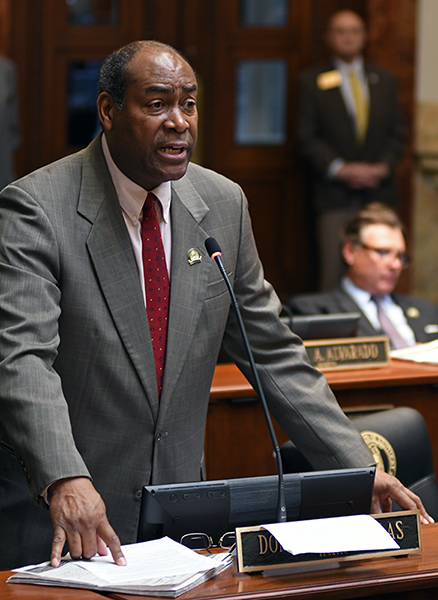
Sen. Donald Douglas, R-Nicholasville, testifies
on Senate Joint Resolution 99, which would
direct state officials to hold vehicle
valuations to 2021 levels. A high resolution
photo is available
here.
FRANKFORT— Vehicle
owners in Kentucky could receive up to $70
million in tax relief under a measure that won
unanimous support on the Senate floor Friday.
Senate Joint Resolution 99 would direct state
officials to assess taxes on vehicles using
valuations from 2021 for the next two years. It
also calls on the state Department of Revenue to
issue refunds for taxes that have already been
paid based on current year assessments.
The resolution’s primary sponsor, Sen. Donald
Douglas, R-Nicholasville, said the proposal
would help Kentuckians cope with the
once-in-a-lifetime jump in vehicle values that
occurred during the pandemic.
“This would bring tax relief to Kentucky vehicle
owners, to our job creators in the automobile
industry as well as to people who own fleets of
vehicles,” he said.
Douglas said Kentucky taxpayers are facing
financial challenges and it’s incumbent on the
legislature to require changes.
“Typically, vehicle values go down from year to
year,” he said. “But the director of state
valuation said …that overall in 2022 these
valuations have increased. And compared to
previous years, it is up approximately 40
percent.”
Sen. Jimmy Higdon, R-Lebanon, also spoke on
behalf of the bill.
“You know, probably every member of this chamber
has received phone calls from back home in their
district about this situation,” he said.
Sen. Robin L. Webb, D-Grayson, called it a
bipartisan effort.
“This issue is so important that the House and
the Senate have both addressed it at the same
time. It was one of the first things that we
did, and you can see that by the bill numbers
and the importance of that,” she said.
The measure passed with a 34-0 vote Friday.
END
Feb. 11,
2022
House bill
addressing raises for Kentucky State Police
advances
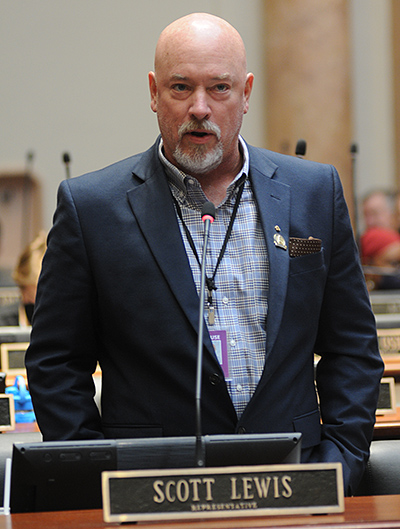
Rep. Scott Lewis, R-Hartford, presents House
Bill 259 on the House floor on Friday. A high
resolution photo is available
here.
FRANKFORT— A busy
week in Frankfort concluded Friday with the
Kentucky House of Representatives advancing a
bill that will give most Kentucky State Police
troopers raises.
House Bill 259 was approved by an 87-2 vote. The
measure would permanently codify the salary
increases allocated in House Bill 1, the
proposed executive branch budget, for state
police troopers and commercial vehicle
enforcement officers.
Primary sponsor Rep. Scott Lewis, R-Hartford,
said the bill ensures a $15,000 pay increase for
troopers ranked below sergeant and a 10% pay
raise for troopers ranked at and above sergeant.
“House Bill 1 and House Bill 259 would increase
the starting pay of KSP troopers from the
current $40,898 per year to $55,888 per year,
making KSP the top five law enforcement agency
when compared to other departments across our
Commonwealth,” Lewis said.
Rep. Chris Fugate, R-Chavies, a retired KSP
trooper, is also a co-sponsor of the bill. He
said HB 259 would be “life changing” for
troopers and the agency.
“We are allowed to have 1,150 troopers, and we
are all the way down to 750,” Fugate said. “This
will help in recruitment and retention.”
Rep. Susan Westrom, D-Lexington, said HB 259 is
a “wonderful” bill, but she would like to see
raises for teachers, social workers and judicial
branch staff.
“If we can find the dollars for this, I hope we
can find the dollars for them,” Westrom said.
Rep. Jim DuPlessis, R-Elizabethtown, also spoke
on the House floor in favor of HB 259 while
advocating for a different group of state
employees to receive a raise: the state police
officers who protect the state Capitol building.
“The state troopers who protect this Capitol are
not part of this, and I like to think that maybe
we can add them down at the Senate and bring it
back here to have them get a raise as well,”
DuPlessis said.
HB 259 will now go before the Senate for
consideration.
END
Feb.
10,
2022
Senate bill
would require genetic testing in some deaths of
young people
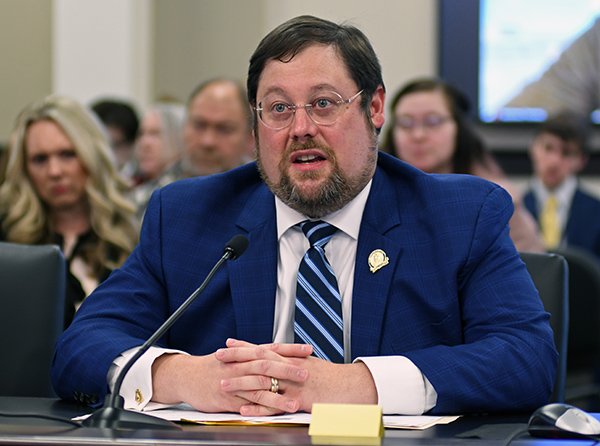
Sen. Phillip Wheeler, R-Pikeville, testifies on
Senate Bill 80, which would require genetic
testing in some postmortem examinations of young
people. A high resolution photo is available
here.
FRANKFORT—Legislation that would require genetic
testing when a young person dies inexplicably
received approval Thursday from the Senate
Judiciary Committee.
“Senate Bill 80 is essentially an attempt not
only to bring closure to families who have
suffered the death of a young loved one, but as
well as an effort to give them certain
information that might in fact save lives,” said
the bill’s sponsor, Sen. Phillip Wheeler,
R-Pikeville.
The legislation calls for the state medical
examiner’s office to conduct a genetic test when
a postmortem examination of someone under 40
does not determine the cause of death. If the
genetic test reveals a cause, coroners must note
that information on the death certificate.
Wheeler introduced committee members to Tracy
Fletcher, whose daughter passed away in 2018
from a cause that remained unknown until two
years later.
“Shantell was
a 19-year-old, full of life, young lady, very
athletic all through school,” Fletcher said.
“Loved her car. She was a car enthusiast. She
worked on that car many hours to get it where
she had it. Loved to be beautiful, but yet she
was a tomboy.”
Fletcher recalled the terrible time when her
daughter was found unresponsive.
“There was no one there that night to help
her…No one can find anything that night. There
was no evidence. They just said she looked like
she laid down to sleep. She was a beautiful
little girl,” she said.
Losing a child at a young age and not
understanding why can be exacerbate the grief,
Fletcher said. The autopsy results came back as
undetermined, and Fletcher, a nurse, said she
tried to understand what happened by searching
online.
“As a parent, to not know what happened to your
child at the age of 19, it’s not just
devastating you lost them, but it’s the what-ifs
that can drive you insane. And we went through a
lot of the what-ifs,” Fletcher said.
Not only could the legislation help families
find answers to heart-wrenching questions about
their loved ones, but also it could inform
surviving family members of possible health
problems they might encounter themselves.
Once it was determined her daughter passed away
from a genetic disorder, Fletcher consulted a
cardiologist and he referred her to the
University of Virginia. That’s where the family
ended up getting cardiac workups.
At the university, they met Matthew Thomas, a
pediatric genetic counselor. Thomas testified to
the committee virtually and answered a question
from Sen. John Schickel, R-Union, about the
possibility of opting out of the genetic
testing.
“In my experience, medical examiners generally
have the responsibility of investigating what
the cause of death is, and there’s not a regular
communication with families about what they want
to opt in and out of,” he said. “That certainly
can be something that’s considered, but in this
situation, the purpose of the testing is to find
out why somebody died and protect the family
from that ever happening again.”
Wheeler said there is no opt-out option in the
bill, but he would not mind adding one.
The bill is also known as the Micah Shantell
Fletcher Law.
END
Feb. 10,
2022
House approves
unemployment insurance reform bill
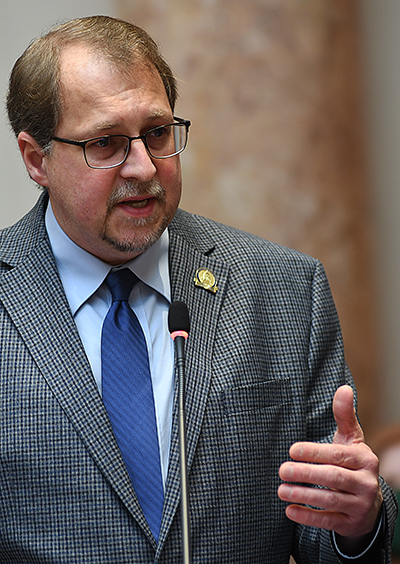
Rep. Russell Webber, R-Shepherdsville, presents
House Bill 4 on the House floor on Thursday. A
high resolution photo is available
here.
FRANKFORT— A bill
aimed at changing the length of unemployment
insurance benefits and the job search
requirements for recipients cleared the Kentucky
House of Representatives on Thursday.
After several hours of debate, House Bill 4 was
approved by a 57-37 vote.
The bill’s primary sponsor, Rep. Russell Webber,
R-Shepherdsville, said the bill is not intended
to solve all of the unemployment and workforce
participation issues facing the Commonwealth,
but it is an “important first step.”
“Right now, 47% of the working age population in
Kentucky is not working, so we have 53% of our
working age population that is actively
working,” Russell said. “… We cannot be known as
a state without workers or a state that is short
on workers.”
Under HB 4, the duration of unemployment
insurance benefits will be based upon the state
average unemployment rate. One provision of the
bill says if the state average unemployment rate
is less than 4.5%, benefits may last for up to
12 weeks. Under current statute, unemployment
insurance benefits may last up to 26 weeks.
The bill would also require recipients to engage
in at least five verifiable work search
activities a week with at least three of those
activities being applying for a job,
interviewing for employment or job shadowing.
Another provision of HB 4 would give recipients
an additional five weeks of eligibility if he or
she is enrolled in an approved job training or
certification program.
“This is a great opportunity, and it helps
Kentuckians,” Webber said.
Webber also assured his colleagues that this
bill would not hurt seasonal workers or those
impacted by the Western Kentucky tornadoes.
Several lawmakers, however, expressed fears that
HB 4 would hurt rural communities.
Rep. John Blanton, R-Salyersville, said he
believes HB 4 would be “devastating” to the
people in his district, where jobs are hard to
find and many people commute up to two hours
away from home in order to work.
Blanton attempted to pass a floor amendment that
would change several things about Webber’s
original bill, such as keeping the maximum
length of benefits at 26 weeks; however the
amendment failed.
“You see, people drawing unemployment insurance
are people who want to work and have been
working, but now we’re going to go after them?”
Blanton said. “… I would think if we want to
solve our workforce participation problem, we
would go after that 53,000 that’s not working
rather than those 18,000 that are out of work
but are willing to work.”
Rep. Norma Kirk-McCormick, R-Inez, agreed with
Blanton, saying the bill is “super bad” for her
district.
Rep. Al Gentry, D-Louisville, also agreed that
the bill would hurt rural communities. Gentry
made a motion to postpone voting on HB 4, but
his motion failed.
Several other lawmakers joined their colleagues
in speaking against HB 4. Minority Floor Leader
Joni L. Jenkins, D-Shively, said she worries
about the burden the bill would place on the
state unemployment office, which is currently
understaffed.
Rep. Josh Bray, R-Mount Vernon, however, said he
believes HB 4 is a “step in the right
direction.”
“If you want to bring jobs to Eastern Kentucky,
we have to improve our workforce participation
rate,” Bray said.
Rep. Phillip Pratt, R-Georgetown, a small
business owner, joined in supporting HB 4. Rep.
Jason Nemes, R-Louisville, also spoke in support
of HB 4, calling it a “good bill.”
HB 4 will now go before the Senate for
consideration.
END
Feb. 10,
2022
Bill extending
Medicaid coverage for postpartum women clears
House committee
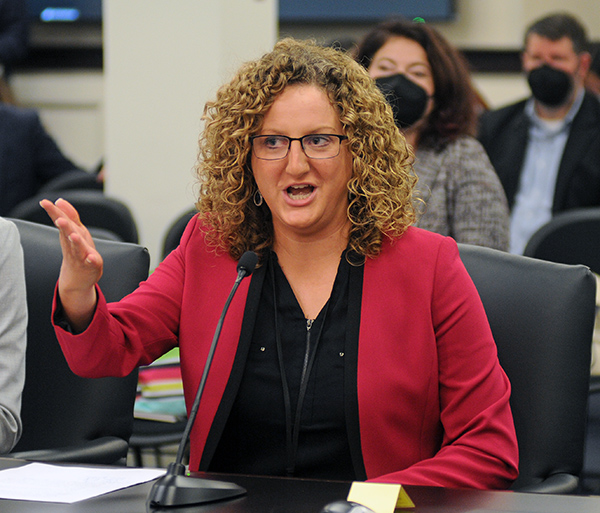
Rep. McKenzie Cantrell, D-Louisville, testifies
on House Bill 174 in the House Health and
Welfare Committee on Wednesday. A high
resolution photo is available
here.
FRANKFORT— The
House Health and Family Services Committee
approved a bipartisan initiative Thursday to
improve maternal health.
House Bill 174 would give Medicaid coverage to
eligible new mothers for up to 12 months
postpartum. The primary sponsors of the bill are
Rep. McKenzie Cantrell, D-Louisville, and
Committee Chair Rep. Kimberly Poore Moser,
R-Taylor Mill.
Cantrell said although the bill is only seven
words, it will have a big impact for mothers
across the state.
“The only part (of the bill) being amended is
extending that coverage so mothers can stay
healthy with their newborns for up to 12
months,” Cantrell added.
Moser shared with the committee that Kentucky’s
high maternal mortality rate is what inspired
she and Cantrell to propose the bill.
“Kentucky is one of the highest, and there are a
lot of factors, but this will really help a
population who often sees health care
disparities get the care that they need,” Moser
said.
Christina Libby, the health outreach navigator
for the Homeless and Housing Coalition of
Kentucky, also testified in favor of HB 174. She
shared with the committee that she struggled
with several medical issues, including
postpartum depression, after the birth of her
second child, and she was grateful to have
health insurance.
Libby said that HB 174 would also have a
positive impact on Kentucky’s children.
“The effect on the children raised by healthy
and functioning mothers would have a ripple
effect throughout the Commonwealth,” she said.
The measure
cleared the House Health and Family Services
Committee unanimously. HB 174 will now go before
the full House for consideration.
END
Feb. 9,
2022
Senate bill
would clarify NIL opportunities for college
athletes
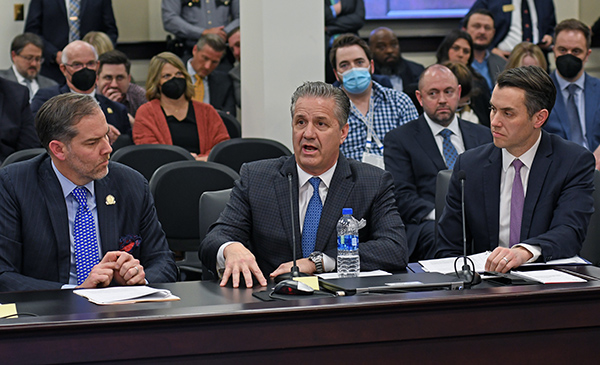
Sen. Max Wise, R-Campbellsville, (left); and
Senate Minority Floor Leader Morgan McGarvey,
D-Louisville (right), listen as John Calipari,
University of Kentucky men’s basketball coach,
speaks on behalf of Senate Bill 6
FRANKFORT—Legislation moving in the Kentucky
Senate on Wednesday would provide a framework in
state law for college athletes to generate
personal income off their name, image and
likeness, known as NIL.
Questions over student NIL rights have been
brewing since June, when the U.S. Supreme Court
called for changes in the NCAA. Many college
athletes in Kentucky have been operating under
an executive order related to NIL since July.
But Senate Bill 6 would provide more concrete
parameters in state law about what Kentucky
college athletes can and can’t do.
On Wednesday, the Senate Education Committee
heard from John Calipari, University of Kentucky
men’s basketball coach, and UK Athletics
Director Mitch Barnhart, who both offered
support for the bill. It later cleared the
committee with unanimous approval.
The bill’s primary sponsor, Sen. Max Wise,
R-Campbellsville, said the legislation would
weave a thread of flexibility and balance for
schools and student athletes.
“There are a lot of reasons why we’re here
today, but one of the reasons we look at is the
history and the past of the NCAA, and for them
not being active in taking action on an issue
such as this,” he said.
Calipari said the landscape of NIL continues to
evolve, and he thanked the many people who have
contributed to legislation.
“Today we’re met with an opportunity to address
this evolving issue as the needs and demands of
my players have changed. I’m confident with your
interests as well as mine. We will share in
creating the best opportunities for players
while at the same time allowing men’s basketball
at UK to remain the gold standard,” Calipari
said.
Barnhart agreed with Calipari that NIL issues
continue to change. He said the UK athletics
department has over 800 transactions on file
from about 250 student athletes.
“We’re seven months into this, and we know so
little about it. We know a lot about it on one
hand, and we don’t know where it goes from
here,” he said. “And I think this bill gives
flexibility to the growth in that place.”
Not every student has the desire to participate
in NIL, but for those who do, it’s important to
protect them, Barnhart said. He pointed to Masai
Russell, a track and field student athlete and
senior at UK who has worked hard to promote her
brand and identity.
“It is remarkable what she has done, the way she
works at it every day to do the things she does
with social media, and she has probably I’m
guessing has 300-to-350,000 followers in what
she does. It’s pretty remarkable,” he said.
Senate Minority Floor Leader Morgan McGarvey,
D-Louisville, is co-sponsoring SB 6. He said
Wednesday was not the first time lawmakers had
considered the bill.
“We’re here today to make sure that that
executive order doesn’t go away and to continue
to improve upon the process as we’re all
learning what this new environment of name,
image and likeness is,” McGarvey said.
NIL is not paying student athletes to play their
sports, and it does not allow a university or
its athletics department to compensate student
athletes beyond the scholarship and already
permissible educational benefits, he said.
McGarvey likened it to student musicians giving
lessons on YouTube or student artists who sell
paintings.
“You can work at your craft. You can promote
yourself,” he said.
The bill now heads to the full Senate for
consideration.
END
Feb.
9,
2022
Resolution
would recognize antibody test as equivalent to
being vaccinated
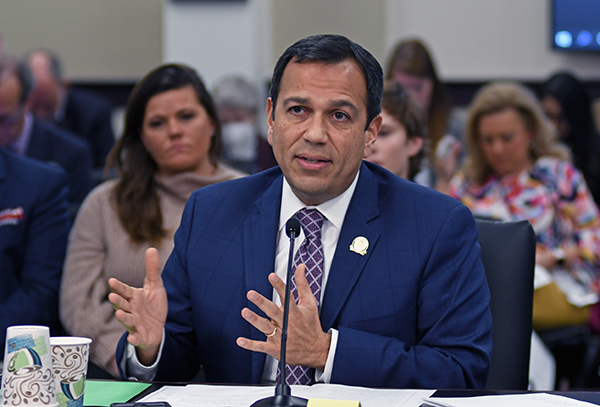
Sen. Ralph Alvarado, R-Winchester, speaks on
Senate Joint Resolution 80, which would
recognize a positive COVID-19 antibody test as
equivalent to having been vaccinated. A high
resolution photo is available
here.
FRANKFORT— The
Senate Health and Welfare Committee advanced a
measure Wednesday that – in the event of any
state vaccination mandates – would recognize
natural immunity against COVID-19 as equivalent
to being vaccinated.
Senate Joint Resolution 80 would cover
individuals who, while unvaccinated, produce
enough neutralizing antibodies to counter
COVID-19 and can demonstrate the antibodies
through a serology test.
The resolution would not apply to federal
mandates or private businesses that might
implement their own vaccine requirements.
“We’ve had more and more studies coming out to
the point now that we even have international
governments that have begun to recognize this as
being equal to having been vaccinated,” said
Sen. Ralph Alvarado, R-Winchester, who is
sponsoring the resolution.
SJR 80 cleared the committee with 8-2 vote and
now heads to the full Senate. If adopted, the
provisions would remain in effect until Jan. 31,
2023
Alvarado, a physician who serves as chair of the
committee, said there are various reasons why
some of his constituents have not been
vaccinated, and he has heard from many of them.
Some are physicians and nurses who have already
contracted COVID-19, he said.
Alvarado said he reviewed briefs by Johns
Hopkins University, the World Health
Organization and an original white paper from
Australia regarding natural immunity and
vaccination.
Several countries in Europe require travelers to
have proof of vaccination, but also recognize
proof of a previous infection that produces an
equivalent antibody response, he said. Some of
the applicable countries he named include
Finland, Austria, Denmark and Germany.
“I think it’s time for the state to be able to
recognize, as many international governments
have, to start recognizing people that have a
measurable antibody response,” he said.
The measure was met with opposition from Sen.
Karen Berg, D-Louisville, who is also a
physician and voted against the resolution. She
said the data is still coming out, and that
leading health officials are not recommending
the resolution’s approach at this time.
“My understanding is the only mandates for
vaccination in the state right now would be for
health care workers and private employers,” she
said. “I don’t think the state, and somebody
please correct me if I am wrong, is requiring
any vaccinations at this point. So no, I do not
see the purpose of this. It is not good
science."
END
Feb. 9,
2022
House approves
bill to slap down 'swatting'
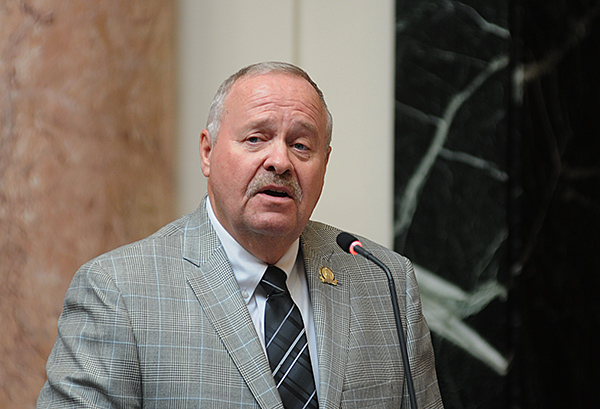
Rep. Phillip Pratt, R-Georgetown, testifies on
House Bill 48, the "anti-swatting" bill on the
House floor on Wednesday. A high
resolution photo is available
here.
FRANKFORT— The
Kentucky House of Representatives approved a
bill on Wednesday that would make false 911
calls that result in an emergency response a
felony.
Current statute already makes falsely reporting
an incident a Class A misdemeanor. House Bill
48, also known as the “anti-swatting bill,”
would make falsely reporting an incident that
results in an emergency response a Class D
felony.
Rep. Phillip Pratt, R-Georgetown, said Scott
County has had at least 10 “swatting” incidences
within the last year.
Sometimes these fake 911 calls are pranks, and
sometimes the calls are used as revenge, Pratt
added. It isn’t uncommon for someone to be
“swatted” by someone they do not know who lives
in another state.
Being “swatted” can be an extremely traumatic
and sometimes deadly event for the victim.
“There was a gentlemen in Tennessee who owned a
Twitter (handle) @Tennessee. Another gentleman
wanted it and he would not give it up. He
‘swatted’ him,” Pratt said. “He came out to his
yard with all the SWAT team and everybody out
there and died of a massive heart attack.”
In commenting on the bill, Rep. Mary Lou
Marzian, D-Louisville, said she believes the
bill has good intentions, but is not in favor of
adding another felony to statute.
“It certainly is criminal to call 911 when you
don’t need it, but I think this needs to be an
educational aspect rather than another felony,”
Marzian said. “We have so many felons locked up
already… I’d never heard of (‘swatting’), but it
can’t be that many that we need to pass another
felony.”
The House approved HB 48 by an 86-7 vote. It
will now go before the Senate for consideration.
“These (calls) put people’s lives in danger
every day,” Pratt said.
END
Feb. 9,
2022
'Kami's Law'
clears House Judiciary Committee
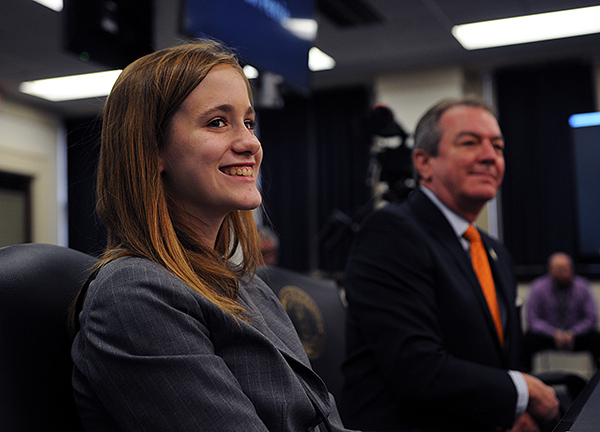
Kiera Dunk, 12, sits next to House Speaker
David. W. Osborne, R-Prospect, as they testify
on House Bill 263 in the House Judiciary
Committee. A high resolution photo is
available
here.
FRANKFORT—
Children are the future.
That sentiment was clear on Wednesday when
12-year-old Kiera Dunk testified during the
House Judiciary Committee meeting on a bill to
increase the penalty for first-degree criminal
abuse to a Class B felony if the victim is under
12 years old.
Last summer, Kiera met with House Speaker David
W. Osborne, R-Prospect, to begin working on
House Bill 263.
Committee Chair Rep. C. Ed Massey, R-Hebron, and
Osborne are the primary sponsors of the bill,
which is named Kami’s Law after one of Kiera’s
friends. Kami is a Kentuckian and child abuse
survivor.
“Kami was a
beautiful 9-month-old baby when her life was
forever changed when the man responsible for her
safety shook her so violently that she was
clinically dead for 23 minutes,” Kiera said.
“Kami survived, but due to trauma only half of
her brain remains.”
Current statute makes first-degree criminal
abuse a Class C felony. Sometimes those accused
of first-degree criminal abuse are given an
opportunity to accept a plea deal for a lesser
sentence. When this happens, he or she does not
end up on Kentucky Caregiver Misconduct and
Kentucky Child Abuse registries, Kiera added.
Kami’s Law would change that.
“One of the two reasons for bringing this (bill)
is to make sure that raising (the penalty) or
elevating it to the Class B level makes it a
violent crime, which should be subject to
registration,” Massey said, adding that violent
offenders are also required to serve at least
85% of his or her sentence.
Kiera said under current statute, Kami’s abuser
was only sentenced to five years in prison and
was released from prison early.
“Kentucky has the highest child abuse rates in
the nation,” Kiera said. “We need change.”
During discussion of the bill, Rep. John
Blanton, R-Salyersville, shared data with the
committee that shows within the last two years
there’s been a 50% increase in children dying at
the hands of their caregivers in Kentucky.
The House Judiciary Committee unanimously
approved HB 263. The bill will now go before the
full House for consideration.
END
Feb. 8,
2022
House
committee advances motor vehicle tax bill
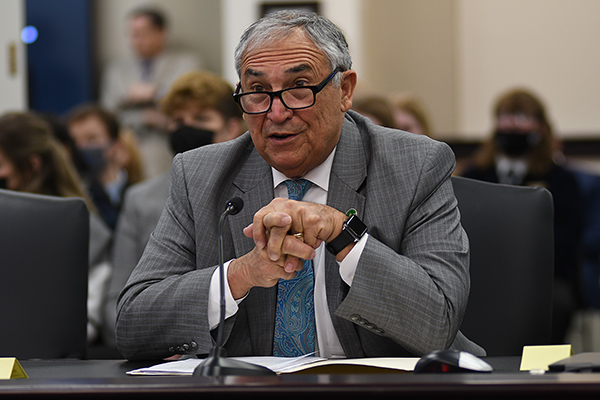
Rep. Sal Santoro, R-Union, testifies on House
Bill 6 in the House Appropriations and Revenue
Committee on Tuesday. A high resolution photo is
available
here.
FRANKFORT—
Kentuckians may soon get a break on their motor
vehicle taxes.
The House Appropriations and Revenue approved
House Bill 6 on Tuesday. The bill would require
that property valuation administrators tax
vehicle owners the same as they did 2021.
“House Bill 6 follows concerns from my
constituents regarding a letter that they
received from the executive branch stating that
their motor vehicle appraiser values would be
increasing by 40% in 2022 compared to 2021,”
said Rep. Sal Santoro, R-Union, the primary
sponsor of the bill.
Beginning in 2023, HB 6 would require the
average trade-in value to be used as the
standard value of a motor vehicle for property
tax purposes instead of the rough trade-in value
or clean trade-in value.
Santoro said the executive branch adopted a
policy in 2009 that allowed the clean trade-in
be used in assessing motor vehicle property
taxes. This, in conjunction with the current
motor vehicle market, has caused motor vehicle
property taxes to skyrocket.
Commenting on the bill, Rep. Angie Hatton,
D-Whitesburg, said someone she knows learned
that the vehicle they purchased a year ago is
now worth thousands more than what they
originally paid for it.
HB 6 would apply to motor vehicles assessed on
or after Jan. 1, and it contains an emergency
clause meaning it would go into effect
immediately upon becoming law, Santoro said. The
bill would also provide a way for Kentuckians to
receive a refund if they’ve overpaid their taxes
for this year.
The House Appropriations and Revenue Committee
unanimously approved HB 6. It will now go before
the full House for consideration.
Rep. Jason Nemes, R-Louisville, said this is the
number one issue constituents have been calling
him about this legislative session.
“We’ve got to make sure we protect the taxpayers
here,” Nemes said. “This is something that’s
coming that’s not their fault, and we need to
make sure that we protect them.”
END
Feb. 7,
2022
House approves
'Read to Succeed Act'
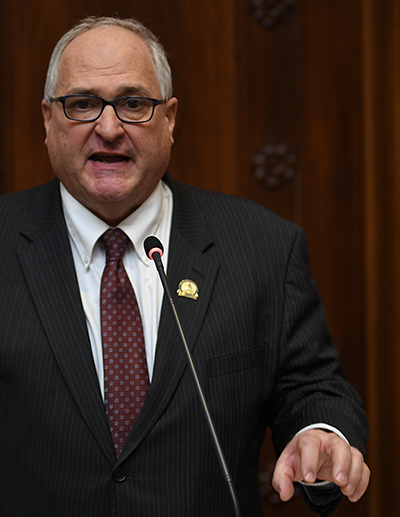
Rep. James Tipton, R-Taylorsville, speaks on
House Bill 226, the Read to Succeed Act, on the
House floor on Monday. A high resolution
photo is available
here.
FRANKFORT�— A
bipartisan initiative to improve early literacy
in the Commonwealth cleared the Kentucky House
of Representatives on Monday.
House Bill 226, otherwise known as the Read to
Succeed Act, seeks to invest in improving early
literacy education among kindergarten through
third grade students by implementing evidence
based learning techniques and intensive
intervention methods to help struggling students
catch up.
Evidence-based reading instruction would
emphasize phonemic awareness, phonics, fluency,
vocabulary and comprehension.
The House approved the measure by an 86-7 vote
on Monday. The Kentucky Senate approved Senate
Bill 9, the companion bill, by a 28-7 vote on
Jan. 19.
Rep. James Tipton, R-Taylorsville, and Rep. Tina
Bojanowski, D-Louisville, serve as the bill’s
primary sponsors in the House.
On the House floor, Tipton said test scores from
the last several years show that Kentucky’s
children are struggling to learn how to read and
the pandemic has made the problem worse.
Citing Kentucky Performance Rating for
Educational Progress (K-PREP) data, Tipton said
only 52.7% of third-graders scored “proficient”
or “distinguished” in reading in 2019. In 2021,
that number dropped to 29.8%.
“One of the most disturbing correlations I’m
aware of is there is actually a correlation
between that reading proficiency score and
incarceration,” Tipton said.
Under HB 226, kindergarten through third grade
students who need help will undergo intensive
intervention and enrichment that best suits that
student’s needs in order to improve his or her
reading skills, Tipton said.
Tipton said House Bill 1, the proposed executive
branch budget, would allocate a total of $22
million toward this project, and the Kentucky
Department of Education (KDE) plans to invest
$10 million in federal American Rescue Plan Act
dollars as well. HB 1 is now before the Senate
for consideration.
HB 226 would also establish a professional
development program to educate teachers on how
to implement evidence-based learning instruction
and intervention techniques. Bojanowski, who is
an educator, said the training would be optional
for teachers and not mandated.
“Every student should have teachers who have the
most comprehensive training possible,”
Bojanowski said. “This bill would appropriate,
and through KDE, $32 million to helping teachers
be better prepared to teach reading. I plan on
the first day that the link is available to
register for the training.”
Due to a few changes made to the companion bill
in the House, it will now go before the full
Senate for concurrence.
If the Senate agrees with the changes, the
measure will be sent to the governor’s desk for
his signature or veto.
END
Feb. 4,
2022
This Week at
the State Capitol
b.jpg)
FRANKFORT— Despite
losing a day to ice and snow, the Kentucky
General Assembly continued to plow through bills
this week, including three measures focused on
first responders and several others related to
education, criminal justice and parental rights.
Under threat of winter weather, lawmakers closed
out the fifth week of the 2022 legislative
session on Thursday afternoon as road conditions
began to decline across the Commonwealth.
But just as first responders are working in
concert this weekend to battle the icy
conditions, legislators were largely united this
week in efforts to “protect those who protect
us.”
Before gaveling out on Thursday, the House
unanimously approved House Bill 56, a measure
that would provide death benefits when a first
responder dies in the line of duty from
COVID-19. In such cases, families of first
responders would receive a one-time, lump-sum
payment of $80,000.
HB 56 is
retroactive, meaning any first responders who
have died due to COVID-19 complications since
March 6, 2020, would qualify.
The measure now heads to the Senate, where
lawmakers have advanced a separate bill to boost
mental health for public safety employees.
Senate Bill 64 would protect the confidentiality
of first responders who participate in peer
support counseling programs. Supporters say the
bill would benefit thousands of public safety
workers who frequently experience trauma on the
job but could face repercussions from frank
discussions in counseling.
The bill received unanimous approval Tuesday on
the Senate floor and now heads to the House.
A third measure related to first responders
cleared the Senate Judiciary Committee this
week; however, it focuses on curtailing
misconduct.
Senate Bill 101 would prohibit first responders
from taking photos of people who have died at
scene of an accident or crime––unless the photos
are for official purposes. Any unauthorized
photos could result in a class A misdemeanor
charge, with fines ranging between $500 to
$2,500. The measure will now go to the full
Senate.
Even with the short week, dozens of other bills
continued to move forward in the legislature,
including measures related to:
The Read to
Succeed Act – The House
Appropriations and Revenue Committee approved
House Bill 226, or the Read to Succeed Act, on
Tuesday. The legislation is a companion piece to
a bill in the Senate and would allocate millions
toward training teachers in early literacy
instruction.
Porch pirates
– Senate Bill 23 seeks to crack down on people
who steal packages delivered through commercial
carriers like Amazon or FedEx. The bill would
make it a class D felony to steal or destroy
such packages, mirroring the penalties for
stealing U.S. mail. The measure cleared the
Senate on Wednesday.
School board
meetings – Under House Bill 121,
public school boards would have to allow for at
least 15 minutes of public comment at meetings,
unless no one has signed up to speak. The bill
advanced off the House floor on Wednesday.
False police
reports – House Bill 48 would
make falsely reporting an incident to police
that results in an emergency response a class D
felony. The bill was approved by the House
Judiciary Committee on Wednesday.
Child abuse
– Senate Bill 97 would help strengthen
investigations of suspicious child deaths and
serious injuries. The legislation would require
police to request a blood, breath or urine test
from the child’s custodian if that person is
suspected of being under the influence at the
time of the child’s death. It would also mandate
that coroners immediately notify law enforcement
officials and social services following the
death of a child. The Senate Health and Welfare
Committee approved the measure Wednesday.
Parental rights
– Senate Bill 40 states that legal custodians of
a minor child have a “fundamental right to make
decisions concerning their care, custody and
control.” It would also require government
agencies to meet a strict scrutiny standard
before interfering with the rights of a parent
or legal custodian. The bill moved out of the
Senate Judiciary Committee on Thursday.
The House and Senate are scheduled to reconvene
Monday for the 23rd day of the 60-day session,
and Kentuckians have many ways to keep in touch
with the legislative process. That includes the
Legislative Record webpage, which allows users
to review and track a bill’s progression through
the chambers.
Citizens can also share their views on issues
with lawmakers by calling the General Assembly’s
toll-free message line at 1-800-372-7181.
END
Feb.
2,
2022
Senate bill
would offer second chances for those with
enhanced misdemeanors
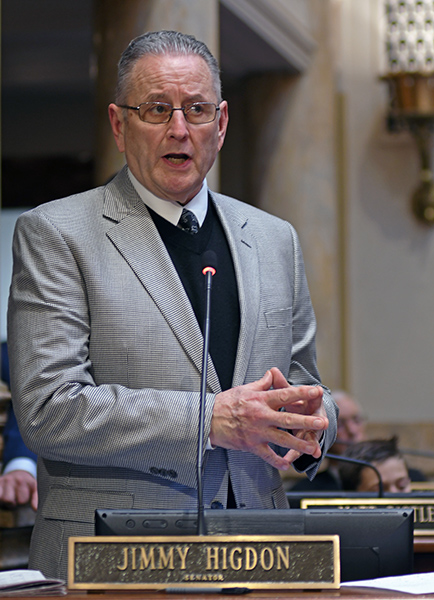
Sen. Jimmy Higdon, R-Lebanon, speaks on Senate
Bill 33, which would allow expungement of
enhanced misdemeanors. A high resolution photo
is available
here.
FRANKFORT—Sometimes second chances are hard to
come by. Senate Bill 33 would make it possible
for people convicted of enhanceable misdemeanors
to clear their records if they have remained
law-abiding for a long enough time.
Right now, Kentucky law allows expungement of
many misdemeanors as long as the offense was not
a sex crime or an offense committed against a
child. However, about 180 misdemeanors are not
eligible if they can be enhanced by a subsequent
offense, and the enhancement period does not
expire.
Senate Bill 33, sponsored by Sen. Jimmy Higdon,
R-Lebanon, would change that. It would amend
state statute to allow expungement for
enhanceable misdemeanors after a period of five
to ten years, depending on the crime. The bill
was approved on the Senate floor with a 32-4
vote on Wednesday.
Sen. Danny Carroll, R-Benton, expressed some
misgivings about expungement overall. But, he
also said he believes in second chances and that
the test of time is a good measure in some
situations involving crime.
“In this particular situation with a misdemeanor
crime, even though it is enhanceable to a
felony, if someone goes ten years without having
been convicted of a crime, I would say the odds
of them committing or being convicted of a crime
after that are very, very slim,” he said.
Sen. Gerald A. Neal, D-Louisville, spoke in
support of the legislation.
“I want to commend the sponsor of this
legislation because of its reasonableness and
it’s a responsible piece of legislation. I’m
glad it’s getting the overwhelming support of
this body,” he said.
END
Feb.
2,
2022
Senate
committee advances bill to strengthen cases
against child abusers
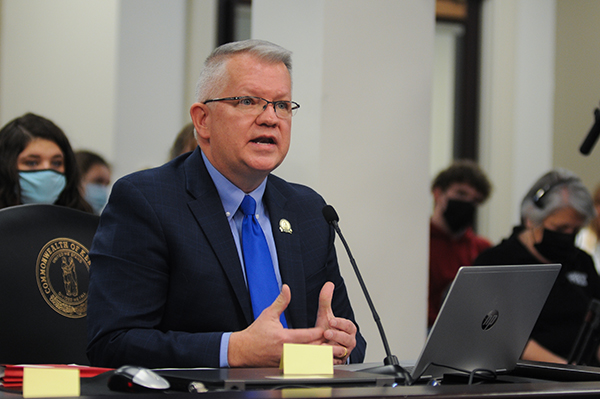
Sen. Danny Carroll, R-Benton, speaks on Senate
Bill 97, which would help strengthen cases
against child abusers. A high resolution photo
is available
here.
FRANKFORT— The
Senate Health and Welfare Committee approved a
measure Wednesday – Senate Bill 97 – that would
help strengthen cases against child abusers in
the event of suspicious deaths and serious
injuries.
In such cases, the bill would require police to
request a blood, breath or urine test from the
child’s custodian if that person is suspected of
being under the influence of alcohol or drugs.
If the custodian does not consent to the test,
and authorities have probable cause, they could
issue a search warrant.
The measure was approved by an 11-0 vote and now
heads to the full Senate.
The bill’s sponsor, Sen. Danny Carroll,
R-Benton, said an important goal of the
legislation is boosting the Kentucky Child
Fatality and Near Fatality External Review
Panel, a 20-member team that reviews records and
procedures related to child abuse
investigations. The panel periodically offers
recommendations to improve Kentucky’s systematic
response to child abuse.
“I can’t think of any other panel that we
establish in the commonwealth that’s any more
important than this,” he said. “As an
investigator having these levels of expertise
reviewing cases, it can be invaluable in the way
we conduct training.”
SB 97 would also require coroners to immediately
notify law enforcement, the state Department for
Community Based Services and the local health
department immediately following the death of a
child.
“These cases are some of the most difficult
cases that an investigator would work, and the
availability of evidence is crucial to the
success in any prosecution,” Carroll said. “If
it’s two days later, if a child’s body has been
removed without a detective working the scene,
obtaining the evidence, it could have a major
impact on any prosecution.”
Another main component of the bill would require
the review panel to determine which state agency
is responsible for implementing its
recommendations. Any agency that receives a
recommendation must provide a written
explanation of how it will implement the changes
or why the recommendation cannot be implemented.
Steve Shannon, Executive Director of the
Kentucky Association of Regional Programs Inc.
(KARP), which represents community mental health
centers throughout the commonwealth, testified
during the meeting.
He said the review panel’s work is not always
easy due to the severity of information in the
cases. Individuals from varying disciplines,
including state police, lawyers, judges, mental
health professionals and others, serve on the
team.
It looked at 200 cases last year, and Shannon
hopes the panel will drastically improve the
prevention of child abuse.
“The motivation is to identify trends, data,
what can we use moving forward to maybe address
some problems,” he said. “We’re hoping at some
point this becomes a preventative strategy and
we make things better for kids, make them safer
for kids.”
END
Feb. 2,
2022
School board
public comment requirement bill advances
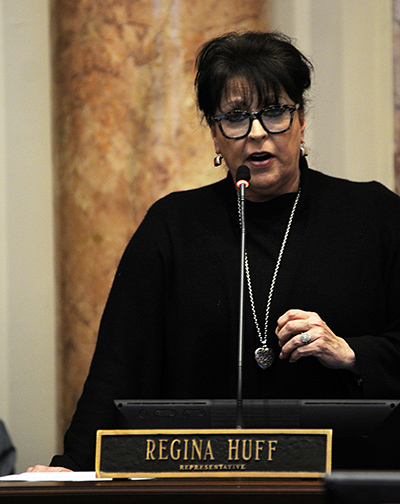
Rep. Regina Huff, R-Williamsburg, speaks on
House Bill 121 on the House floor on Wednesday.
A high resolution photo is available
here.
FRANKFORT— A bill
that would require public comment at school
board meetings is now one step closer to
becoming law.
The Kentucky House of Representatives approved
House Bill 121 by a 66-24 vote on Wednesday. It
would require local school boards to allow at
least 15 minutes of public comment at each
meeting. It would also allow school boards to
skip the public comment period if no one has
requested to speak.
The bill’s primary sponsor, Rep. Regina Huff,
R-Williamsburg, says the bill would guarantee
Kentuckians an opportunity to share their
concerns or offer support to their local school
board.
“Many boards already welcome public input and
those that are already doing so can continue to
do so just as long as they have at least 15
minutes,’ Huff said.
Huff said she has not heard from any school
board or superintendent who is against the bill.
However, she has heard from constituents in
support of the measure.
“I’ve heard from several individuals of various
districts that reached out to share the
experience of being denied the opportunity to
speak,” Huff said.
Huff said she believes some of the tense
situations that have happened at school board
meetings within the last year are a result of
boards not allowing public comment.
“I think the opportunity to speak without being
locked out will go a long way and be a more
peaceful situation,” Huff said.
Prior to voting on the measure, Rep. Lisa
Willner, D-Louisville, called a floor amendment
that would allow school boards to cancel a
public comment period if there are safety
concerns. The motion failed.
Huff agreed with Willner that security at school
board meetings is important, however, she could
not support the amendment.
“As I suggested, (school resource officers) are
the invaluable resource that can be used during
those times such as this,” Huff said.
HB 121 will now go before the Senate for
consideration.
END
Feb. 1,
2022
Senate bill
would make disabilities workforce council more
permanent
020122b.jpg)
Sen. Danny Carroll, R-Benton, speaks on Senate
Bill 104, which would establish the Employment
First Council. A high resolution photo is
available
here.
FRANKFORT—A bill
to establish a more permanent disabilities
workforce council within the Office of
Vocational Rehabilitation received approval
Tuesday during a Senate Economic Development,
Tourism and Labor Committee meeting.
Senate Bill 104, which passed 9-0, would
establish the Employment First Council as an
advisory council that’s charged with boosting
employment opportunities for people with
disabilities. Its members would advise those in
the executive and legislative branches of
government.
“Basically, it’s the idea that everyone has the
right to work, and this includes people with
significant disabilities,” Sen. Danny Carroll,
R-Benton, told committee members.
Carroll, who is sponsoring the measure, said the
council was first established in 2018 through an
executive order by former Gov. Matt Bevin. It
has been reestablished each year during Gov.
Andy Beshear’s administration. Carroll said the
bill would codify this council going forward.
“As most of you know, part of my mission while I
am here in Frankfort serving in the Kentucky
state Senate is to be a voice for those children
and adults with disabilities throughout the
Commonwealth,” Carroll said. “And this is one of
the bills along those lines that will help to
foster employment for those folks.”
Johnny Collett, from the Human Development
Institute at the University of Kentucky, said
disabilities affect many people in the
commonwealth, and they should have the
opportunity to have real jobs with real wages.
“Disability impacts one in three Kentuckians, so
our commonwealth has among the highest rate of
people with disabilities in the nation, and at
the same time, we have among the lowest rate of
people with disabilities who are employed,”
Collett said.
Only about one-third of Kentuckians with
disabilities are employed, and that compares to
about 75 percent of those without disabilities,
he said.
“These are economic development issues, these
are Kentucky challenges, but they’re also
Kentucky opportunities,” Collett said.
Collett was joined by Katie Wolf Whaley in
offering testimony. She co-chairs Kentucky’s
Employment First Council.
“When we talk about Employment First in
Kentucky, as you said, here in Kentucky and
across the country we are talking about
delivering meaningful employment, fair wages and
career advancement for people with disabilities
regardless of the type of disability,” Whaley
said.
Kentucky’s Employment First policy first grew
out of the work of the former Work Matters Task
Force, which focused on improving work outcomes
for key populations including people with
disabilities, she said.
Carroll said plans are to first get the council
codified and then perhaps during the interim
period work on some legislation and other
measures to strengthen it.
END
Jan. 31,
2022
Senate bill
would require grief training for coroners
013122b.jpg)
Sen. Ralph Alvarado, R-Winchester, speaks on
Senate Bill 66. The bill would require coroners
to attend grief training. A high resolution
photo is
available
here.
FRANKFORT—A caring
attitude following a tragic death can’t be
mandated, but Senate Bill 66 would be a step in
the right direction, the bill’s sponsor told
fellow lawmakers Monday from the Senate floor.
“I realize that we cannot legislate compassion
or empathy or basic human kindness. I also
realize that our coroners are elected officials
who have to answer for their actions,” Sen.
Ralph Alvarado, R-Winchester said. “However, I
believe it is important that we provide our
coroners every educational opportunity to know
how to deliver the worst news a family may ever
hear in their lifetime.”
SB 66, also known as Nathan’s Law, would require
coroners and deputy coroners to attend four
hours of training to learn about the grief
process and procedures for death notifications.
The Senate approved the measure with a 35-0
vote.
Last week, Stacey Burnett, an Advanced Practice
Registered Nurse, offered testimony on the bill
to the Senate Health and Welfare Committee.
Burnett said her son left for Utah to visit
friends and go snowboarding in March 2021. One
night, the coroner’s van pulled up to her house.
Burnett said the coroner had no details of what
happened to her son. She asked, “Is he dead? Is
he dead?” But the coroner only handed her a
piece of paper and walked away. The paper
provided contact information for a sheriff’s
office in Utah where Nathan was visiting.
Alvarado said Burnett and her family are not the
only ones who have been adversely affected by a
lack of communication, information or empathy.
“Unfortunately, her story is not unique, and the
recent past, in fact this past summer, we heard
of a death notification that occurred in another
Kentucky county where the decedent’s family was
not present when the coroner went to their
residence, so the information was pinned to
their front door for them to find when they came
home,” Alvarado said.
Burnett said that day last March changed her
life forever, and she hopes this legislation
will help prevent the anguish she felt.
“It’s etched in your mind forever,” she told
committee members.
END
Jan. 28,
2022
This Week at
the State Capitol

FRANKFORT – The
2022 legislative session is nearly a third of
the way over, and dozens of bills are moving
through the House and Senate, including some
this week related to package theft, mental
health and school board meetings.
The Kentucky General Assembly hit day 18 of the
60-day session on Friday, and along with a
roster of important bills, the fourth week of
the session also brought some memorable moments
on the chamber floors.
Legislators took time to recognize trade
partnerships with Taiwan, honor the late Rep.
John “Bam” Carney, and commemorate International
Holocaust Remembrance Day.
Janitorial workers were praised for their
contributions, and school officials from Western
Kentucky received a standing ovation for their
quick and selfless efforts to help local
communities following the recent tornados there.
Schools and education were a big theme
throughout the week as lawmakers advanced at
least three bills related to scholarships out of
committee. But the education bill grabbing the
most headlines was House Bill 121, related to
school board meetings.
The legislation would require local school
boards to provide at least 15 minutes of public
comment at each meeting—unless no one has signed
up to speak.
Supporters of the bill say that, while most
school boards already allot time for public
comment, some do not, and parents have requested
the change. Critics, meanwhile, say the measure
is unnecessary and intrudes on local control.
HB 121 moved out of the House Education
Committee on Tuesday and now heads to the floor.
Another bill drawing attention this week was
Senate Bill 23, which would expand the
protections for U.S. mail to include packages
delivered by commercial carriers, such as FedEx
or Amazon.
Under the changes, anyone caught stealing or
destroying a package from a common carrier or
delivery service could be charged with a class D
felony, even if the value of the package is
relatively low.
Supporters say the bill is needed to crack down
on thieves known as “porch pirates,” who have
grown more prevalent and more organized in
recent years.
The legislation cleared the Senate Judiciary
Committee on Thursday.
On Wednesday, the Senate State and Local
Government Committee advanced a measure—Senate
Bill 64 —which would protect the confidentiality
of peer support counseling programs for first
responders. Supporters say the protections are
necessary to ensure that first responders can
participate openly and honestly in counseling.
Lastly, lawmakers closed out the week by sending
a bill related to COVID-19 visitor restrictions
to the governor’s desk.
That legislation – Senate Bill 100 – would
ensure that patients in long-term care, assisted
living and mental health facilities can receive
visits from essential caregivers. Visitors could
include family members, friends or volunteers,
among others.
Advocates for the bill say that caregiver visits
are essential to the overall wellbeing of the
patients.
Lawmakers are scheduled to gavel back into
session on Monday for week five, and Kentuckians
have many ways to keep in touch with the
legislative process. That includes the Legislative
Record webpage,
which allows uses to review and track a bill’s
progression through the chambers.
Citizens can also share their views on issues
with lawmakers by calling the General Assembly’s
toll-free message line at 1-800-372-7181.
END
Jan. 27,
2022
Senate bill
seeks to crack down on "porch pirates"
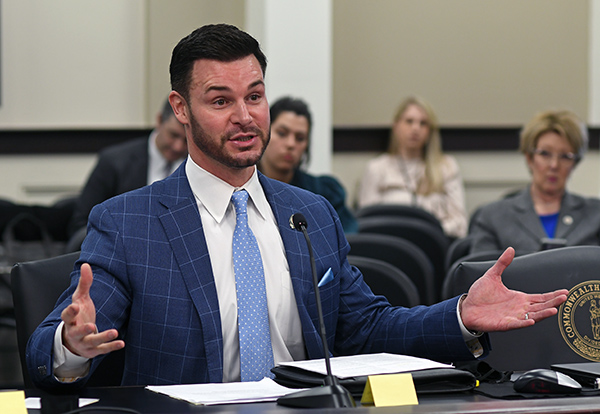
Sen. David Yates,
D-Louisville, speaks on behalf of Senate Bill
23, which seeks to curb package theft.
A high resolution photo is available
here.
FRANKFORT— A
measure moving through the Kentucky Senate aims
to rein in porch pirates, a nickname for people
who steal packages off front porches.
Sponsored by Sen. David Yates, D-Louisville,
Senate Bill 23 would make it a class D felony to
steal or destroy packages from common carriers
and delivery services – similar to the penalty
for stealing U.S. mail. The measure cleared the
Senate Judiciary Committee without opposition on
Thursday.
Yates said SB 23 is needed to curb theft rings
and close a loophole that treats packages from
delivery services differently than mail from the
U.S. Postal Service. Yates said porch pirates
are a growing issue in Louisville that he fears
will only escalate.
“There’s a loophole in the law. At the time we
passed this some 40 years ago, we did not
consider the type of commerce that we have
today,” he said. “There wasn’t the Amazon, the
FedEx and all the other delivery courier
services. So, they’re treated different under
the law today.”
Yates said he has talked with people who have
been victimized over and over again. Some have
had medicines or other important items stolen,
and crime rings have been known to move from
city to city, trolling neighborhoods in vans.
Yates said he is usually hesitant to increase
misdemeanors to felonies, but he reasoned that
the bill simply brings the other carriers into
conformity with the postal service. The bill
also has support from the Fraternal Order of
Police, he said.
Sen. Wil Schroder, R-Wilder, voted for the
measure, but also expressed concern about
switching misdemeanors to felonies.
“Like you, I am hesitant to start making
misdemeanors felonies, and if it’s a $5 package,
a felony can seem kind of steep,” he said.
Sen. Phillip Wheeler, R-Pikeville, said the
seriousness of the problem led him to vote for
the bill.
“While I obviously
don’t want to make $5 crimes a felony, this is
merely bringing up modern commerce and making it
commensurate with theft of mail,” he said. “When
we all see these news stories where crime has
gotten so rampant in big cities, where organized
gangs are even robbing trains, we thought we
left that behind in the 19th Century, and now
we’re seeing that once again, especially in our
metropolitan areas.”
END
Jan. 27,
2022
House approves
essential caregiver bill
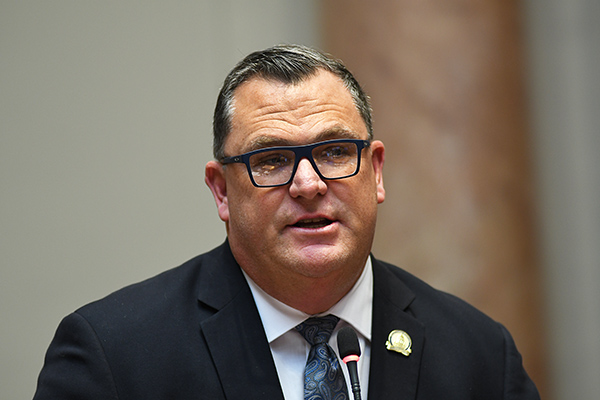
Rep.
Michael Sarge Pollock, R-Campbellsville,
presents Senate Bill 100, an act relating to
essential caregivers, on the House floor on
Thursday. A high resolution photo is available
here.
FRANKFORT—
Lawmakers continue to learn as the COVID-19
pandemic evolves.
One thing they’ve learned is the mental and
physical health of long term care patients
suffered due to COVID-19-related visitor
restrictions. Senate Bill 100 aims to
permanently change that.
On Thursday, Rep. Michael Sarge Pollock,
R-Campbellsville, presented SB 100 on the House
floor on behalf of the primary sponsor Senate
Majority Caucus Chair Julie Raque Adams,
R-Louisville.
“This bill provides a strong infrastructure that
allows families to be the critical care partners
that they are,” Pollock said. “It maintains a
role of a personal caregiver and their important
role in the mental, physical and spiritual
social well-being of the resident.”
During Thursday’s meeting of the House Health
and Welfare Committee, Adams testified that SB
100 would make family members, guardians,
friends, pastors, clergy and other individuals
essential caregivers and would permanently allow
them to visit residents of long term care,
assisted living and mental health facilities.
Essential personal caregivers would have to
follow safety guidelines set by the Cabinet for
Health and Family Services during visitation.
Measures passed during the 2021 Regular Session
and Special Session temporarily allowed long
term care patients an essential caregiver. But
those provisions expire Jan. 31, Adams said.
On the House floor, Rep. Cherlynn Stevenson,
D-Lexington, said although she worries about a
few loopholes in the bill, she supports SB 100
and recognizes long term care facilities have
struggled to find a delicate balance when it
comes to allowing visitors and protecting
residents from COVID-19.
“We know that these visitors provide significant
amounts of hands-on care,” Stevenson said.
The Kentucky Senate unanimously approved SB 100
by a 35-0 vote last week. Due to a few changes
made to the bill in the House, it will now go
before the full Senate for concurrence.
If the Senate agrees with the changes, the
measure will be sent to the governor’s desk for
his signature or veto. An emergency clause in
the bill means it would become law immediately
upon his signature.
END
Jan. 26,
2022
Bill would
protect confidentiality in first responder
counseling programs
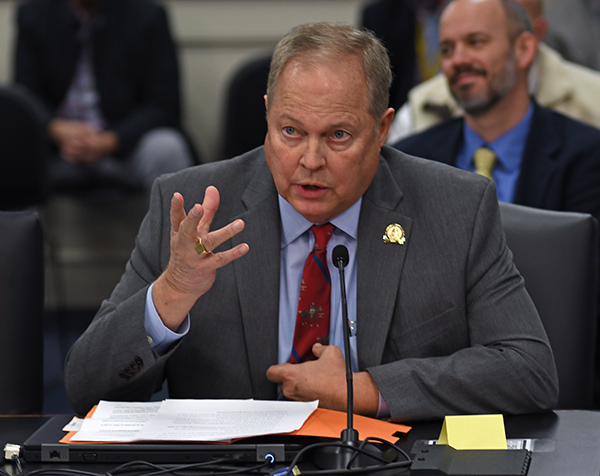
Senate Majority Whip Mike Wilson, R-Bowling
Green, speaks on behalf of Senate Bill 64, which
would protect confidentiality in first responder
counseling. A high resolution photo is available
here.
FRANKFORT—It’s no
secret that serving in law enforcement,
firefighting or other public safety fields can
be incredibly stressful. Senate Bill 64 aims to
lessen the mental health burdens of these
careers through confidential, peer support
counseling programs.
The bill, sponsored by Senate Majority Whip Mike
Wilson, R-Bowling Green, received unanimous
approval Wednesday during a meeting of the
Senate State and Local Government Committee. It
now heads to the full Senate.
SB 64 would allow public agencies to create peer
support counseling programs for public safety
employees who have experienced traumatic events
in their work. Central to the bill, however, are
confidentially protections for those who
participate in the programs.
Wilson said police, firefighters and other
emergency responders are frequently exposed to
situations that can cause psychological trauma,
similar to the post-traumatic stress experienced
in warfare. Wilson said he learned about these
issues while serving as a law enforcement
chaplain in Los Angeles many years ago.
“I just can’t imagine some of the things they do
and then have to go home every day,” he said.
Wilson said the legislation is important to
protect those who protect our communities.
“This has become quite evident, especially in
light of the tornadoes that hit Kentucky and all
over in Western Kentucky and Bowling Green –
never seen that level of devastation,” Wilson
said.
Erin Hulsey, Director of Human Resources and
Risk Management for the City of Bowling Green,
said she has been working with many groups to
establish peer counseling.
“I learned that being a first responder is truly
a unique job,” she told committee members. “The
events that police officers and firefighters
experience on the job are abnormal to the
average person. The events they experience are
horrific and traumatic.”
She offered statistics from the federal
government to drive home what first responders
face while doing their jobs.
According to the U.S. Department of Veterans
Affairs, 60% of men and 50% of women will
experience one traumatic event in their life on
average, Hulsey reported. However, first
responders can experience more than one such
event in a single shift, she said.
Bryanna Carroll, Director of Public Affairs for
the Kentucky League of Cities, said the peer
counseling programs could potentially benefit
tens of thousands of Kentuckians.
“Our cities want to take care of these people
both physically and mentally,” she said. “Senate
Bill 64 helps ensure they can do so without fear
of personal information becoming public
knowledge.”
The confidentially provisions in SB 64 include
some exceptions, such as explicit threats to
self or others, information on an abused child
or admission of criminal conduct.
END
Jan. 25,
2022
House
committee considers requiring public comment at
school board meetings
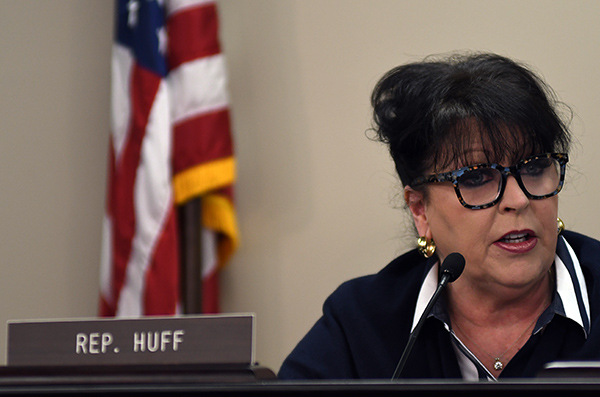
Rep. Regina Huff,
R-Williamsburg, testifies on House Bill 121
before the House Education Committee on Tuesday.
A high resolution photo can be found
here.
FRANKFORT— Local
school boards across the Commonwealth may soon
be required to allow a public comment period
during meetings.
The House Education Committee voted in favor of
House Bill 121 on Tuesday. It would require
local school boards to allow at least 15 minutes
of public comment at each meeting. It would also
allow school boards to skip the public comment
period if no one has requested to speak.
Committee Chair Rep. Regina Huff,
R-Williamsburg, is the primary sponsor of HB
121. She said although the bill is simple, she
believes it is important. Huff said while most
school boards already allow an opportunity for
public comments, not all of them do.
“I think that this just ensures that there is
that opportunity (to speak),” Huff said. “And I
think that will really go a long way in making
connections with their elected officials rather
than hampering them and being felt like (they)
were locked out.”
Huff added parents have reached out to her and
requested this bill.
Rep. Lisa Willner, D-Louisville, said she also
believes HB 121 is an important bill, but she
has concerns that the legislation would not
allow school boards to end a public comment
period due to safety concerns. Huff said the
bill would not prohibit school boards from
taking the necessary measures to ensure safety
at meetings.
Rep. C. Ed Massey, R-Hebron, expressed concerns
that HB 121 might be “intruding” on the way a
local school board operates.
“I think only (school boards) are best to
determine what they need to do at their local
meeting,” Massey said, adding he would vote yes
on the bill in committee, but he still has some
concerns.
Huff said she understands Massey’s concerns, but
she believes parents should have the right to
speak at school board meetings.
“Even though these officials are elected,
they’re still working for the parents, and they
need to be able to answer their questions,” Huff
added.
Before voting, Rep. Myron Dossett, R-Pembroke,
shared with the committee he does support
requiring public comment at school board
meetings.
“It is a good way for the citizens of these
individual districts to be able to know that
they have a voice,” Dossett said.
HB 121 will now go before the House for
consideration.
END
Jan. 21,
2022
This Week at
the State Capitol
FRANKFORT – The
full might of the Kentucky General Assembly was
on display this week as lawmakers overrode two
vetoes related to redistricting and advanced a
landmark budget package off the House floor.
Of the hundreds of bills filed in a 60-day
legislation session, few underscore the
influence of the General Assembly more than the
state’s biennial spending plan. And this year’s
House proposal is historic for both its
magnitude and momentum.
The House approved two bills Thursday that would
allocate a record $110 billion to the state
executive branch, including the Transportation
Cabinet, over the next two years. It was the
earliest vote on a House budget bill in recent
memory, and the measure now heads to the Senate.
Lawmakers said preparations during last year’s
interim session allowed them to accelerate the
pace on budgeting this year.
Highlights include increased funding for
education, money for public pensions and raises
for state police and social workers, among
others. The House is also proposing money for
clean water projects, capital investments in
higher education and expansion of the senior
meals program.
Thursday’s budget vote is sure to be one of the
most watched moves of the session. However,
lawmakers also returned this week to another
headline issue facing the General Assembly –
redistricting.
Gov. Andy Beshear vetoed two of the
legislature’s redistricting bills on Wednesday;
one would redraw the U.S. congressional
districts in Kentucky, the other focuses on the
state’s 100 House districts. But majority
lawmakers in both chambers quickly overrode the
vetoes Thursday afternoon.
The third week of the 2022 legislative session
also brought action on several bills related to
education, criminal justice and health care.
Lawmakers did not convene on Monday in
observance of Martin Luther King Jr. Day, but
bills began moving again on Tuesday.
That’s when the House approved House Bill 44, a
measure that would excuse absences in public
schools for student mental health. The
bipartisan legislation cleared the House floor
by a unanimous vote.
The next day, the Senate advanced Senate Bill 9,
known as the Read to Succeed Act. It would amend
the existing Read to Achieve Act from 2005,
creating a comprehensive system of supports,
interventions and evidence-based learning to
enhance early literacy outcomes in public
schools.
The legislation would also establish the Read to
Succeed Fund. If money is appropriated for the
fund, it could be used to train educators on
strategies to improve K-3 reading skills and
provide statewide professional learning
academies in reading. It could also be used to
create a literacy training program.
Another measure trekking through the
legislature, Senate Bill 38, relates to incest.
The bill would amend state law to designate
those convicted of incest as a “violent
offender.” That would require them to serve 85
percent of their criminal sentence rather than
15 percent under the current law. It advanced
out of committee this week.
The Senate also passed legislation on the floor
on Friday that to ensure patients in long-term
care facilities and mental hospitals can receive
visits from essential care visitors, which could
include family members, friends or volunteers,
among others. The measure, Senate Bill 100, now
heads to the House.
Lawmakers are scheduled to return to Frankfort
on Monday for the 14th day of the session.
Kentuckians have many ways to keep in touch with
the legislative process, including the Legislative
Record webpage,
which allows uses to review and track a bill’s
progression through the chambers.
Citizens can also share their views on issues
with lawmakers by calling the General Assembly’s
toll-free message line at 1-800-372-7181.
END
Jan. 2o,
2022
House begins
biennium budget process
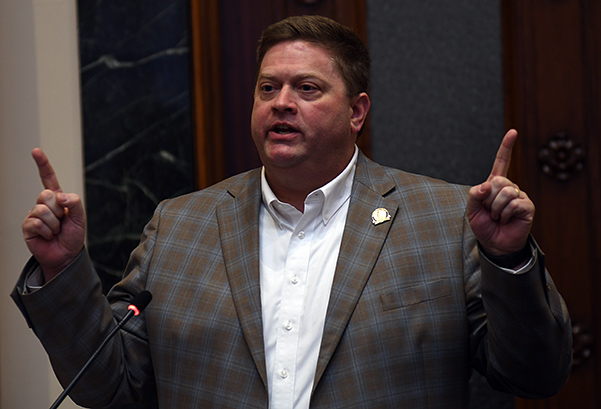
Rep. Jason Petrie,
R-Elkton, speaks on House Bill 1, on the
executive branch budget, and House Bill 241, on
the transportation budget, on the House floor on
Thursday. A high resolution photo can be found
here. A high resolution photo of House
Minority Whip Angie Hatton, D-Whitesburg,
speaking on the bills on the House floor can be
found
here.
FRANKFORT— Two
budget-related bills cleared the House floor on
Thursday.
House Bill 1, on the executive branch budget,
and House Bill 241, on the transportation
budget, will now go before the Senate for
consideration. The bills appropriate more than
$110 billion.
This is the first time since 2018 that the
Kentucky General Assembly is working to pass a
biennium budget. Economic uncertainty due to the
COVID-19 pandemic led the legislature to pass
two single-year budgets in 2020 and 2021.
Rep. Jason Petrie, R-Elkton, said he and the
other sponsors of HB 1 and HB 241 believe the
measures appropriately address Kentucky’s needs
and make good use of taxpayer money.
“There is not one penny of taxpayer money that
has come into the purview of the General
Assembly that the General Assembly has any
ownership of,” Petrie said. “We are being lent
that money in trust by the taxpayers of Kentucky
to render needed services that benefit them.”
The House Appropriations and Revenue Committee
approved both bills earlier in the day on
Thursday. In committee and on the House floor,
Committee Chair Petrie, and Vice Chair Brandon
Reed, R-Hodgenville, were joined by the chairs
of the House budget review subcommittees in
testifying on the proposed executive branch and
transportation budgets.
Reed informed the House Appropriations and
Revenue Committee that it has taken eight months
of working with various agencies, stakeholders
and citizens to draft the two proposals.
“This process makes the budget more transparent
to the General Assembly and to the citizens of
Kentucky,” Reed said.
The proposed executive branch budget is
expansive. The proposed appropriations include
investments in education, public safety,
tourism, infrastructure and more.
Sponsors of the bill were excited to share that
HB 1:
- Fully funds full-day Kindergarten for every
public school district
- Increases SEEK funding for every student
- Meets the actuarial requirements regarding the
Kentucky Retirement System, the Kentucky
Teachers Retirement System and the Kentucky -
---- State Police Retirement System
- Gives a 6% pay raise to all state employees
- Gives a $15,000 salary increase to all
Kentucky State Police officers
- Allocates $350 million in federal American
Rescue Plan Act funds toward clean water
projects
- Funds raises for social workers and provides
funding for additional social worker positions
- Provides funding for facility repairs and
improvements at public colleges and universities
- Ensures funding for Medicaid growth
- Appropriates $14.1 million to expand the
senior meals program, and more
HB 1 cleared the House floor by an 85-8 vote.
In the House Appropriations and Revenue
Committee, Petrie said the executive branch and
transportation budgets work together in a way
the Commonwealth has not seen before.
On the transportation budget, Petrie said:
“There have been extra measures taken to utilize
general funds in selective, surgical
ways—hopefully smart ways— to maximize every bit
of the road fund money that comes in through
that source.”
On the House floor, Rep. Sal Santoro, R-Union,
said the transportation budget provides $100
million for local governments for repaving roads
and fixing potholes, $200 million to match
federal infrastructure grants and more. Santoro
is the chair of the House Budget Review
Subcommittee on Transportation.
HB 241 cleared the House floor by a 90-4 vote.
During debate in committee and on the House
floor, several lawmakers commented on how they
would like to see the executive branch budget
include raises for teachers. Petrie said since
each school district has its own needs, he
believes raises should be decided on the local
level and that the the budget frees up money for
local districts to use toward raises if they
choose.
House Minority Whip Angie Hatton, D-Whitesburg,
said she is afraid there could be “winners and
losers” if the General Assembly does not
appropriate raises for teachers.
“I have wonderful superintendents in my district
who will do their very best to give their
teachers raises, but I’m worried that the way
that money gets stretched that their teachers
are not going to see that,” Hatton added. “And
I’m really disappointed to see that in this
measure.”
Thursday’s House votes on the executive and
transportation budgets are merely procedural so
lawmakers can work on the bills in conference
committee. Petrie said it is likely that these
bills will undergo changes before the General
Assembly considers them again later on in the
legislative session.
END
Jan. 2o,
2022
Incest bill
clears Senate Judiciary Committee
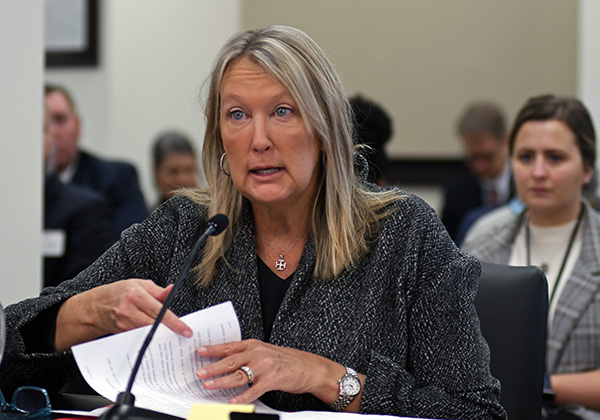
Senate Majority Caucus
Chair Julie Raque Adams speaks on behalf of
Senate Bill 38, which would designate incest as
a "violent offense." A high resolution photo can
be found
here.
FRANKFORT— A bill
designed to increase jail time for those
convicted of incest received approval Thursday
from the Senate Judiciary Committee.
Sponsored by Senate Majority Caucus Chair Julie
Raque Adams, R-Louisville, and Sen. Denise
Harper Angel, D-Louisville, Senate Bill 38
passed with a 9-1 vote. It now heads to the full
Senate.
The bill would amend state law to designate
those convicted of incest as a “violent
offender.” That would require them to serve 85
percent of their criminal sentence rather than
15 percent under the current law.
“We’re not changing any crimes” Adams told
committee members. “We’re just talking about the
time served for people who have been convicted.”
Incest survivor Laken Albrink testified during
the meeting that tougher penalties are needed
for offenders. Albrink said she was sexually
abused by her stepfather for many years before
he was later convicted and sentenced to 25 years
in prison.
“However, very soon thereafter, he was parole
eligible at 15 percent serve time, which what is
currently the serve time to be parole eligible
for incest as it’s written now,” she said. “So
it’s really important to us that we work to get
incest classified as a violent offense as is the
other sexual offenses that are listed.”
Albrink added that the trauma of sexual abuse is
compounded for victims each time an offender
appears before a parole board.
Sen. John Schickel, R-Union, cast the lone no
vote. He questioned how the changes would impact
serve times for juvenile offenders who engage in
an incestuous, but otherwise consensual
relationship.
Sen. Phillip Wheeler, R-Pikeville, said he
assumes that authorities would have to conduct
additional fact-finding in situations involving
very young children to determine what penalties,
if any, apply. He noted that the court would
need to consider other factors set forth in
statute.
END
Jan. 19,
2022
Early literacy
bill clears Senate vote, heads to the House
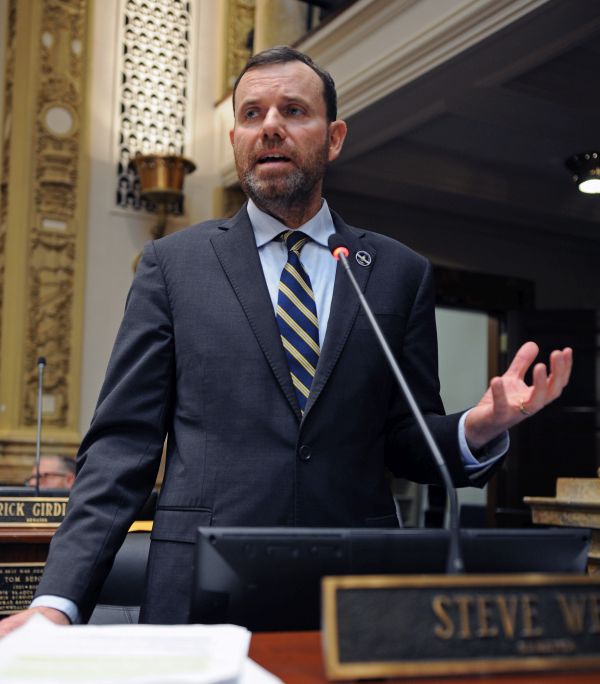
Sen. Stephen West,
R-Paris, speaks on behalf of Senate Bill 9 on
the Senate floor on Jan. 19. A high resolution
photo can be found
here.
FRANKFORT— A bill
designed to increase literacy for thousands of
Kentucky’s children received approval from the
Kentucky Senate on Wednesday.
Senate Bill 9, known as the Read to Succeed Act,
would amend the existing Read to Achieve Act
from 2005, creating a comprehensive system of
supports, interventions and evidence-based
learning to enhance early literacy outcomes in
public schools.
“I’ll be the first to admit this bill is
aspirational,” said the bill’s primary sponsor,
Sen. Stephen West, R-Paris. “Our goal is to have
every kid know how to read by third grade. Can
we do that – I don’t know. But we need to try.
This is aspirational public policy.”
Also sponsored by Senate Majority Whip Mike
Wilson, R-Bowling Green, and Sen. Robby Mills,
R-Henderson, the measure passed on the Senate
floor with a 28-7 vote. It now heads to the
House.
West told lawmakers Wednesday that the
legislation is based on measures that have
proven successful in other states, particularly
Mississippi. He also cited research showing that
students who cannot read proficiently by the end
of the third grade are four times more likely to
not finish high school.
“If we can make sure that kids know how to read
by third grade, it changes the trajectory of
their lives, and it also changes the trajectory
of our state scores,” he said.
SB 9 includes specifications and requirements
for the Kentucky Department of Education and
local school districts.
A provision in the bill would establish the Read
to Succeed Fund. If money is appropriated for
the fund, it could be used to train educators on
strategies to improve K-3 reading skills and
provide statewide professional learning
academies in reading. It could also be used to
create a literacy training program.
In addition, SB 9 would clarify the intent for
all elementary schools. Instruction would be
provided by “qualified individuals” and
evidence-based reading instruction would
emphasize phonemic awareness, phonics, fluency,
vocabulary and comprehension.
The measure also calls for more collaboration
with the Governor’s Office of Early Childhood,
Kentucky Educational Television and the Kentucky
Department for Libraries and Archives.
The Kentucky Department of Education estimates
that implementing the bill’s requirements would
cost between $15 million to $20 million in
fiscal year 2024. But education officials
anticipate federal pandemic relief funds could
help cover the cost.
The Kentucky Read to Achieve Program was created
in 2005 to support schools in implementing a
reading diagnostic and intervention program for
struggling readers.
In a speech on the Senate floor, West said the
new bill would not do away with Read to Achieve.
But some lawmakers said they are unsure.
Senate Minority Caucus Chair Reginald Thomas,
D-Lexington, said Read to Achieve has had
excellent results. He expressed concern that
Read to Succeed’s larger grant might move out
Read to Achieve.
“My biggest fear with Senate Bill 9 is by trying
to do it in a classroom setting, you have 15 or
20 illiterate students and one teacher trying to
teach that student how to read,” he said.
“You’re going to have some students fall through
the cracks, and you’re certainly not going to
get that 99 percent success rate.”
Likewise, Sen. Robin L. Webb, D-Grayson, said
Read to Achieve has been in her district since
approximately 2005. It exists in high performing
schools as well as those that are not performing
as well, and Webb said she wants to be better
convinced that the existing program will not be
compromised.
“Hopefully, I can get more information on this
and reconcile it better in my mind and maybe the
House would consider stronger language to
perhaps preserve that,” she said.
The Senate is scheduled to convene Thursday at 2
p.m.
END
Jan. 19,
2022
Bill to
promote rural small business growth clears House
committee
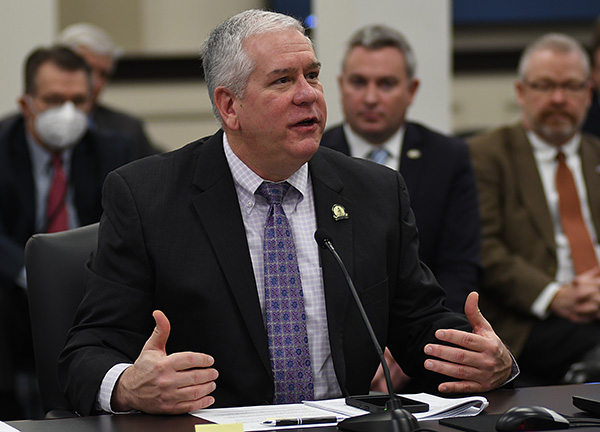
Rep. John Blanton,
R-Salyersville, testifies on House Bill 308
before the House Agriculture Committee on
Wednesday. A high-res version of the photo can
be found
here.
FRANKFORT— Small
business owners in Kentucky may soon have more
access to capital investments.
House Bill 308, otherwise known as the Kentucky
Rural Jobs Act of 2022, would allow insurance
premium tax credits for capital investment
companies that invest in small businesses in
rural Kentucky. These businesses often have
difficulty obtaining a loan or attracting
investors on their own.
“In a nutshell, this bill creates access to
capital for small businesses that maybe could
not get that capital somewhere else,” said Rep.
Richard Heath, R-Mayfield. The House Agriculture
Committee voted to approve HB 308 on Wednesday.
HB 308 would create a $125 million fund for the
project, with $75 million coming from the state
in premium tax credits that cap out at $15
million per year beginning in 2024. The
Department of Revenue would process the
applications.
Bill sponsors Heath and Rep. John Blanton,
R-Salyersville, have filed similar legislation
in the past. Blanton told the committee on
Wednesday that small improvements have been made
to the bill over the years.
One of those changes includes adding the Western
Kentucky counties listed in the Presidential
Declaration of Emergency from the December
tornadoes to the list of eligible counties.
Heath said many businesses in Western Kentucky
did not have insurance or may not receive enough
money from insurance to cover the cost of
rebuilding.
Other types of businesses that would qualify to
apply include those with less than 250 employees
or businesses located in a rural county of less
than 50,000 people. Consideration would also be
given for businesses in opportunity zones in low
income, urban areas and businesses in areas with
a labor force participation rate below the
national average.
“So many small businesses have great potential,
but they need capital,” Heath said. “The bill
will bring private capital, incentivized in part
by a state premium tax, to a variety of
businesses such as manufacturing, agribusiness,
technology companies and others.”
Under HB 308, approved small businesses would be
able to use capital investment funds to purchase
new machinery, hire and train new employees, and
more.
Heath and Blanton worked with representatives
from investment firm Advantage Capital in
drafting the bill. Heath also said the bill has
support from the Kentucky Bankers Association,
Kentucky Farm Bureau and the Kentucky Department
of Agriculture.
During discussion, Rep. Josie Raymond,
D-Louisville, asked why successful investors
need a monetary incentive to invest in rural
Kentucky.
Advantage Capital representative Tony Toups
explained that investors often have to wait
longer to see revenue from investing in rural
small businesses and that these types of
incentives are needed to attract capital
investment.
Rep. James Tipton, R-Taylorsville, and House
Minority Caucus Chair Derrick Graham,
D-Frankfort, spoke in favor of the bill.
However, Graham was not in favor of the process.
Heath responded that he intended to file the
bill last week, but that did not happen as
planned. However, HB 308 will undergo another
hearing in the House Appropriations and Revenue
Committee before moving to the House for a floor
vote.
“I urge each of your all’s support to help us in
the rural areas,” Blanton said. “We’re not
looking for handouts. We’re looking for a hand
up.”
The House Appropriations and Revenue Committee
will consider HB 308 at a later date.
END
Jan. 18,
2022
House approves
bipartisan student mental health bill
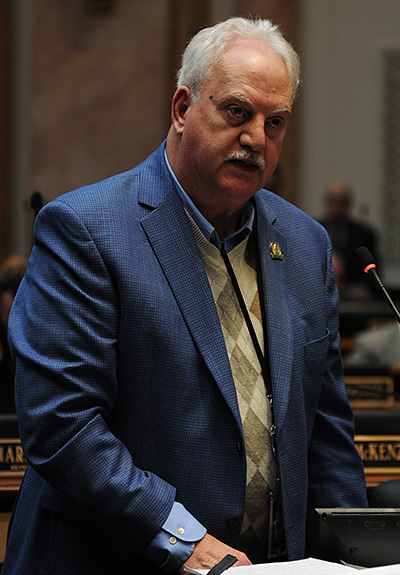
Rep. Bobby McCool, R-Van
Lear, speaks on House Bill 44 on the House floor
on Tuesday. A high-res version of the photo can
be found
here.
A high-res photo of Rep. Lisa Willner,
D-Louisville, speaking on House Bill 44 can be
found
here.
FRANKFORT— The
Kentucky House of Representatives wants public
school students to know their mental health
matters.
House Bill 44 allows absences for mental health
reasons to qualify as an excused absence. The
bipartisan measure cleared the House floor by a
unanimous vote on Tuesday.
Rep. Bobby McCool, R-Van Lear, and Rep. Lisa
Willner, D-Louisville, are the primary sponsors
of HB 44. The pair worked on the bill with three
high school students over the summer.
“It’s important because it brings mental health
issues to the level of conversation without fear
of any type of stigma,” McCool said on the House
floor.
Both McCool and Willner described the bill as a
simple change to current statute.
“(HB 44) requires local school districts to
include in their attendance policies provisions
for excused absences for student mental or
behavioral health status,” Willner said. “It
doesn’t add extra days for absences, but simply
makes it explicit that mental health is health.”
According to Willner, she and McCool have not
encountered any opposition to the bill. She
added that it has the support of school
counselors, psychologists, teacher groups and
other mental health and education related groups
in the Commonwealth.
Both McCool and Willner hope the bill helps
reduce the stigma of mental health, and that it
lets Kentucky’s students know that their elected
representatives care about them and their mental
health.
The House voted 94-0 to approve HB 44. It will
now go to the Senate for consideration.
END
Jan. 14,
2022
This Week at
the State Capitol
FRANKFORT— The
Kentucky General Assembly hit its stride in the
second week of the 2022 legislative session,
passing a $200 million disaster relief bill for
Western Kentucky and advancing a series of
education bills on remote instruction, early
literacy and student mental health.
The short, four-day week was punctuated by grief
for many lawmakers amid the deaths of two
high-profile figures in Kentucky politics.
Former State Rep. Darryl Owens was remembered in
a funeral service in Louisville on Tuesday,
following his death on Jan. 4. Thursday brought
word that Larry Forgy, who had remained active
in Kentucky politics for decades, had passed
away early that morning.
However, the sad news did not deter legislators
from addressing some of the largest crises
facing the Commonwealth.
Bipartisanship reached the high mark on
Wednesday when more than a dozen legislators
spoke on the House and Senate floors about the
violent tornados that swept through Western
Kentucky in mid-December. Lawmakers capped off
the poignant discussion by passing the relief
bill on a unanimous vote in both chambers.
The measure, House Bill 5, was married to a
companion bill in the Senate. It appropriates
$155 million to the newly-created West Kentucky
State Aid Funding for Emergencies (SAFE) Fund,
which will help local governments, schools,
nonprofits and public utilities pay for recovery
efforts.
Another $30 million will help school districts
pay for transportation and construction costs as
well as wrap-around services for students, and
$15 million will go to Kentucky Emergency
Management to cover temporary housing.
Legislators also prioritized efforts this week
to cope with COVID-19, including a bill that
will give public schools more flexibility on
remote instruction and staffing.
Senate Bill 25, which cleared both chambers on
Thursday, allows school superintendents to
allocate up to 10 remote instruction days to
specific classrooms, grades or schools.
Supporters say the targeted strategy will
prioritize in-person learning and help prevent
the shutdown of entire schools or districts at
once.
The legislation also allows more retired
teachers to return to the classroom, helping
districts respond to staff shortages, and it
extends a series of emergency orders from last
year related to a variety of pandemic issues,
such as price gouging and food assistance.
Another measure—House Bill 56—would provide
$80,000 in death benefits to families of first
responders who died from COVID-related
complications. It cleared a House committee this
week and now heads to the floor.
Aside from remote learning, a handful of other
education bills that have begun their march
through the legislature. That includes
legislation to allow absences for student mental
health and another bill that would require high
school seniors to submit the Free Application
for Federal Student Aid. Both measures moved out
of committee this week and up for consideration
by the full House.
Lawmakers also made headway on the “Read to
Succeed Act” in the Senate, which seeks to
improve early literacy by ramping up
evidence-based instruction, early interventions
and teacher training. The measure advanced out
of committee on Thursday and now heads to the
Senate floor.
Earlier in the week, legislative leaders
adjusted the 2022 session calendar to remove
Friday from the schedule. Lawmakers will also
not convene on Monday in observance of Martin
Luther King, Jr. Day, but will return to
Frankfort on Tuesday for the 10th day of the
legislative session.
In the final – and now famous speech – before
his death, King challenged a crowd in Memphis,
Tennessee to look to the future.
“Let us rise up tonight with great readiness.
Let us stand with a greater determination. And
let us move on in these powerful days, these
days of challenge, to make America what it ought
to be,” he said.
Lawmakers want to know your thoughts on what
Kentucky ought to be.
Observers have many ways to keep in touch with
the legislative process, including the Legislative
Record webpage,
which allows users to review and track a bill’s
progression through the chambers.
Citizens can also share their views on issues
with lawmakers by calling the General Assembly’s
toll-free message line at 1-800-372-7181.
END
Jan. 13,
2022
Remote
learning, COVID-19 emergency order extension
bill clears both chambers
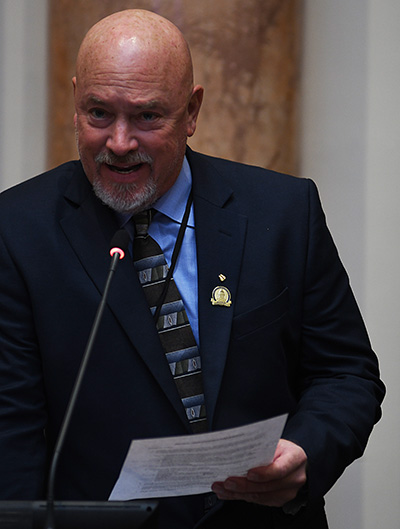
Rep. Scott Lewis, R-Hartford,
presents Senate Bill 25 on the House floor on
Thursday. A high-res version of the photo can be
found
here.
FRANKFORT— As the
COVID-19 pandemic continues, so does the
Kentucky General Assembly’s commitment to
addressing the Commonwealth’s pandemic-related
needs.
On Thursday, the legislature gave final approval
to Senate Bill 25, which seeks to extend a
number of COVID-19 executive orders and offer
schools some additional flexibility on remote
learning.
Upon the governor’s signature, the bill will
give public school districts up to 10 remote
instruction days per school for the remainder of
the 2021-22 academic year.
That will allow superintendents to move specific
classrooms, grades or schools experiencing an
increase in COVID-19 cases to temporary remote
instruction instead of having to shut down
entire schools or school districts at once.
As more school districts face staffing
shortages, another provision in SB 25 would
allow more retired teachers to return to the
classroom.
SB 25 also seeks to extend COVID-19 emergency
order protections against price gouging, expand
access to nutrition assistance, allow
flexibility for retired first responders to
return to work and allow state and local
governments to conduct business and meetings
virtually. It also would extend the emergency
order allowing pharmacies to fill prescriptions
for up to 30 days.
Under this bill, these orders would now expire
on April 14.
The House approved SB 25 by an 84-9 vote
Thursday after amending the bill to include the
emergency extensions. The Senate later concurred
on changes with a 17-8 vote. Now the measure
will be sent to the governor’s desk for his
signature or veto.
Rep. Scott Lewis, R-Hartford, and Rep. Bart
Rowland, R-Tompkinsville, presented the bill on
the House floor before the vote.
Rowland said SB 25 is similar to emergency
measures that lawmakers adopted in the 2021
Extraordinary Session, some of which are set to
expire on Saturday. SB 25 will continue the
COVID-19 state of emergency to the extent
necessary to secure federal funding and
reimbursements, he said.
In explaining the education portion of the bill,
Lewis said although SB 25 is similar to a bill
from the 2021 Extraordinary Session, the
guidelines for remote learning were changed to
help avoid large-scale shut downs of entire
schools or districts.
House Minority Floor Leader Joni L. Jenkins,
D-Shively, voted “yes” on SB 25, but said she
felt the process was rushed.
“I think among the body there’s probably a whole
lot of concern that things aren’t covered in
this bill,” she said.
When considering changes made to SB 25 by the
House, a few Senate members also expressed
frustration with the process and disagreed with
changes to the bill.
Sen. Max Wise, R-Campbellsville, is the primary
sponsor of SB 25. However, he voted against the
final bill after it was amended in the House. So
did Sen. Wil Schroder, R-Wilder.
“I have questions just with the process,”
Schroder said. “You know, Senate Bill 25 left
the Senate Chamber as a 4-page bill relating to
education, and I agree that it did have some
COVID measures in there. But it came back under
the House Committee Substitute as a 12-page bill
with all these emergency orders in there.”
On the House floor, Rep. James Nemes,
R-Louisville, spoke in favor of the education
portion of the bill.
“I will say that this is good,” Nemes said. “One
reason I’m happy is because it will enable the
kids across the Commonwealth to be back in
school more often.”
SB 25 contains an emergency clause, which will
allow it to become law immediately upon the
governor’s signature.
END
Jan. 13,
2022
COVID-19 death
benefits for first responders advances
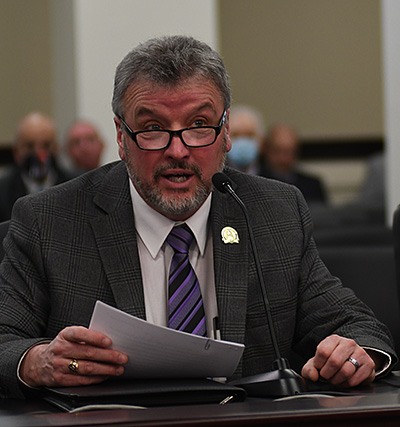
Rep. Thomas Huff,
R-Shepherdsville, testifies on House Bill 56
during the House State Government Committee on
Thursday. A high-res version of the photo can be
found
here.
FRANKFORT—
Families of first responders who died due to
COVID-19 related complications may soon be
eligible for death benefits.
House Bill 56 was approved by the House State
Government Committee on Thursday and will now
head to the House floor for consideration.
Primary sponsor Rep. Thomas Huff,
R-Shepherdsville, said that under HB 56, a
COVID-19 related death would be considered dying
in the line of duty for first responders.
The measure would amend current statute on death
benefits to include COVID-19 on the list of
illnesses that qualify a deceased first
responder’s family for death benefits. If HB 56
becomes law, those families will receive a
one-time, lump-sum payment of $80,000.
Statute already defines first responders as
police officers, firefighters, emergency medical
services personnel, correctional officers and
active duty Kentucky National Guard members.
Huff testified that HB 56 is retroactive,
meaning any first responders who have died due
to COVID-19 complications since March 6, 2020,
would qualify.
At Thursday’s committee meeting, Huff asked
Zoneton Fire Protection District Chief Kevin
Moulton to testify alongside him. Zoneton lost
its fire chief and its interim fire chief to
COVID-19 related complications within two months
of each other in 2021.
“Both were active in the community and very
active members of the fire protection district
and a great loss to the community,” Moulton
said.
During discussion, Rep. Buddy Wheatley,
D-Covington, noted that the one-time $80,000
payment under this bill is not part of full line
of duty benefits through the pension system.
Rep. Jason Nemes, R-Louisville, followed up
Wheatley’s remarks by pointing out that there
are minimal administrative costs associated with
HB 56 and that the burden of applying for the
benefits would fall on the administrative
agency.
“All we’re saying is,
rather than the first responder’s family having
to make the case, it’s now the administrative
agency, and I think that’s appropriate,” Nemes
added.
END
Jan. 12,
2022
Kentucky
General Assembly approves $200 million disaster
relief bill
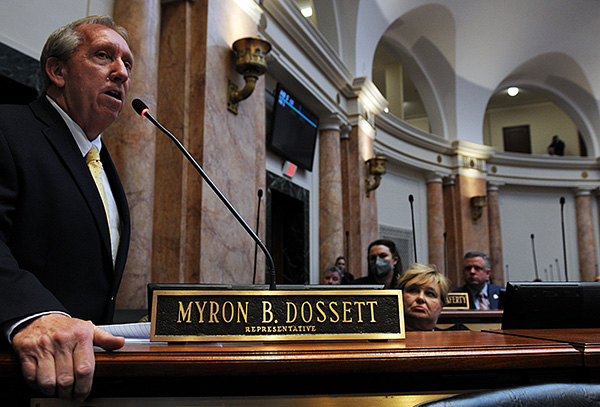
Rep. Myron Dossett,
R-Pembroke, speaks on House Bill 5 on the House
floor on Wednesday. A high-res version of the
photo can be found
here.
FRANKFORT—
Lawmakers in the Kentucky General Assembly
hunkered down in basements and closets inside
their homes as they listened to the howling wind
and the sound of breaking glass the night deadly
tornadoes decimated Western Kentucky.
On Wednesday, those lawmakers shared their
experiences on the House and Senate floor as
they asked their colleagues to vote “yes” on
House Bill 5. Both chambers unanimously answered
the call.
“House Bill 5 is our attempt to bring some
relief to the citizens and local governments
who’ve suffered through the terrible storms that
hit in December,” said Rep. Richard Heath,
R-Mayfield.
HB 5 appropriates $155 million in general funds
from the 2021-22 fiscal year budget to create
the West Kentucky State Aid Funding for
Emergencies (SAFE) Fund. These funds can be used
by local governments, nonprofits, school
districts and public utilities to pay for
construction projects, repairs and more. The
money will be appropriated by the General
Assembly as needed.
The measure also gives $30 million to the
Kentucky Department of Education for school
districts impacted by the storms. The funds may
be used for transportation and construction
costs as well as necessary wrap-around services,
including after-school programs, mental health
counseling for students and tutoring.
HB 5 also gives Kentucky Emergency Management
$15 million to use toward the purchase of
FEMA-eligible temporary housing.
Heath, who is the primary sponsor of the bill,
said the funds will be repaid once the insurance
claims and federal government dollars are
processed. Allocating the money from the general
fund now allows communities in Western Kentucky
to begin recovery efforts sooner rather than
later.
Members from both chambers who represent
districts hard-hit by the storms shared their
own stories from that night and thanked first
responders, volunteers, colleagues, neighbors,
Gov. Andy Beshear, President Joe Biden and more
for the overwhelming amount of support they’ve
received over the last month in the wake of the
tornadoes.
Rep. Michael Meredith, R-Oakland, said the
response has been heartwarming.
“We saw the worst nature had to offer, but in
the days following, we saw the best that
humanity had to give in a time where I think we
needed that probably more than we ever have,”
Meredith said.
Meredith and his family took shelter in their
basement as the storms tore through his
neighborhood. Their home sustained some damage,
but nothing major. Meredith said the pressure
from the storm felt like the pressure changing
on an airplane, multiplied five or 10 times.
In the Senate, lawmakers from Western Kentucky
reflected on the immense damage.
“The saying goes that a picture may be worth a
thousand words, but no picture can properly
reveal the complete and utter devastation that a
tornado brings when it comes through your town,”
said Sen. Jason Howell, R-Murray. Howell
sponsored a companion measure in the
Senate—Senate Bill 5.
“It is well documented the destruction done to
Mayfield, Kentucky, by the storms on the night
of Dec.10. This storm ripped right through the
center of our town taking too many of our lives,
homes and businesses with it,” he said.
Senate Majority Whip Mike Wilson, R-Bowling
Green, said he and his family were fortunate not
to sustain any damage when the storms hit.
“Thankfully, not even a leaf was disturbed at
our house,” Wilson said, however, he added that
the losses in Bowling Green are “indescribable.”
On the House floor, Rep. Myron Dossett,
R-Pembroke, said emergency alerts on his cell
phone woke his family up. Dossett, his wife,
mother-in-law and granddaughter rode out the
storm together. Weeks later, Dossett can see the
impact that night has had on his 9-year-old
granddaughter’s mental health.
“With this legislation, it is important to have
this initial funding coming through,” Dossett
said. “As I mentioned, with our children that
have lived through this experience, to know
there is funding there to help them towards
mental health… these kids are going to be living
with this for a very long time.”
Some lawmakers already have an idea of what the
legislature can do next to support Western
Kentucky. Rep. Patti Minter, D-Bowling Green,
said housing is a big concern for the survivors
of the storm.
“I would urge this body to remember that we need
to think about housing,” Minter said.
“Affordable housing. We still have about 250
people who do not have a place to go and so much
of our rental stock has been devastated.”
The other lawmakers from districts impacted by
the storms who commented on HB 5 include: Rep.
Jim Gooch Jr., R-Providence; Rep. Chris
Freeland, R-Benton; Rep. Daniel Elliott,
R-Danville; Rep. Michael Sarge Pollock,
R-Campbellsville; Rep. Steve Sheldon, R-Bowling
Green; Rep. Walker Thomas, R-Hopkinsville; Rep.
Melinda Gibbons Prunty, R-Belton, via Majority
Caucus Chair Suzanne Miles, R-Owensboro; Sen.
Robby Mills, R-Henderson; Sen. C.B. Embry Jr.,
R-Morgantown; Sen. Whitney Westerfield,
R-Crofton; Sen. Max Wise, R-Campbellsville; and
Sen. Jimmy Higdon, R-Lebanon.
HB 5 cleared the House floor by a 90-0 vote and
the Senate floor by a 32-0 vote. It will now
head to governor’s desk for his signature or
veto. Upon Beshear’s signature, the bill will
immediately become law due to an emergency
clause.
END
Jan. 12,
2022
$200 million
tornado relief bill moves forward in the Senate
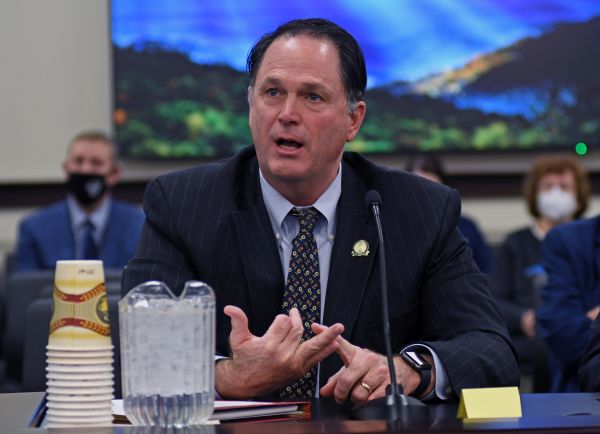
Sen. Jason Howell,
R-Murray, testifies on Senate Bill 5, the
tornado relief bill, during the Jan. 12 meeting
of the Senate Appropriations and Revenue
Committee. A high-res version of the photo can
be found
here.
FRANKFORT — In a
unanimous vote on Wednesday, the Senate
Appropriations and Revenue Committee advanced a
massive $200 million relief measure that would
help those affected by the December tornadoes
obtain housing and educational services.
Senate Bill 5 would appropriate $155 million in
general funds for fiscal year 2021-2022 to the
newly-created West Kentucky State Aid Funding
for Emergencies (SAFE) Fund.
The legislation would also allocate $30 million
to the Kentucky Department of Education for
school districts and $15 million to Kentucky
Emergency Management for the purchase of
temporary FEMA-eligible housing.
The bill’s primary sponsor, Sen. Jason Howell,
R-Murray, told the committee that money for the
fund comes from varying sources, including state
and federal government and gifts from private
organizations. Eligible recipients include
cities, counties, public utilities, state
agencies and school districts in the affected
areas.
Howell said people are concerned that the damage
will reverse advances in the area over the past
10 years, particularly efforts to stem
population declines.
“One of the greatest concerns for the people in
Mayfield and the school system is keeping those
people there,” he said. “Not only have so many
of them lost their homes, but a lot of them have
lost their jobs as well. So it’s very difficult
for them to stay anchored in the community.”
Several lawmakers shared stories in Tuesday’s
meeting about devastation from the storms.
Sen. Robby Mills, R-Henderson, said he drove
through Princeton in Caldwell County the day
after it suffered extensive damage.
“It was evident the tornado stayed on the ground
for miles at a time and wiped out everything in
its path,” he said.
Mills said $300,000 homes were “just gone,” and
some residents were not insured or were
underinsured. He said the $15 million for
temporary housing would cover the purchase of
200 or more mobile homes.
“They just need a place to land,” he said of the
residents.
Sen. C.B. Embry Jr., R-Morgantown, said nearly
30 people lost their lives in Bremen and Dawson
Springs during the torrential weather.
“Emergency responders did a great job,” he said.
“Given my health, I wasn’t able to be on the
ground. But talking to them over the phone, the
EMTs, the fire departments, the police, all did
a great job responding immediately. As soon as I
got on the phone, most of them were already on
the ground.”
Sen. Whitney Westerfield, R-Crofton, said he was
thankful for the bill, and he appreciates the
Senate’s West Kentucky delegation for its
unified support. He said drone footage he shot
of the damage was shared thousands of times,
even in Singapore.
“One of the biggest things and the most
jaw-dropping things that I saw with my own eyes
was the courthouse there in downtown Mayfield,
which is a complete loss,” he said. “Three semi
truckloads worth of files are now sitting in
Detroit, Michigan being freeze dried and
restored by a company that does that.”
Although not part of Western Kentucky, areas in
Taylor County received substantial damage, Sen.
Max Wise, R-Campbellsville, said. He reported
that 74 homes were lost, and many people in
agriculture were negatively impacted.
Sen. Robin L. Webb, D-Grayson, said the recent
tornadoes elicited flashbacks to West Liberty
when a tornado destroyed the city and affected
residents a few years ago.
“I got no sleep. My heart was with you all,” she
said, referring to how she felt after learning
about the recent tornadoes.
The bill now goes to the full Senate for
consideration.
END
Jan. 12,
2022
Bill to deter
unauthorized practice of law clears House
committee

Rep. Daniel
Elliott, R-Danville, presents House Bill 256, a
bill that would increase the penalty for
unauthorized practice of law, before the House
Judiciary Committee on Jan. 12, 2022. A high-res
photo can be found
here.
FRANKFORT— Those
in Kentucky who practice law without a license
could face harsher penalties under a new House
bill.
Rep. Daniel Elliott, R-Danville, presented House
Bill 256 to the House Judiciary Committee on
Wednesday. The measure would increase the
penalty for unauthorized practice of law to a
class A misdemeanor on the first offense and to
a class D felony for any subsequent offense.
Under current statute, the penalty for the
unauthorized practice of law—no matter how many
times a person commits the offense—is a class B
misdemeanor.
“I think someone who’s done this over and over
again needs to be appropriately punished in
order to create a deterrent effect,” Elliott
said.
During discussion on the bill, Rep. Jason Nemes,
R-Louisville, said he believes the current
statute is sufficient.
“Unlawful practice of law is an important thing.
But should it be a felony? I don’t think it
should be,” Nemes said, adding he would like for
lawmakers to take a holistic look at the penal
code before creating more felony offenses in
Kentucky.
Elliott said he agrees with Nemes that a
holistic look at the overall penal code is
needed, but he hopes the increase in penalty for
the first offense under HB 256 would create
enough of a deterrent.
While explaining her vote, Rep. Nima Kulkarni,
D-Louisville, said while she normally is against
adding felonies, “there is a scourge of unlawful
practice of law in immigration specifically. And
I have seen firsthand the personal emotional and
financial devastation that occurs.”
House Majority Whip Chad McCoy, R-Bardstown,
agreed with Kulkarni. Although he is not
normally in favor of adding another felony, he
said he believes this change is needed.
In referencing the impact statement that
accompanies the bill, McCoy said: “No one
believes this is going to increase the jail
population or the cost.”
HB 256 was approved by the House Judiciary
Committee by a 14-2 vote and will now go before
the House for consideration.
END
Jan. 11,
2022
Bill offering
remote instruction days advances
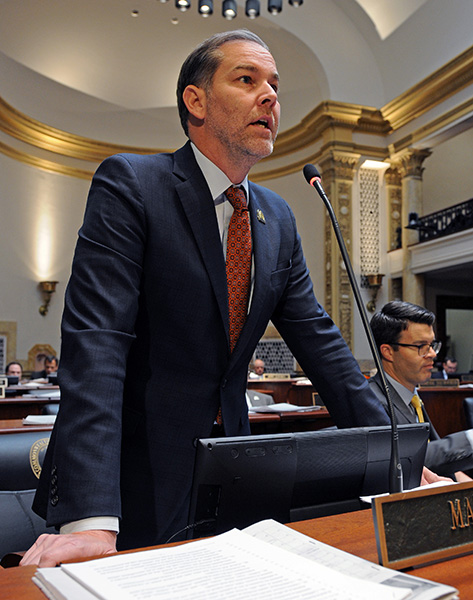
Sen. Max Wise,
R-Campbellsville, presents Senate Bill 25 on the
Senate floor on Jan.11, 2022. A high-res photo
can be found
here.
FRANKFORT—
Lawmakers in the Kentucky Senate approved
legislation Tuesday that would provide up to 10
days of remote instruction in the current
academic year and help address critical staff
shortages in public schools.
The measure – Senate Bill 25 – passed off the
Senate floor with a 31-2 vote and now heads to
the House for consideration.
The bill’s primary sponsor, Sen. Max Wise,
R-Campbellsville, said the high priority for
education is to maximize in-person learning as
much as possible.
Lawmakers passed a similar measure in 2021 to
provide remote instruction days to school
districts. However, SB 25 offers the days to
particular schools, grades, classrooms, or
groups of students.
Wise said lawmakers found great compromise
through using the “surgical strike” approach
with a focus on local control.
“These are not non-traditional instruction
days,” he said. “These are remote instructional
days, which are the equivalent of a day’s worth
of education. It is not a packet that is being
sent home. These are full instructional days.”
In addition to the instructional component, the
bill seeks to curb staff shortages by allowing
more retired teachers to return on a full-time
basis. It would also allow the use of federal
funds to pay for added costs related to teacher
shortages.
The legislation is also designed to help
stabilize school funding and create conditions
for state and local health departments to
support local school districts with COVID-19
plans – all while allowing local control on
measures such as testing-to-stay and masking,
Wise said.
Several floor amendments were filed to increase
the number of remote instruction days, but
failed to pass on the Senate floor.
Sen. David Yates, D-Louisville, said the needs
of larger school districts may be different than
those of small districts. He said he stands with
legislators who want the keep students in school
as often as possible, and he has concerns about
staff shortages that can elevate to being unsafe
for the students.
Yates added that Jefferson County Public Schools
is the 29th largest school district in the
United States, and the possibility of more
remote days would offer flexibility for schools.
Wise responded by saying the extra days would be
unnecessary thanks to flexibility that schools
have to start earlier in the morning or stay
later in the afternoon to make up instructional
time.
If passed into law, SB 25 would apply to
instructional calendars retroactively, starting
back on Jan. 1.
END
Jan. 11,
2022
Lawmakers
adjust calendar for 2022 legislative session
FRANKFORT – The
Kentucky General Assembly will not convene on
Friday, Jan. 14 following an adjustment to the
2022 Regular Session calendar.
The House and Senate are now scheduled to gavel
in for the 10th legislative day on Tuesday, Jan.
18. The last day to introduce bills in the House
has been moved to Feb. 28, while the last day to
introduce bills in the Senate has been moved to
March 2.
The revised 2022 Regular Session Calendar can be
viewed online at:
https://legislature.ky.gov/Documents/22RS_Calendar.pdf
END
Jan. 8,
2022
This Week at
the State Capitol
FRANKFORT— As the
2022 legislative session began to a churn this
week, the Kentucky General Assembly still found
quiet moments to remember victims of the deadly
tornadoes in Western Kentucky – and to show
gratitude to those helping in the recovery.
The House and Senate convened the 60-day regular
session on Tuesday, and the mood in both
chambers turned solemn as lawmakers described
the devastation and offered messages of unity
and thanks, especially to first responders and
those who have donated supplies.
The comments led off a lean first week in the
General Assembly, during which lawmakers placed
a heavy focus on procedural votes and
redistricting. But the momentum began to shift
on Friday when a new biennial state budget was
unveiled in the House – weeks earlier than
previous years.
As with all revenue bills, work on the two-year
spending plan must start in the House before
moving to the Senate later in the session. The
package proposed on Friday would allocate more
than $51 billion in state and federal dollars
annually, and it now heads to committee for
review.
Meanwhile, lawmakers have sent six bills related
to redistricting to the governor’s desk this
week.
The General Assembly must periodically redraw
the boundaries for Kentucky’s congressional,
Supreme Court and state legislative districts to
reflect population changes in the U.S. Census.
With filing deadlines for the next primary
election looming, legislators have made the
issue a high priority.
According to the 2020 Census, urban areas, such
as Louisville, Lexington and Covington, have
grown in population over the past decade, while
rural areas in the eastern and western parts of
the state have declined.
Bills on redistricting began advancing in
committee early in the week, and after amending
the 2022 session calendar, the House and Senate
gaveled in on Saturday to give the remaining
measures a final vote. The legislation includes:
-- Senate Bill 2, which establishes new district
boundaries for the Kentucky Senate
-- Senate Bill 3, which realigns the boundaries
for the U.S. Congressional districts in Kentucky
-- Senate Bill 20, which requires any legal
challenges to the constitutionality of the new
legislative districts to be filed in the circuit
court of the plaintiff's residence
-- House Bill 2, which redraws the lines for
state House districts
-- House Bill 179, which creates a new district
map for the Kentucky Supreme Court
-- House Bill 172, which moves the filing
deadline for candidates in the 2022 primary
election from Jan. 7 to Jan. 25
With redistricting out of the way, lawmakers can
now turn to other pressing matters facing the
Commonwealth.
Two Senate bills related to education are
already moving forward. Senate Bill 1 calls for
local superintendents – rather than school
councils – to determine educational curriculum
for districts. It cleared the Senate floor on
Saturday and is headed to the House.
Senate Bill 25 would provide up to 10 days of
remote instruction per school for the 2021-2022
academic year. The measure passed out of
committee on Thursday and now heads to the full
Senate for consideration.
So far, more than 130 bills have been filed for
the 2022 session, and many more are on the way.
Lawmakers have until Feb. 25 to introduce
legislation in the House and until March 1 to
introduce legislation in the Senate.
Kentuckians have many ways to keep in touch with
the legislative process, including the
Legislative Record
webpage,
which allows uses to review and track a bill’s
progression through the chambers.
Citizens can also share their views on issues
with lawmakers by calling the General Assembly’s
toll-free message line at 1-800-372-7181.
END
Jan. 7,
2022
Senate bills
on school councils, remote instruction move
forward
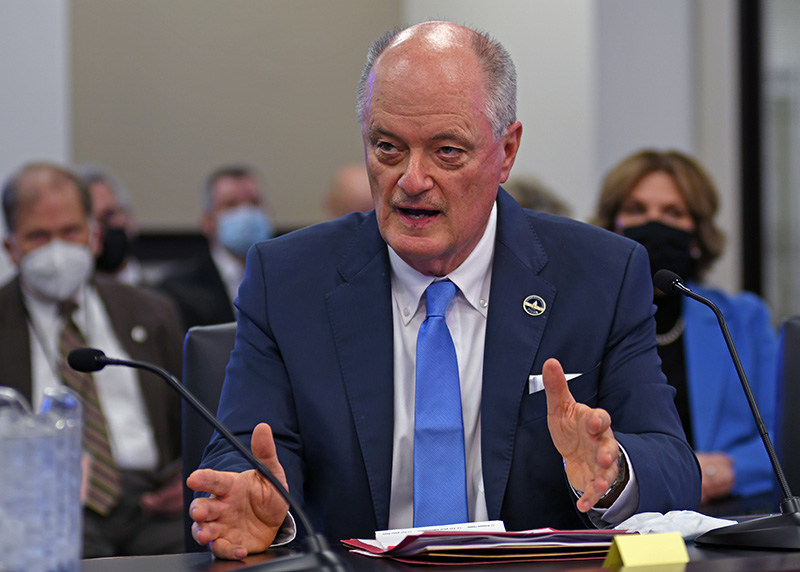
Sen. John
Schickel, R-Union, presents Senate Bill 1 in the
Senate Education Committee on Jan.6, 2022. A
high-res photo can be found
here.
FRANKFORT
–
With the first week of the 2022 Legislative
Session almost over, two education bills related
to school councils and remote instruction are
advancing in the Kentucky Senate.
On Thursday, the Senate Committee on Education
voted 9-1 to pass Senate Bill 1, which calls for
local superintendents – rather than school
councils – to determine educational curriculum
for districts.
Superintendents would still need to consult with
the principal and school council beforehand and
provide a reasonable review and response period
for stakeholders in accordance with local
policy.
The committee also passed Senate Bill 25, which
would provide up to 10 days of remote
instruction per school for the 2021-2022
academic year. It would also temporarily revise
retirement reemployment provisions until June
30. The legislation passed on a 10-0 vote.
Both measures now head to the full Senate for
consideration.
Sen. John Schickel, R-Union, sponsored SB 1 with
several cosponsors. He told committee members
the legislation is not new to them; it has been
a work in progress for seven years. He said the
need for the bill has become more and more
apparent, and that it would clarify issues, not
do away with school councils.
“It puts the final say about curriculum with the
citizens of the community,” he said.
He also highlighted the importance of
superintendents and their selection.
“At the end of the day, it’s the superintendent
that we hold accountable for the performance of
our schools,” Schickel said.
Sally Sugg, superintendent of Shelby County
Public Schools, testified in favor of the
changes during the meeting. She said districts
need a coherent, cohesive solution to the
problems found in the classroom.
Parents typically look to teachers and the
principal, and the process of collaboration is
the key when superintendents select principals,
she said. Input is also important, she added.
Brenda Jackson, who serves on the Shelby County
Public Schools’ Board of Education, also
testified in favor of the bill. She said many
students go from school to school and need
consistency of curriculum.
But Sen. Gerald A. Neal, D-Louisville, said he
had mixed feelings about site-based decision
making councils. He voted no on the measure and
explained some positive attributes of councils.
“I have found out over the years that there was
great value that was achieved through the
construction of the site-based decision making
councils, and shifting some of the, you call it,
the decision making authority to those
councils,” he said.
Jody Cabble, a teacher at Henry Clay High School
in Lexington, testified that school councils
have been an “essential driver,” and called the
bill a step backward for Kentucky public
schools. She expressed concern that changes
would cloud transparency and lead to secrecy.
She said there should be more “seats at the
table.”
On the other measure – SB 25 – Sen. Max Wise,
R-Campbellsville, said the bill would help fill
staff vacancies. Wise chairs the Senate
Committee on Education and sponsored the
legislation.
“The purpose of the bill is to prioritize
in-person learning by extending the 2021 Special
Session Senate Bill 1 components that have
expired through Dec. 31,” he said.
“This is one of those issues that we said during
the special session we would have to revisit,
and we would have to come back to because we
need to provide flexibility to school
districts,” he said.
END
Jan. 6,
2022
Lawmakers
adjust General Assembly's 2022 session calendar
FRANKFORT –
Legislative leaders have adjusted the calendar
for the Kentucky General Assembly’s 2022 Regular
Session with plans to gavel in on Saturday.
Under the changes, the Senate and House will
both convene for the fifth day of the
legislative session on Saturday, Jan. 8. The
last day to introduce bills in the House has
been moved to Feb. 25, while the last day to
introduce bills in the Senate has been moved to
March 1.
Media professionals who are not Capitol tenants
will not have badge access on Saturday and
should use the visitor entrances at the front of
the Capitol and Annex. Legislative agents should
also use the visitor entrances.
The Governor’s Budget Address is scheduled for
Jan. 13.
Observances for Martin Luther King, Jr. Day on
Jan. 17 and for President’s Day on Feb. 21
remain unchanged on the calendar along with the
10-day veto recess that runs from March 31
through April 12.
Legislators are still scheduled to convene on
April 13 and 14 for the final two days of the
session.
The revised 2022 Regular Session Calendar can be
viewed online at:
https://legislature.ky.gov/Documents/22RS_Calendar.pdf.
END
Top
|